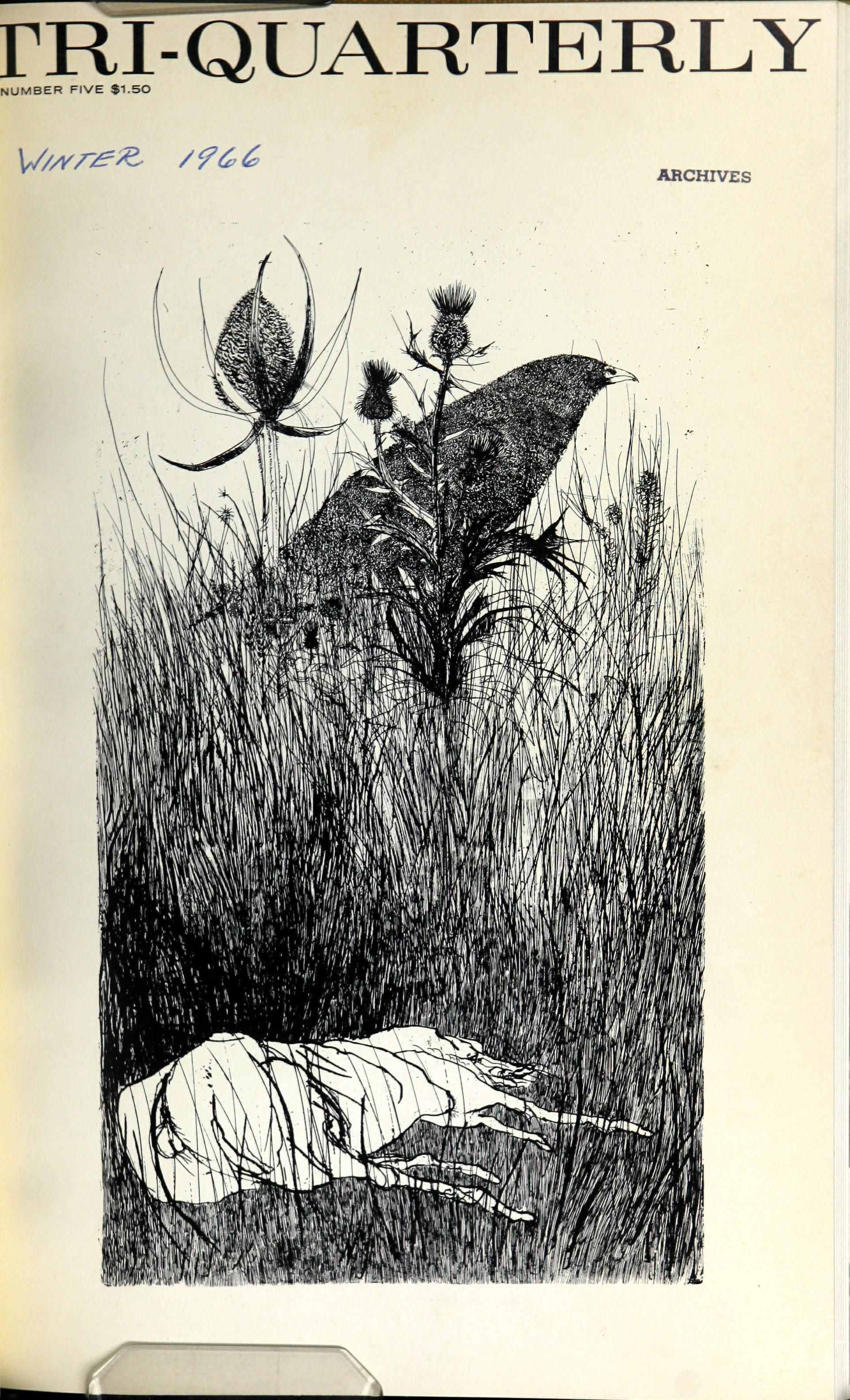
UMBER FIVE $1.50 ARCHIVES \ \ .�

THIS AFRICA
Novels by West Africans in English and French by Judith
Illsley Gleason
The first study of African novels as such, This Africa is both a literary history and a survey of the contemporary literary milieu. The author examines the styles and traditions discernible in African novels and discusses, among others, such writers as Chinua Achebe, Cyprian Ekwensi, Mongo Beti, and Camara Laye. The necessary relevant historical, political, and educational factors are treated in scope fully adequate to their importance.
"Mrs. Gleason has written a first-rate study of an important part of the emerging or exploding literary culture of Africa." Lionel Trilling
186 pages
CHRISTIAN MISSIONS IN NIGERIA, 1841-1891
The Making of a New Elite by J. F. Ade Ajayi
In this major contribution to the study of African history, Professor Ajayi surveys the work of missionary groups as one factor initiating great change in Nigeria. He assesses the effects of this change on a new elite, formed as a result of missionary education, that became important in the nationalist movement. In this context, the author makes a detailed study of the Ogboni and Egbo societies as politico-religious institutions.
275 pages
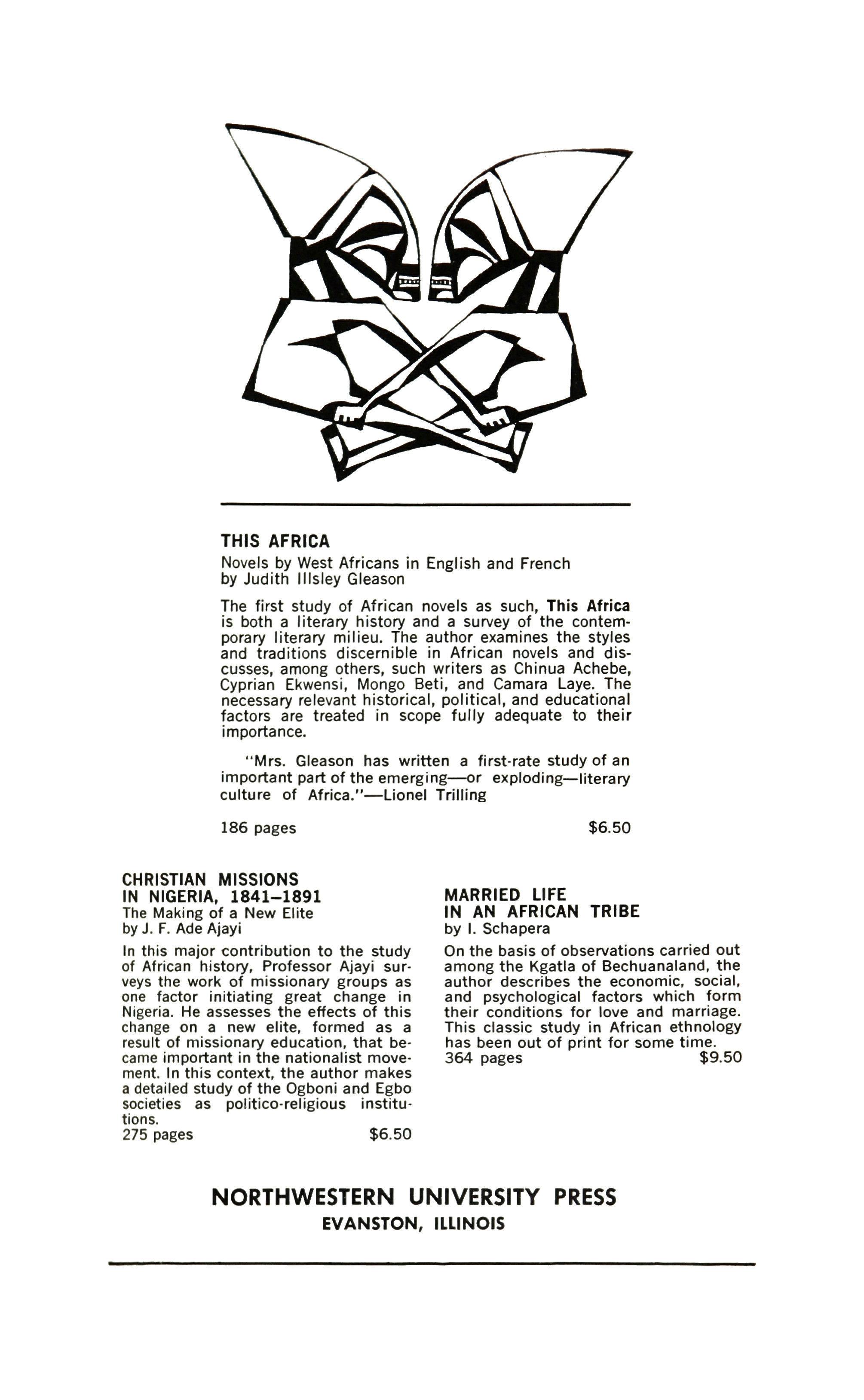
$6.50
MARRIED LIFE IN AN AFRICAN TRIBE
by I.
Schapera
On the basis of observations carried out among the Kgatla of Bechuanaland, the author describes the economic, social, and psychological factors which form their conditions for love and marriage. This classic study in African ethnology has been out of print for some time.
364 pages
$6.50
NORTHWESTERN UNIVERSITY PRESS
$9.50
EVANSTON,
ILLINOIS
POEMS:
AN HANDFUL WITH UIETNESS
What first strikes the reader of these fifty-six poems, now collected for the first time, is their luster and complexity. John Stewart Carter, as poet, writes of the real world: people, places, faces, past and present time. There's a strain of fine wit running through these poems that ensures a felt distance between the poet and his desire. Personality is the prism, memory is the white light it refracts into moods, views, laughter, prejudices poems.
By the author of FULL FATHOM FIVE
1964 winner of The Houghton Mifflin
Literary Fellowship Award
Cloth edition $3.95 Paper edition $1.95
Houghton Mifflin Company Publishers
PREUVES
revul Illensuelle
a publie des textes originaux de
RAYMOND ARON
ALBERT CAMUS
T.S. ELIOT
ALDOUS HUXLEY
ARTHUR KOESTLER
ALBERTO MORAVIA
D. de ROUGEMONT
S.S. SENGHOR
MANES SPERBER
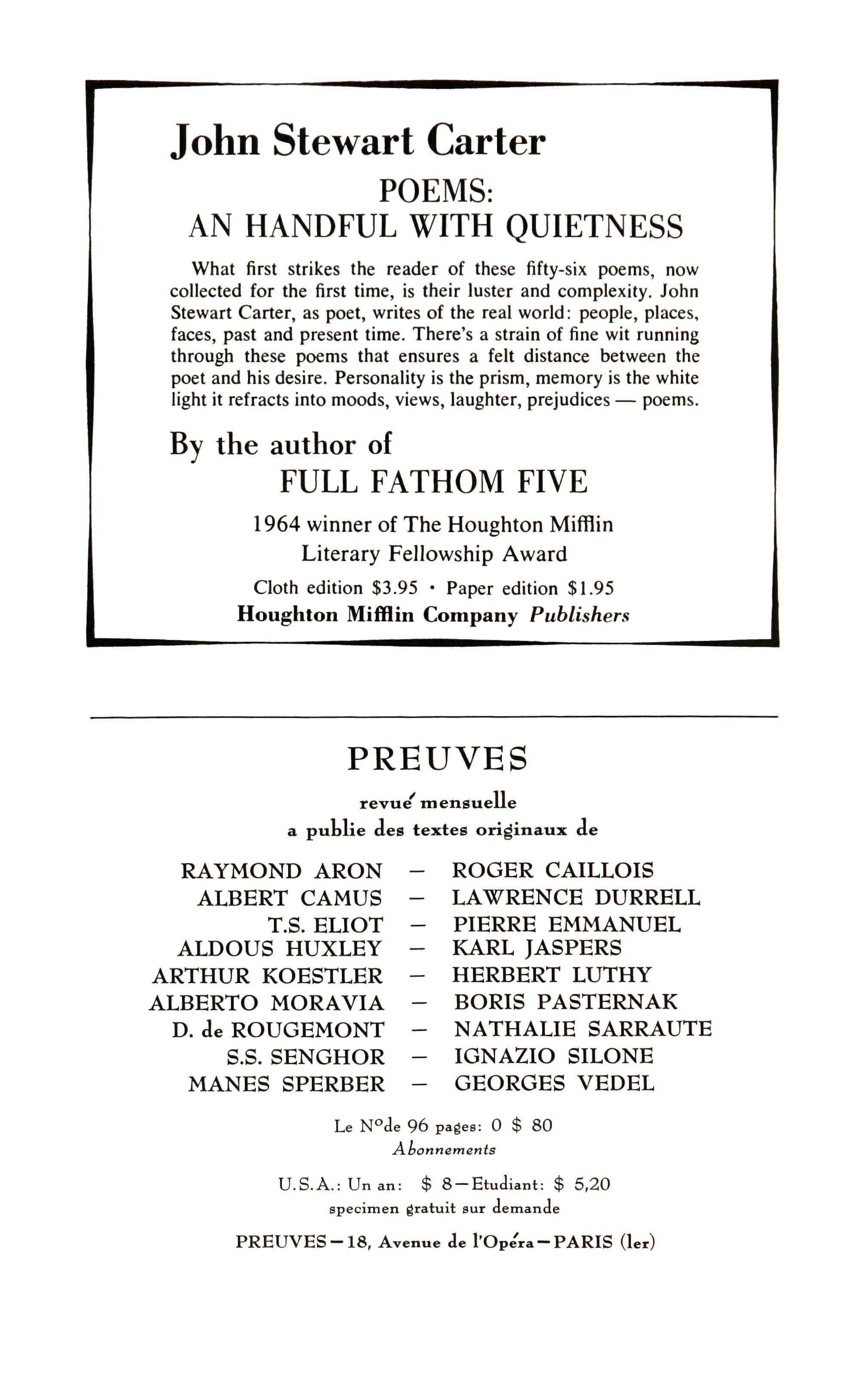
ROGER CAILLOIS
LAWRENCE DURRELL
PIERRE EMMANUEL
KARL JASPERS
HERBERT LUTHY
BORIS PASTERNAK
NATHALIE SARRAUTE
IGNAZIO SILONE
GEORGES VEDEL
Le N°de 96 pages: 0 $ 80 Abonnements
U. B.A.: Un an: $ 8 - Etudiant: $ 5,20 specimen gratuit sur demande
PREUVES-18, Avenue de l'Op�ra-PARIS (ler)
o n ewar ar er
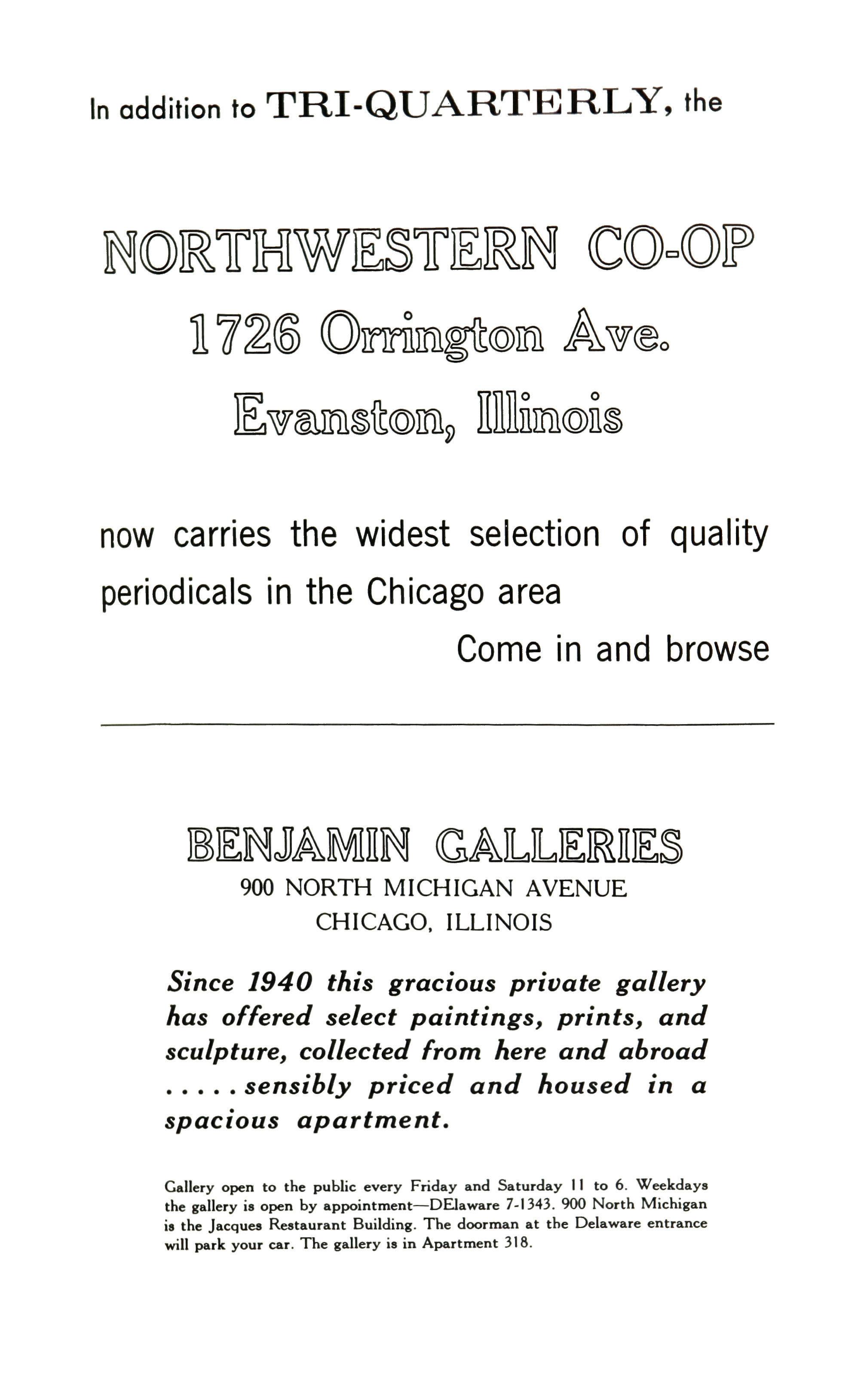
900 NORTH MICHIGAN AVENUE
CHICAGO.
ILLINOIS
Since 1940 this gracious private gallery has offered select paintings, prints, and sculpture, collected from here and abroad sensibly priced and housed in a sp actous apartment.
Gallery open to the public every Friday and Saturday II to 6. Weekdays the gallery is open by appointment DElaware 7-1343. 900 North Michigan is the Jacques Restaurant Building. The doorman at the Delaware entrance will park your car. The gallery is in Apartment 318.
o o 0
WI est selection 0 ua it orne
D o
In addition to , the
now carries
In an rowse
fiction
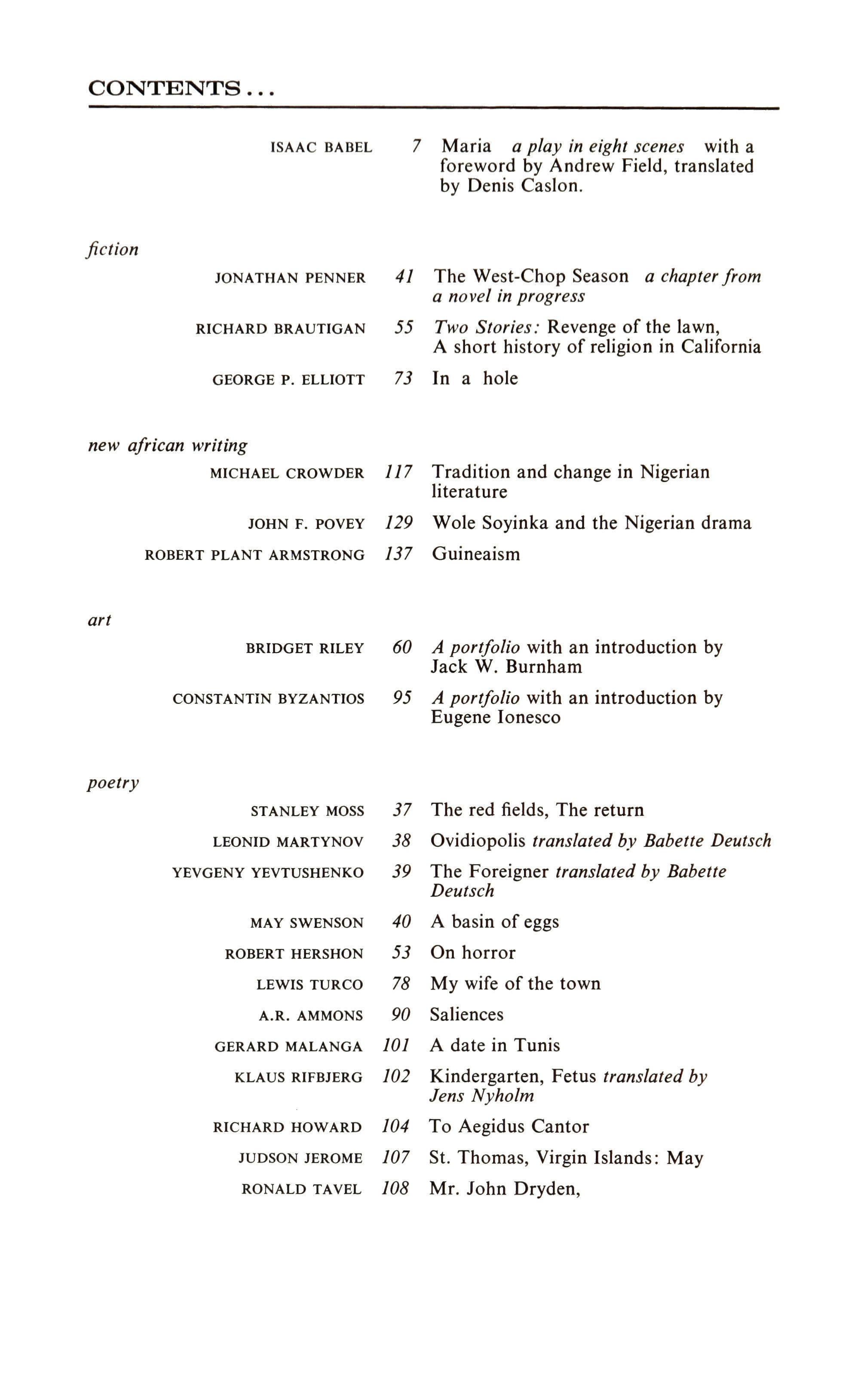
ISAAC BABEL 7 Maria a play in eight scenes with a foreword by Andrew Field, translated by Denis Caslon.
JONATHAN PENNER 41 The West-Chop Season a chapterfrom a novel in progress
RICHARD BRAUTIGAN 55 Two Stories: Revenge of the lawn, A short history of religion in California
GEORGE P. ELLIOTT 73 In a hole
new african writing
MICHAEL CROWDER 117 Tradition and change in Nigerian literature
JOHN F. POVEY 129 Wole Soyinka and the Nigerian drama
ROBERT PLANT ARMSTRONG 137 Guineaism
art
poetry
BRIDGET RILEY 60 A portfolio with an introduction by Jack W. Burnham
CONSTANTIN BYZANTIOS 95 A portfolio with an introduction by Eugene Ionesco
STANLEY MOSS 37 The red fields, The return
LEONID MARTYNOV 38 Ovidiopolis translated by Babette Deutsch
YEVGENY YEVTUSHENKO 39 The Foreigner translated by Babette Deutsch
MAY SWENSON 40 A basin of eggs
ROBERT HERSHON 53 On horror
LEWIS TURCO 78 My wife of the town
A.R. AMMONS 90 Saliences
GERARD MALANGA 101 A date in Tunis
KLAUS RIFBJERG 102 Kindergarten, Fetus translated by lens Nyholm
RICHARD HOWARD 104 To Aegidus Cantor
JUDSON JEROME 107 St. Thomas, Virgin Islands: May
RONALD TAVEL 108 Mr. John Dryden,
CONTENTS
ROBERT SWARD 109 Idyll, The poet declares for the reader
SHINKICHI TAKAHASHI III Zen poems translated by Takashi Ikemoto and Lucien Stryk
EUGENIA MACER 146 Untitled poem
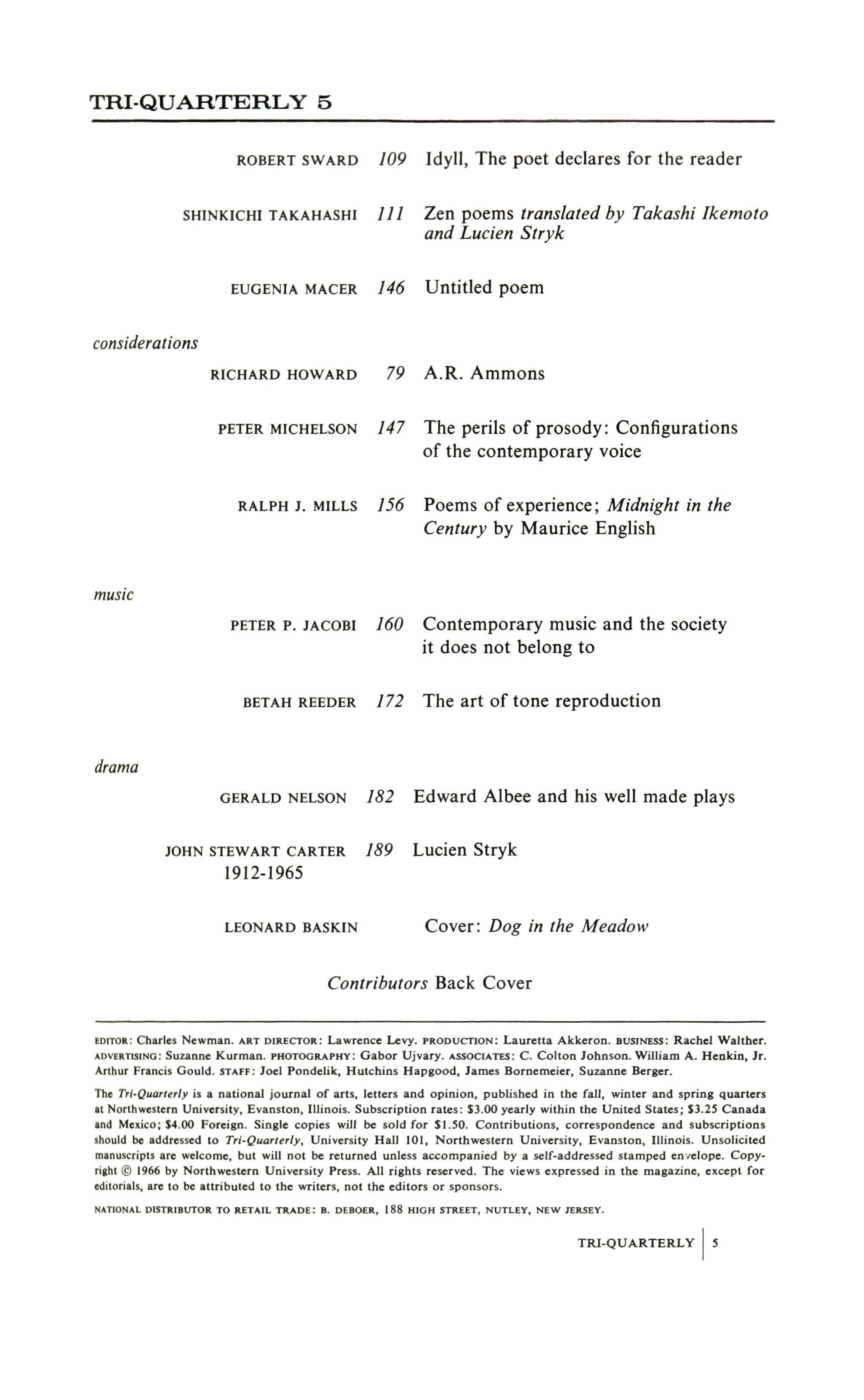
considerations
RICHARD HOWARD 79 A.R. Ammons
PETER MICHELSON 147 The perils of prosody: Configurations of the contemporary voice
RALPH J. MILLS 156 Poems of experience; Midnight in the Century by Maurice English
drama
PETER P. JACOBI 160 Contemporary music and the society it does not belong to
BETAH REEDER 172 The art of tone reproduction
GERALD NELSON 182 Edward Albee and his well made plays
JOHN STEWART CARTER 189 Lucien Stryk 1912-1965
LEONARD BASKIN Cover: Dog in the Meadow
Contributors Back Cover
8DITOR: Charles Newman. ART DIRECTOR: Lawrence Levy. PRODUCTION: Lauretta Akkeron. BUSINESS: Rachel Walther. ADVERTISING: Suzanne Kurman. PHOTOGRAPHY: Gabor Ujvary. ASSOCIATES: C. Colton Johnson. William A. Henkin, Jr. Arthur Francis Gould. STAFF: Joel Pondelik, Hutchins Hapgood, lames Bornemeier, Suzanne Berger.
The TrI·Quarterly is a national journal of arts, letters and opinion, published in the fall, winter and spring quarters at Northwestern University, Evanston, Illinois. Subscription rates: $3.00 yearly within the United States; $3.25 Canada and Mexico; $4.00 Foreign. Single copies will be sold for $1.50. Contributions, correspondence and subscriptions should be addressed to Tri-Quarterly, University Hall 101, Northwestern University, Evanston, Illinois. Unsolicited manuscripts are welcome, but will not be returned unless accompanied by a self-addressed stamped envelope. Copyriaht © 1966 by Northwestern University Press. All rights reserved. The views expressed in the magazine, except for editorials, are to be attributed to the writers, not the editors or sponsors.
NATIONAL DISTRIBUTOR TO RETAIL TRADE: B. DEBOER, 188 HIGH STREET, NUTLEY, NEW 1ERSEY.
TRI·QUARTERLY
'I'RI-QUAR'l'E:RLY 5
mustc

i I '. I
tranBlated by DeniB CaBlon

Maria
A play in eight BceneB
ISAAC BABEL
Dramatis Personae
MUKOVNIN, Nikolai Vasilyevich
LUDMILA, his daughter
FELZEN, Katerina Vyacheslavovna
DYMSHITS, Isaac Markovich
GOLYTSIN, Sergei Illarionovich, a former prince
NEFEDOVNA, nurse in the house of Mukovnin
EVSTIGNEICH, BISHONKOV, PHILIPPE, disabled war veterans
VISKOVSKY, a former Guards officer
KRAVCHENKO
MADAME DORA
A POLICE INSPECTOR
KALMYKOVA, housemaid of the lodgings at No. 86, Nevsky Prospect
AGASHA, a yard-keeper
ANDREI, KUZMA, floor polishers
SUSHKIN
SAFONOV, a workman
ELENA, his wife
NYUSHKA
A POLICEMAN
A DRUNK, in the police station
A RED SOLDIER, from the front
The action of the play takes place in Petrograd during the thefirst years of the Revolution.
ANDREW FIELD
Babel as playwright
An introductory note

POETIC PROSE and narrative poetry we are on our guard at both these pairings, expecting a creation of ungainly genre, singing parrot or talking meadowlark. It is different, however, with drama: we hear someone speak of a "dramatic poem" or a "dramatic novel" with no sense of incipient dread. (Although it should be noted that the much-esteemed "dramatic novels" of Dostoevsky are weakest in their surfeit of that very virtue.) More than a preference for action over words, the idea of dramatic prose connotates a certain sense of narrative tempo, of action carefully figured with chalk marks, of "scenes" and chapters that end with invisible curtains.
Isaac Babel's miniature stories, for all their power and color, would seem too restricted in scope and too exclusively verbal to warrant meaningful use of the word dramatic, and, in fact, critics and historians of literature have not linked his stories with his dramatic works, which are usually mentioned as an afterthought ("He was also the author of two interesting plays.") in discussions of Babel.
This neglect of the "dramatism" by which I mean the less obvious structural dramatic aspects in Babel's art begins perhaps with a choice of content over device on the part of his critics. Lionel Trilling, for example, has written movingly of Babel's involvement with the Cossackethos as emblematic ofthe "obsessivesignificance that violence has for the intellectual." Trilling speaks further of Babel's "language of force" and quotes his reference to the "army of words" by which art stages its "surprise attack." This reading and it is one towards which we naturally incline internalizes the dramatic elements and makes of them an artist's dialogue or dialectic within himself.
It is in this way that we may overlook the "staging" of the Odessa and Cossack way of life which Babel strove to re-enact in his stories/or its own sake. And when re-reading Babel with this in mind, we are suddenly made aware of the way in which even the stories set in camera contain whole passages that might easily be stage directions. In Babel the plottedness is quite as important as the plot.
It is not really surprising then that, in 1935, Babel writes in a letter: "A strange change has come over me I don't feel like writing in prose. I want to use only the dramatic form." Unlike almost all other major Russian writers before him, Babel did not write plays as a diversion in the course of his artistic career, but rather, he moved steadily towards the form.
Babel's two plays, Sunset (1928) and Maria, written in 1935 and translated here in English for the first time, are both unorthodox in form: by his own testimony Babel "deliberately broke the laws of playwriting" in writing them. Sunset (which has been translated in the collection Noonday 3) is linked to his short stories in that it concerns the Krik family from the Tales 0/ Odessa. The play is, if anything, a more natural and evocative artistic setting for Babel's larger than life Odessans.
The most obvious departure from the traditional in Sunset (as in Maria) is the division of the action. There are no acts; the play is set in eight scenes. The structural models which Babel probably had in mind, I believe, were from the cinema the Russians from the beginning accepted the film as a serious art form, and Babel himself had considerable experience as a scenario writer rather than from Pushkin's Boris Godunov or from Shakespeare.
Nevertheless, the principle characters in Sunset themselves the proud old giant Mendel Krik and his suffering wife Nekhama and their volatile children, Benya, Levka, and Dvoiraare Shakespearean in stature. In Mendel's passion that refuses to be tamed by old age, his inability to grant the just demands that time and one's family conspire to make, he is a pathetically grotesque and colorfully dangerous literary descendant of Lear and Samson. The quarrel of Mendel and Nekhama in bed ("Pullout my teeth, Nekhama, pour Jewish soup
8 TRI·QUARTERLY
in my veins, bend my back "Hot as an oven My God, I'm so ashamed ") is as grand as it is mean. The intermingling of grandeur in mean surroundings and of the biblical with the contemporary which is so notable in Sunset was not peculiar to Babel in this period, but is also to be found in the writings of Leonid Leonov, Vsevolod Ivanov, and several other prominent Soviet writers. Sunset falters as a play because it swerves midway from its promise of tragedy, dissipating the tremendous dramatic energy which had been building up in it.
Maria is a much bolder departure, and it is a greater dramatic achievement, done truly in a wholly new style, though the times were now such that, unlike Sunset, Maria could never reach the boards. Nonetheless, Maria is one of the monuments of Russian drama in this century, and it remains a source of wonder to me that, with all the English anthologies of Russian drama we have, this play has never been included in one.
One may decide that Maria is about the Russian Civil War, but such a conclusion, like much else in the play, has to be by inference. In one of his letters, written in 1934, Babel writes that "the Civil War is out of date as a subject" and has to be approached "from a new angle." It was not merely that the Civil War was "out of date," but also that the subject was so vast and compelling that an oblique or severely limited treatment of it seemed to many Russian writers the most logical artistic approach. To cite but one other famous instance, Mikhail Sholokhov has often been (unfairly) reproached for having reduced the Civil War to the narrow confines ofthe Melekhov family. Maria then, ifyou will, is "only" about the Mukovnin family and the effect that the Civil War has had on it. We do not see the war directly, any more than we see Maria herself who never comes on stage during the play.*
But the axonic leads from the central unit of this one family, disturbed and disintegrating, are many and far-reaching, and Maria as Mary or Mother Russia may well be the incorporeal body of the drama. General Mukovnin, the father, busies himself with his history of Russia past in order not to face the present in which he sells his daughter to the Jew Dymshits. The plainest statement of the truth that is Maria is made early in the play by a minor character, the maid Katya: "An ideal? I don't know. People like us are unfortunate, and that's the way we'll stay. We have been sacrificed, Nikolai Vasilyevich."
The nature and fate of that "ideal" lie somewhere offstage, out of our vision but never out of our consciousness, and this, of course, is one of the reasons why Maria's importance as an "activist" looms so large in the play.
The extraordinary dramatic departure in Maria is the way in which it extends beyond its natural conclusion, Mukovnin's death, and allows a new set of characters "to support the firmament." Not a sunset, but the effusion of a spring day's sunlight, promising that Nyushka's baby will be born in time for a good life. And we recall Aleksandr Blok's lines: Meaningless and dim light.lLive even another quarter century-LAnd all will be like this again. There's no way out." Tragically, both Blok and Babel erred in this The future was neither better, nor the same.

"This feature of the play recalls Vladimir Nabokov's first novel Mashenka (1926) in which the title character, Mashenka, also does not appear. It is commonly thought, based upon several comments quoted in Ilya Ehrenburg's memoirs, that Babel did not have a high opinion of Nabokov as a writer, but an unpublished Babel ms. (to be included in a new Babel anthology to be published by Farrar, Straus & Giroux) mentions Nabokov as one of the most promising writers in Europe. Mashenka is a diminutive form of Maria.
TRI-QUARTERLY 9
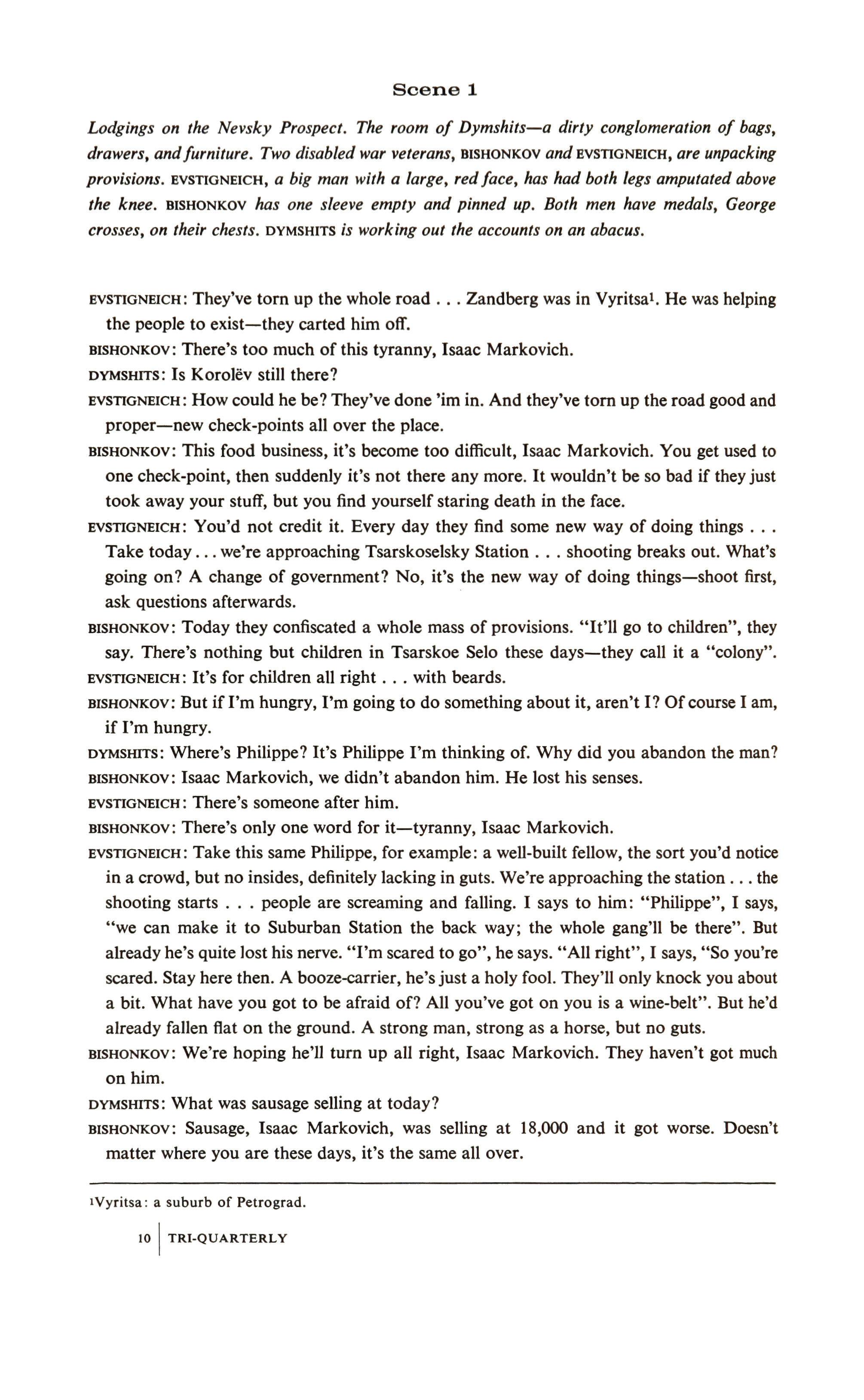
Lodgings on the Nevsky Prospect. The room of Dymshits a dirty conglomeration of bags, drawers, andfurniture. Two disabled war veterans, BISHONKOV and EVSTlONEICH, are unpacking provisions. EVSTlONEICH, a big man with a large, redface, has had both legs amputated above the knee. BISHONKOV has one sleeve empty and pinned up. Both men have medals, George crosses, on their chests. DYMSHITS is working out the accounts on an abacus.
EVSTlONEICH: They've tom up the whole road Zandberg was in Vyritsa'. He was helping the people to exist they carted him off.
BISHONKOV: There's too much of this tyranny, Isaac Markovich.
DYMSHITS: Is Korolev still there?
EVSTlGNEICH: How could he be? They've done 'im in. And they've tom up the road good and proper new check-points allover the place.
BISHONKOV: This food business, it's become too difficult, Isaac Markovich. You get used to one check-point, then suddenly it's not there any more. It wouldn't be so bad if they just took away your stuff, but you find yourself staring death in the face.
EVSTlONEICH: You'd not credit it. Every day they find some new way of doing things Take today we're approaching Tsarskoselsky Station shooting breaks out. What's going on? A change of government? No, it's the new way of doing things shoot first, ask questions afterwards.
BISHONKOV: Today they confiscated a whole mass of provisions. "It'll go to children", they say. There's nothing but children in Tsarskoe Selo these days they call it a "colony".
EVSTlONEICH: It's for children all right with beards.
BISHONKOV: But if I'm hungry, I'm going to do something about it, aren't I? Of course I am, if I'm hungry.
DYMSHl'I'S: Where's Philippe? It's Philippe I'm thinking of. Why did you abandon the man?
BISHONKOV: Isaac Markovich, we didn't abandon him. He lost his senses.
EVSTlONEICH: There's someone after him.
BISHONKOV: There's only one word for it tyranny, Isaac Markovich.
EVSTlONEICH: Take this same Philippe, for example: a well-built fellow, the sort you'd notice in a crowd, but no insides, definitely lacking in guts. We're approaching the station the shooting starts people are screaming and falling. I says to him: "Philippe", I says, "we can make it to Suburban Station the back way; the whole gang'll be there". But already he's quite lost his nerve. "I'm scared to go", he says. "All right", I says, "So you're scared. Stay here then. A booze-carrier, he's just a holy fool. They'll only knock you about a bit. What have you got to be afraid of? All you've got on you is a wine-belt". But he'd already fallen flat on the ground. A strong man, strong as a horse, but no guts.
BISHONKOV: We're hoping he'll tum up all right, Isaac Markovich. They haven't got much on him.
DYMSHI'I'S: What was sausage selling at today?
BISHONKOV: Sausage, Isaac Markovich, was selling at 18,000 and it got worse. Doesn't matter where you are these days, it's the same allover.
IVyritsa: a suburb of Petrograd.
10 TRI-QUARTERLY
Scene 1
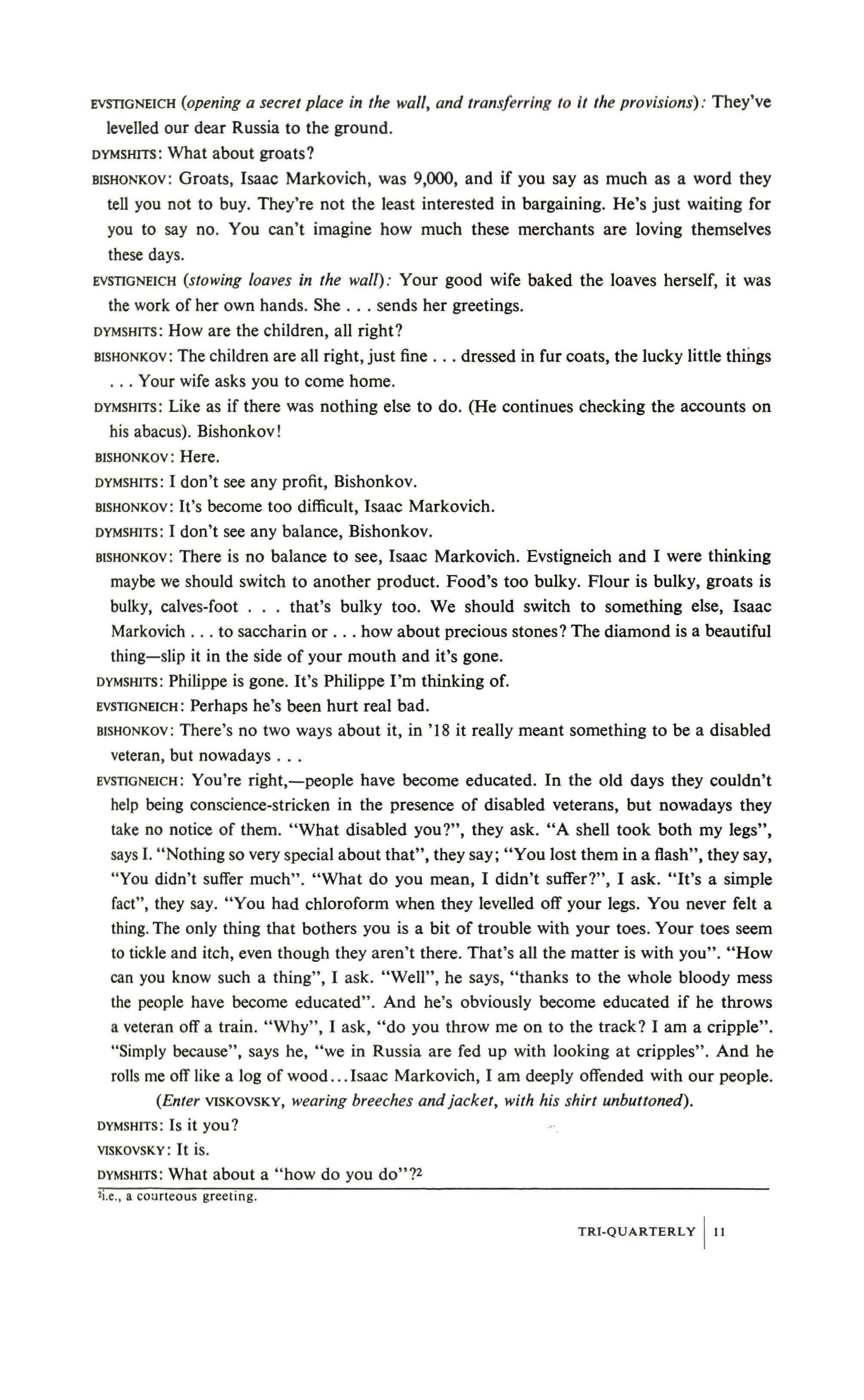
EVSllGNEICH (opening a secret place in the wall, and transferring to It the provisions): They've levelled our dear Russia to the ground.
DYMSJDTS: What about groats?
BISHONKOV: Groats, Isaac Markovich, was 9,000, and if you say as much as a word they tell you not to buy. They're not the least interested in bargaining. He's just waiting for you to say no. You can't imagine how much these merchants are loving themselves these days.
EVSTlGNEICH (stowing loaves in the wall): Your good wife baked the loaves herself, it was the work of her own hands. She sends her greetings.
DYMSHITS: How are the children, all right?
BISHONKOV: The children are all right, just fine dressed in fur coats, the lucky little things Your wife asks you to come home.
DYMSHITS: Like as if there was nothing else to do. (He continues checking the accounts on his abacus). Bishonkov!
BISHONKOV: Here.
DYMSHITS: I don't see any profit, Bishonkov.
BISHONKOV: It's become too difficult, Isaac Markovich.
DYMSffiTS: I don't see any balance, Bishonkov.
BISHONKOV: There is no balance to see, Isaac Markovich. Evstigneich and I were thinking maybe we should switch to another product. Food's too bulky. Flour is bulky, groats is bulky, calves-foot that's bulky too. We should switch to something else, Isaac Markovich to saccharin or how about precious stones? The diamond is a beautiful thing slip it in the side of your mouth and it's gone.
DYMSffiTS: Philippe is gone. It's Philippe I'm thinking of.
EVSTIGNEICH: Perhaps he's been hurt real bad.
BISHONKOV: There's no two ways about it, in '18 it really meant something to be a disabled veteran, but nowadays
EVSTIGNEICH: You're right, people have become educated. In the old days they couldn't help being conscience-stricken in the presence of disabled veterans, but nowadays they take no notice of them. "What disabled you?", they ask. "A shell took both my legs", says I. "Nothing so very special about that", they say; "You lost them in a flash", they say, "You didn't suffer much". "What do you mean, I didn't suffer?", I ask. "It's a simple fact", they say. "You had chloroform when they levelled off your legs. You never felt a thing. The only thing that bothers you is a bit of trouble with your toes. Your toes seem to tickle and itch, even though they aren't there. That's all the matter is with you". "How can you know such a thing", I ask. "Well", he says, "thanks to the whole bloody mess the people have become educated". And he's obviously become educated if he throws a veteran off a train. "Why", I ask, "do you throw me on to the track? I am a cripple". "Simply because", says he, "we in Russia are fed up with looking at cripples". And he rolls me off like a log of wood Isaac Markovich, I am deeply offended with our people.
(Enter VlSKOVSKY, wearing breeches andjacket, with his shirt unbuttoned).
DYMSHITS: Is it you?
VISKOVSKY: It is.
DYMSHlTS: What about a "how do you do"?2
II.e., a courteous greeting.
TRI-QUARTERLY 11
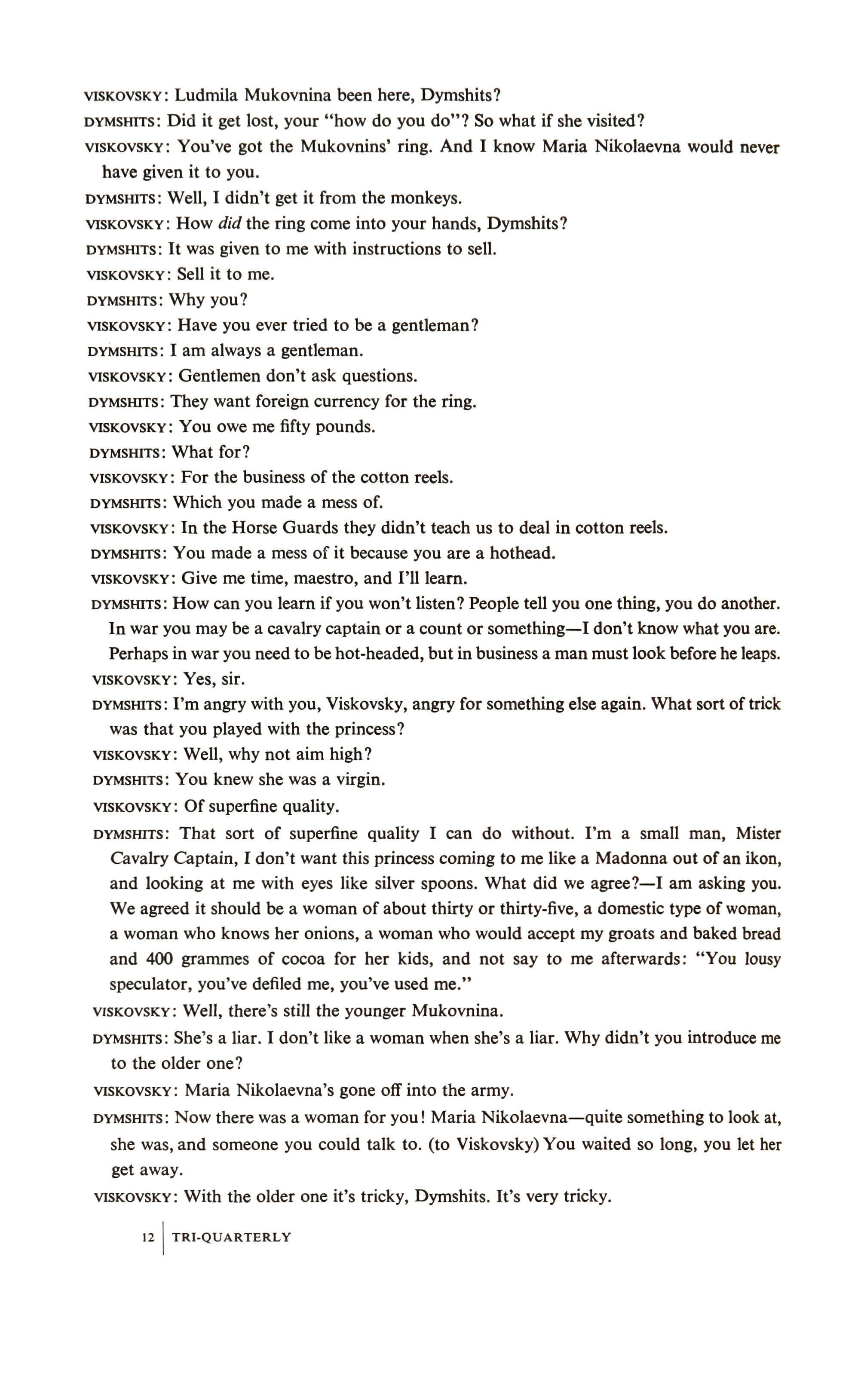
VISKOYSKY: Ludmila Mukovnina been here, Dymshits?
DYMSHI'I'S: Did it get lost, your "how do you do"? So what if she visited?
YISKOYSKY: You've got the Mukovnins' ring. And I know Maria Nikolaevna would never have given it to you.
DYMSffi'I'S: Well, I didn't get it from the monkeys.
Y1SKOYSKY: How did the ring come into your hands, Dymshits?
DYMSffi'I'S: It was given to me with instructions to sell.
Y1SKOYSKY: Sell it to me.
DYMSffiTS: Why you?
Y1SKOYSKY: Have you ever tried to be a gentleman?
DYMSHITS: I am always a gentleman.
Y1SKOYSKY: Gentlemen don't ask questions.
DYMSffi'I'S: They want foreign currency for the ring.
VISKOYSKY: You owe me fifty pounds.
DYMSHITS: What for?
YISKOYSKY: For the business of the cotton reels.
DYMSffi'I'S: Which you made a mess of.
Y1SKOYSKY: In the Horse Guards they didn't teach us to deal in cotton reels.
DYMSffi'I'S: You made a mess of it because you are a hothead.
Y1SKOYSKY: Give me time, maestro, and I'll learn.
DYMS.ID'1 s: How can you learn if you won't listen? People tell you one thing, you do another. In war you may be a cavalry captain or a count or something I don't know what you are. Perhaps in war you need to be hot-headed, but in business a man must look before he leaps.
Y1SKOYSKY: Yes, sir.
DYMSIDTS: I'm angry with you, Viskovsky, angry for something else again. What sort of trick was that you played with the princess?
Y1SKOYSKY: Well, why not aim high?
DYMSffiTS: You knew she was a virgin.
Y1SKOYSKY: Of superfine quality.
DYMSID'I'S: That sort of superfine quality I can do without. I'm a small man, Mister Cavalry Captain, I don't want this princess coming to me like a Madonna out of an ikon, and looking at me with eyes like silver spoons. What did we agree? I am asking you. We agreed it should be a woman of about thirty or thirty-five, a domestic type of woman, a woman who knows her onions, a woman who would accept my groats and baked bread and 400 grammes of cocoa for her kids, and not say to me afterwards: "You lousy speculator, you've defiled me, you've used me."
YISKOVSKY: Well, there's still the younger Mukovnina.
DYMSHII'S: She's a liar. I don't like a woman when she's a liar. Why didn't you introduce me to the older one?
Y1SKOYSKY: Maria Nikolaevna's gone off into the army.
DYMSHITS: Now there was a woman for you! Maria Nikolaevna quite something to look at, she was, and someone you could talk to. (to Viskovsky) You waited so long, you let her get away.
VISKOVSKY: With the older one it's tricky, Dymshits. It's very tricky.
12 TRI-QUARTERLY
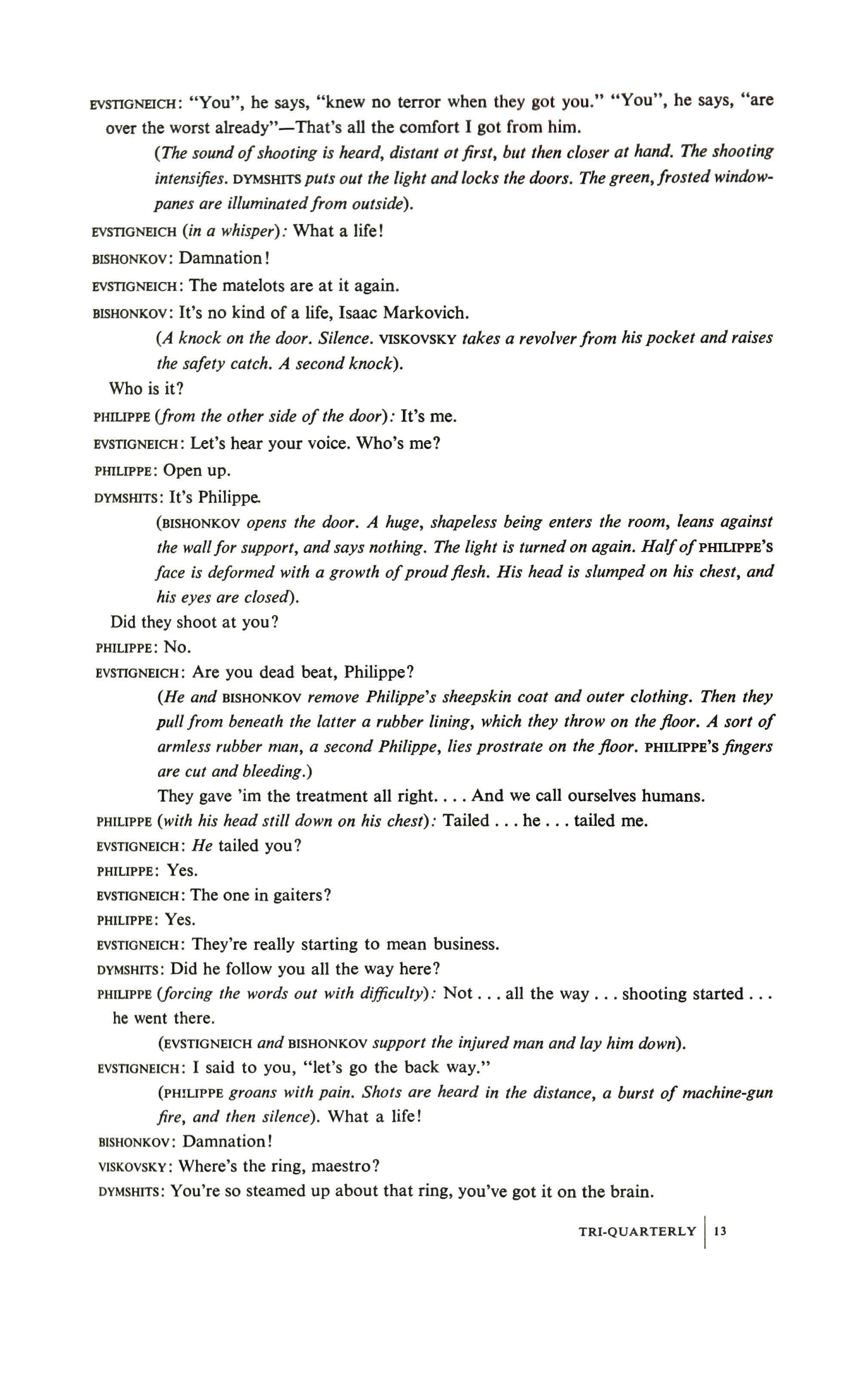
EVmGNEICH: "You", he says, "knew no terror when they got you." "You", he says, "are over the worst already" That's all the comfort I got from him. (The sound ofshooting is heard, distant ot first, but then closer at hand. The shooting intensifies. DYMSm"I� puts out the light andlocks the doors. The green, frosted windowpanes are illuminatedfrom outside).
EVmGNEICH (in a whisper): What a life!
BISHONKOV: Damnation!
EVmGNEICH: The matelots are at it again.
BISHONKOV: It's no kind of a life, Isaac Markovich. (A knock on the door. Silence. VISKOVSKY takes a revolverfrom his pocket and raises the safety catch. A second knock). Who is it?
PIID.IPPE (from the other side of the door): It's me.
EVSTIGNEICH: Let's hear your voice. Who's me?
PIDLIPPE: Open up.
DYMSIflTS: It's Philippe.
(BISHONKOV opens the door. A huge, shapeless being enters the room, leans against the wallfor support, and says nothing. The light is turned on again. HalfofPHILIPPE'S face is deformed with a growth ofproudflesh. His head is slumped on his chest, and his eyes are closed). Did they shoot at you?
PIDLIPPE: No.
EVSTIGNEICH: Are you dead beat, Philippe?
(He and BISHONKOV remove Philippe's sheepskin coat and outer clothing. Then they pullfrom beneath the latter a rubber lining, which they throw on the floor. A sort of armless rubber man, a second Philippe, lies prostrate on the floor. PHILIPPE'S fingers are cut and bleeding.)
They gave 'im the treatment all right And we call ourselves humans.
PHILIPPE (with his head still down on his chest): Tailed he tailed me.
EVSTIGNEICH: He tailed you?
PHILIPPE: Yes.
BVSTIGNEICH: The one in gaiters?
PHILIPPE: Yes.
EVSTIGNEICH: They're really starting to mean business.
DYMSHITS: Did he follow you all the way here?
PHILIPPE (forcing the words out with difficulty): Not all the way shooting started he went there.
(EVSTIGNEICH and BISHONKOV support the injured man and lay him down).
EVSTIONEICH: I said to you, "let's go the back way."
(PHILIPPE groans with pain. Shots are heard in the distance, a burst of machine-gun fire, and then silence). What a life!
BISHONKOV: Damnation!
VISKOVSKY: Where's the ring, maestro?
DYMSHI"!"S: You're so steamed up about that ring, you've got it on the brain.
TRI-QUARTERLY 13
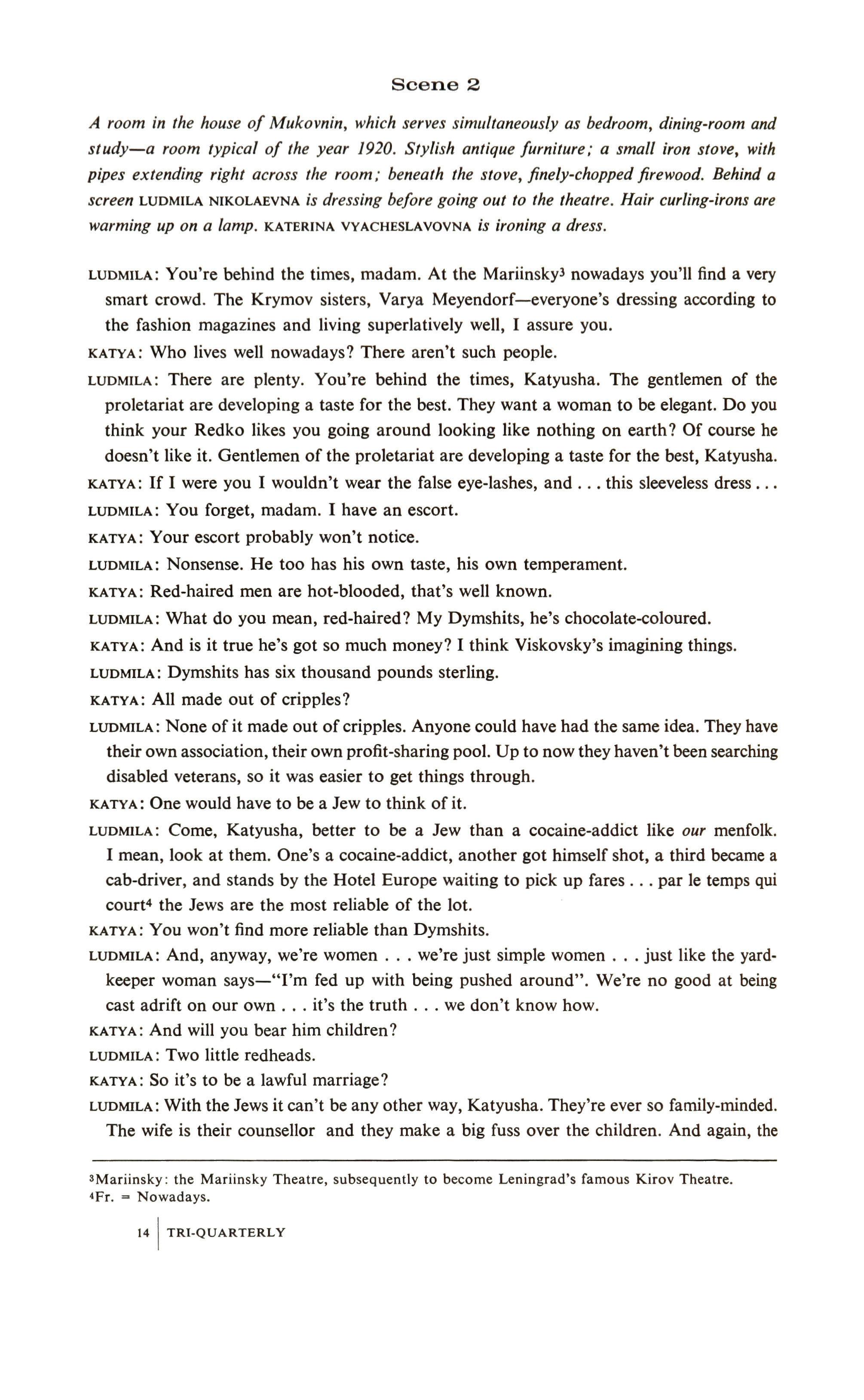
A room in the house of Mukovnin, which serves simultaneously as bedroom, dining-room and study a room typical of the year 1920. Stylish antique furniture,' a small iron stove, with pipes extending right across the room,' beneath the stove, finely-choppedfirewood. Behind a screen LUDMILA NIKOLAEVNA is dressing before going out to the theatre. Hair curling-irons are warming up on a lamp. KATERINA VYACHESLAVOVNA is ironing a dress.
LUDMILA: You're behind the times, madam. At the Mariinsky! nowadays you'll find a very smart crowd. The Krymov sisters, Varya Meyendorf everyone's dressing according to the fashion magazines and living superlatively well, I assure you.
KATYA: Who lives well nowadays? There aren't such people.
LUDMILA: There are plenty. You're behind the times, Katyusha. The gentlemen of the proletariat are developing a taste for the best. They want a woman to be elegant. Do you think your Redko likes you going around looking like nothing on earth? Of course he doesn't like it. Gentlemen of the proletariat are developing a taste for the best, Katyusha.
KATYA: If I were you I wouldn't wear the false eye-lashes, and this sleeveless dress
LUDMILA: You forget, madam. I have an escort.
KATYA: Your escort probably won't notice.
LUDMILA: Nonsense. He too has his own taste, his own temperament.
KATYA: Red-haired men are hot-blooded, that's well known.
LUDMILA: What do you mean, red-haired? My Dymshits, he's chocolate-coloured.
KATYA: And is it true he's got so much money? I think Viskovsky's imagining things.
LUDMILA: Dymshits has six thousand pounds sterling.
KATYA: All made out of cripples?
LUDMILA: None of it made out of cripples. Anyone could have had the same idea. They have their own association, their own profit-sharing pool. Up to now they haven't been searching disabled veterans, so it was easier to get things through.
KATYA: One would have to be a Jew to think of it.
LUDMILA: Come, Katyusha, better to be a Jew than a cocaine-addict like our menfolk. I mean, look at them. One's a cocaine-addict, another got himself shot, a third became a cab-driver, and stands by the Hotel Europe waiting to pick up fares par le temps qui courts the Jews are the most reliable of the lot.
KATYA: You won't find more reliable than Dymshits.
LUDMILA: And, anyway, we're women we're just simple women just like the yardkeeper woman says "I'm fed up with being pushed around". We're no good at being cast adrift on our own it's the truth we don't know how.
KATYA: And will you bear him children?
LUDMILA: Two little redheads.
KATYA: SO it's to be a lawful marriage?
LUDMILA: With the Jews it can't be any other way, Katyusha. They're ever so family-minded. The wife is their counsellor and they make a big fuss over the children. And again, the
3Mariinsky: the Mariinsky Theatre, subsequently to become Leningrad's famous Kirov Theatre. 'Fr. Nowadays.
14 TRI-QUARTERLY
Scene 2
Jew is always grateful to the woman who has been his So it's a truly noble characteristic, their respect for a woman.
KATVA: How is it that you know so much about the Jews?
LUD�nLA: Simply because Papa commanded a corps in Vilna, where there are masses of Jews. Papa had a friend who was a rabbi they're all philosophers, their rabbis.
KATVA (passing the freshly-ironed dress over the screen): After the theatre will it be supper?
LUDWLA: Perhaps.
KATVA: Of course, Ludmila Nikolaevna, a drink: or two an onrush of passion the whole thing'll be lost in a haze.
LUDMU,A: You miss the point entirely, madam. The flirtation will continue for a month, two months. With the Jews it has to be that way. I still haven't decided whether there'll be any kissing.
(MUKOVNIN enters, wearing felt boots and using his scarlet-lined greatcoat as a dressing-gown. He wears two pairs of spectacles.)
MUKOVNIN: (reads) On the 16th of October, 1820, in the reign of the blessed Emperor Alexander, a company of Household troops of the Semenovsky Regiment, forgetting their duty of allegiance and obedience to the military command, did dare to hold an illegal meeting in the late evening hour." (he raises his head) What form did it take, this forgetting of their oath of allegiance? It took the form of the men coming out into the corridor after roll-call and deciding to request the company commander to cancel the next small-group kit inspection in his quarters the company commander actually used to hold such inspections. For this, a so-called meeting, punishment was ordered as follows (he reads) "those lower ranks who were the acknowledged instigators to suffer loss of life. Those men of the First and Second Companies who set an example by creating a disturbance to be hanged. Those private soldiers, referred to in Paragraph No.3 to be flogged through the Battalion six times, as an example to others
LUDWLA: Isn't that terrible?
KATYA: Who can deny that there has been much cruelty in the past?
LUDWLA: I think the Bolsheviks should get hold of Papa's book. It's in their interest to attack the old army.
KATYA: Their demands are always for the immediate moment.
MUKOVNIN: I am breaking down the Semenovsky tragedy into two chapters: first, an investigation of the reasons for the rebellion; second, a description of the mutiny, the tortures, and the banishment to the mines. My story will be a story of barrack life, not a catalogue of peoples, but the fate of those Sidorovs and Proshkas who fell into the clutches of Arakcheevs and were sent off to serve a twenty-year term of military slavery.
LUDMILA: Papa, you must read Katya the chapter on the Emperor Paul. If Tolstoy had been alive, he would have appreciated it, I'm sure.
KATYA: In the papers they demand everything for the immediate moment.
MUKOVNIN: Without knowledge of the past there is no path to the future. The Bolsheviks are fulfilling the work of Ivan Kalita. They are uniting the Russian land. They need us
IArakcheev: Count Arakcheev, Minister of War under Alexander I.
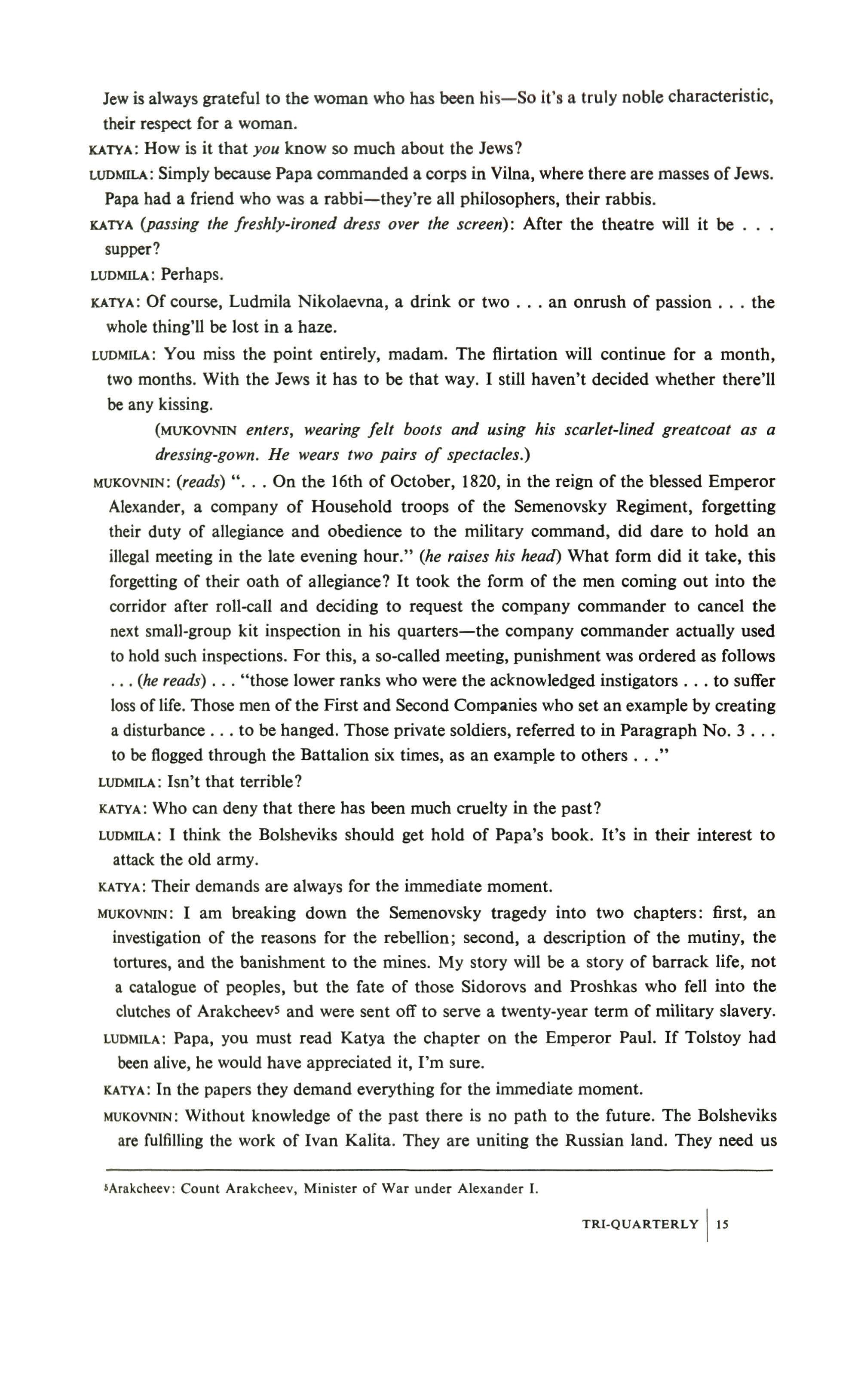
TRI-QUARTERLY IS

regular officers, even if it's only in order to recount our mistakes.
(A bell rings, followed by a noise in the hall. DYMSHITS enters, wearing a fur coat, and carrying packages)
DYMSHITS: Good day to you, Nikolai Vasilyevich! Good day to you, Katerina Vyacheslavna! Is Ludmila Nikolaevna in?
KATYA: She is expecting you.
LUDMILA (from behind the screen): I'm getting dressed
DYMSHITS: Good day to you, Ludmila Nikolaevna! On the street it's such weather you wouldn't put a dog out in it Ippolit drove me here, he wouldn't stop talking, and all nonsense it was too one would have to go a long way to find another like him We will not be late, will we, Ludmila Nikolaevna?
MUKOVNIN: It's broad daylight outside and they're going to the theatre.
KATYA: Nikolai Vasilyevich, the theatres begin at five o'clock in the afternoon nowadays.
MUKOVNIN: Are they saving electricity?
KATYA: Firstly, electricity. Secondly, if you come home late, you'll find yourself stripped bare in the street.
DYMSHITS: A little piece of gammon, Nikolai Vasilyevich. I am not an expert in the matter, but it was sold to me as being corn-fed. As to whether it was really fed on corn or something else I wouldn't know, I wasn't there.
(KATYA has withdrawn to a corner, and is smoking)
MUKOVNIN: Truly Isaac Markovich, you are too kind to us.
DYMSHI'IS: A little crackling
MUKOVNIN (not understanding): I beg your pardon!
DYMSHITS: Not the sort of thing you ate at your father's table, but in Minsk, in Vilyujsk, in Chernobyl, they have a high regard for it. It's little pieces of goose. You must try it and tell me what you think How's the book, Nikolai Vasilyevich?
MUKOVNIN: The book is coming along. I've reached the reign of Alexander Pavlovich.
LUDMILA: It reads like a novel, Isaac Markovich. In my opinion it reminds one of "War and Peace", the part where Tolstoy talks about the soldiers
DYMSHITS: I'm delighted to hear it. Let the shots ring out in the street, Nikolai Vasilyevich, In the street let them beat their heads against brick walls you have your own work to do. Finish the book, we'll have a drink on me. And of the first hundred copies I shall be the buyer A little bit of sausage, Nikolai Vasilyevich: domestic sausage, it came from a German
MUKOVNIN: Truly, Isaac Markovich, I shall become angry.
DYMSHII'S: For me the anger of General Mukovnin would be an honour a divine sausage! This German was quite a prominent professor. Now he's in sausages Ludmila Nikolaevna, I strongly suspect that we shall be late.
LUDMILA (from behind the screen): I am ready.
MUKOVNIN: How much do lowe you, Isaac Markovich?
DYMSHITS: A shoe off the horse that dropped dead today on the Nevsky Prospect.
MUKOVNIN: No, seriously.
DYMSHI'I'S: You want it seriously then two horsehoes off two dead horses.
(LUDMILA NIKOLAEVNA emerges from behind the screen. She is dazzlingly beautiful, slender and rosy-cheeked. She wears a sleeveless black velvet dress, and diamond ear-rings).
16 TRI-QUARTERLY
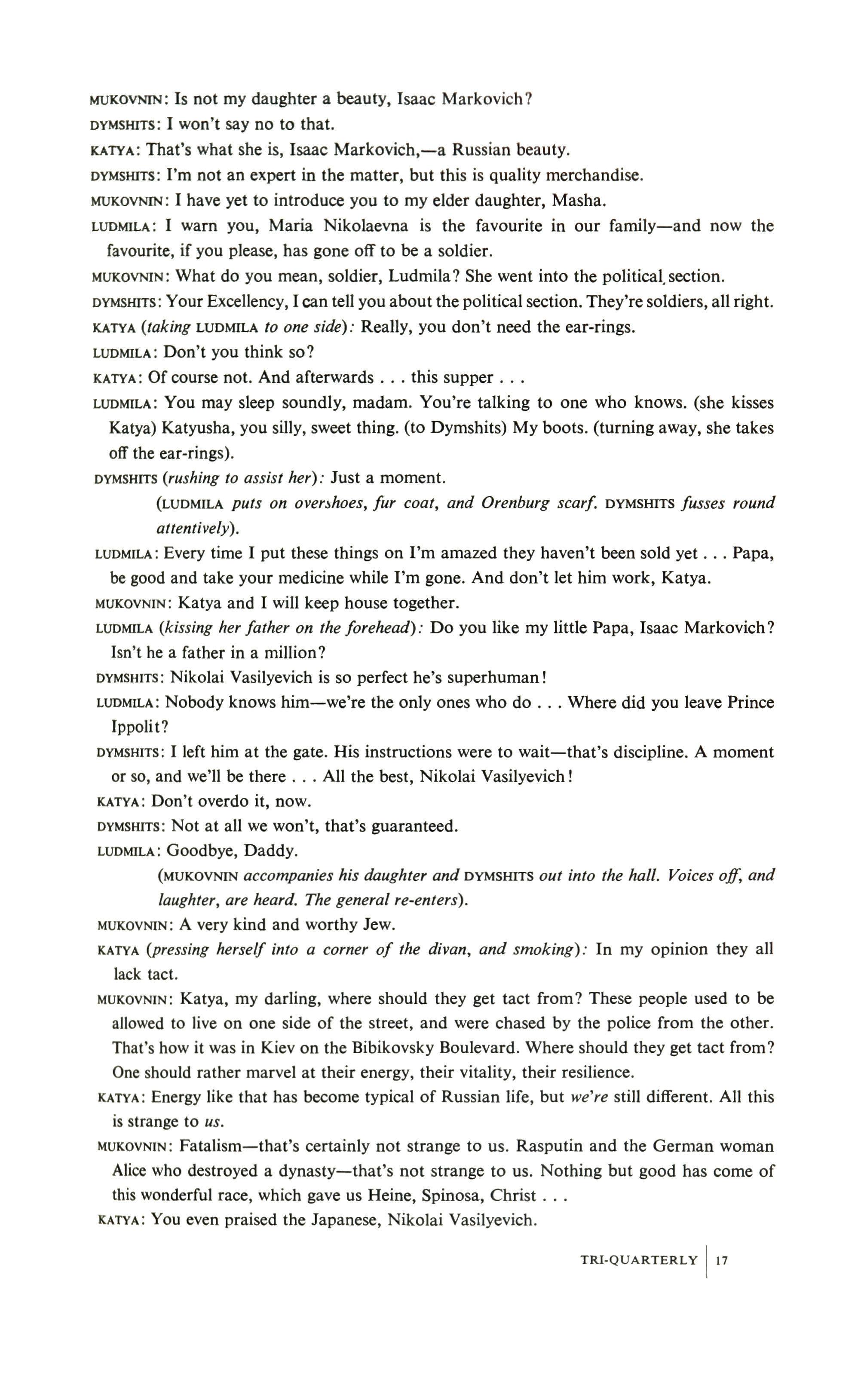
MUKOVNIN: Is not my daughter a beauty, Isaac Markovich?
DYMSHIlS: I won't say no to that.
KATYA: That's what she is, Isaac Markovich, a Russian beauty.
DYMSHIl": I'm not an expert in the matter, but this is quality merchandise.
MUKOVNIN: I have yet to introduce you to my elder daughter, Masha.
LUDMILA: I warn you, Maria Nikolaevna is the favourite in our family and now the favourite, if you please, has gone off to be a soldier.
MUKOVNIN: What do you mean, soldier, Ludmila? She went into the political. section.
DYMSHIIS: Your Excellency, I can tell you about the political section. They're soldiers, all right.
KATYA (taking LUDMILA to one side): Really. you don't need the ear-rings.
LUDMILA: Don't you think so?
KATYA: Of course not. And afterwards this supper
LUDMILA: You may sleep soundly. madam. You're talking to one who knows. (she kisses Katya) Katyusha, you silly, sweet thing. (to Dymshits) My boots. (turning away, she takes off the ear-rings).
DYMSHIIS (rushing to assist her): Just a moment.
(LUDMILA puts on overshoes, fur coat, and Orenburg scarf DYMSHITS fusses round attentively).
LUDMILA: Every time I put these things on I'm amazed they haven't been sold yet Papa, be good and take your medicine while I'm gone. And don't let him work, Katya.
MUKOVNIN: Katya and I will keep house together.
LUDMILA (kissing her father on the forehead): Do you like my little Papa, Isaac Markovich? Isn't he a father in a million?
DYMSHITS: Nikolai Vasilyevich is so perfect he's superhuman!
LUDMILA: Nobody knows him we're the only ones who do Where did you leave Prince Ippolit?
DYMSHITS: I left him at the gate. His instructions were to wait that's discipline. A moment or so, and we'll be there All the best, Nikolai Vasilyevich!
KATYA: Don't overdo it, now.
DYMSHITS: Not at all we won't, that's guaranteed.
LUDMILA: Goodbye, Daddy.
(MUKOVNIN accompanies his daughter and DYMSHITS out into the hall. Voices off. and laughter, are heard. The general re-enters).
MUKOVNIN: A very kind and worthy Jew.
KATYA (pressing herself into a corner of the divan, and smoking): In my opinion they all lack tact.
MUKOVNIN: Katya, my darling, where should they get tact from? These people used to be allowed to live on one side of the street, and were chased by the police from the other. That's how it was in Kiev on the Bibikovsky Boulevard. Where should they get tact from? One should rather marvel at their energy, their vitality, their resilience.
KATYA: Energy like that has become typical of Russian life, but we're still different. All this IS strange to us.
MUKOVNIN: Fatalism that's certainly not strange to us. Rasputin and the German woman Alice who destroyed a dynasty that's not strange to us. Nothing but good has come of this wonderful race, which gave us Heine. Spinosa, Christ
KATYA: You even praised the Japanese, Nikolai Vasilyevich.
TRI-QUARTERLY 17

MUKOVNIN: Why not? The Japanese are a great people. There is no end to the things we can learn from them.
KATYA: It's easy to see who Maria Nikolaevna takes after You are a Bolshevik, Nikolai Vasilyevich.
MUKOVNIN: I am a Russian officer, Katya, and I ask this question: How is it, gentlemen, and since when is it, that the rules of the game of war have become foreign to you? We have tortured and oppressed these people. They have defended themselves, they have gone over to the attack, and are fighting with resourcefulness, with deliberateness, with desperation,in fact, they are fighting in the name of an ideal, Katya.
KATYA: An ideal? I don't know. People like us are unfortunate, and that's the way we'll stay. We have been sacrificed, Nikolai Vasilyevich,
MUKOVNIN: I'm all for the common people being shaken up. It will be a very good thing. And time's running out, Katya. The only worthwhile Russian emperor, Peter, said: "Delay is death". What a precept! And if it is true, then it is up to you, gentlemen, to have the courage to look at the map, to realize which of your flanks has been turned, where and why defeat has been inflicted upon you To keep my eyes open that is my right, and I will not give it up.
KATYA: Nikolai Vasilyevich, you should take your medicine.
MUKOVNIN: To my brothers in arms, the men with whom I fought side by side, I say: Tirez vos conclusions, delay is death.
(Exit. In the next room someone is playing a Bach fugue on the violoncello. The tone is cool and pure. KATYA listens for a moment, then rises and crosses to the telephone).
KATYA: Give me the District H.Q May I speak to Redko? Redko, is that you? I wanted to say Anyone might think that you were the only one involved in the revolution, you're the only one who won't find time to see someone someone at whose house you spend the night when it suits you (A pause) Redko, take me out for a spin; call for me in a car Oh, all right, if you're busy No, I'm not angry. Why should I be angry?
(She hangs up. The music stops. Enter GOLYTSIN, a long, lean man in a soldier's jacket and puttees, holding a violoncello).
Prince, what was it they said to you at the pub? "Don't playa sad tune"?
GOLYTSIN: "Don't playa sad tune, don't jar our nerves".
KATYA: They need something cheerful, Sergei Illarionovich. People want to forget, to relax
GOLYTSIN: Not everyone. Some people want something sentimental.
KATYA (sitting down at the piano): Your audience what does it consist of?
GOLYTSIN: Dockers from Obvodny.
KATYA: Perhaps you'll end up in the Trade union Do you get your supper thrown in as well?
GOLYTSIN: Yes, I do.
KATYA (playing "Little Apple"6 and singing softly): Through rippled water the steamer steers. We'll feed the fish on volunteers".
6"Little Apple": "Yablochko", a well-known folk tune, to which suitable words were improvised by both sides during the revolution.
7Volunteers, i.e., White soldiers, (who were not conscripted).
18 TRI-QUARTERLY

Why not accompany me? It'd be a good idea if you played them "Little Apple" in the pub. (GOLYTSIN starts to accompany her, strikes a false note, and corrects himself.) Sergei Illarionovich, would it be worth my while to take up shorthand?
GOLYTSIN: Shorthand? I don't know.
KATVA (singing):
"I sit on a barrel, my teardops wet me. Men don't want to wed me, but only to pet me" They need stenographers these days.
GOLYTSIN: I'm afraid I can't advise you. (He picks up the accompaniment to "Little Apple".)
KATYA: Of aU of us Masha is the real woman. She has strength and daring, she is a woman. We sit here sighing, but she is happy in her political section. And apart from happiness, what other law of life have men thought up? There isn't one, there is no other law.
GOLYTSIN: Maria Nikolaevna has always indulged in abrupt changes of direction. That's what makes her so different.
KATVA: She's right. (Sings)
"Ah, little apple, whither art thou rolling?" And then she's having a romance with that Akim Ivanovich.
GOLYTSIN (stops playing): Who is Akim Ivanovich?
KATYA: Their divisional commander, a former blacksmith she mentions him in every letter.
GOLYTSIN: How do you know there is a romance?
KATYA: It's there between the lines. I can tell Or should I go away to Borisoglebsk, to my family? It's home, after all At least you've got the monk you go and visit in the monastery what's his name?
GOLYTSIN: Siony.
KATYA: Siony, What does he teach you?
GOLYTSIN: You were talking about happiness He is teaching me that it is not to be found in a sense of power over people, nor does it lie in that constant greed which we can never satisfy.
KATYA: Come on, Sergei Illarionovich. (Sings)
"Thirsty I sit on a barrel which rolls, Thirsty, with nought in my pocket but holes" Siony that's a pretty name.
Scene 3
LUDMILA and DYMSHITS are in the latter's room. On the table are bottles and the remains of supper. The next room, where BISHONKOV, PHILIPPE and EVSTIGNEICH are playing cards, is partly visible. EVSTIGNEICH, the amputee, has been placed on a chair.
LUDMILA: Felix YUSUpOV8 was as handsome as God, and the champion tennis-player of Russia. But handsome is as handsome does. There was a doll-like quality about him. I met Vladimir Baglei at Felix's house. To the end the Tsar did not appreciate the chivalrous
8Felix Yusopov: one of those involved in the murder of Rasputin.
TRI-QUARTERLY
19

nature of the man. We used to call him "The Teutonic Knight". Frederiks was friendly with Prince Sergei do you know Prince Sergei, who plays the violoncello? Well, at the party there was another item hors de programme, Archbishop Ambrosy. The old man was paying court to me can you imagine it! He was giving me more and more punch, and looking so pious and sly. At first I made no impression on Vladimir, he himself told me: "You were snub-nosed, si demesurement russe, with a blazing colour in your cheeks". At dawn we drove to Tsarskoe, leaving the car in the park, and taking a carriage. He did the driving. "Ludmila Nikolaevna, need I tell you that I have not taken my eyes off you all evening?" "Nina Buturlina noticed it, mon prince". I knew they had been having an affair, or rather a flirtation. "Buturlina c'est Ie passe, Ludmila Nikolaevna" "On revient toujours, ses premiers amours, mon prince", Vladimir did not hold the title of grand duke, coming as he did from a morganatic marriage. The family had not met the Tsarina Vladimir called her an evil genius. And, then well, he was a poet, a boy, he understood nothing of politics We arrived at Tsarskoe. It was dawn. Somewhere down below, over a pond, a nightingale began to sing My companion said again: "Mademoiselle Boutourline c'est le passe", to which I replied, "Mon prince, the past can sometimes catch up with one, and it's so unbearable when it does".
(DYMSHITS puts out the light, lunges at MUKOVNINA and throws her on to the divan. A struggle ensues. She tears herself away and straightens her hair and dress).
BISHONKOV (throwing down a card): Beat that.
PHILIPPE: It's not so easy.
EVSTIGNEICH: SO they took 'im to the fence with 'is hands tied "Well, friend", they said, "turn round". And he says to them, "No need to turn round. I'm a military man, kill me just as I am". Well, the fences there are made of a sort of wattle, half the height of a man it's night, the edge of the village beyond the village the steppe, on the edge of the steppe a ravine
BISHONKOV (making a trick): That makes game.
PHILIPPE: Oh no it doesn't. I've something up my sleeve.
EVSTIGNEICH: So they bring him along Their rifles are at the ready and suddenly he jumps in the air with his hands tied and all, just as if the Good Lord had plucked him from the face of the earth. He flew over the fence and took off, dodging this way and that. They began shooting, but it was night the darkness he ran in circles and loops, and got away.
PHILIPPE (dealing the cards): Good lad!
EVSTIGNEICH: That man's an everlasting hero. He used to be considered a reckless fellow. Half a year on the loose he was, before they got 'im.
PHILIPPE: Did they really finish him off'?
EVSTIGNEICH: Yes, and wrongly, I reckon. The man had had a glimpse of the next world and had jumped back out of the grave. He wasn't meant to be killed.
PHILIPPE: They don't take any notice of things like that these days.
EVSTIGNEICH: I think it's wrong. In every country they have this law: if they haven't killed you, it's your good fortune, so go on living.
PHILIPPE: They'll finish us off all right.
BISHONKOV: That they will.
LUDMILA: Turn on the light. (DYMSHITS does so) I shall have to leave. (She turns, looks at
20 I TRI-QUARTERLY

DYMSHITS, and bursts out laughing). Don't sulk. Come here Tell me, my friend, what were you expecting? I must get used to you first, you know.
DYMSHITS: I am not a shoe that you should have to get used to me.
LUDMILA: I don't deny you arouse in me a feeling of fondness, but this feeling must become stronger. Masha will come out of the army you will meet her. Nothing in our family is done without her. Papa he likes you, but, as you saw, he's quite helpless And then, other things remain to be decided: what about your wife?
DYMSHITS: What does my wife have to do with it?
LUDMILA: 1 know that the Jews are attached to their children.
DYMSHlTS: There's nothing to discuss, really, there's nothing to discuss.
LUDMILA: SO for the time being you must sit quietly beside me, armed with patience.
DYMSHITS: The Jews have been armed with patience ever since they started waiting for the Messiah. Have another drink.
LUDMILA: I've had a lot to drink already.
DYMSHlTS: This wine came to me off a battleship. The Grand Duke had a case of it on board.
LUDMILA: How is it you manage to get hold of everything?
DYMSHITS: I have my sources Drink up this glass.
LUDMILA: Only if you promise to sit here quietly.
DYMSHITS: They sit quietly in the synagogue.
LUDMILA: And look, you've put a frock coat on for the synagogue, of course. The frock coat, Isaac, used to be worn by high-school directors at graduation ceremonies, and by merchants at memorial dinners.
DYMSHITS: I shan't wear a frock coat again.
LUDMILA: And another thing the tickets. Never buy tickets in the front row, my friend. That's what the upstarts do, the nouveaux riches.
DYMSHITS: But that's just what I am, an upstart.
LUDMILA: You have an inner nobility that's something altogether different. Even your name doesn't become you Nowadays one's allowed to put announcements in the newspaper, in "Izvestia" I'd change it to Alexei. Do you like Alexei?
DYMSHI'I'S: Yes, I do. (Again he turns out the light and tries to assault MUKOVNINA.)
EVSTIGNEICH: They're at it again.
PHILIPPE (cocking an ear): Sounds as if our side wins.
BISHONKOV: I like Ludmila Nikolaevna most of all she gives a man a greeting And there are some wild, dishevelled-looking ones running around but she greets me by my patronymic.
(VISKOVSKY enters the veterans' room, stands behind EVSTIGNEICH'S chair, and watches the fall of the cards).
LUDMILA (breakingfree ofDYMSHITs): Call me a driver.
DYMSHITS: At once! There's nothing else for me to do.
LUDMILA: Call me one this instant!
DYMSHITS: It's cold outside thirty degrees of frost. One wouldn't send a mad dog out into it.
LUDMILA: My clothes are all torn. How can 1 go home looking like this?
DYMSHITS: Omelettes aren't made without breaking eggs.
LUDMILA: There we go again Isaac Markovich, you've got the wrong end of the stick.
DYMSHITS: Just my miserable luck.
TRI-QUARTERLY 21
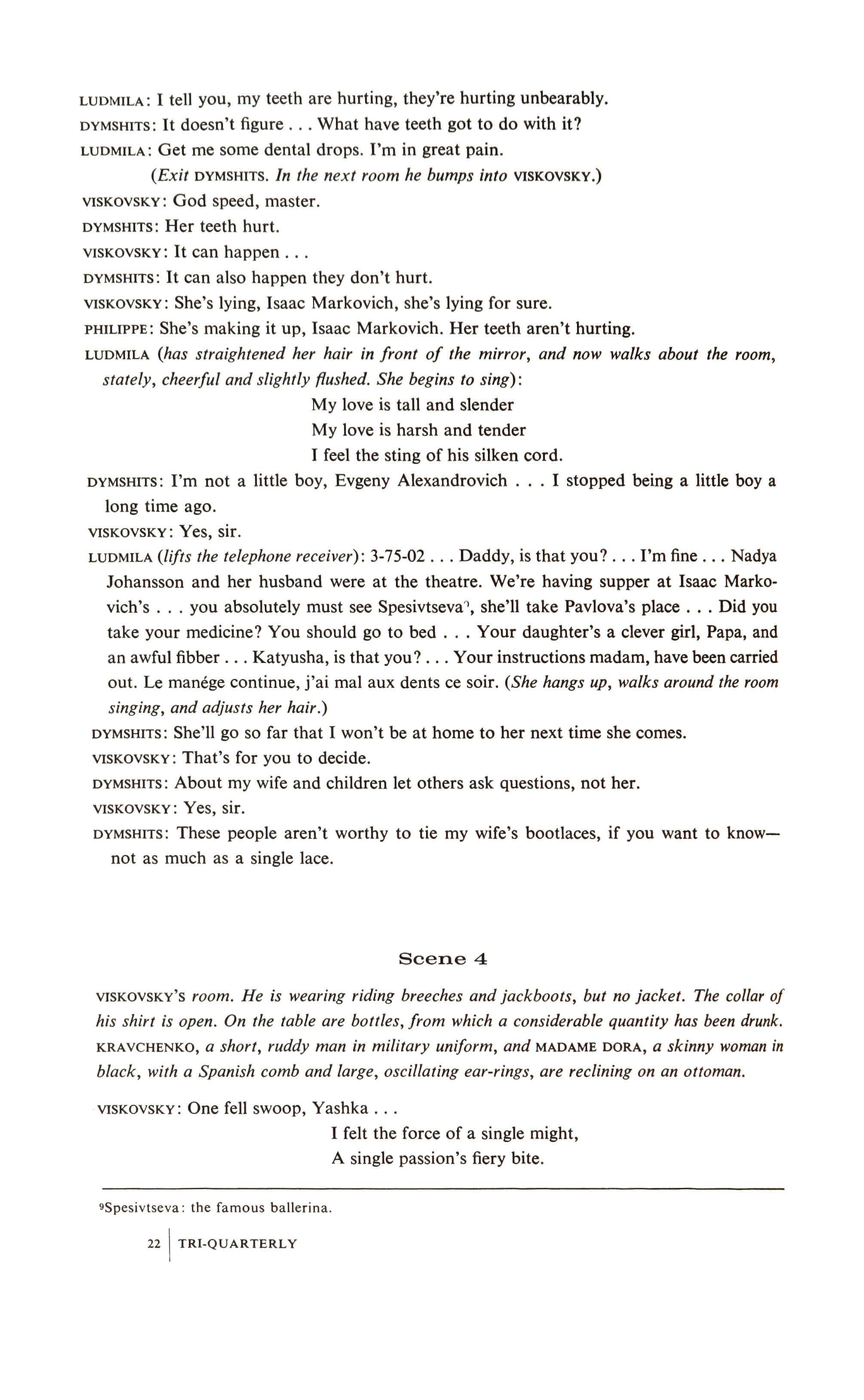
LUDMILA: I tell you, my teeth are hurting, they're hurting unbearably.
DYMSHITS: It doesn't figure What have teeth got to do with it?
LUDMILA: Get me some dental drops. I'm in great pain.
(Exit DYMSHI'I'S. In the next room he bumps into VISKOVSKY.)
VISKOVSKY: God speed, master.
DYMSHITS: Her teeth hurt.
VISKOVSKY: It can happen
DYMSHII'S: It can also happen they don't hurt.
VISKOVSKY: She's lying, Isaac Markovich, she's lying for sure.
PHILIPPE: She's making it up, Isaac Markovich. Her teeth aren't hurting.
LUDMILA (has straightened her hair in front of the mirror, and now walks about the room, stately, cheerful and slightly flushed. She begins to sing):
My love is tall and slender
My love is harsh and tender I feel the sting of his silken cord.
DYMSHITS: I'm not a little boy, Evgeny Alexandrovich I stopped being a little boy a long time ago.
VISKOVSKY: Yes, sir.
LUDMILA (lifts the telephone receiver): 3-75-02 Daddy, is that you? I'm fine Nadya Johansson and her husband were at the theatre. We're having supper at Isaac Markovich's you absolutely must see Spesivtseva", she'll take Pavlova's place Did you take your medicine? You should go to bed Your daughter's a clever girl, Papa, and an awful fibber Katyusha, is that you? Your instructions madam, have been carried out. Le manege continue, j'ai mal aux dents ce soir. (She hangs up, walks around the room singing, and adjusts her hair.)
DYMSHITS: She'll go so far that I won't be at home to her next time she comes.
VISKOVSKY: That's for you to decide.
DYMSHITS: About my wife and children let others ask questions, not her.
VISKOVSKY: Yes, sir.
DYMSHITS: These people aren't worthy to tie my wife's bootlaces, if you want to knownot as much as a single lace.
Scene 4
VISKOVSKY'S room. He is wearing riding breeches and jackboots, but no jacket. The collar of his shirt is open. On the table are bottles, from which a considerable quantity has been drunk.
KRAVCHENKO, a short, ruddy man in military uniform, and MADAME DORA, a skinny woman in black, with a Spanish comb and large, oscillating ear-rings, are reclining on an ottoman.
V1SKOVSKY: One fell swoop, Yashka
I felt the force of a single might, A single passion's fiery bite.
9Spesivtseva: the famous ballerina. 22 TRI-QUARTERLY

KRAVCHENKO: How much do you need?
VISKOVSKY: Ten thousand pounds One fell swoop Did you ever see a pound sterling, Yashka?
KRAVCHENKO: Will you make it all out of cotton-reels?
VISKOVSKY: To hell with cotton-reels. Diamonds. Three-carat diamonds, clear as crystal, pure and without blemish. In Paris those are the only kind they take.
KRAVCHENKO: There can't be any left.
VISKOVSKY: There are diamonds in every house. You just have to know how to get your hands on them. The Rimsky-Korsakovs have some, the Shakhovskoys there are still some diamonds in imperial St. Petersburg.
KRAVCHENKO: You won't make a Red merchant, Evgeny Alexandrovich.
VISKOVSKY: Of course I will! My father was a trader he traded villages for stallions. The old guard gives way, comrade Kravcheoko, but it does not give up.
KRAVCHENKO: You'd better go and call Mukovnina. The woman's fretting out there in the corridor
VISKOVSKY: I shall arrive in Paris in the grand manner.
KRAVCHENKO: This fellow Dymshits where's he disappeared to?
VlSKOVSKY: Either he's sitting it out in the W.C. or he's playing "Sixty Six" with Shapiro and that fellow from Kurlyandia (He opens the door.) Miss, I bid you welcome to our hearth. (He goes out into the corridor.)
DORA (kissing KRAVCHENKO'S hands): Light of my life! My idol! (Enter LUDMILA, with her fur coat on, followed by VISKOVSKY.)
LUDMILA: I don't understand it. We'd made an arrangement
VISKOVSKY: Which is dearer than gold.
LUDMILA: The arrangement was that I should come at eight. Now it's nine forty-five, and he hasn't even left the key. Where on earth has he got to?
VISKOVSKY: He'll do a little speculating and then he'll show up.
LUDMILA: All the same, they're not gentlemen, these people.
VISKOVSKY: Drink some vodka, child.
LUDMILA: Certainly I will I'm frozen but I still can't understand it.
VISKOVSKY: Permit me to present: Ludmila Nikolaevna, Madame Dora, citizen of the French Republic Liberte, Egalite, Fraternite, Among her other talents she possesses a foreign passport.
LUDMILA (offering her hand): Mukovnina.
VISKOVSKY: Yashka Kravchenko you know: an ensign in the war, now a Red artilleryman. He stands by the ten-inch guns of the Kronstadt battery and can aim them in any direction.
KRAVCHENKO: Evgeny Alexandrovich is in good form today.
VISKOVSKY: In any direction Imagine, Yashka, there's no limit to the possibilities. And if they order you to destroy the street where you were born you'll do it. If they order you to shell the orphanage, you'll say "range two-zero-eight", and you'll shell the orphanage. You'll do it, Yashka, as long as they'll allow you to exist, allow you to strum the guitar and sleep with thin women you being fat and liking them thin There's not a thing you won't do, and if they say to you "deny thy mother thrice", you'll do just that. But that's not the point, Yashka. The point is that they'll go further: they won't allow you to drink vodka with the crowd you prefer. They'll make you read boring books, and
TRI-QUARTERLY 23
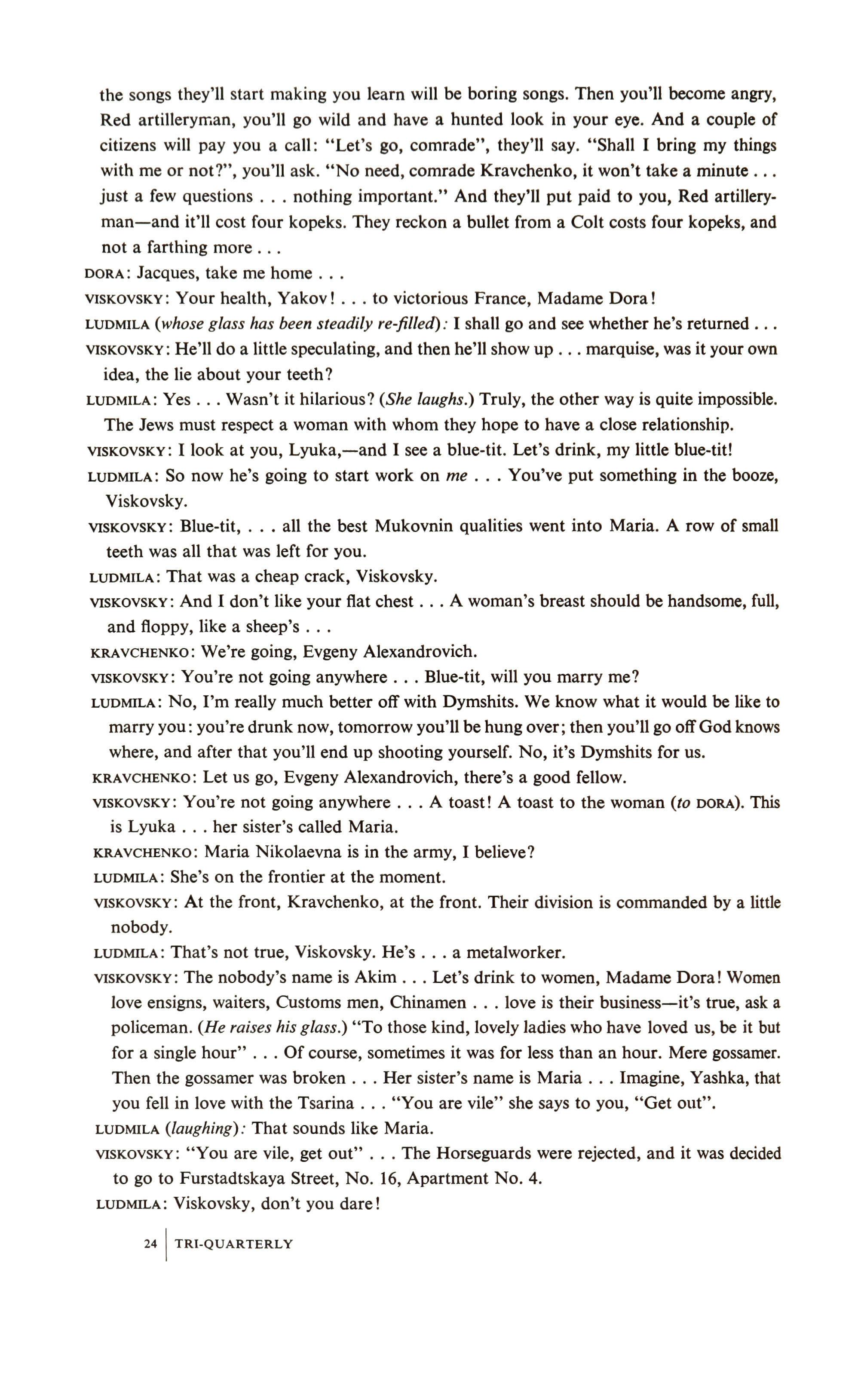
the songs they'll start making you learn will be boring songs. Then you'll become angry, Red artilleryman, you'll go wild and have a hunted look in your eye. And a couple of citizens will pay you a call: "Let's go, comrade", they'll say. "Shall I bring my things with me or not?", you'll ask. "No need, comrade Kravchenko, it won't take a minute just a few questions nothing important." And they'll put paid to you, Red artilleryman and it'll cost four kopeks. They reckon a bullet from a Colt costs four kopeks, and not a farthing more
DORA: Jacques, take me home
VISKOVSKY: Your health, Yakov! to victorious France, Madame Dora!
LUDMILA (whose glass has been steadily re-filled): I shall go and see whether he's returned
VISKOVSKY: He'll do a little speculating, and then he'll show up marquise, was it your own idea, the lie about your teeth?
LUDMILA: Yes Wasn't it hilarious? (She laughs.) Truly, the other way is quite impossible. The Jews must respect a woman with whom they hope to have a close relationship.
VISKOVSKY: I look at you, Lyuka, and I see a blue-tit. Let's drink, my little blue-tit!
LUDMILA: SO now he's going to start work on me
You've put something in the booze, Viskovsky.
VISKOVSKY: Blue-tit, all the best Mukovnin qualities went into Maria. A row of small teeth was all that was left for you.
LUDMILA: That was a cheap crack, Viskovsky.
VISKOVSKY: And I don't like your flat chest A woman's breast should be handsome, full, and floppy, like a sheep's
KRAVCHENKO: We're going, Evgeny Alexandrovich.
VISKOVSKY: You're not going anywhere Blue-tit, will you marry me?
LUDMILA: No, I'm really much better off with Dymshits. We know what it would be like to marry you: you're drunk now, tomorrow you'll be hung over; then you'll go off God knows where, and after that you'll end up shooting yourself. No, it's Dymshits for us.
KRAVCHENKO: Let us go, Evgeny Alexandrovich, there's a good fellow.
VISKOVSKY: You're not going anywhere A toast! A toast to the woman (to DORA). 'Ibis is Lyuka her sister's called Maria.
KRAVCHENKO: Maria Nikolaevna is in the army, I believe?
LUDMILA: She's on the frontier at the moment.
VISKOVSKY: At the front, Kravchenko, at the front. Their division is commanded by a little nobody.
LUDMILA: That's not true, Viskovsky. He's a metalworker.
VISKOVSKY: The nobody's name is Akim Let's drink to women, Madame Dora! Women love ensigns, waiters, Customs men, Chinamen love is their business it's true, ask a policeman. (He raises his glass.) "To those kind, lovely ladies who have loved us, be it but for a single hour" Of course, sometimes it was for less than an hour. Mere gossamer. Then the gossamer was broken Her sister's name is Maria Imagine, Yashka, that you fell in love with the Tsarina "You are vile" she says to you, "Get 0\1t".
LUDMILA (laughing): That sounds like Maria.
VISKOVSKY: "You are vile, get out" The Horseguards were rejected, and it was decided to go to Furstadtskaya Street, No. 16, Apartment No.4.
LUDMILA: Viskovsky, don't you dare!
24 TRI·QUARTERLY
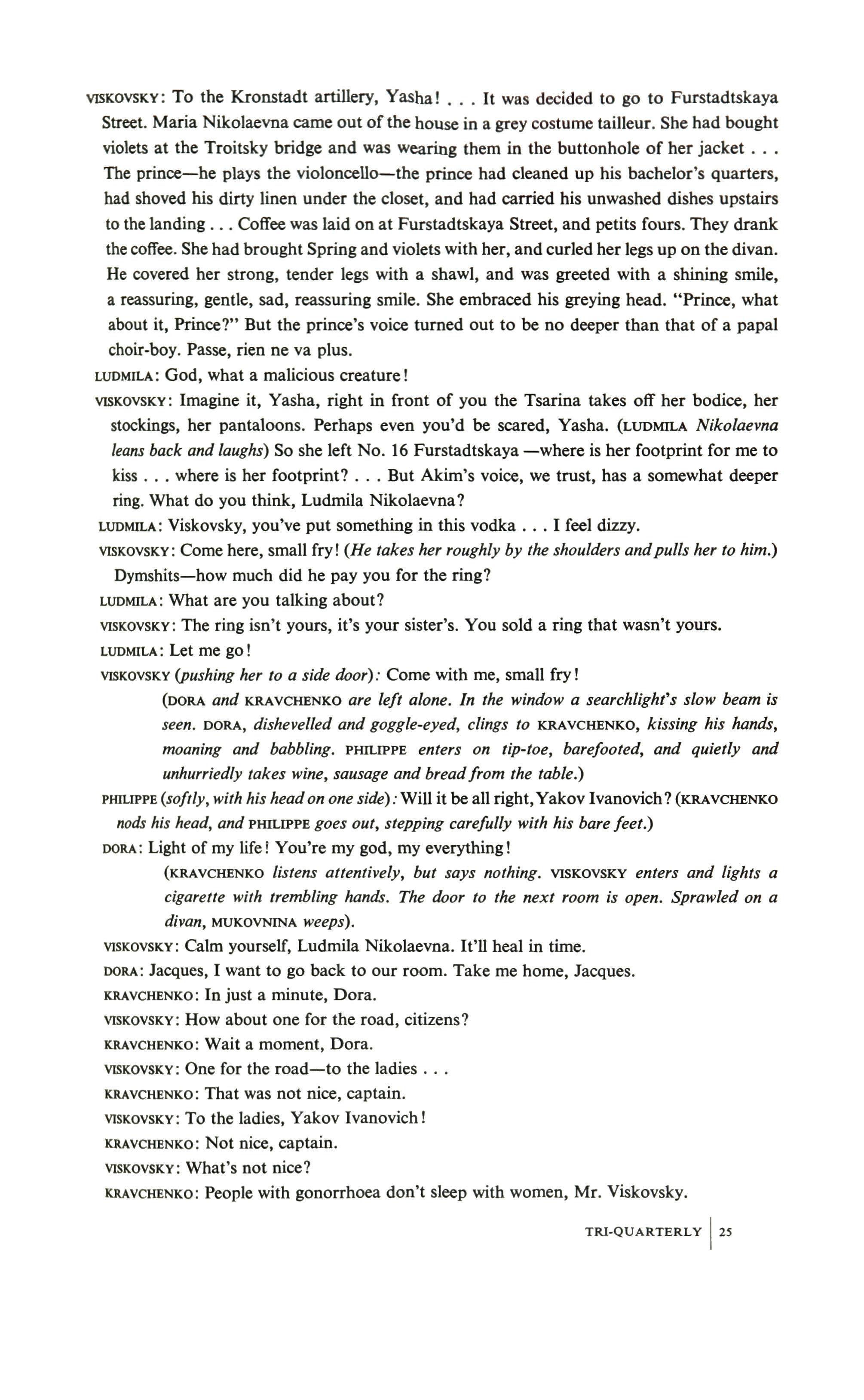
VISICOVSICV: To the Kronstadt artillery, Yasha! It was decided to go to Furstadtskaya Street. Maria Nikolaevna came out of the house in a grey costume tailleur. She had bought violets at the Troitsky bridge and was wearing them in the buttonhole of her jacket The prince he plays the violoncello the prince had cleaned up his bachelor's quarters, had shoved his dil ty linen under the closet, and had carried his unwashed dishes upstairs to the landing Coffee was laid on at Furstadtskaya Street, and petits fours. They drank the coffee. She had brought Spring and violets with her, and curled her legs up on the divan. He covered her strong, tender legs with a shawl, and was greeted with as" smile, a reassuring, gentle, sad, reassuring smile. She embraced his greying head. "Prince, what about it, Prince?" But the prince's voice turned out to be no deeper than that of a papal choir-boy. Passe, rien ne va plus.
LUDMILA: God, what a malicious creature!
VlSKOVSICV: Imagine it, Yasha, right in front of you the Tsarina takes off her bodice, her stockings, her pantaloons. Perhaps even you'd be scared, Yasha. (LUDMILA Nikolaevna leans back and laughs) So she left No. 16 Furstadtskaya where is her footprint for me to kiss where is her footprint? But Akirn's voice, we trust, has a somewhat deeper ring. What do you think, Ludmila Nikolaevna?
LUDMILA: Viskovsky, you've put something in this vodka I feel dizzy.
VlSKOVSKV: Come here, small fry! (He takes her roughly by the shoulders andpulls her to him.) Dymshits how much did he pay you for the ring?
LUDMILA: What are you talking about?
VlSKOVSKV: The ring isn't yours, it's your sister's. You sold a ring that wasn't yours.
LUDMILA: Let me go !
VlSKOVSKY (pushing her to a side door); Come with me, small fry! (DORA and ICRAVCHENICO are left alone. In the window a searchlight's slow beam is seen. DORA, dishevelled and goggle-eyed, clings to ICRAVCHENICO, kissing his hands, moaning and babbling. PHILIPPE enters on tip-toe, barefooted, and quietly and unhurriedly takes wine, sausage and breadfrom the table.)
P.lfiLIPPE (softly, with his head on one side);Will it be all right,Yakov Ivanovich? (ICRAVCHENICO nods his head, and PHILIPPE goes out, stepping carefully with his bare feet.)
DORA: Light of my life! You're my god, my everything!
(KRAVCHENKO listens attentively, but says nothing. VlSKOVSKY enters and lights a cigarette with trembling hands. The door to the next room is open. Sprawled on a divan, MUKOVNINA weeps).
V1SKOVSKY: Calm yourself, Ludmila Nikolaevna. It'll heal in time.
DORA: Jacques, I want to go back to our room. Take me home, Jacques.
KRAVCHENKO: In just a minute, Dora.
V1SKOVSKY: How about one for the road, citizens?
KRAVCHENKO: Wait a moment, Dora,
VlSKOVSKY: One for the road to the ladies
KRAVCHENlCO: That was not nice, captain.
V1SKOVSKY: To the ladies, Yakov Ivanovich!
KRAVCHENKO: Not nice, captain.
VlSKOVSKY: What's not nice?
KRAVCHENKO: People with gonorrhoea don't sleep with women, Mr. Viskovsky.
TRI-QUAR'IERLY
2S
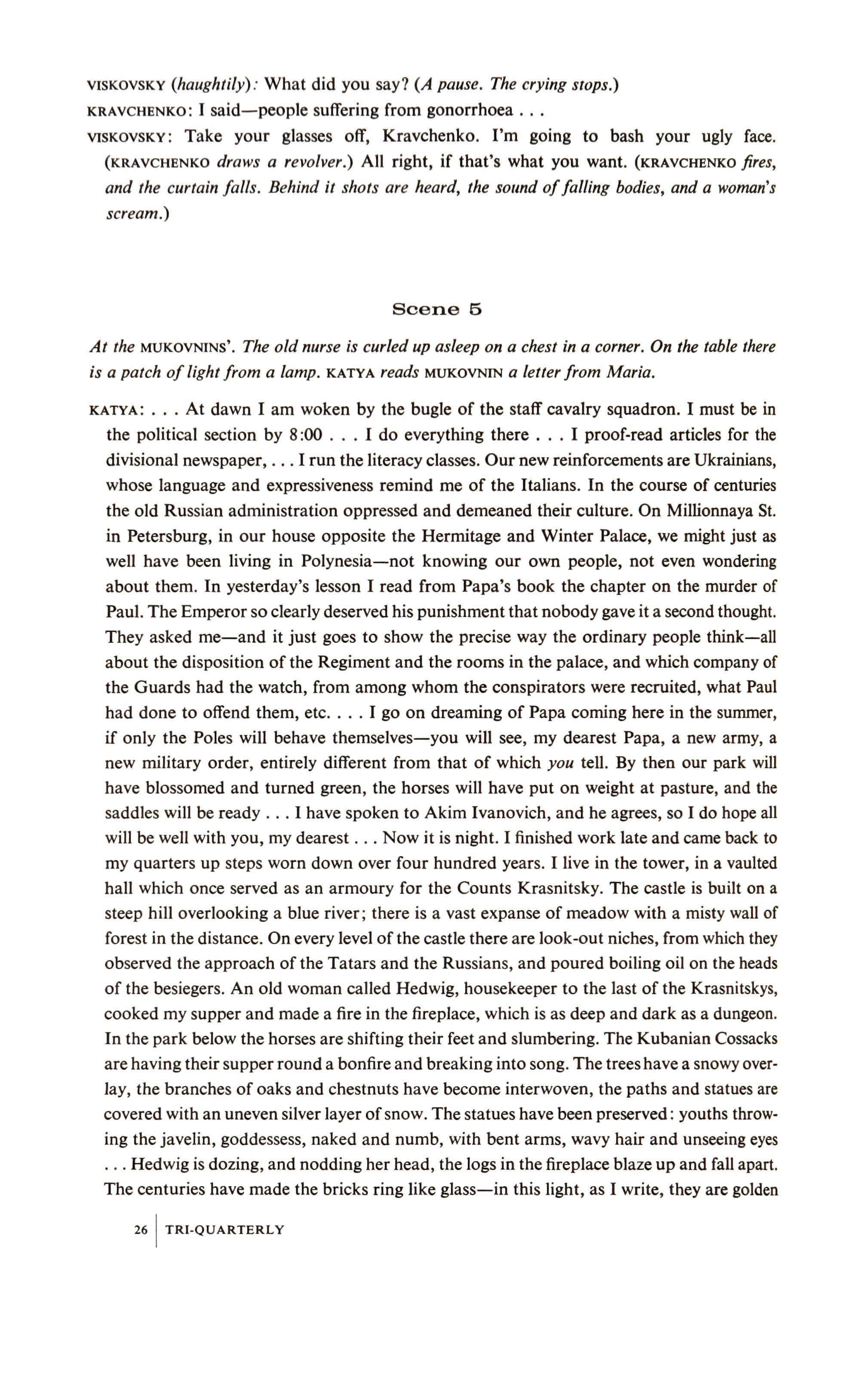
VISKOVSKY (haughtily): What did you say? (A pause. The crying SlOpS.)
KRAVCHENKO: I said people suffering from gonorrhoea
VISKOVSKY: Take your glasses off, Kravchenko. I'm going to bash your ugly face. (KRAVCHENKO draws a revolver.) All right, if that's what you want. (KRAVCHENKO fires, and the curtain falls. Behind it shots are heard, the sound offalling bodies, and a woman's scream.)
Scene 5
At the MUKOVNINS'. The old nurse is curled up asleep on a chest in a corner. On the table there is a patch oflightfrom a lamp. KATYA reads MUKOVNIN a letter from Maria.
KATYA: At dawn I am woken by the bugle of the staff cavalry squadron. I must be in the political section by 8:00 I do everything there I proof-read articles for the divisional newspaper, I run the literacy classes. Our new reinforcements are Ukrainians, whose language and expressiveness remind me of the Italians. In the course of centuries the old Russian administration oppressed and demeaned their culture. On Millionnaya St. in Petersburg, in our house opposite the Hermitage and Winter Palace, we might just as well have been living in Polynesia not knowing our own people, not even wondering about them. In yesterday's lesson I read from Papa's book the chapter on the murder of Paul. The Emperor so clearly deserved his punishment that nobody gave it a second thought. They asked me and it just goes to show the precise way the ordinary people think all about the disposition of the Regiment and the rooms in the palace, and which company of the Guards had the watch, from among whom the conspirators were recruited, what Paul had done to offend them, etc I go on dreaming of Papa coming here in the summer, if only the Poles will behave themselves you will see, my dearest Papa, a new army, a new military order, entirely different from that of which you tell. By then our park will have blossomed and turned green, the horses will have put on weight at pasture, and the saddles will be ready I have spoken to Akim Ivanovich, and he agrees, so I do hope all will be well with you, my dearest Now it is night. I finished work late and came back to my quarters up steps worn down over four hundred years. I live in the tower, in a vaulted hall which once served as an armoury for the Counts Krasnitsky. The castle is built on a steep hill overlooking a blue river; there is a vast expanse of meadow with a misty wall of forest in the distance. On every level of the castle there are look-out niches, from which they observed the approach of the Tatars and the Russians, and poured boiling oil on the heads of the besiegers. An old woman called Hedwig, housekeeper to the last of the Krasnitskys, cooked my supper and made a fire in the fireplace, which is as deep and dark as a dungeon. In the park below the horses are shifting their feet and slumbering. The Kubanian Cossacks are having their supper round a bonfire and breaking into song. The trees have a snowy overlay, the branches of oaks and chestnuts have become interwoven, the paths and statues are covered with an uneven silver layer of snow. The statues have been preserved: youths throwing the javelin, goddessess, naked and numb, with bent arms, wavy hair and unseeing eyes Hedwig is dozing, and nodding her head, the logs in the fireplace blaze up and fall apart. The centuries have made the bricks ring like glass in this light, as I write, they are golden
26 TRI-QUARTERLY
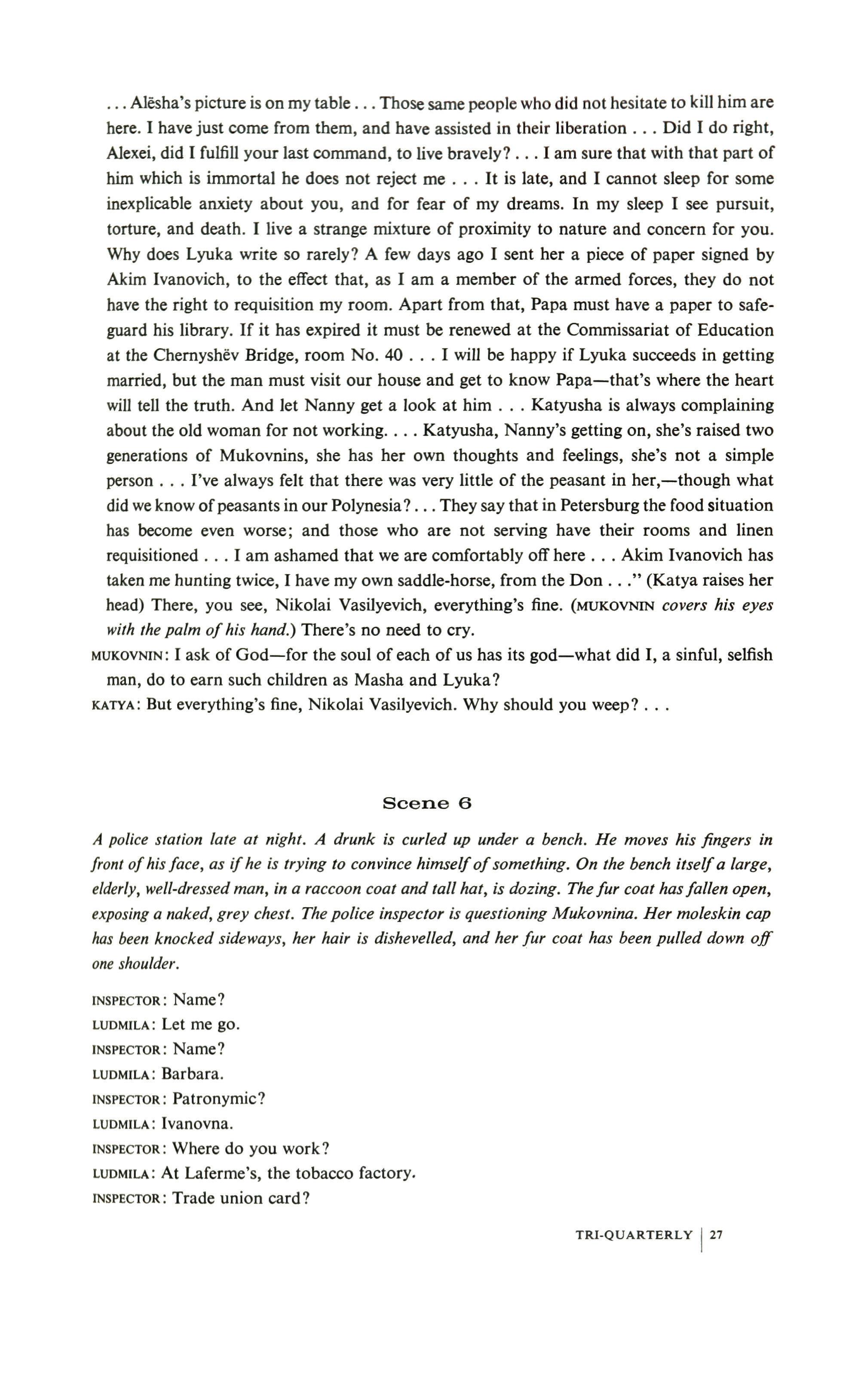
Alesha's picture is on my table Those same people who did not hesitate to kill him are here. I have just come from them, and have assisted in their liberation Did I do right, Alexei, did I fulfill your last command, to live bravely? I am sure that with that part of him which is immortal he does not reject me It is late, and I cannot sleep for some inexplicable anxiety about you, and for fear of my dreams. In my sleep I see pursuit, torture, and death. I live a strange mixture of proximity to nature and concern for you. Why does Lyuka write so rarely? A few days ago I sent her a piece of paper signed by Akim Ivanovich, to the effect that, as I am a member of the armed forces, they do not have the right to requisition my room. Apart from that, Papa must have a paper to safeguard his library. If it has expired it must be renewed at the Commissariat of Education at the Chernyshev Bridge, room No. 40 I will be happy if Lyuka succeeds in getting married, but the man must visit our house and get to know Papa that's where the heart will tell the truth. And let Nanny get a look at him Katyusha is always complaining about the old woman for not working Katyusha, Nanny's getting on, she's raised two generations of Mukovnins, she has her own thoughts and feelings, she's not a simple person I've always felt that there was very little of the peasant in her, though what did we know ofpeasants in our Polynesia? They say that in Petersburg the food situation has become even worse; and those who are not serving have their rooms and linen requisitioned I am ashamed that we are comfortably off here Akim Ivanovich has taken me hunting twice, I have my own saddle-horse, from the Don (Katya raises her head) There, you see, Nikolai Vasilyevich, everything's fine. (MUKOVNIN covers his eyes with the palm of his hand.) There's no need to cry.
MUKOVNIN: I ask of God for the soul of each of us has its god what did I, a sinful, selfish man, do to earn such children as Masha and Lyuka?
KATYA: But everything's fine, Nikolai Vasilyevich. Why should you weep?
Scene 6
A police station late at night. A drunk is curled up under a bench. He moves his fingers in front ofhis face, as ifhe is trying to convince himselfofsomething. On the bench itself a large, elderly, well-dressed man, in a raccoon coat and tall hat, is dozing. The fur coat hasfallen open, exposing a naked, grey chest. The po/ice inspector is questioning Mukovnina. Her moleskin cap has been knocked sideways, her hair is dishevelled, and her fur coat has been pulled down off one shoulder.
INSPECTOR: Name?
LUDMILA: Let me go.
INSPECTOR: Name?
LUDMILA: Barbara.
INSPECTOR: Patronymic?
LUDMILA: Ivanovna.
INSPECTOR: Where do you work?
LUDMILA: At Laferme's, the tobacco factory.
INSPECTOR: Trade union card?
TRI-QUARTERLY 27
LUDMILA: I don't have it with me.
INSPECTOR: Why are you lying?
LUDMILA: I'm a married woman let me go.
INSPECTOR: Why does it interest you to tell lies? Have you known Brylev long?
LUDMILA: I don't know what you're talking about.
INSPECTOR: Brylev signed authorization for reels of cotton. They went via you to Gutman. Where did you have your depot?
LUDMILA: What are you talking about? What depot?
INSPECTOR: You'll find out presently. (to a policeman) Call Kalrnykova. (thepoliceman brings in Shura KALMYKOVA, the maid at the 86, Nevsky Prospect, lodgings.) You are a lodginghouse servant?
KALMYKOVA: I'm a replacement.
INSPECTOR: Do you know this woman?
KALMYKOVA: I know her ever so well.
INSPECTOR: What can you tell US?
KAUIYKOVA: You ask, I'll answer Their father's a general.
INSPECTOR: Does she do anything?
KALMYKOVA: She makes love that's what she does.
INSPECTOR: Is there a husband?
KALMYKOVA: A wedding in the woods She's got lots of husbands. One of them had to sit in the toilet all evening because of her teeth.
INSPECTOR: What teeth? What's this nonsense?
KALMYKOVA: Ludmila Nikolaevna knows what teeth.
INSPECTOR (to MUKOVNINA): Did you have clients? How many?
LUDMILA: I'm infected I'm ill.
INSPECTOR: We must ascertain how many clients there are.
KALMYKOVA: That I don't know, that I won't say. I won't say what I don't know.
LUDMILA: I'm quite worn out. Let me go.
INSPECTOR: Don't get excited. Look at me.
LUDMILA: I feel faint I shall fall.
INSPECTOR: Look at me!
LUDMILA: My God, why should I look at you?
INSPECTOR (furiously): Because for five whole days and nights I haven't had any sleep. Can you understand that?
LUDMILA: I understand.
INSPECTOR (coming close to her, taking her by the shoulders, and looking into her eyes): How many clients? Speak!

Scene 7
At the MUKOVNINS'. Oil lamps are burning, creating shadows on the walls and ceiling. In front 0/ an illuminated ikon GOLYTSIN is praying. The nurse is asleep on the chest.
GOLYTSIN: Verily, verily I say unto you: Except a com of wheat fall into the ground and
28 TRI-QUARTERLY

die, it abideth alone: but if it die, it bringeth forth much fruit. He that loveth his life shall lose it; and he that hateth his life in this world shall keep it unto life eternal. If any man serve me, let him follow me: and where I am, there shall also my servant be: if any man serve me, him shall my Father honour. Now is my soul troubled: and what shall I say? Father, save me from this hour: but for this cause came I unto this hour
KATYA (approaching quietly, standing beside him, and putting her head on his shoulder): My meetings with Redko take place in the H.Q. building, Sergei Illarionovich, in the old ante-room. There's an oilskin divan there. I arrive, Redko locks the door, and then later on it's unlocked again.
OOLYTSIN: I see.
KATYA: I'm going away to Borisoglebsk, Prince.
OOLYTSIN: Well, then, go.
KATYA: Redko teaches me everything who to love, who to hate he says it's the law of the big numbers. Yet I'm a small number or doesn't that count?
GOLYTSIN: It has to count.
KATYA: There! It has to count Look, Nanny, I'm free Wake up. Please wake up. You'll sleep right through the heavenly kingdom.
NEFEDOVNA (raising her head): Where's Lyuka?
KATYA: Lyuka will come soon, Nanny, and I'm going away, so there'll be no one to scold you.
NEFEDOVNA: Why should I be scolded? What's it got to do with me? Nursing is in my blood, I was hired for the children, to raise the children, but there aren't any here. The house is full of women, but there aren't any children. One's gone off to fight, as if they couldn't manage without her the other's dithering around aimlessly What sort of house can it be without children?
KATYA: We'll bear you children by the Holy Ghost.
NEFEDOVNA: You're playing around and don't think I don't know it playing around, and there's no sense to it.
GOLYTSIN: Go off to Borisoglebsk, they need you there. It's a wilderness in Borisoglebsk, Katerina Vyacheslavna, a wilderness in which wild animals devour each other.
NEFEDOVNA: Look at the Molostovs miserable little merchants, but even they managed to get their nurse a pension, fifty rubles a month Make the effort for me, Prince. Why won't they give me a pension?
GOLYTSIN (lighting the stove): They won't listen to me, Nefedovna, I have no influence now.
NEFEDOVNA: But look at them they're just simple tradesmen.
(The door opens. MUKOVNIN backs away from PHll..IPPE, muffled up in rags and hood, huge and shapeless. He is wearingfelt boots.)
MUKOVNIN: Who are you?
PHILIPPE (drawing closer): A friend of Ludmila Nikolaevna.
MUKOVNIN: What do you want?
PHILIPPE: There's been some trouble over there, Your Excellency.
KATYA: Did Isaac Markovich send you?
PIULIPPE: Yes, ma'am. The trouble sort of started out of nothing.
KATYA: And Ludmila Nikolaevna?
PHILIPPE: She was there too, a group of them, there was they overdid it a bit, Your Excellency. Evgeny Alexandrovich said one thing, Yakov Ivanovich sort of contradicted
TRI-QUARTERLY
29
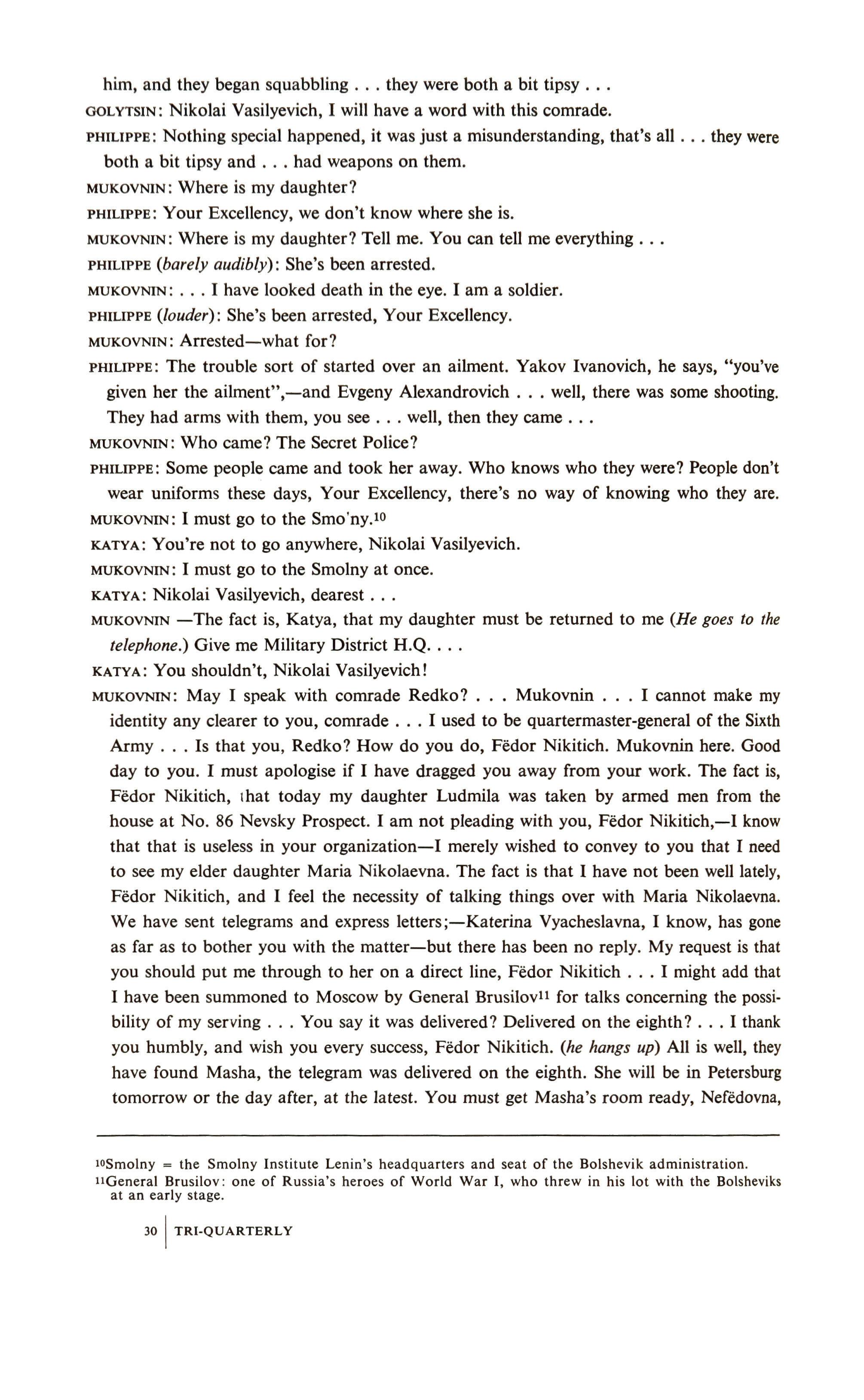
him, and they began squabbling they were both a bit tipsy
OOLYTSIN: Nikolai Vasilyevich, I will have a word with this comrade.
PHILIPPE: Nothing special happened, it was just a misunderstanding, that's all they were both a bit tipsy and had weapons on them.
MUKOVNlN: Where is my daughter?
PHILIPPE: Your Excellency, we don't know where she is.
MUKOVNIN: Where is my daughter? Tell me. You can tell me everything
PHILIPPE (barely audibly): She's been arrested.
MUKOVNIN: I have looked death in the eye. I am a soldier.
PHILIPPE (louder): She's been arrested, Your Excellency.
MUKOVNIN: Arrested what for?
PHILIPPE: The trouble sort of started over an ailment. Yakov Ivanovich, he says, "you've given her the ailment", and Evgeny Alexandrovich well, there was some shooting. They had arms with them, you see well, then they came
MUKOVNIN: Who came? The Secret Police?
PHILIPPE: Some people came and took her away. Who knows who they were? People don't wear uniforms these days, Your Excellency, there's no way of knowing who they are.
MUKOVNIN: I must go to the Smo'ny.w
KATYA: You're not to go anywhere, Nikolai Vasilyevich.
MUKOVNIN: I must go to the Smolny at once.
KATYA: Nikolai Vasilyevich, dearest
MUKOVNIN The fact is, Katya, that my daughter must be returned to me (He goes to the telephone.) Give me Military District H.Q
KATYA: You shouldn't, Nikolai Vasilyevich!
MUKOVNIN: May I speak with comrade Redko? Mukovnin I cannot make my identity any clearer to you, comrade I used to be quartermaster-general of the Sixth Army Is that you, Redko? How do you do, Fedor Nikitich. Mukovnin here. Good day to you. I must apologise if I have dragged you away from your work. The fact is, Fedor Nikitich, that today my daughter Ludmila was taken by armed men from the house at No. 86 Nevsky Prospect. I am not pleading with you, Fedor Nikitich, I know that that is useless in your organization I merely wished to convey to you that I need to see my elder daughter Maria Nikolaevna. The fact is that I have not been well lately, Fedor Nikitich, and I feel the necessity of talking things over with Maria Nikolaevna. We have sent telegrams and express letters; Katerina Vyacheslavna, I know, has gone as far as to bother you with the matter but there has been no reply. My request is that you should put me through to her on a direct line, Fedor Nikitich I might add that I have been summoned to Moscow by General Brusilovu for talks concerning the possibility of my serving You say it was delivered? Delivered on the eighth? I thank you humbly, and wish you every success, Fedor Nikitich. (he hangs up) All is well, they have found Masha, the telegram was delivered on the eighth. She will be in Petersburg tomorrow or the day after, at the latest. You must get Masha's room ready, Nefedovna,
IOSmolny the Smolny Institute Lenin's headquarters and seat of the Bolshevik administration. IIGeneral Brusilov: one of Russia's heroes of World War I, who threw in his lot with the Bolsheviks at an early stage.
30 TRI-QUARTERLY
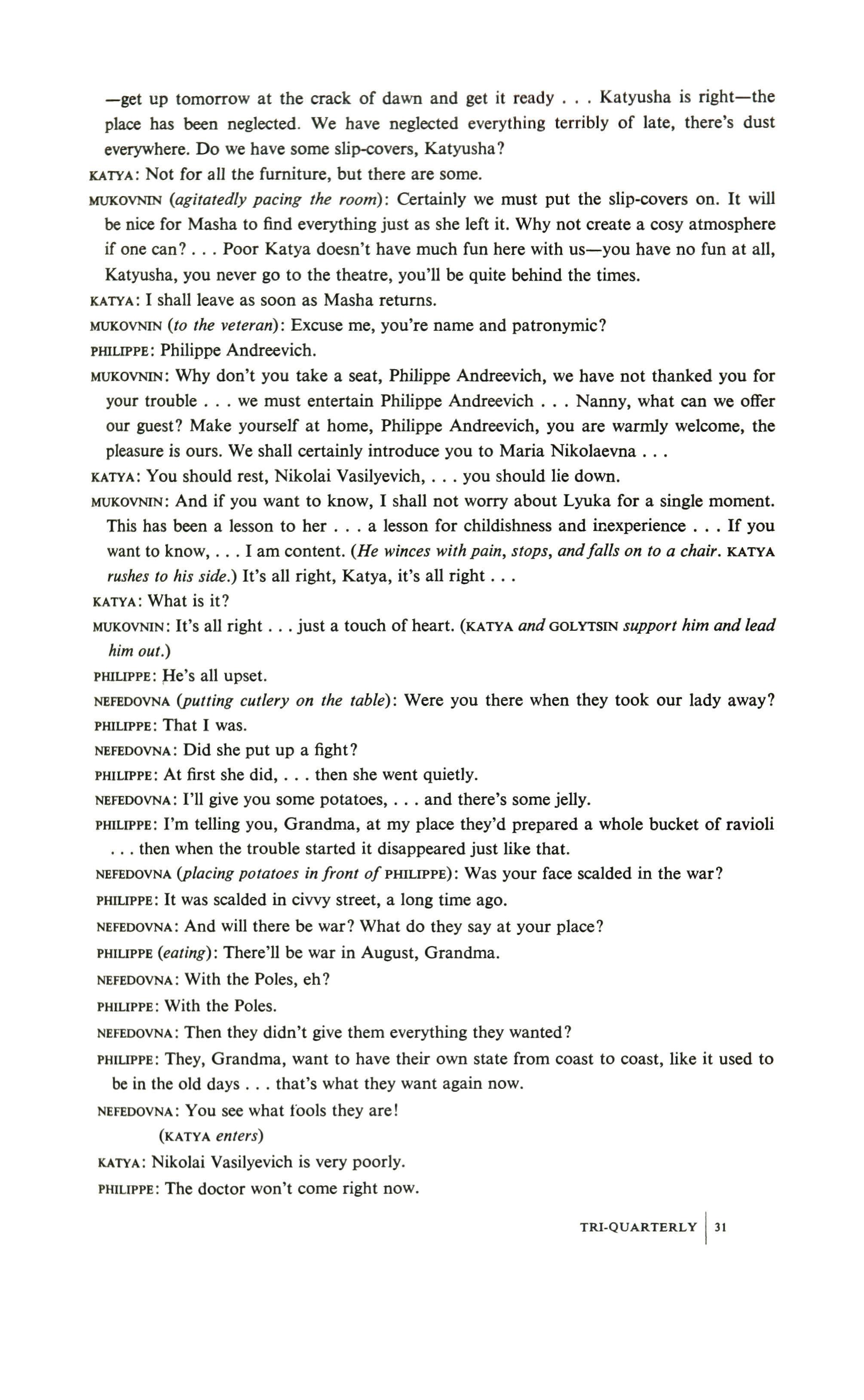
-g,et up tomorrow at the crack of dawn and get it ready Katyusha is right the place has been neglected. We have neglected everything terribly of late, there's dust everywhere. Do we have some slip-covers, Katyusha?
KATYA: Not for all the furniture, but there are some.
MUKOVNIN (agitatedly pacing the room): Certainly we must put the slip-covers on. It will be nice for Masha to find everything just as she left it. Why not create a cosy atmosphere if one can? Poor Katya doesn't have much fun here with us you have no fun at all, Katyusha, you never go to the theatre, you'll be quite behind the times.
KATYA: I shall leave as soon as Masha returns.
MUKOVNIN (to the veteran): Excuse me, you're name and patronymic?
PIDLIPPE: Philippe Andreevich.
MUKOVNIN: Why don't you take a seat, Philippe Andreevich, we have not thanked you for your trouble we must entertain Philippe Andreevich Nanny, what can we offer our guest? Make yourself at home, Philippe Andreevich, you are warmly welcome, the pleasure is ours. We shall certainly introduce you to Maria Nikolaevna
KATYA: You should rest, Nikolai Vasilyevich, you should lie down.
MUKOVNIN: And if you want to know, I shall not worry about Lyuka for a single moment. This has been a lesson to her a lesson for childishness and inexperience If you want to know, I am content. (He winces with pain, stops, andfalls on to a chair. KATYA rushes to his side.) It's all right, Katya, it's all right
KATYA: What is it?
MUKOVNIN: It's all right just a touch of heart. (KATYA and GOLYTSIN support him and lead him out.)
PHILIPPE: He's all upset.
NEFEDOVNA (putting cutlery on the table): Were you there when they took our lady away?
PHILIPPE: That I was.
NEFEDOVNA: Did she put up a fight?
PIDLIPPE: At first she did, then she went quietly.
NEFEDOVNA: I'll give you some potatoes, and there's some jelly.
PHILIPPE: I'm telling you, Grandma, at my place they'd prepared a whole bucket of ravioli then when the trouble started it disappeared just like that.
NEFEDOVNA (placing potatoes in front O/PHILIPPE): Was your face scalded in the war?
PHU,IPPE: It was scalded in civvy street, a long time ago.
NEFEDOVNA: And will there be war? What do they say at your place?
PHILIPPE (eating): There'll be war in August, Grandma.
NEFEDOVNA: With the Poles, eh?
PHILIPPE: With the Poles.
NEFEDOVNA: Then they didn't give them everything they wanted?
PHILIPPE: They, Grandma, want to have their own state from coast to coast, like it used to be in the old days that's what they want again now.
NEFEDOVNA: You see what tools they are!
(KATYA enters)
KATYA: Nikolai Vasilyevich is very poorly.
PHILIPPE: The doctor won't come right now.
TRI-QUARTERLY 31

KATYA: He's dying, Nanny, his nose is blue you can already see what he'll look like when he's dead
PHILIPPE: Lady, the doctors have locked themselves in. You won't get one out at night even at the point of a gun.
KATYA: We must go to the chemist's for oxygen.
PHILIPPE: Is His Excellency a union man?
KATYA: I don't know we know nothing in this house.
PHILIPPE: They won't give it unless he's a union man. (A bell rings shrilly. PHILIPPE goes to open the door, and returns.) It's there Maria Nikolaevna
KATYA: Masha?! (KATYA steps forward, stretches out her arms, and weeps. She stops, covers her face with her hands, and then takes them away. A Red soldier of about nineteen stands before her a long-legged boy pulling a bag. GOLYTSIN enters, and stops by the door.)
RED SOLDIER: How do you do.
KATYA: My God, isn't it Masha?
RED SOLDIER: Here are some provisions for you from Maria Nikolaevna.
KATYA: Where is she? Is she with you?
RED SOLDIER: Maria Nikolaevna is with the division. Everyone is at his post right now I have some things here for you some boots
KATYA: She didn't come with you?
RED SOLDIER: Comrades, there are battles going on over there how could she?
KATYA: We sent telegrams, letters
RED SOLDIER: Doesn't matter what you send, it's all the same. Units are on the move day and night.
KATYA: Will you see her?
RED SOLDIER: Of course I'll see her If you'd like me to give her a message
KATYA: Yes, please tell her tell her that her father is dying and we don't think we can save him. Tell her that on his death-bed he called for her her sister Lyuka is no longer here with us she has been arrested. Tell her that we wish Maria Nikolaevna good fortune, we want her not to think of those days and hours when she was not here with us (The soldier looks around him and steps back as MUKOVNIN staggersfrom his room. His eyes are wandering, his hair is dishevelled. He is smiling.)
MUKOVNIN: You see, Masha! You were not here, but I was all right. I went on being a fine fellow, Masha. (He sees the soldier.) Who's this? (Again,louder.) Who's this? Who's this? (He falls.)
NEFEDOVNA (kneeling beside him): Well, Kolya, are you passing away without waiting for old Nanny?
(The old man's throat rattles, and he breathes his last.)
Scene 8
At the MUKoVNINs'. Noon. Bright daylight. In the window can be seen the sun-lit columns of the Hermitage, and a corner of the Winter Palace. The reception-room is empty. In the background ANDREI and the apprentice KUZMA, a fat-faced boy, are polishing the parquet floor. AGASHA is shouting out of the window.
32 TRI-QUARTERLY
I
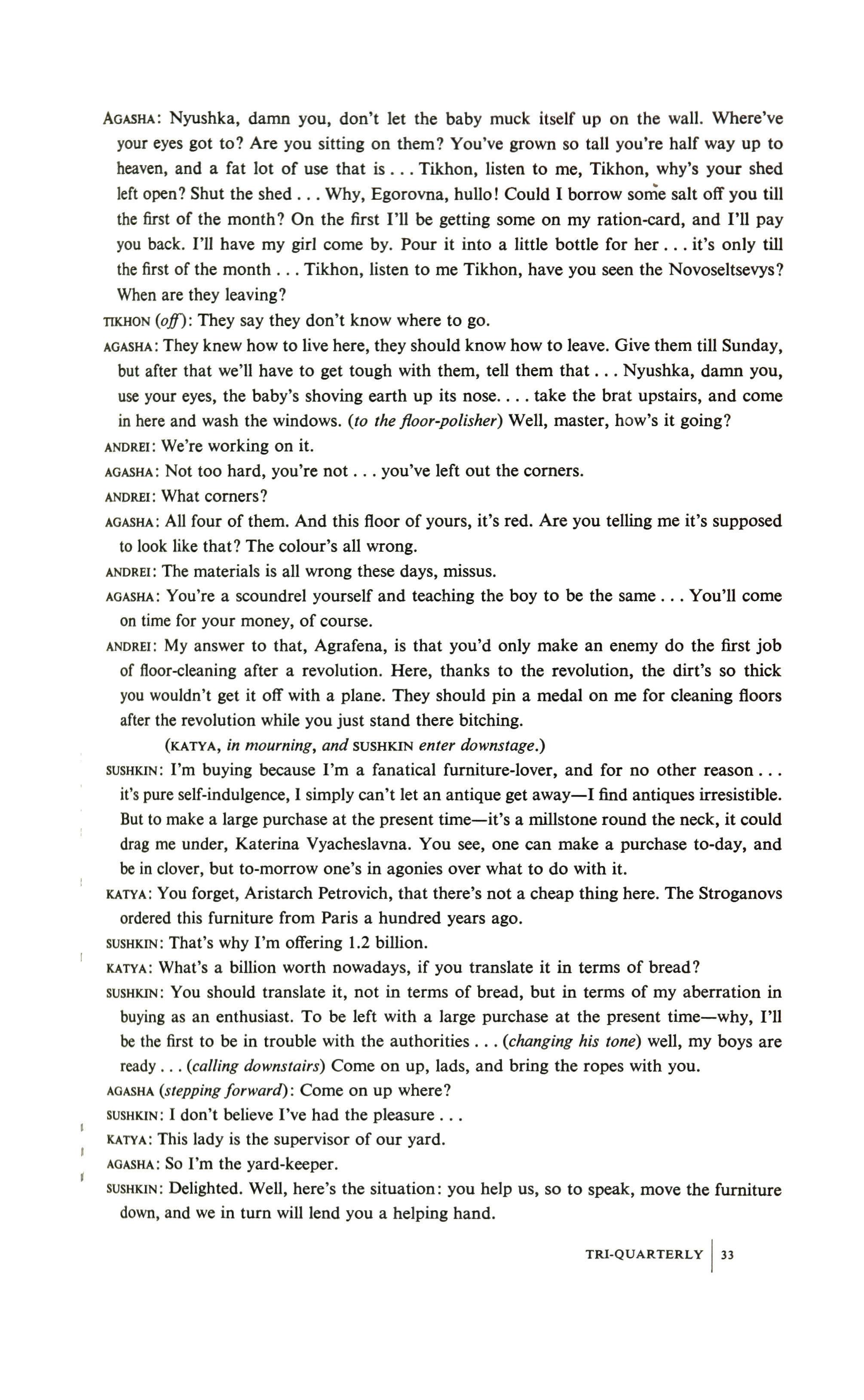
AGASHA: Nyushka, damn you, don't let the baby muck itself up on the wall. Where've your eyes got to? Are you sitting on them? You've grown so tall you're half way up to heaven, and a fat lot of use that is Tikhon, listen to me, Tikhon, why's your shed left open? Shut the shed Why, Egorovna, hullo! Could I borrow some salt off you till the first of the month? On the first I'll be getting some on my ration-card, and I'll pay you back. I'll have my girl come by. Pour it into a little bottle for her it's only till the first of the month Tikhon, listen to me Tikhon, have you seen the Novoseltsevys? When are they leaving?
TIKHON (off): They say they don't know where to go.
AGASHA: They knew how to live here, they should know how to leave. Give them till Sunday, but after that we'll have to get tough with them, tell them that Nyushka, damn you, use your eyes, the baby's shoving earth up its nose take the brat upstairs, and come in here and wash the windows. (to the floor-polisher) Well, master, how's it going?
ANDREI: We're working on it.
AGASHA: Not too hard, you're not you've left out the comers.
ANDREI: What corners?
AGASHA: All four of them. And this floor of yours, it's red. Are you telling me it's supposed to look like that? The colour's all wrong.
ANDREI: The materials is all wrong these days, rnissus.
AGASHA: You're a scoundrel yourself and teaching the boy to be the same You'll come on time for your money, of course.
ANDREI: My answer to that, Agrafena, is that you'd only make an enemy do the first job of floor-cleaning after a revolution. Here, thanks to the revolution, the dirt's so thick you wouldn't get it off with a plane. They should pin a medal on me for cleaning floors after the revolution while you just stand there bitching. (KATYA, in mourning, and SUSHKIN enter downstage.)
SUSHKIN: I'm buying because I'm a fanatical furniture-lover, and for no other reason it's pure self-indulgence, I simply can't let an antique get away I find antiques irresistible. But to make a large purchase at the present time it's a millstone round the neck, it could drag me under, Katerina Vyacheslavna. You see, one can make a purchase to-day, and be in clover, but to-morrow one's in agonies over what to do with it.
KATYA: You forget, Aristarch Petrovich, that there's not a cheap thing here. The Stroganovs ordered this furniture from Paris a hundred years ago.
SUSHKIN: That's why I'm offering 1.2 billion.
KATYA: What's a billion worth nowadays, if you translate it in terms of bread?
SUSHKIN: You should translate it, not in terms of bread, but in terms of my aberration in buying as an enthusiast. To be left with a large purchase at the present time why, I'll be the first to be in trouble with the authorities (changing his tone) well, my boys are ready (calling downstairs) Come on up, lads, and bring the ropes with you.
AOASHA (steppingforward): Come on up where?
SUSHKlN: I don't believe I've had the pleasure
KATYA: This lady is the supervisor of our yard.
AGASHA: SO I'm the yard-keeper.
SUSHKlN: Delighted. Well, here's the situation: you help us, so to speak, move the furniture down, and we in turn will lend you a helping hand.
I TRl-QUARTERLY 33

AGASHA: You won't get away with it, citizen.
SUSHKIN: Just what, exactly, won't I get away with?
AGASHA: There are going to be new occupants here, people moving in from the basement.
SUSHKIN: Very interesting, I'm sure
AGASHA: Where are they going to get furniture from?
SUSHKIN: That, citizen, is no concern of ours.
KATYA: Agasha, Maria Nikolaevna instructed me to sell
SUSHKIN: Begging your pardon, citizen, but is the furniture yours?
AGASHA: No, and it's not yours, either.
SUSHKIN: My answer to that is firstly that you and I have nothing to say to each other, and secondly, that at this moment, citizen, you are making trouble for yourself.
AGASHA: You bring an authorization, and I'll release the furniture.
KATYA: The furniture belongs to Maria Nikolaevna. You know that.
AGASHA: Lady, I've forgotten what I used to know. Now I'm learning a new thing or two.
SUSHKIN: Watch out, woman, or you'll be really in it.
AGASHA: Watch your language, or I'll kick you out.
KATYA: Let's go, Aristarch Petrovich.
SUSHKIN: You're exceeding your authority, woman.
AGASHA: Bring an authorization, and I'll let it go.
SUSHKIN: There'll be another place to continue this discussion.
AGASHA: On Gorokhovaya Street12 if you like.
KATYA: Let's go, Aristarch Petrovich.
SUSHKIN: I'll go, but I'll be back, and I won't be alone, I'll have people with me.
AGASHA: It's not right what you're doing, lady.
(They go out. ANDREI and KUZMA finish their polishing and gather together their equipment.)
KUZMA: She let 'im have it good and proper.
ANDREI: Aye, a prickly woman, that one.
KUZMA: What about when the general was here?
ANDREI: When the general was here she lay low, didn't stick 'er neck out.
KUZMA: I suppose the general used to knock people about?
ANDREI: What do you mean, knock people about? He did nothing of the sort. You'd come to his house, he'd take your hand and give you a greeting. People liked him.
KUZMA: How could that be people liking a general?
ANDREI: It was silly, but we liked him. He didn't do any more harm than he had to. He used to chop his own firewood.
KUZMA: Was he old?
ANDREI: Not especially.
KUZMA: And he died.
ANDREI: A man dies, brother Kuzma, not when he's ready, but when 'is time comes.
(Enter AGASHA, the workman SAFONOV, a quiet, bonyfellow, and his wife ELENA, who is in the last days of pregnancy. She is a tall young woman, not more than about twenty years old, with a small, brightface. All three are laden with household chattels, dragging with them stools, mattresses, a primus stove etc.)
12i.e. at the police station.
34 TRI-QUARTERLY

ANDREI: Wait, wait let me find something for you to sit on.
AGASHA: Go in, Safonov, don't be afraid. This is where you'll be living.
ElENA: This place is too good for us.
AGASHA: Get used to something good.
ANDREI: Getting used to something good that's chickenfeed.
AGASHA: The kitchen's on the left There's the bathroom that's for washing yourselves. Well, householder, let's go and bring in the rest of your stuff. You sit yourself down, Elena, and don't walk around, or you'll miscarry. (AGASHA and SAFONOV go out.
ANDRI!I packs up his things brushes, buckets etc. and ELENA sits down on a stool.)
ANDREI: Congratulations on your new home.
ELENA: It's an uncomfortable sort of a place too big.
ANDREI: When are you due?
ELENA: I go in tomorrow.
ANDREI: It's that simple To the Moika, I suppose, to the palace?
ELENA: Yes.
ANDREI: That palace nowadays it's called the palace of mother and child was built originally by the Tsarina for a shepherd and now women have babies in it. And quite right too. It's simple logic.
ELENA: Yes, it's to-morrow I have to go. Part of the time I'm afraid, Uncle Andrei, and part of the time I'm not.
ANDREI: There's nothing to be afraid of. It's easier than falling off a log. A bit of a workout for the sinews and it'll all be over. You won't recognize yourself afterwards.
ELENA: I'm narrow in the bone, Uncle Andrei.
ANDREI: They'll ask it nicely and it'll move itself Sometimes you look at a woman, she looks as if she'd fall apart, there's no more to her than a pile of hair and tiny arms and legs and she brings into the world such a strapping little fellow, he'll drink vodka by the bucket and kill a bullock with his fist There's a knack to everything (He heaves his bag on to his shoulders.) Do you want a boy or a girl?
ELENA: It's all the same to me, Uncle Andrei.
ANDREI: You're right, it's all the same. The way I see it, the babies being turned out these days are bound to be in time for a good life. It stands to reason. (He gathers up his tools.) Let's go, Kuzma. (To ELENA) It's easier than falling off a log. There's a knack to everything Let's go, Cossack.
(The floor-polishers leave. ELENA opens the windows, and sunshine and street noises fill the room. Sticking out her stomach, she goes carefully along the walls, touches them, peeps into the adjoining rooms, turns on the chandelier, and then turns it off again. Enter NYUSHKA, a gross, purple-faced girl, with a bucket and rag, to clean the windows. She climbs up on the window-sill, and tucks in the hem of her dress above the knees. She is bathed in the sun's rays. Like a statue supporting the firmaments, she stands framed against the spring sky.)
ELENA: Will you come to my house-warming, Nyushka?
NYUSHKA (in a bass voice): If you invite me I'll come. What will I get?
ELENA: Not much. Whatever there is.
NYUSHKA: Give me something nice and sweet, something red. (Suddenly and piercingly she starts to sing.)
TRI-QUARTERLY 35
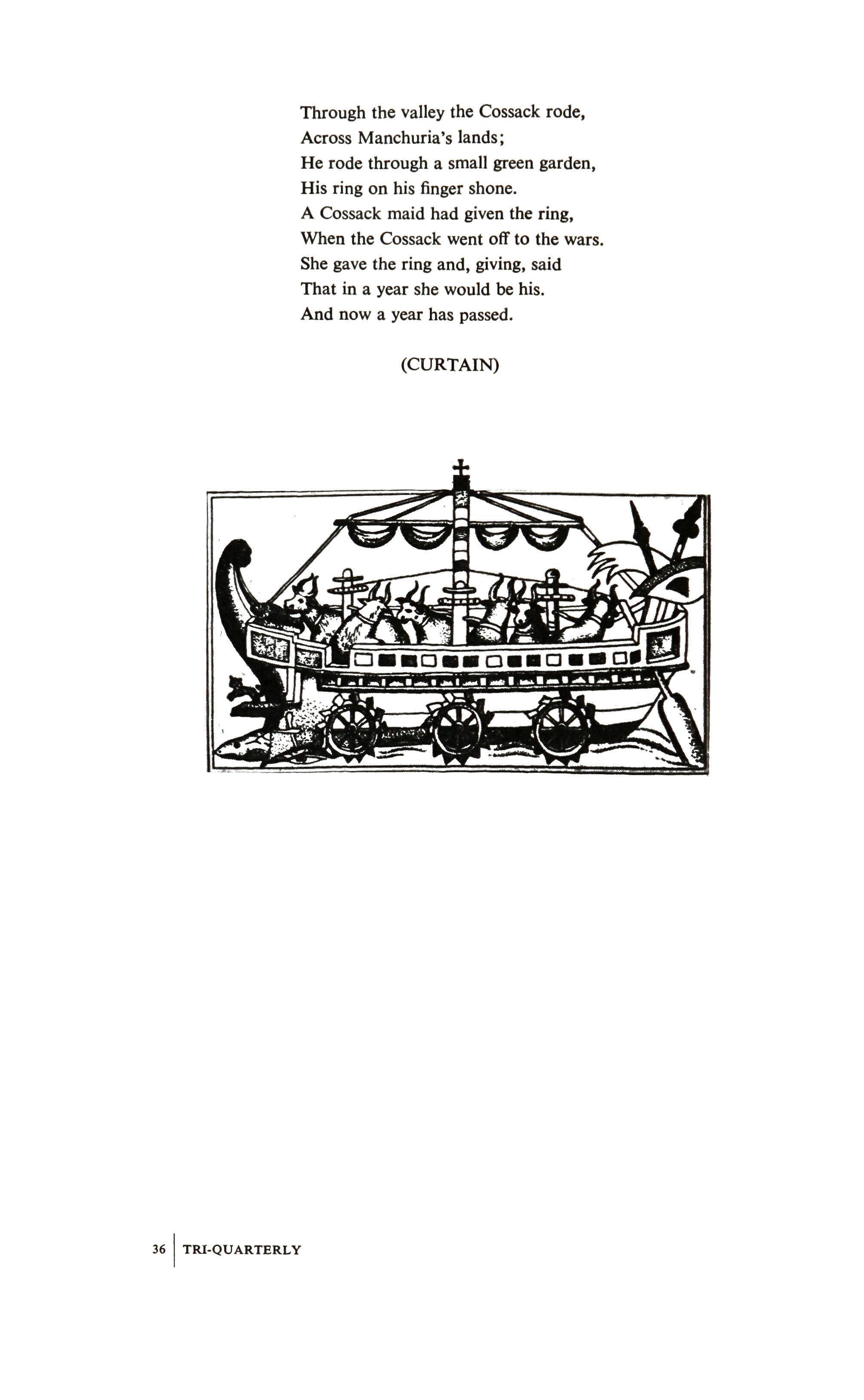
Through the valley the Cossack rode, Across Manchuria's lands; He rode through a small green garden, His ring on his finger shone. A Cossack maid had given the ring, When the Cossack went off to the wars. She gave the ring and, giving, said That in a year she would be his. And now a year has passed.
(CURTAIN)
36 TRI-QUARTERLY
STANLEY MOSS
The red fields
Should anyone care, I love those red fields of poppies growing under the wheat; imagine ten miles of it, fields, mountains, valleys, solid red; the Mediterranean to the south, blue to the end of the world, blue asI think of eyes, bookbindings, flags, I'm lousy on blue, but when I think of red I know what I'm talking about Damn fool poppies in Rome one spring, growing like dandelions; or the loner near the railroad track in Long Island, coming out of nowhere, impossible. Another thing about poppies, to pick one is to sleep with a woman who doesn't love you; a poppy gets that look on her face of "you rat you've done it." And I've seen poppies turn black at the first sign of the wind, and twenty miles of poppies in a storm, an ocean of blood you wouldn't dare cross, except dragged by a team of white horses.
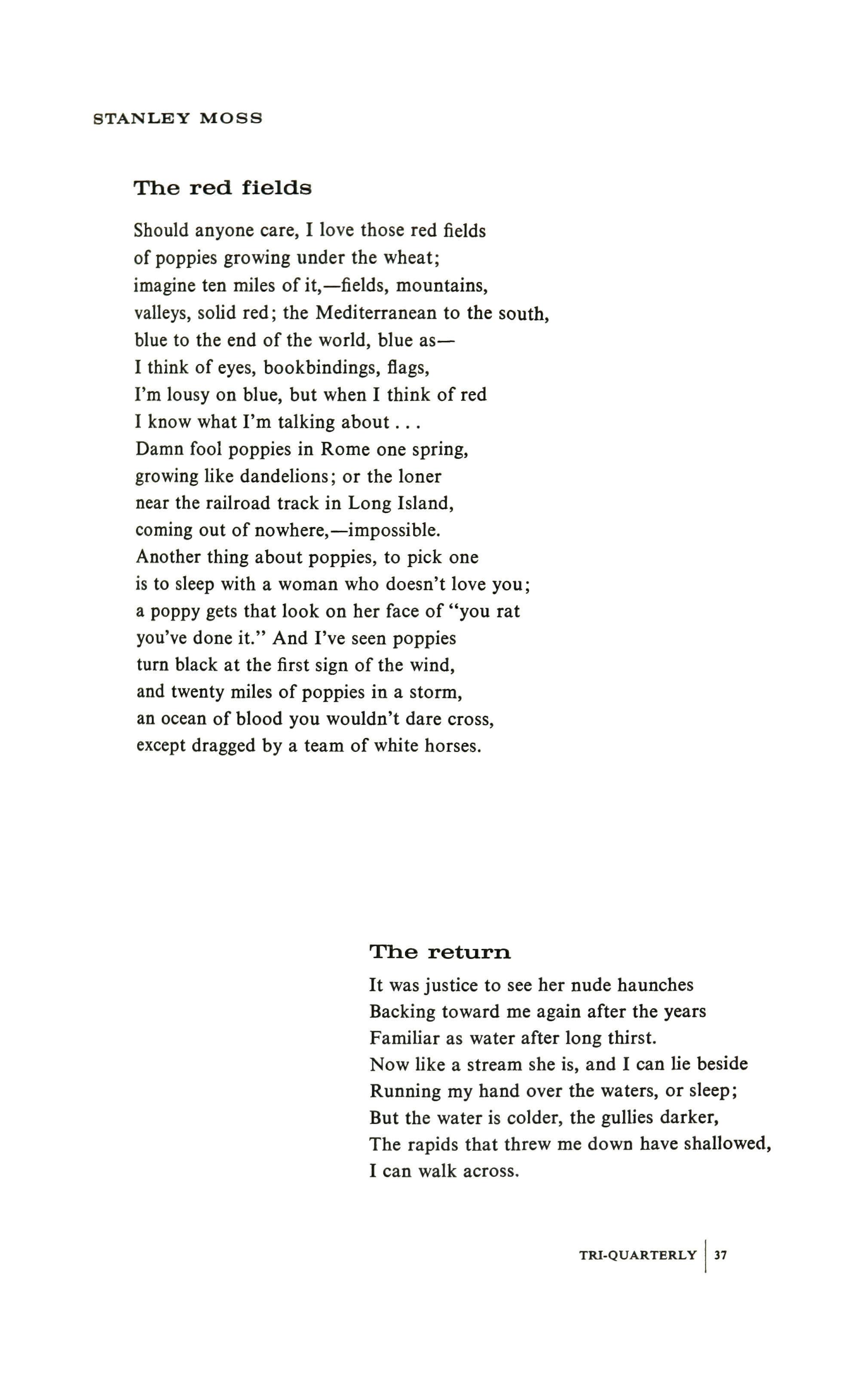
The return
It was justice to see her nude haunches Backing toward me again after the years Familiar as water after long thirst. Now like a stream she is, and I can lie beside Running my hand over the waters, or sleep; But the water is colder, the gullies darker, The rapids that threw me down have shallowed, I can walk across.
TRI·QUARTERLY 37
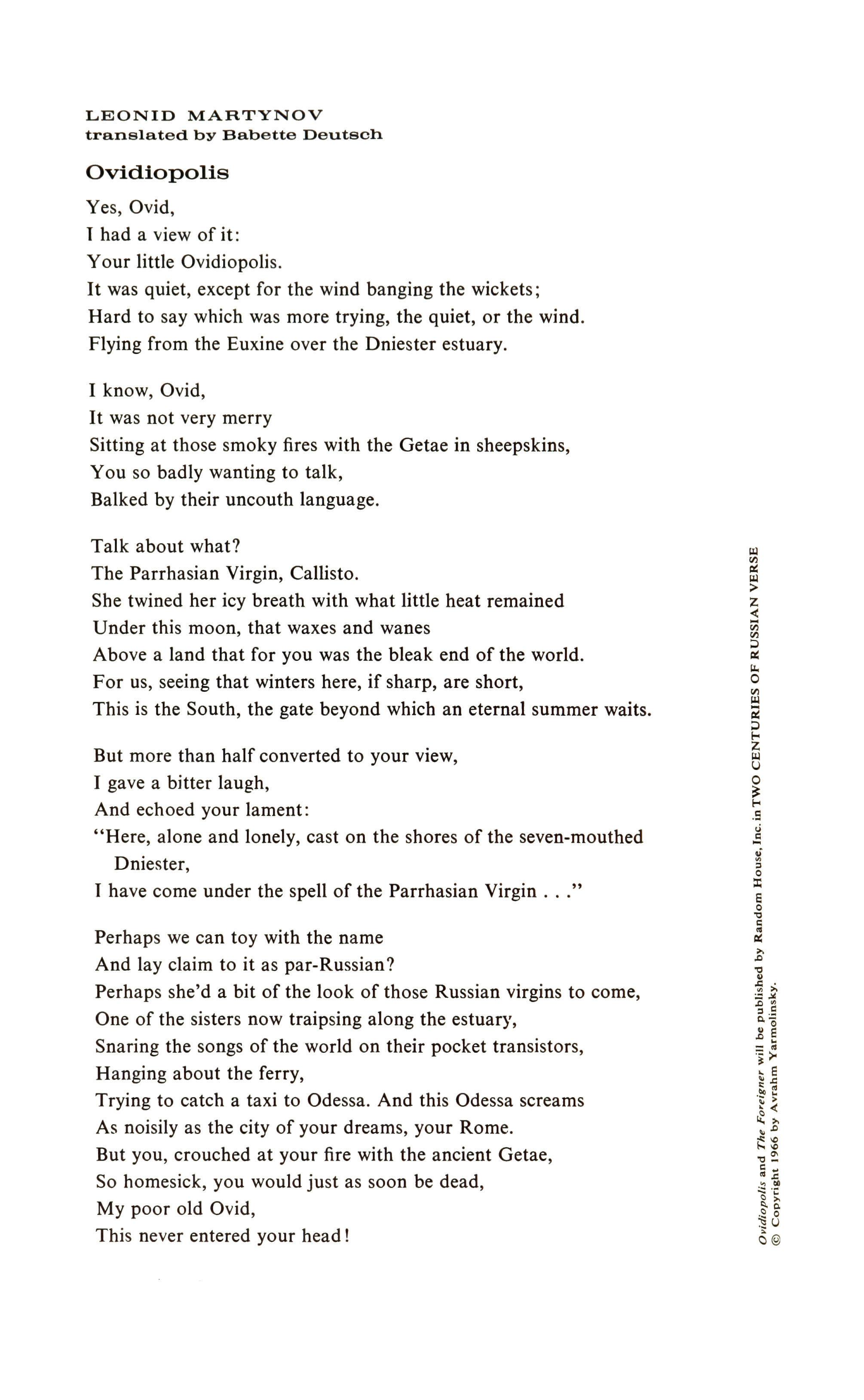 LEONID MARTYNOV
translated by Babette Deutsch
LEONID MARTYNOV
translated by Babette Deutsch
Ovidiopolis
Yes, Ovid,
T had a view of it: Your little Ovidiopolis.
It was quiet, except for the wind banging the wickets; Hard to say which was more trying, the quiet, or the wind. Flying from the Euxine over the Dniester estuary.
I know, Ovid,
It was not very merry
Sitting at those smoky fires with the Getae in sheepskins, You so badly wanting to talk, Balked by their uncouth language.
Talk about what?
The Parrhasian Virgin, Callisto.
She twined her icy breath with what little heat remained Under this moon, that waxes and wanes
Above a land that for you was the bleak end of the world. For us, seeing that winters here, if sharp, are short, This is the South, the gate beyond which an eternal summer waits.
But more than half converted to your view, I gave a bitter laugh, And echoed your lament:
"Here, alone and lonely, cast on the shores of the seven-mouthed Dniester, T have come under the spell of the Parrhasian Virgin
Perhaps we can toy with the name And lay claim to it as par-Russian?
Perhaps she'd a bit of the look of those Russian virgins to come, One of the sisters now traipsing along the estuary, Snaring the songs of the world on their pocket transistors, Hanging about the ferry, Trying to catch a taxi to Odessa. And this Odessa screams As noisily as the city of your dreams, your Rome. But you, crouched at your fire with the ancient Getae, So homesick, you would just as soon be dead, My poor old Ovid, This never entered your head!
<J c: -
 YEVGENY YEVTUSHENKO
translated by Babette Deutsch
YEVGENY YEVTUSHENKO
translated by Babette Deutsch
The foreigller
In the seaport of Archangel, foreign ships early and late, foreign sorrow in that seaport, foreign fate.
Like a rook, a young one, swarthy, all the white night through, you lie huddled beside Peter's statue, small Greek seaman, and you cry.
Not in any foreign fashion, on the dusty square you smear, drunkenly, with dirty knuckles, that dark face of yours with tears.
Did the skipper bawl you out, boy? Someone in your family die?
Maybe you've had too much vodka? Nothing's right, you don't know why?
What on earth has happened to you? Greek, where is it you were hit? What has happened is quite simple: You are human and that's it.
Down he sits beside the Greek now: "How about a drink, chum, eh?" And into his leather jacket His huge rough hand makes its way. There's a sailor from a schooner, Russian; liquored up, he slumps, Lurching, copper-faced, no question but the fellow's in the dumps.
Deft and serious, from the pocket Pulls a pint-interpreter, Bangs the bottle's neck against the Bench; the Greek does not demur.
Arm in arm, the two together sit in silence there and booze, as into the farther distance stare Greek grief and Russian blues.
1965
A basin of eggs
Their cheeks touching, their cheeks being their bellies, their bellies being undimpled, dimples of dark being the blue chinks between their touchings, the eggs in a basin in a butcher's window in strong sunlight being elliptical loops of primary whiteness. In a pan their nudity painful! Potential pain of their being damaged deranged de-arranged against each others' cheeks-and-bellies or sides of the pan. My like-curved eyeballs' nooses chase their smoothnesses in the lattice-pattern's blond and round design, hunting clarities of being yawed and yawned beyond such birth-loops,
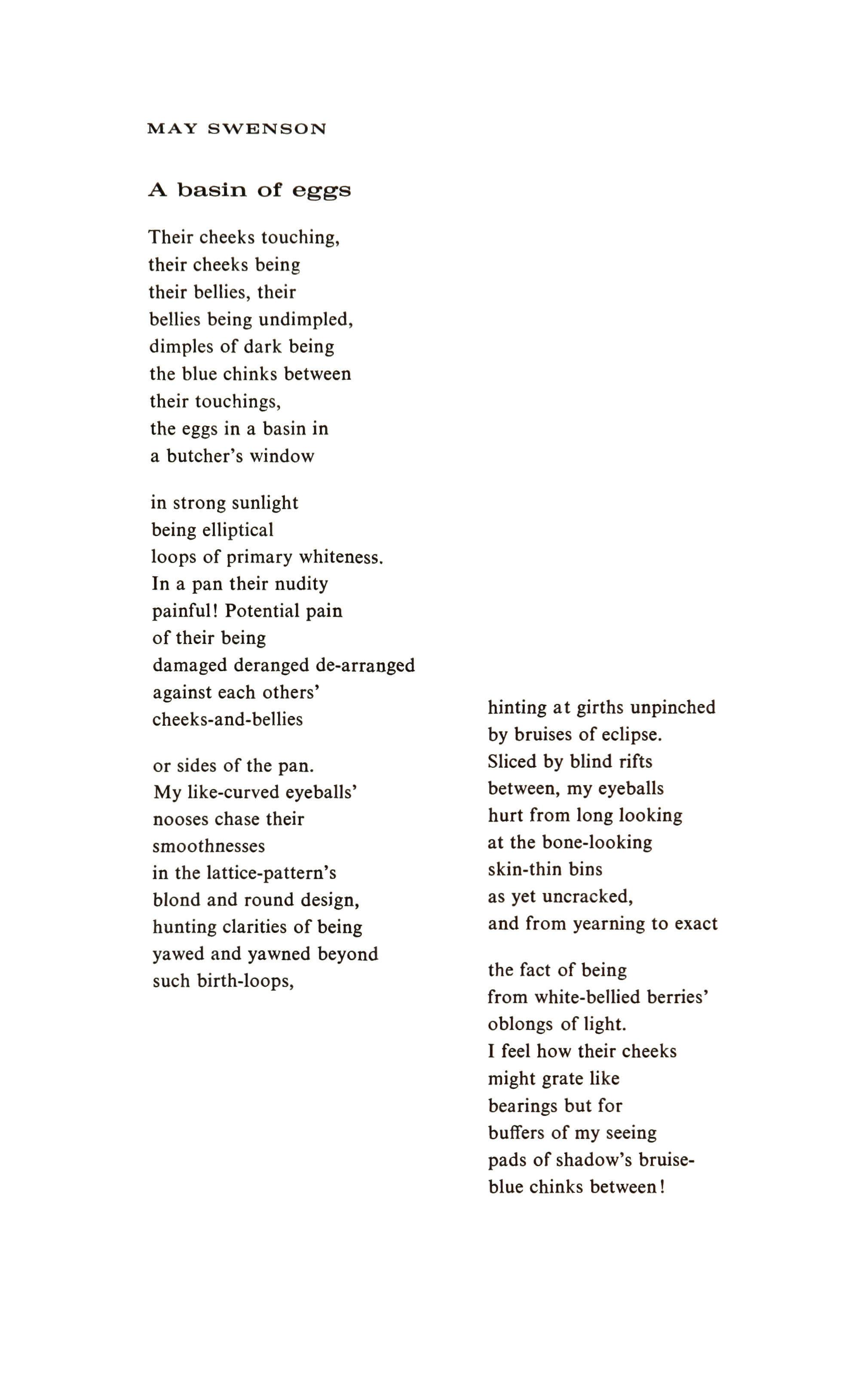
hinting a t girths unpinched by bruises of eclipse. Sliced by blind rifts between, my eyeballs hurt from long looking at the bone-looking skin-thin bins as yet uncracked, and from yearning to exact the fact of being from white-bellied berries' oblongs of light. I feel how their cheeks might grate like bearings but for buffers of my seeing pads of shadow's bruiseblue chinks between!
MAY SWENSON
The West-Chop season
JONA'!'IIAN PENNER
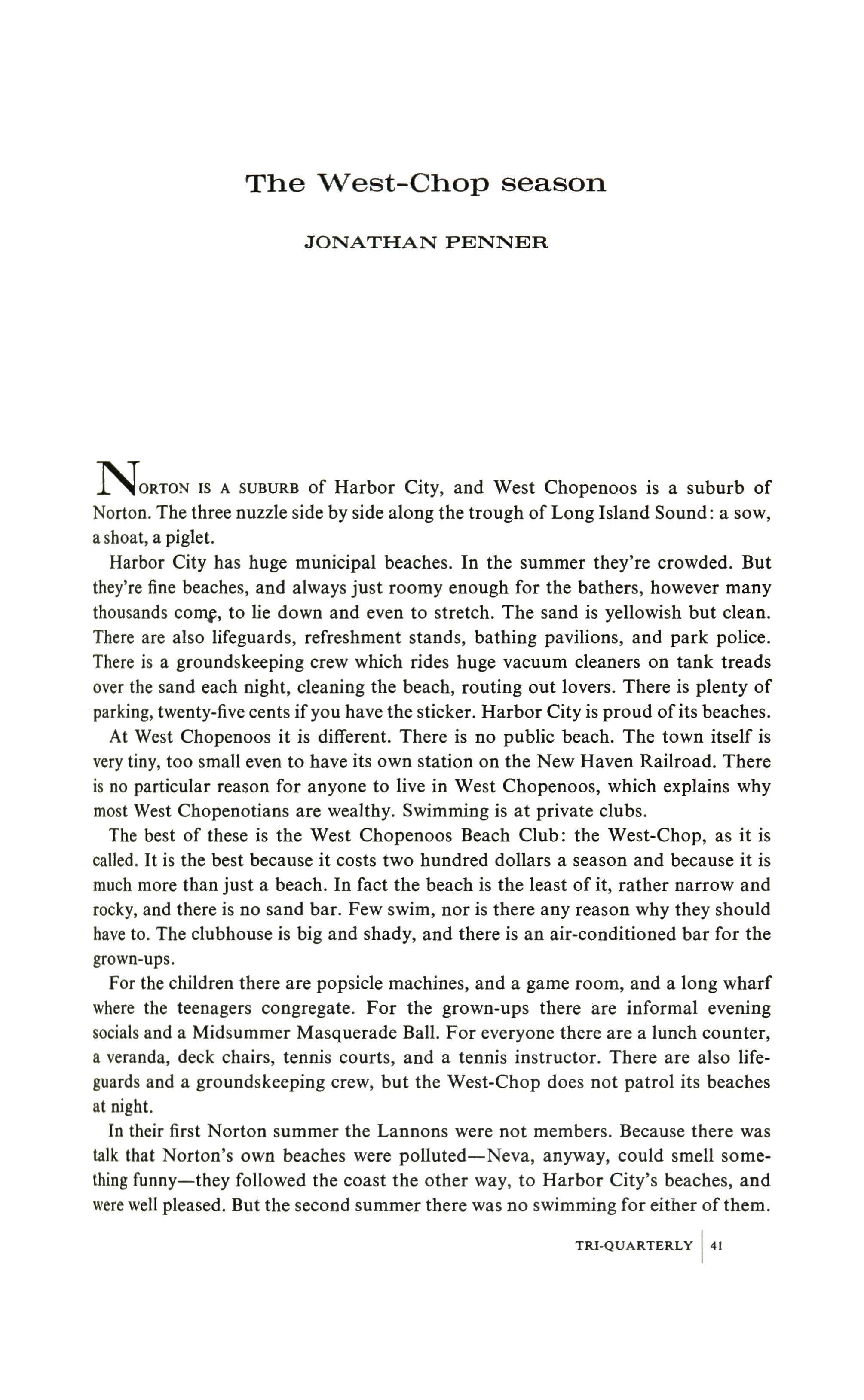
ORTON IS A SUBURB of Harbor City, and West Chopenoos is a suburb of Norton. The three nuzzle side by side along the trough of Long Island Sound: a sow, a shoat, a piglet.
Harbor City has huge municipal beaches. In the summer they're crowded. But they're fine beaches, and always just roomy enough for the bathers, however many thousands cornp, to lie down and even to stretch. The sand is yellowish but clean. There are also lifeguards, refreshment stands, bathing pavilions, and park police. There is a groundskeeping crew which rides huge vacuum cleaners on tank treads over the sand each night, cleaning the beach, routing out lovers. There is plenty of parking, twenty-five cents if you have the sticker. Harbor City is proud ofits beaches.
At West Chopenoos it is different. There is no public beach. The town itself is very tiny, too small even to have its own station on the New Haven Railroad. There is no particular reason for anyone to live in West Chopenoos, which explains why most West Chopenotians are wealthy. Swimming is at private clubs.
The best of these is the West Chopenoos Beach Club: the West-Chop, as it is called. It is the best because it costs two hundred dollars a season and because it is much more than just a beach. In fact the beach is the least of it, rather narrow and rocky, and there is no sand bar. Few swim, nor is there any reason why they should have to. The clubhouse is big and shady, and there is an air-conditioned bar for the grown-ups.
For the children there are popsicle machines, and a game room, and a long wharf where the teenagers congregate. For the grown-ups there are informal evening socials and a Midsummer Masquerade Ball. For everyone there are a lunch counter, a veranda, deck chairs, tennis courts, and a tennis instructor. There are also lifeguards and a groundskeeping crew, but the West-Chop does not patrol its beaches at night.
In their first Norton summer the Lannons were not members. Because there was talk that Norton's own beaches were polluted Neva, anyway, could smell something funny they followed the coast the other way, to Harbor City's beaches, and were well pleased. But the second summer there was no swimming for either of them.
TRI-QUARTERLY 41
Neva had to be with her colicky baby, and Fred wouldn't go alone.
The third summer Alan had intestinal infections. Neva told Fred, "You go." But he didn't, and she was relieved. Towards the end of the summer Alan was better, and they all went. But it wasn't the fun it should have been. Little things began to annoy them. It was a long hot drive, and it cost a dollar to park, because they weren't Harbor City residents and weren't entitled to the sticker.
At the beginning of the fourth summer Cobb, Fred's boss, who lived in West Chopenoos, said, "Why don't you come down to the West-Chop."
Fred told Neva that night, "Cobb will sponsor us."
"He certainly owes us a favor," Neva said. "It's only a shame the Stones and Kahles can't belong."
"Maybe after a couple of seasons we could sponsor them."
"Well," said Neva. "Maybe."
A few minutes later she said, "Do you think they'd really be comfortable?"
They were inducted into the West-Chop a week later. Fred hadn't realized it was two hundred dollars. It bothered him, but he wrote the check.
The Lannons lost no time making use of the West-Chop. Weekends they all went, and often on weekdays Neva took Alan. Neva had the car all day long. She took Fred to the train in the morning and picked him up in the evening.
Alan was now nearly three. He was still undersized, hardly bigger than Lorraine Stone's two-year-old, but his health was improved. He was a vecy light, almost platinum blond. After a few weeks at the West-Chop he browned in the sun, and his hair looked white.
Sometimes Neva left him with the Club's children's attendant, but more often she took him on the beach with her. The children's attendant was only a high school girl, and the other children in her care were all much bigger than Alan and played roughly. Neva liked having him with her. He was cute in his little bathing suit, small and thin and pretty like herself.
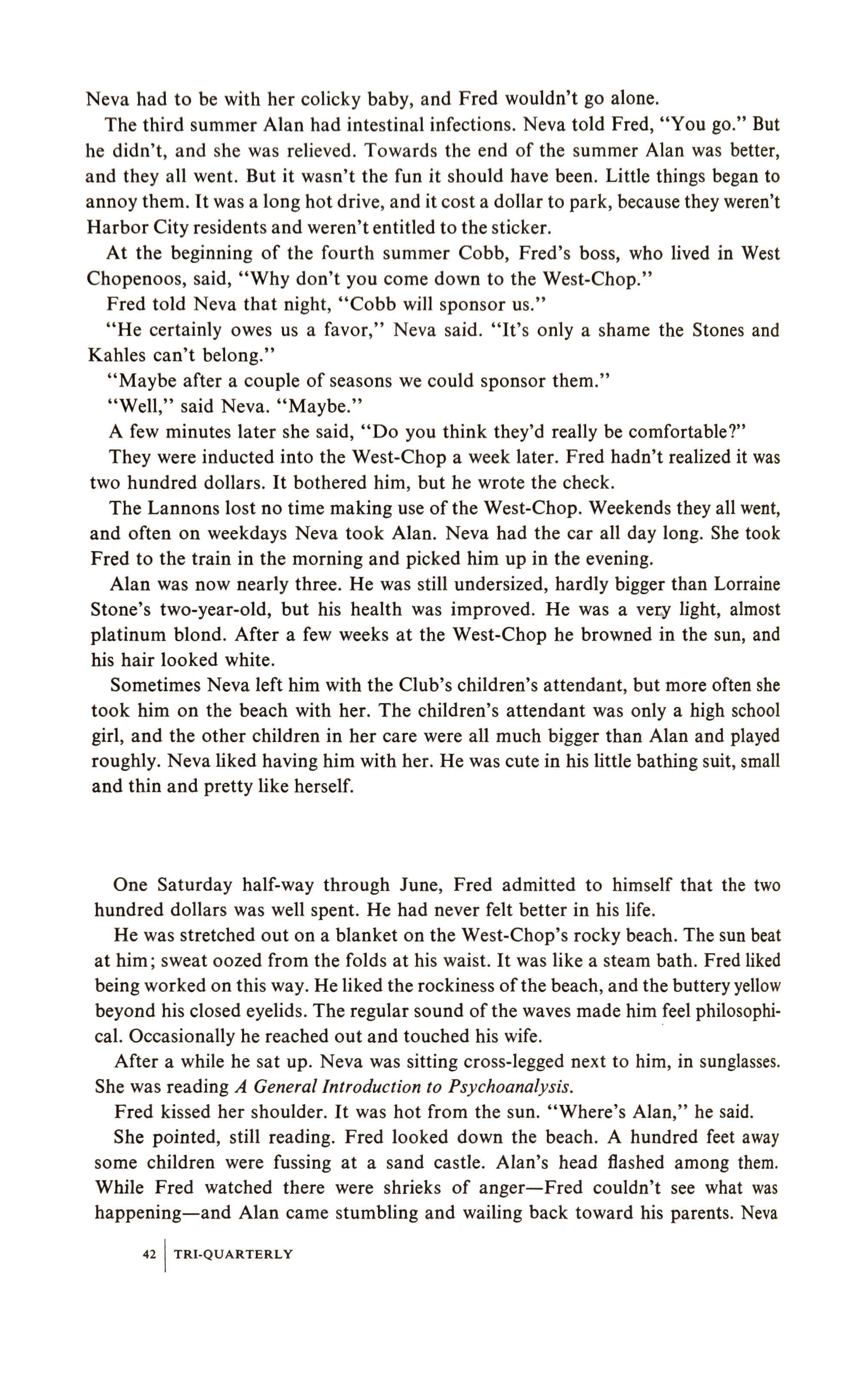
One Saturday half-way through June, Fred admitted to himself that the two hundred dollars was well spent. He had never felt better in his life.
He was stretched out on a blanket on the West-Chop's rocky beach. The sun beat at him; sweat oozed from the folds at his waist. It was like a steam bath. Fred liked being worked on this way. He liked the rockiness ofthe beach, and the butteryyellow beyond his closed eyelids. The regular sound of the waves made him feel philosophical. Occasionally he reached out and touched his wife.
After a while he sat up. Neva was sitting cross-legged next to him, in sunglasses. She was reading A General Introduction to Psychoanalysis.
Fred kissed her shoulder. It was hot from the sun. "Where's Alan," he said.
She pointed, still reading. Fred looked down the beach. A hundred feet away some children were fussing at a sand castle. Alan's head flashed among them. While Fred watched there were shrieks of anger Fred couldn't see what was happening and Alan came stumbling and wailing back toward his parents. Neva
42
TRI-QUARTERLY

ran and picked him up. Fred could tell Neva was saying something sharp to the other children. He trailed sand through his fingers.
He watched the grains of sand trickle through his fingers. He thought about the universe, and how many grains of sand there were on all the beaches in the world, and how a man's life slipped through his fingers just like grains of sand. Also he enjoyed the funny way the sand tickled him between the fingers. Fred felt very much alive. The feel of the sand and the sound of the waves rang in him like a bell. He thought, "These basic things make kind of a calendar," and had a rare realization, not of his age, but of how much time he had known: twenty-nine years. He felt alive. He wiped his face with a towel.
"Then you shouldn't play with them," said Neva, setting Alan down on the blanket.
Alan was still sniffling. Fred poked him. "Hey buddy, how about a dip?"
Alan narrowed his eyes, then smiled. Fred smiled too. "Funny word, huh? Dip. You want a dip?"
"Dif," said Alan.
"Swimmy-swim," Neva offered. "Alan want swimmy-swim?"
Alan didn't look it. "Swimmy-swim," he said vaguely. Neva did a rapid dog-paddle in the air. "Swimmy-swim. Alan, you know swimmyswim. You knew that word last month. Come on."
"He knows it," said Fred. "Now he's playing with a new word. I think he'd rather do that than take a dip."
"Dif," Alan giggled.
"Okay," Fred decided. "J'll show you what a dip is. Just like swimmy-swim." He got up and scooped Alan up onto his shoulders.
"Better wait," said Neva. "Here comes the Duo."
Fred looked. She was right, it was the Cobbs coming, waving. Fred waved back. "Be nice," he said.
"I am nice. Don't you think I'm nice?"
"You're beautiful," Fred said. "But jealous."
"Greetings, Sir Frederick," Cobb called. "Fresh from the bar," Neva muttered.
Fred nodded. "Greetings, Sir Harold," he called. It was a game. "Greetings, Lady Tillie." And to Neva he whispered, "Be nice." He wished Neva could get to like the Cobbs, as he did. She had nasty names for them: the Deadly Duo. The Gruesome Twosome. The Worm and the Jewelled Horse. Their Cadillac she called the Cattlecar.
Cobb came up, carrying a blanket, a beach umbrella, and an ice hamper. His wife had another blanket and was leading their little one; the big one had run straight into the water. Cobb was shorter than his wife, thin, very hairy, and energetic; he almost bounced through the sand. His head was handsome and threatening, with the heavy brows and black eyes of a hypnotist. Tillie Cobb was a decayed beauty, a tall, heavy-chested woman with round blue eyes and dyed blonde hair. She had a flaw, a horsy set of teeth, but she also had big lips to hide them with.
"What's this, an act?" Harold Cobb pointed to Alan on Fred's shoulders. "What
TRI-QUARTERLY 43
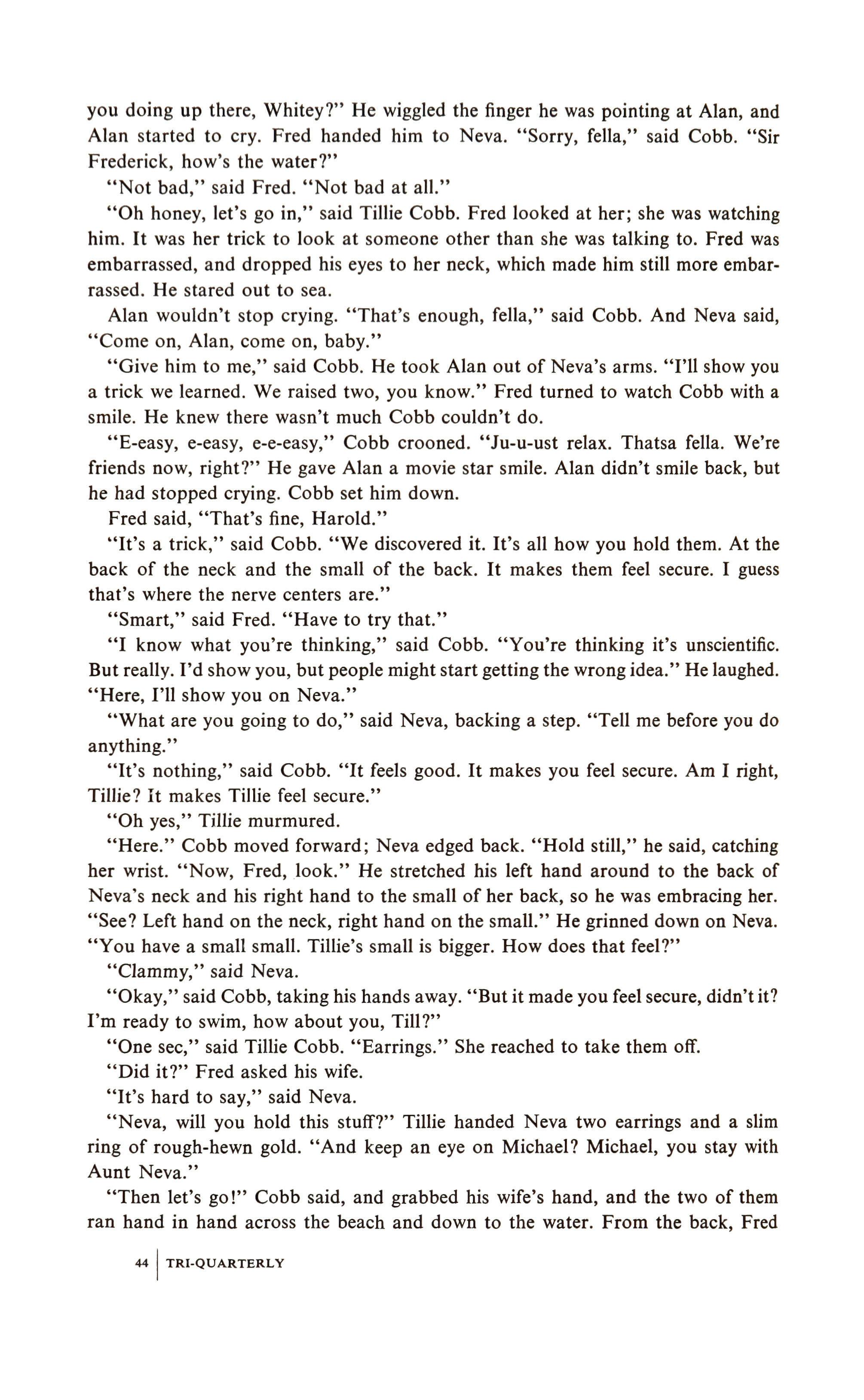
you doing up there, Whitey?" He wiggled the finger he was pointing at Alan, and Alan started to cry. Fred handed him to Neva. "Sorry, fella," said Cobb. "Sir Frederick, how's the water?"
"Not bad," said Fred. "Not bad at alI."
"Oh honey, let's go in," said Tillie Cobb. Fred looked at her; she was watching him. It was her trick to look at someone other than she was talking to. Fred was embarrassed, and dropped his eyes to her neck, which made him still more embarrassed. He stared out to sea.
Alan wouldn't stop crying. "That's enough, fella," said Cobb. And Neva said, "Come on, Alan, come on, baby."
"Give him to me," said Cobb. He took Alan out of Neva's arms. "I'll show you a trick we learned. We raised two, you know." Fred turned to watch Cobb with a smile. He knew there wasn't much Cobb couldn't do.
"E-easy, e-easy, e-e-easy," Cobb crooned. "Ju-u-ust relax. Thatsa fella. We're friends now, right?" He gave Alan a movie star smile. Alan didn't smile back, but he had stopped crying. Cobb set him down.
Fred said, "That's fine, Harold."
"It's a trick," said Cobb. "We discovered it. It's all how you hold them. At the back of the neck and the small of the back. It makes them feel secure. I guess that's where the nerve centers are."
"Smart," said Fred. "Have to try that."
"I know what you're thinking," said Cobb. "You're thinking it's unscientific. But really. I'd show you, but people might start getting the wrong idea. He laughed. "Here, I'll show you on Neva."
"What are you going to do," said Neva, backing a step. "Tell me before you do anything.
"It's nothing," said Cobb. "It feels good. It makes you feel secure. Am I right, Tillie? It makes Tillie feel secure."
"Oh yes," Tillie murmured.
"Here." Cobb moved forward; Neva edged back. "Hold still," he said, catching her wrist. "Now, Fred, look." He stretched his left hand around to the back of Neva's neck and his right hand to the small of her back, so he was embracing her. "See? Left hand on the neck, right hand on the small." He grinned down on Neva. "You have a small small. Tillie's small is bigger. How does that feel?"
"Clammy," said Neva.
"Okay," said Cobb, taking his hands away. "But it made you feel secure, didn't it? I'm ready to swim, how about you, Till?"
"One sec," said Tillie Cobb. "Earrings." She reached to take them off.
"Did it?" Fred asked his wife.
"It's hard to say," said Neva.
"Neva, will you hold this stuff?" Tillie handed Neva two earrings and a slim ring of rough-hewn gold. "And keep an eye on Michael? Michael, you stay with Aunt Neva."
"Then let's go I"� Cobb said, and grabbed his wife's hand, and the two of them ran hand in hand across the beach and down to the water. From the back, Fred
44 TRI-QUARTERLY
thought, Cobb did look perhaps a little skinny. And he bounced when he ran. But Tillie ran like a tiger, and her thick gold hair swung. They ran into the shallow water and dived, and swam straight out, still side by side.
"Earrings to the beach," said Neva, staring after them. "Fred, what's the matter with you? Didn't anyone ever tell you that a girl has just got to have earrings to wear to the beach? And a gold ring?"
"It's a nice ring," said Fred.
"I suppose it is." Neva turned to Michael. "Well, Michael, how are you? Why don't you make yourself comfortable?" She pushed him, not too playfully, down onto the blanket.
"You jerk," said Michael.
"Now, Michael," said Fred. "That's no way to talk to your Aunt Neva."
"You fat jerk," said Michael.
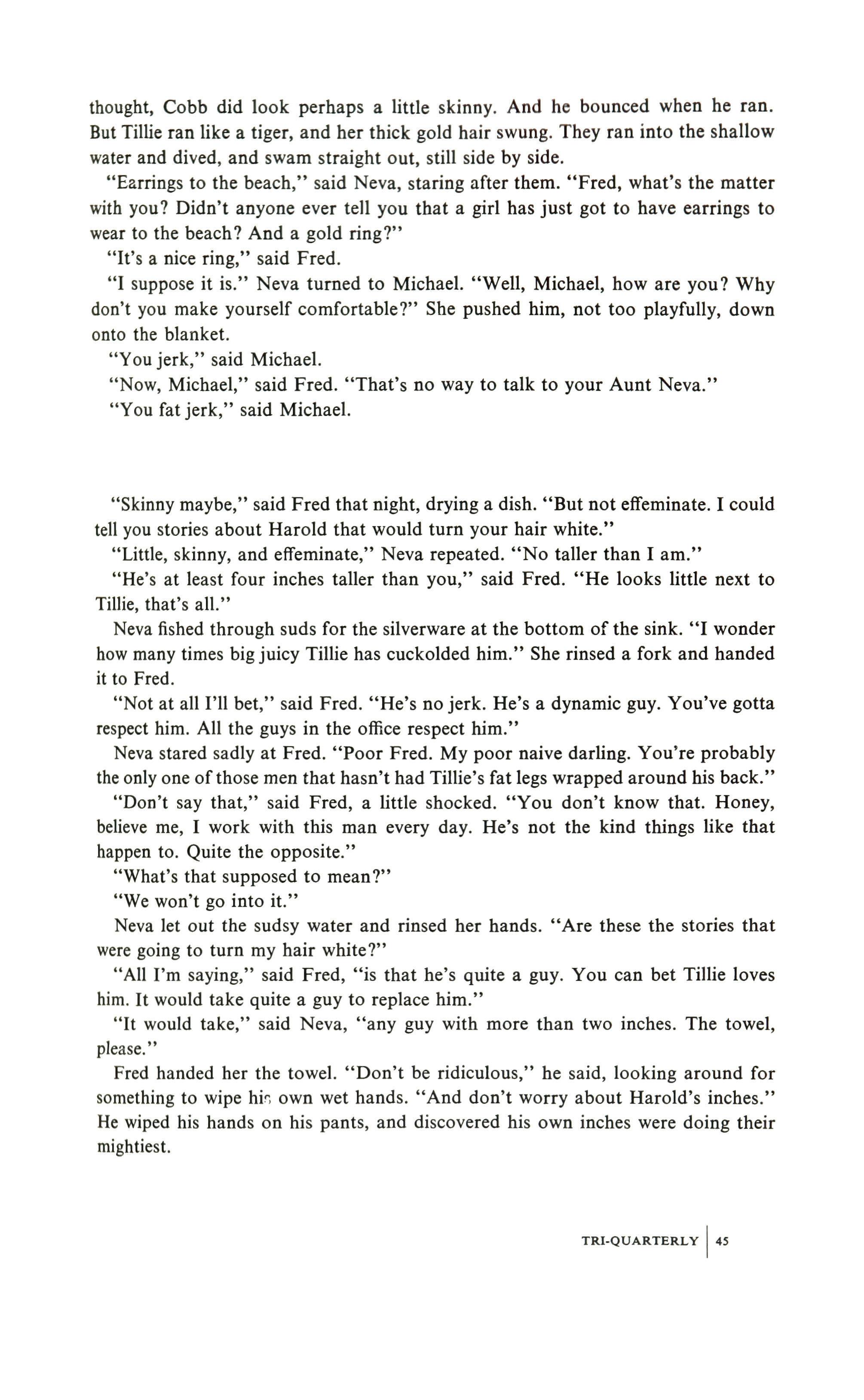
"Skinny maybe," said Fred that night, drying a dish. "But not effeminate. 1 could tell you stories about Harold that would turn your hair white."
"Little, skinny, and effeminate," Neva repeated. "No taller than 1 am."
"He's at least four inches taller than you," said Fred. "He looks little next to Tillie, that's all."
Neva fished through suds for the silverware at the bottom of the sink. "I wonder how many times big juicy Tillie has cuckolded him." She rinsed a fork and handed it to Fred.
"Not at all I'll bet," said Fred. "He's no jerk. He's a dynamic guy. You've gotta respect him. All the guys in the office respect him."
Neva stared sadly at Fred. "Poor Fred. My poor naive darling. You're probably the only one of those men that hasn't had Tillie's fat legs wrapped around his back."
"DOD't say that," said Fred, a little shocked. "You don't know that. Honey, believe me, 1 work with this man every day. He's not the kind things like that happen to. Quite the opposite."
"What's that supposed to mean T
"We won't go into it."
Neva let out the sudsy water and rinsed her hands. "Are these the stories that were going to turn my hair white?"
"All I'm saying," said Fred, "is that he's quite a guy. You can bet Tillie loves him. It would take quite a guy to replace him."
"It would take," said Neva, "any guy with more than two inches. The towel, please.
Fred handed her the towel. "Don't be ridiculous," he said, looking around for something to wipe hi!'; own wet hands. "And don't worry about Harold's inches." He wiped his hands on his pants, and discovered his own inches were doing their mightiest.
TRl-QUARTERLY 45

"Here they come again," said Neva the next day, an overcast sweltering Sunday. Fred looked and saw Tillie, in a two-piece bathing suit, advancing from the clubhouse; Harold bounded at her side.
Fred got up. "Greetings, Sir Harold! Lady TillieI"� "Greetings, Sir Frederick," Cobb called back. "Greetings, Lady Neva." Neva jumped up and started to shout something, but stopped. "Be nice," Fred said softly.
"Hiya, Whitey," said Cobb, coming up. He winked at Alan. "You all relaxed today?" he said to Neva.
"Why shouldn't I be?" said Neva.
A few minutes later Tillie complained, "A raindrop hit me." In a moment there was a roll of thunder, and lightning flashed between the sky and the water. The Cobbs helped the Lannons gather their blanket, towels, shoes, books. They all ran for the bar.
The following weekend they were together again. They stretched their blankets side by side, and Fred talked to Tillie and watched her jewelled hands. It was quite hot; everyone sweated. Late in the afternoon they walked out to the end of the wharf, let themselves down into the water, and went for a long swim. They were all good swimmers. It was very pleasant. They came out and dried themselves and had a drink together before going home.
And the next weekend, the last one in June, they were together again. Fred had been dieting, and it was noticed that he was thinner. They were all tan and happy; Fred and Cobb played touch football with Cobb's sons; Tillie wore her two-piece. They stayed late these afternoons, ate supper at the lunch counter and still stayed, put the children in the clubhouse to watch television, and took long walks down the beach. Coming back they walked ankle-deep in the low tide and watched the last of the sunset. Fred thought of his high school summers at the beach, when he had been fifteen and sixteen and seventeen, and thin for the only time in his life, and had talked to girls on blankets. Now it made him feel melancholy and tender to see bare legs stepping through the shallow water Neva's pretty legs, Tillie's and his own heavy, blue-veined legs, Haro\d's hairy legs. He watched with awe the shining western clouds, and the growing darkness at sea.
The Saturday of the fourth of July weekend, which followed, was the night of the Midsummer Masquerade Ball. The Cobbs and the Lannons had agreed to go as knights and their ladies. The Cobbs were going to pick the Lannons up. Neva brought Alan next door to Lorraine Stone, stayed too long, and rushed back to dress.
Cobb and Fred had agreed on cardboard armor and shields, and brooms for lances. "But what the hell does a knight's lady wear," Neva wondered.
"Good question," said Fred. He was gluing the last touches of silver wrapping paper to his cardboard armor. "Something simple, wouldn't you think?"
Neva went away and came back a minute later in a straight blue skirt and ruffled blouse. Fred studied her. "The ruffles are oldish looking," he said. "That's good. Maybe a shawl. Maybe those oriental slippers."
"I can't dance in slippers."
46 TRI-QUARTERLY

"Well, decide on something," Fred said. "There's not much time."
A few minutes later Fred looked through the livingroom window and saw the Cobbs' white Cadillac glide up to the curb. "They're here," he shouted up the stairs.
"Tell them I'll be right down," Neva called back.
Fred let the Cobbs in and made them drinks while they were waiting for Neva. "You look great," he told them, which was only half true. Harold's lance was beribboned and his armor ornate, but he looked shrunken in it. It was Tillie who looked great; she had known what a knight's lady wears. Regal in high heels, she wore a rich, floral-pattern gown, cut very low in front, and a tiara which Fred had never seen. She was wearing a fine silver chain around her neck, and from it hung her gold ring, suspended above her breasts.
"I'm sorry," said Neva, running downstairs. "Oh, you both look wonderful."
They were going to be late and Cobb drove quickly, and talked about Midsummer Masquerades of the past. "One year they spread an inch of sand in the social hall They had the theme 'On the Beach.' There were deck chairs and umbrellas, you had to dance around them. Then last year they did an outer space thing."
"Sand?" said Neva. "Didn't that ruin the floor?"
"Sure, that's exactly what happened," said Cobb. "They had to refinish it. Say did you know, every year they get Sylvester Jones? Did you ever hear of him?"
"No, but how do you dance in the sand?"
"You take off your shoes," said Cobb
Fred relaxed and inhaled the smell of the leather upholstery. He'd been with Cobb in the Cadillac a few times, but he'd never ridden in the back seat. He felt chauffeured. "To the Club, Harold," he said. Cobb chuckled and reached back: "Have a cigar." Fred took the cigar gratefully; it was just the thing to top off his mood. And then, as he patted himself for matches, Tillie reached up and took a pack from on top of the sun visor, and leaned back to give him a light. The flame's reflection glimmered on her tiara.
After a few minutes Harold and Tillie, who were sitting close together, began a quiet private conversation, and Neva slid over next to Fred. "Do you think we should pick up Alan when we come home?"
"I don't know," said Fred. "What arrangements did you make?"
"I said she could have him until morning. Do you think that was right?"
"I guess it depends what time it is."
"When we come home. Yes, but he'll be asleep whatever time it is. Of course they may be sleeping too."
Fred took Neva's hand and looked out the window.
They were passing along the winding shore road now. There were no more streetlamps. The Cadillac's high beams caught up with a convertible sports car running in front of them. "There's Sandersons," Cobb said. Tillie rolled down her window, and Fred could smell the sea.
In front of the West-Chop the knights ground out their cigars and assisted their ladies from the car. There was a cheer from the Sandersons, who had waited at the
TRI-QUARTERLY 47
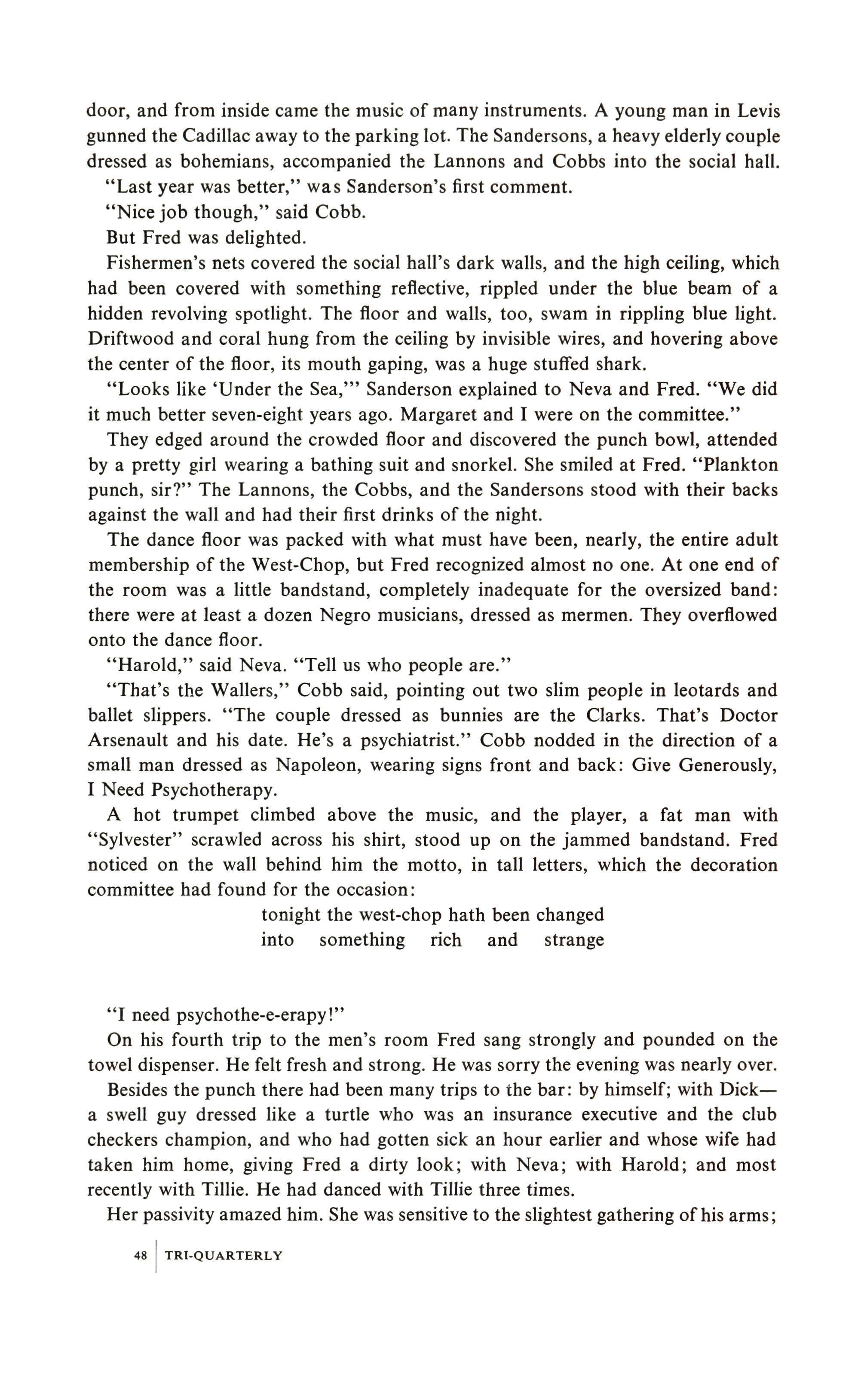
door, and from inside came the music of many instruments. A young man in Levis gunned the Cadillac away to the parking lot. The Sandersons, a heavy elderly couple dressed as bohemians, accompanied the Lannons and Cobbs into the social hall.
"Last year was better," was Sanderson's first comment.
"Nice job though," said Cobb.
But Fred was delighted.
Fishermen's nets covered the social hall's dark walls, and the high ceiling, which had been covered with something reflective, rippled under the blue beam of a hidden revolving spotlight. The floor and walls, too, swam in rippling blue light. Driftwood and coral hung from the ceiling by invisible wires, and hovering above the center of the floor, its mouth gaping, was a huge stuffed shark.
"Looks like 'Under the Sea," Sanderson explained to Neva and Fred. "We did it much better seven-eight years ago. Margaret and I were on the committee."
They edged around the crowded floor and discovered the punch bowl, attended by a pretty girl wearing a bathing suit and snorkel. She smiled at Fred. "Plankton punch, sir?" The Lannons, the Cobbs, and the Sandersons stood with their backs against the wall and had their first drinks of the night.
The dance floor was packed with what must have been, nearly, the entire adult membership of the West-Chop, but Fred recognized almost no one. At one end of the room was a little bandstand, completely inadequate for the oversized band: there were at least a dozen Negro musicians, dressed as mermen. They overflowed onto the dance floor.
"Harold," said Neva. "Tell us who people are."
"That's the Wallers," Cobb said, pointing out two slim people in leotards and ballet slippers. "The couple dressed as bunnies are the Clarks. That's Doctor Arsenault and his date. He's a psychiatrist." Cobb nodded in the direction of a small man dressed as Napoleon, wearing signs front and back: Give Generously, I Need Psychotherapy.
A hot trumpet climbed above the music, and the player, a fat man with "Sylvester" scrawled across his shirt, stood up on the jammed bandstand. Fred noticed on the wall behind him the motto, in tall letters, which the decoration committee had found for the occasion:
tonight the west-chop hath been changed into something rich and strange
"I need psychothe-e-erapy!"
On his fourth trip to the men's room Fred sang strongly and pounded on the towel dispenser. He felt fresh and strong. He was sorry the evening was nearly over. Besides the punch there had been many trips to the bar: by himself; with Dicka swell guy dressed like a turtle who was an insurance executive and the club checkers champion, and who had gotten sick an hour earlier and whose wife had taken him home, giving Fred a dirty look; with Neva; with Harold; and most recently with Tillie. He had danced with Tillie three times.
Her passivity amazed him. She was sensitive to the slightest gathering of his arms;
48 TRI-QUARTERLY
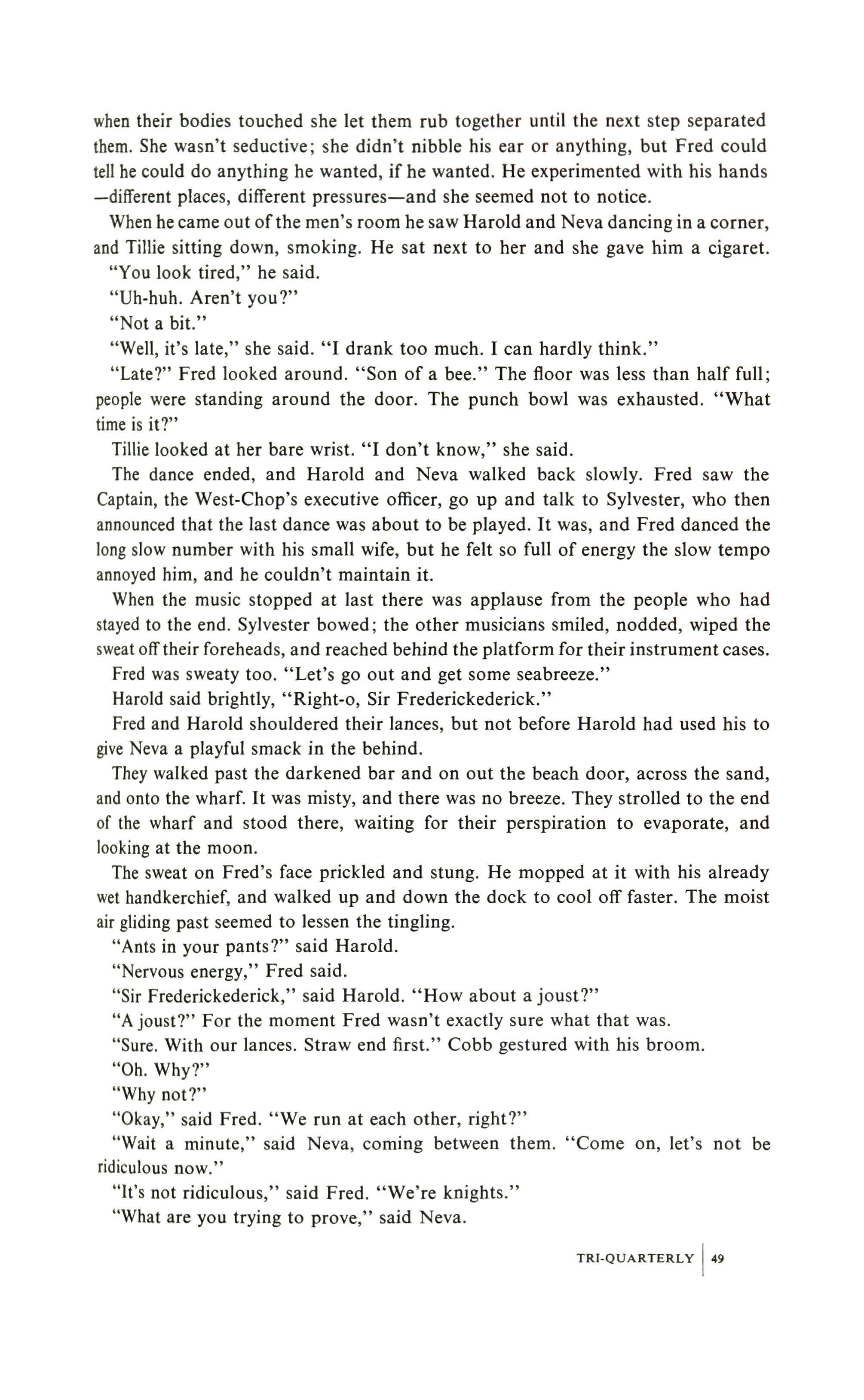
when their bodies touched she let them rub together until the next step separated them. She wasn't seductive; she didn't nibble his ear or anything, but Fred could tell he could do anything he wanted, if he wanted. He experimented with his hands -different places, different pressures and she seemed not to notice.
When he came out ofthe men's room he saw Harold and Neva dancing in a corner, and Tillie sitting down, smoking. He sat next to her and she gave him a cigaret.
"You look tired," he said.
"Uh-huh, Aren't you ?"
"Not a bit."
"Well, it's late," she said. "I drank too much. I can hardly think."
"Late?" Fred looked around. "Son of a bee." The floor was less than half full; people were standing around the door. The punch bowl was exhausted. "What time is it?"
Tillie looked at her bare wrist. "I don't know," she said.
The dance ended, and Harold and Neva walked back slowly. Fred saw the Captain, the West-Chop's executive officer, go up and talk to Sylvester, who then announced that the last dance was about to be played. It was, and Fred danced the long slow number with his small wife, but he felt so full of energy the slow tempo annoyed him, and he couldn't maintain it.
When the music stopped at last there was applause from the people who had stayed to the end. Sylvester bowed; the other musicians smiled, nodded, wiped the sweat offtheir foreheads, and reached behind the platform for their instrument cases.
Fred was sweaty too. "Let's go out and get some seabreeze."
Harold said brightly, "Right-o, Sir Frederickederick."
Fred and Harold shouldered their lances, but not before Harold had used his to give Neva a playful smack in the behind.
They walked past the darkened bar and on out the beach door, across the sand, and onto the wharf. It was misty, and there was no breeze. They strolled to the end of the wharf and stood there, waiting for their perspiration to evaporate, and looking at the moon.
The sweat on Fred's face prickled and stung. He mopped at it with his already wet handkerchief, and walked up and down the dock to cool off faster. The moist air gliding past seemed to lessen the tingling.
"Ants in your pants?" said Harold.
"Nervous energy," Fred said.
"Sir Frederickederick," said Harold. "How about a joust?"
"A joust?" For the moment Fred wasn't exactly sure what that was.
"Sure. With our lances. Straw end first." Cobb gestured with his broom.
"Oh. Why?"
"Why not?"
"Okay," said Fred. "We run at each other, right?"
"Wait a minute," said Neva, coming between them. "Come on, let's not be ridiculous now."
"It's not ridiculous," said Fred. "We're knights."
"What are you trying to prove," said Neva.
TRI-QUARTERLY 49

"We're knights," Fred said again.
"And Sir Frederickederick has ants in his pants," Cobb added.
Neva looked at Tillie, who was smiling. "Don't look at me," said Tillie. "What do you want to stop them for? I think it's the funniest thing I ever heard of in my life." She wiped her face with her sleeve.
"All right," said Fred. "Let's go. Wait here." He turned and walked back toward the shore end of the wharf. The wharf seemed longer at night, and the clubhouse far away. From the parking lot beyond it Fred heard the faint cough of a starting car.
He stopped close to shore and looked back. Through the mist he couldn't distinguish the three tiny figures. The only sound now was the lapping of water against the wharf's piles.
"Are you ready," he called.
"Ready," came Harold's voice, surprisingly faint. "Charge." And immediately Fred heard the rapid patter of Harold's feet, running at him through the dark.
Fred extended his broom and charged. As he built up speed he caught sight of Harold, coming fast as a rabbit, but looking so small Fred smiled. He felt the wharf shake under his own thundering charge, he shouted wildly, and as they came together he poked at Harold with his broom and swept him off the wharf life a crumb. At the same time he tripped over the broom which Harold had cleverly thrust between his legs, and fell to the wharf like a clubbed ox. He got up, a little dizzy, as first Neva and then Tillie came running up. All three of them rushed to the side of the wharf.
It was low tide. Harold was standing waist-deep in water, wiping his eyes, and laughing hysterically. His cardboard armor drifted away. Neva flopped down on the wharf and extended one of the broomsticks toward him as though he were drowning, at which Fred and Tillie also burst into laughter. "Brave Sir Frederickederick!" Tillie gasped, laughing, and swayed into Fred's arms.
July was hot, and August was terrible. Never, Sanderson told the Lannonsand the Sandersons had been charter members never in Sanderson's memory had so many West-Chop members actually gone into the water.
During these months the Lannons made quite a few new friends. There was a young couple named Watkins, also from Success Hill, also in their first season. And there was Doctor Arsenault, the psychiatrist. Neva liked him; Fred found him a little dull. Fred was also bored with Dick, who had dressed like a turtle, and who now insisted on giving Fred checker lessons.
With the Cobbs, not much had changed. Harold and Tillie and Fred and Neva were still together the greater part of every weekend. They didn't call each other Sir Harold or Sir Frederick. Fred had black and blue marks on his knees from his fallon the wharf, but only for a couple of weeks.
Everything was very familiar. They were as friendly as ever. They didn't walk out on the wharf, but they still went for long walks down the beach. Sometimes Neva and Harold walked, and Fred and Tillie lay together in the sun and talked. She was, he thought, a relaxed, friendly person, easy to talk to. Soon he knew the
TRI-QUARTERLY
50
different bathing suits she wore, and which were her favorites. They were his favorites, too.
They all drank together, at the clubhouse bar, as before. Once, drunk, they ran down into the water and had chicken-fights, the girls on the men's shoulders. Fred ducked under the water and lifted Tillie on his shoulders, her wet thighs pressing against his jaws, and he and Harold bumped bellies, laughing, and the girls on their shoulders laughed as they tugged at one another. They staggered back and forth and went crashing down together.
Another day, when they were left alone for a long time, Fred got Tillie to bury him to the neck in sand. She sat beside him, talking to him, for a long time. Later the sun was in his eyes, and she covered his face with a newspaper.

There were clouds on the morning of Labor Day, but the afternoon was clear and hot. When the Lannons got to the beach they found Harold there alone.
"Tillie lost a ring," he said. "We spent all morning looking for it. She won't give up."
"Oh, I hope it's not her pretty one," said Neva.
"I'm not sure," said Harold. "I don't know which ring it is."
"I mean her gold one," said Neva.
"I don't know," said Harold. "Everything's insured."
An hour later a club attendant walked up to their blankets. "Telephone, Mr. Cobb." Harold got up and followed the attendant back to the clubhouse. When the Lannons saw him coming back a few minutes later his walk was rapid and angry. "Now she wants to be picked up," he said, putting on a shirt.
"Did she find it?" Neva asked.
"She gave up. She's in a miserable mood. Just watch who she takes it out on." Harold fished his car keys up off the blanket, then stopped and looked at Fred. "Say, how'd you like to do me a big favor, Fred? Go pick her up. Here, take the Caddy." He held out the keys, then pressed them into Fred's hand. "You can bring Whitey, he likes my car. Don't you, Whitey?" Harold gave Alan his biggest smile.
"All right," said Fred. "I'll go." He bent over for his shirt and sandals.
The Cadillac's seats were stinging hot from the sun, and Alan wouldn't sit down until Fred spread out a newspaper he found in the back. Then Fred found he was cramped behind the steering wheel. He slid the seat back as far as it would go. With some difficulty he inserted the ignition key. He wasn't sure he could drive the Cadillac; he never had, and its massiveness made him uneasy. He was relieved when it started at once, and handled easily as he drove it out of the parking lot.
But as Fred swung the big car around the shore road's curves he began to worry. He wondered what he would say to Tillie when she answered the door. Something with a note ofinnuendo. It wasn'tjust chance, he'felt, that had him driving Harold's car to pick up Harold's wife, and that an attraction had flickered all summer between him and Tillie.
Alan was trailing his hand out the window. "Be careful," Fred remarked. TRI-QUARTERLY
51

The Cobbs lived on a wooded ridge. Fred turned onto Squirrel Run Road, a steep hill and started up it. The sun glared directly into his eyes.
"Hill," said Alan.
"Un-huh," said Fred, slowing the car, squinting.
Alan crawled across the seat and leaned on Fred. "Hill, daddy."
"That's right, buddy," said Fred. He reached up and pulled the sun visor down into position. A slim ring of rough-hewn gold fell into his lap.
He snatched it up and glanced at Alan, who was looking straight at him. "That's right, buddy," Fred said, trying to smile. "This is Squirrel Run Road. Hill." He was wearing a bathing suit, and his shirt had no pockets; he kept the ring clutched in his sweating fist.
He was terribly excited and frightened. He felt more strongly than ever that it wasn't just chance. He had no time to question what was happening to him. He saw he was already turning onto Ridge Road.
"Cobb," said Alan, recognizing the street.
"Yes," said Fred. "Cobb." He pulled up in front. "Wait here, Alan." With his left fist clutched to his side he walked to the front door and rang.
The door opened at once, and little Michael stood there. "Hi," he said.
Fred couldn't tell whether his heart was sinking or soaring. He had forgotten about the children. "Hi, .Michael. Where's Mommy?"
"On the toilet," said Michael. Harold, Junior, came up behind him. "You're not supposed to say that, baby." And to Fred he said, "Hey, what're you doing with our car?"
"I am so I"� Michael screamed.
"Daddy loaned it to me," Fred murmured.
And then beautiful Tillie arrived, in the two-piece Fred loved. Her gold hair swung around her shoulders. His heart swelled as he looked at her.
"Are you still not in your bathing suits," she shrieked at her children. "Get upstairs this minute!" They fled from her, and she wheeled around, back into her living room. "C'mon in, Fred. I lost a ring, I'm going out of my mind. Did Harold send you?" She sank into a sofa.
Fred walked into the middle of the living room and stood facing her. "Fair lady," he said hoarsely. "Come here."
"For Christ's sake," said Tillie, wearily. "Not that again." She sat up a little. "Now why in hell are you making a fist at me?"
Fred sank on his knee in front of her couch. "Fair lady. What would be the reward of the gallant knight if he gave the fair lady her heart's desire?" He fought to keep his eyes on her face. He whispered, "A kiss?"
But Tillie seemed not to understand. She leaned forward, but she didn't kiss him. Her eyes narrowed, and she smiled, not nicely. "Are you crazy?"
There was a moment of silence.
"Huh?" Fred said.
Tillie yelled, "Are you crazy?" and jumped up, and strode to the other end of the long room. "Why does everybody have to be crazy today? Fred, you horse's ass, get up I"�
52 TRI-QUARTERLY
Fred scrambled to his feet, terrified. He was still trying to look into her face. The flesh of his fist burned. "Come here," he said again. She came forward, but only one step. "Will you just shut up? Will you justplease shut up I"� She turned away. "Here come the children," she said, and a moment later Michael and Harold, Junior, came in, their eyes wide with awe at what they had overheard. They were wearing little skintight bathing trunks, and carried brilliant white towels around their hard, brown little shoulders. "Let's go," said Tillie wearily. "I'll drive."
Back at the West-Chop, Fred opened his aching hand, and got rid of the ring in the men's room toilet.
 ROBERT HERSHON
ROBERT HERSHON
On horror
If it is horrible to be burned alive by savage tribesmen who dance and leap about as your wrist watch melts, it is horrible to be burned by a hot pot.
If it is horrible in the great gothic house when the hairy claw comes through the velvet drape and clutches your throat, it is horrible when your child touches your hand as you sleep. If it is horrible when the fiendish vaudevillan, in a rage because you were in the fourth grade with his wife, pins you to the wall with his wicked throwing knives and takes dead aim at your breast pocket, it is horrible to mince onions.
If it is horrible to be buried under an avalanche of snow and rocks set off by a mad alpinist, shrieking in the thin air, it is horrible to drop a book on your toe. If it is horrible to be drowned in the relentless flood as you were racing to warn the FBI that bearded saboteurs were lurking near the dam, it is horrible to scrub your feet in the bath.
But if the pot boils without heat?
If the child's eyes are dark, the infant prowling? If the book, new to your eyes, curses your name?
There is horror in all love, in the sweet apple. The mouth cannot taste it, the hand cannot feel it. Horror is small and warm and damp and wears your mother's dresses.
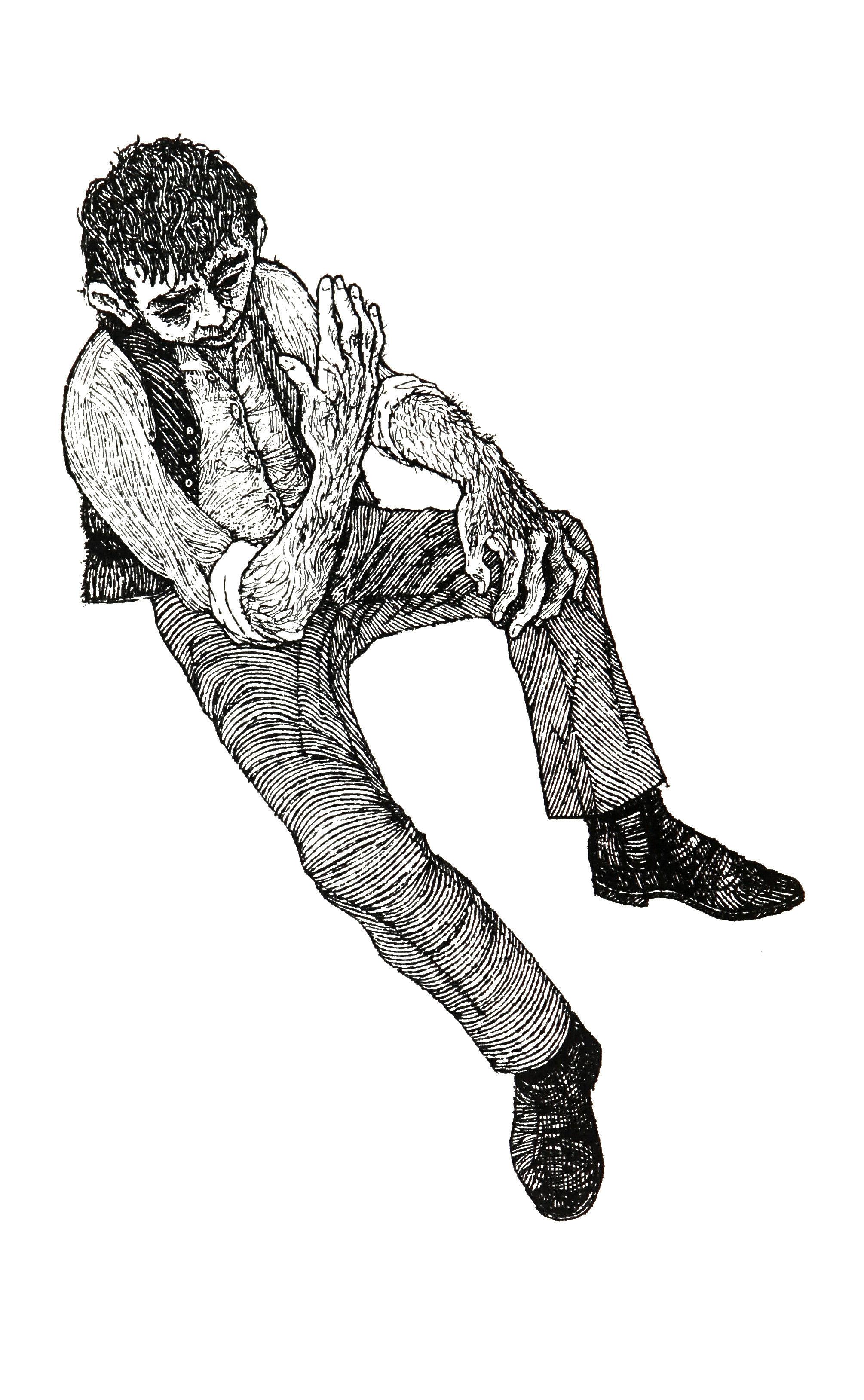
Two stories
RICIIA RD BRAU'l'IGAN
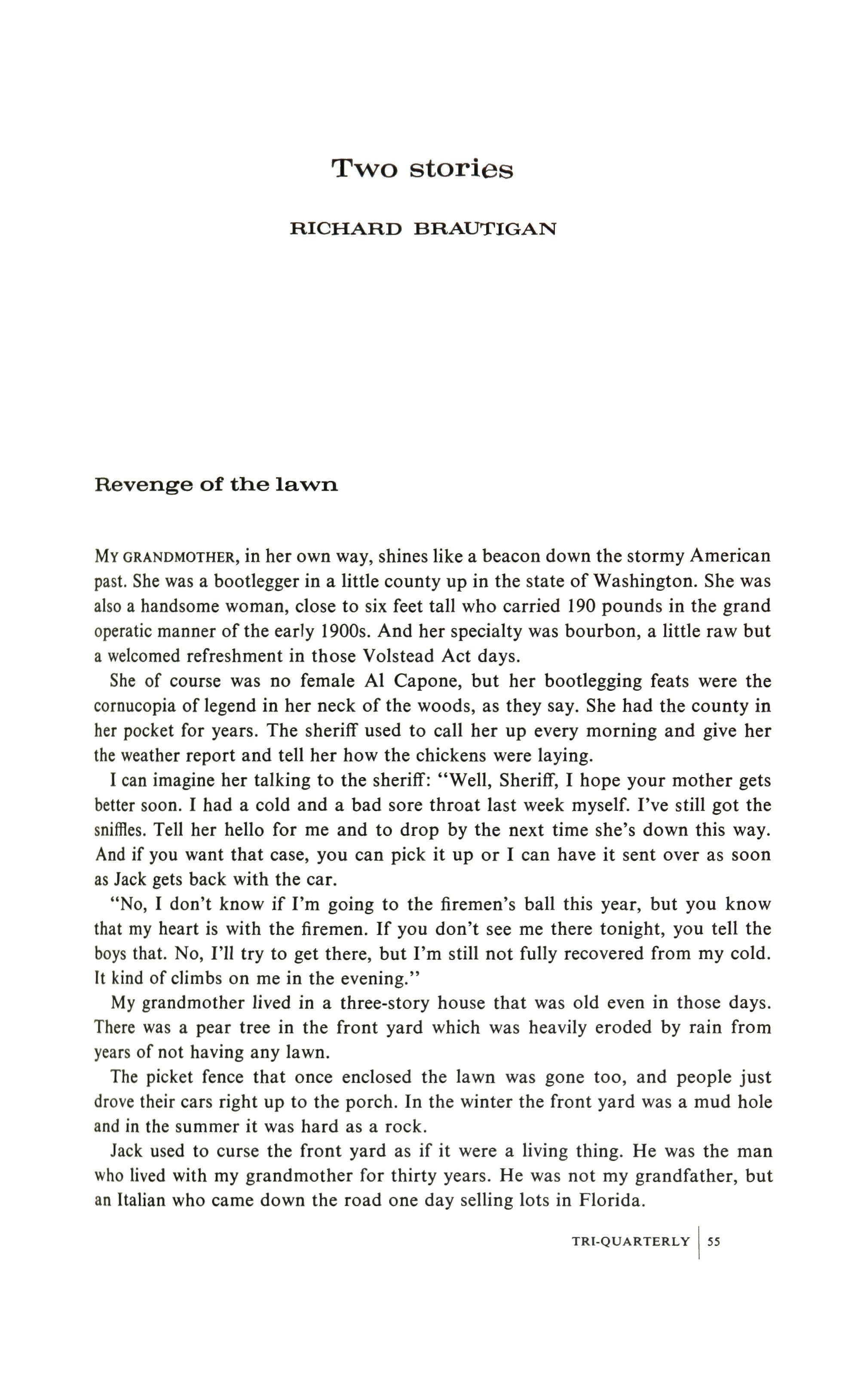
Revenge of the lawn
My GRANDMOTHER, in her own way, shines like a beacon down the stormy American past. She was a bootlegger in a little county up in the state of Washington. She was also a handsome woman, close to six feet tall who carried 190 pounds in the grand operatic manner of the early 1900s. And her specialty was bourbon, a little raw but a welcomed refreshment in those Volstead Act days.
She of course was no female Al Capone, but her bootlegging feats were the cornucopia of legend in her neck of the woods, as they say. She had the county in her pocket for years. The sheriff used to call her up every morning and give her the weather report and tell her how the chickens were laying.
I can imagine her talking to the sheriff: "Well, Sheriff, I hope your mother gets better soon. I had a cold and a bad sore throat last week myself. I've still got the sniffles, Tell her hello for me and to drop by the next time she's down this way. And if you want that case, you can pick it up or I can have it sent over as soon as Jack gets back with the car.
"No, I don't know if I'm going to the firemen's ball this year, but you know that my heart is with the firemen. If you don't see me there tonight, you tell the boys that. No, I'll try to get there, but I'm still not fully recovered from my cold. It kind of climbs on me in the evening."
My grandmother lived in a three-story house that was old even in those days. There was a pear tree in the front yard which was heavily eroded by rain from years of not having any lawn.
The picket fence that once enclosed the lawn was gone too, and people just drove their cars right up to the porch. In the winter the front yard was a mud hole and in the summer it was hard as a rock.
Jack used to curse the front yard as if it were a living thing. He was the man who lived with my grandmother for thirty years. He was not my grandfather, but an Italian who came down the road one day selling lots in Florida.
TRI·QUARTERLY 55
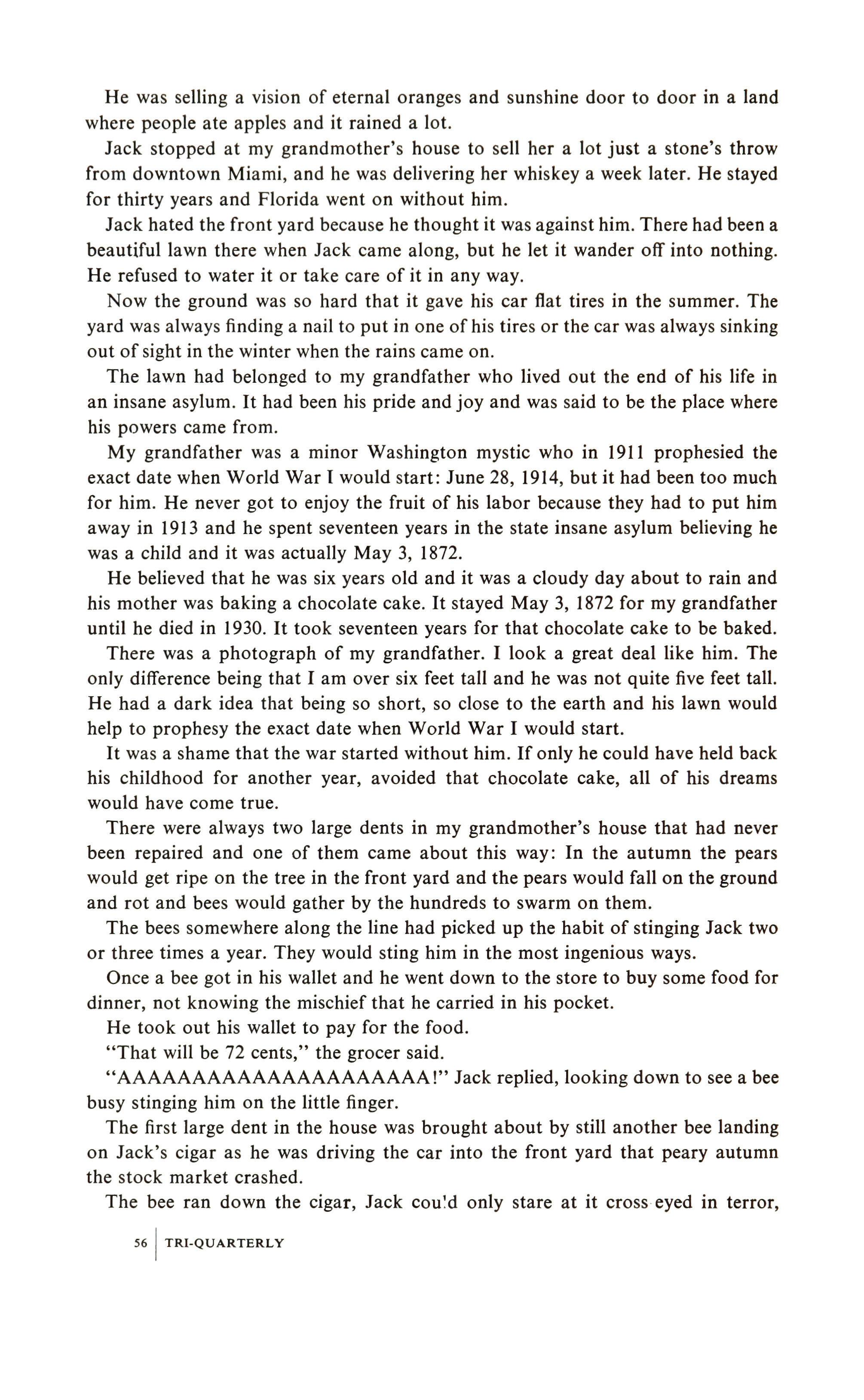
He was selling a vision of eternal oranges and sunshine door to door in a land where people ate apples and it rained a lot.
Jack stopped at my grandmother's house to sell her a lot just a stone's throw from downtown Miami, and he was delivering her whiskey a week later. He stayed for thirty years and Florida went on without him.
Jack hated the front yard because he thought it was against him. There had been a beautiful lawn there when Jack came along, but he let it wander off into nothing. He refused to water it or take care of it in any way.
Now the ground was so hard that it gave his car flat tires in the summer. The yard was always finding a nail to put in one of his tires or the car was always sinking out of sight in the winter when the rains came on.
The lawn had belonged to my grandfather who lived out the end of his life in an insane asylum. It had been his pride and joy and was said to be the place where his powers came from.
My grandfather was a minor Washington mystic who in 1911 prophesied the exact date when World War I would start: June 28, 1914, but it had been too much for him. He never got to enjoy the fruit of his labor because they had to put him away in 1913 and he spent seventeen years in the state insane asylum believing he was a child and it was actually May 3, 1872.
He believed that he was six years old and it was a cloudy day about to rain and his mother was baking a chocolate cake. It stayed May 3, 1872 for my grandfather until he died in 1930. It took seventeen years for that chocolate cake to be baked.
There was a photograph of my grandfather. I look a great deal like him. The only difference being that I am over six feet tall and he was not quite five feet tall. He had a dark idea that being so short, so close to the earth and his lawn would help to prophesy the exact date when World War I would start.
It was a shame that the war started without him. If only he could have held back his childhood for another year, avoided that chocolate cake, all of his dreams would have come true.
There were always two large dents in my grandmother's house that had never been repaired and one of them came about this way: In the autumn the pears would get ripe on the tree in the front yard and the pears would fallon the ground and rot and bees would gather by the hundreds to swarm on them.
The bees somewhere along the line had picked up the habit of stinging Jack two or three times a year. They would sting him in the most ingenious ways.
Once a bee got in his wallet and he went down to the store to buy some food for dinner, not knowing the mischief that he carried in his pocket.
He took out his wallet to pay for the food.
"That will be 72 cents," the grocer said.
"AAAAAAAAAAAAAAAAAAAAA!" Jack replied, looking down to see a bee busy stinging him on the little finger.
The first large dent in the house was brought about by still another bee landing on Jack's cigar as he was driving the car into the front yard that peary autumn the stock market crashed.
The bee ran down the cigar, Jack cou'd only stare at it cross eyed in terror,
56 TRI-QUARTERLY

and stung him on the upper lip. His reaction to this was to drive the car immediately into the house.
That front yard had quite a history after Jack let the lawn go to hell. One day in 1932 Jack was off running an errand or delivering something for my grandmother. She wanted to dump the old mash and get a new batch going.
Because Jack was gone, she decided to do it herself. Grandmother put on a pair of railroad overalls that she used for working around the still and filled a wheelbarrow with mash and dumped it out in the front yard.
She had a flock of snow-white geese that roamed outside the house and nested in the garage that had not been used to park the car since the time Jack had come along selling futures in Florida.
Jack had some kind of idea that it was all wrong for a car to have a house. I think it was something that he had learned in the old country. The answer was in Italian because that was the only language Jack used when he talked about the garage. For everything else he used English, but it was only Italian for the garage.
After Grandmother had dumped the mash on the ground near the pear tree, she went back to the still down in the basement and the geese all gathered around the mash and started talking it over.
I guess they came to a mutually agreeable decision because they all started eating the mash. As they ate the mash their eyes got brighter and brighter and their voices, in appreciation of the mash, got louder and louder.
After a while one of the geese stuck his head in the mash and forgot to take it out. Another one of the geese cackled madly and tried to stand on one leg and give a W. C. Field's imitation of a stork. He maintained that position for about a minute before he fell on his tail feathers.
My grandmother found them all lying around the mash in the positions that they had fallen. They looked as if they had been machine-gunned. From the height of her operatic splendor she thought that they were all dead.
She responded to this by plucking all their feathers and piling their bald bodies in the wheelbarrow and wheeling them down to the basement. She had to make five trips to accommodate them.
She stacked them like cordwood near the still and waited for Jack to return and dispose of them in a way that would provide a goose for dinner and a small profit by selling the rest of the flock in town. She went upstairs to take a nap after finishing with the still.
It was about an hour later that the geese woke up. They had devastating hangovers. They had all kind of gathered themselves uselessly to their feet when suddenly one of the geese noticed that he did not have any feathers. He informed the other geese of their condition; too. They were all in despair.
They paraded out of the basement in a forlorn and wobbly gang. They were all standing in a cluster near the pear tree when Jack drove into the front yard.
The memory of the time he had been stung on the mouth by that bee must have come back to his mind when he saw the defeathered geese standing there, because suddenly like a madman he tore out the cigar he had stuck in his mouth and threw it away from him as hard as he could. This caused his hand to travel through the
TRI-QUARTERLY S7

windshield. A feat that cost him 32 stitches.
The geese stood by staring on like some helpless, primitive American advertisement for aspirin under the pear tree as Jack drove his car into the house for the second and last time in the Twentieth Century.
The first time I remember anything in life occurred in my grandmother's front yard. The year was either 1936 or 1937. I remember a man, probably Jack, cutting down the pear tree and soaking it with kerosene.
It looked strange, even for a first memory of life, to watch a man pour gallons and gallons of kerosene allover a tree lying stretched out thirty feet or so on the ground, and then to set fire to it while the fruit was still green on the branches.
A short history of religion in California
THERE'S ONLY one way to get into it: we saw the deer in the meadow. The deer turned in a slow circle and then broke the circle and went toward some trees.
There were three deer in the meadow and we were three people. I, a friend and my daughter 3� years old. "See the deer," I said, pointing the way to the deer.
"Look the deer! There! There!" she said and surged against me a's I held her in the front seat. A little jolt of electricity had come to her from the deer. Three little gray dams went away into the trees, celebrating a TVA of hoofs.
She talked about the deer as we drove back to our camp in Yosemite. "Those deer are really something," she said. "I'd like to be a deer."
When we turned into our campground there were three deer standing at the entrance, looking at us. They were the same three deer or they were three different ones.
"Look the deer!" and the same electrical surge against me, enough perhaps to light a couple of Christmas tree lights or make a fan turn for a minute or toast half-a-slice of bread.
The deer followed close behind the car as we drove at deer speed into the camp. When we got out of the car, the deer were there. My daughter took out after them. Wow! The deer!
I slowed her down. "Wait," I said. "Let Daddy take your hand." I didn't want her to scare them or get hurt by them either, in case they should panic and run over her, a next to impossible thing.
We followed after the deer, a little ways behind and then stopped to watch them cross the river. The river was shallow and the deer stopped in the middle and looked in three different directions.
She stared at them, not saying anything for a while. How quiet and beautiful they looked and then she said, "Daddy, take off the deer's head and put it on my
* * *
58
TRI-QUARTERLY
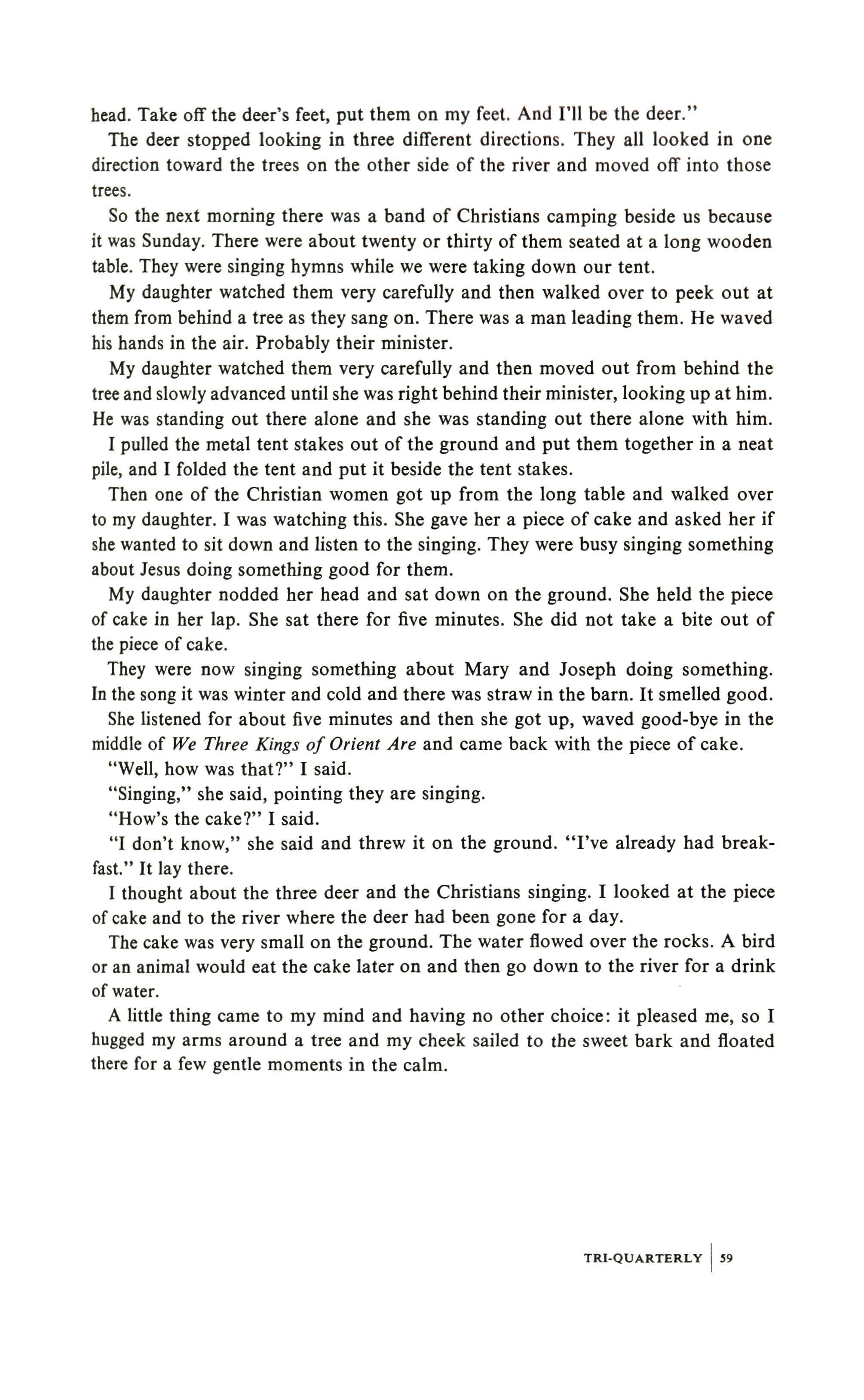
head. Take off the deer's feet, put them on my feet. And I'll be the deer."
The deer stopped looking in three different directions. They all looked in one direction toward the trees on the other side of the river and moved off into those trees.
So the next morning there was a band of Christians camping beside us because it was Sunday. There were about twenty or thirty of them seated at a long wooden table. They were singing hymns while we were taking down our tent.
My daughter watched them very carefully and then walked over to peek out at them from behind a tree as they sang on. There was a man leading them. He waved his hands in the air. Probably their minister.
My daughter watched them very carefully and then moved out from behind the tree and slowly advanced until she was right behind their minister, looking up at him. He was standing out there alone and she was standing out there alone with him.
1 pulled the metal tent stakes out of the ground and put them together in a neat pile, and I folded the tent and put it beside the tent stakes.
Then one of the Christian women got up from the long table and walked over to my daughter. I was watching this. She gave her a piece of cake and asked her if she wanted to sit down and listen to the singing. They were busy singing something about Jesus doing something good for them.
My daughter nodded her head and sat down on the ground. She held the piece of cake in her lap. She sat there for five minutes. She did not take a bite out of the piece of cake.
They were now singing something about Mary and Joseph doing something. In the song it was winter and cold and there was straw in the barn. It smelled good. She listened for about five minutes and then she got up, waved good-bye in the middle of We Three Kings of Orient Are and came back with the piece of cake.
"Well, how was that?" I said.
"Singing," she said, pointing they are singing.
"How's the cake?" I said.
"I don't know," she said and threw it on the ground. "I've already had breakfast." It lay there.
1 thought about the three deer and the Christians singing. I looked at the piece of cake and to the river where the deer had been gone for a day.
The cake was very small on the ground. The water flowed over the rocks. A bird or an animal would eat the cake later on and then go down to the river for a drink of water.
A little thing came to my mind and having no other choice: it pleased me, so I hugged my arms around a tree and my cheek sailed to the sweet bark and floated there for a few gentle moments in the calm.
TRI-QUARTERLY 59
The art of Bridget Riley
JACK W. BURNHAM

To those who follow current art trends it mayor may not seem remarkable that only last December optical art began its process ofpopular canonization via the New York Museum Of Modern Art's Responsive Eye show. Prior to this exhibition, for the American public at least, the name of Bridget Riley was virtually unknown. All of which says something about the taste-making omnipotence of the Museum Of Modern Art on this side of the ocean but perhaps much more about the cultural gap that naturally exists between Europe and the Western Hemisphere this in spite ofinstant communication.
While in London last summer I was introduced to Miss Riley through the McRoberts and Tunnard gallery. One of the partners in this most friendly establishment thought that Bridget Riley, being both knowledgeable and intelligent, might provide some insights into the London art scene. Already this painter had begun to make a namefor herself with two successful London exhibitions, representation that spring in the "Nouvelle Tendence" show in Paris, a painting in the world-wide Gulbenkian exhibition at the Tate, plus other new tendency affairs all antedating American interest in optical art by several years. A very stimulating talk with Miss Riley led to an agreement that I should do a short article on her work for American readers.
The following piece, a composite of questions, answers, and interpolated remarks, is the result. At the time, I think that neither of us suspected that her work wouldfind the covers offour orfive American magazines, before this article was published. As with many other institutions, the present art world moves with brain-numbing rapidity. To point this up a conservative American museum director predicted last September that optical art would be, "this year's dress length" alluding to the forced 'fashion' aspect of much present art. As an ironic aftermath, before the end of the Museum Of Modern Art exhibition and and her sell-out show at the New York Feigen gallery, Bridget Riley was considering litigation against a dress manufacturerfor copying the black and white designs ofher paintings!
There is more to cope with in America than simply art critics. Later by letter I asked Miss Riley about her reactions to the United States,." very bewildering" was her succinct reply. As a rule art needs reflection and slow growth. New York, like Adrenalin, acts instantly andpotently on any artist's
60 TRI-QUARTERLY
system much can be absorbed in this city but the social pace, much less the environment makes it an impossible place to work for a number of artists. Perhaps this should be read as an afterthought, but it must be pointed out that Miss Riley is not in agreement with my remarks that indirectly link her with those aspects of optical art which are involved with the ethos and investigating techniques ofscience. Her contention is that, 'c I have never consciously based any work on a scientific principle (nor studied 'optics' as such) people claim parallels in my work with scientific data it may be that thefrontiers ofart are close to those ofscience and that both are manifestations ofthepsyche ofour time."
She goes on to write, "also it may surprise you that I am not primarily interested in the optical aspect of my work (I repeat what I think I said on one occasion when we were talking that it is (only) a 'medium'). The center of my concern is the 'event' which I want to precipitate within the work."
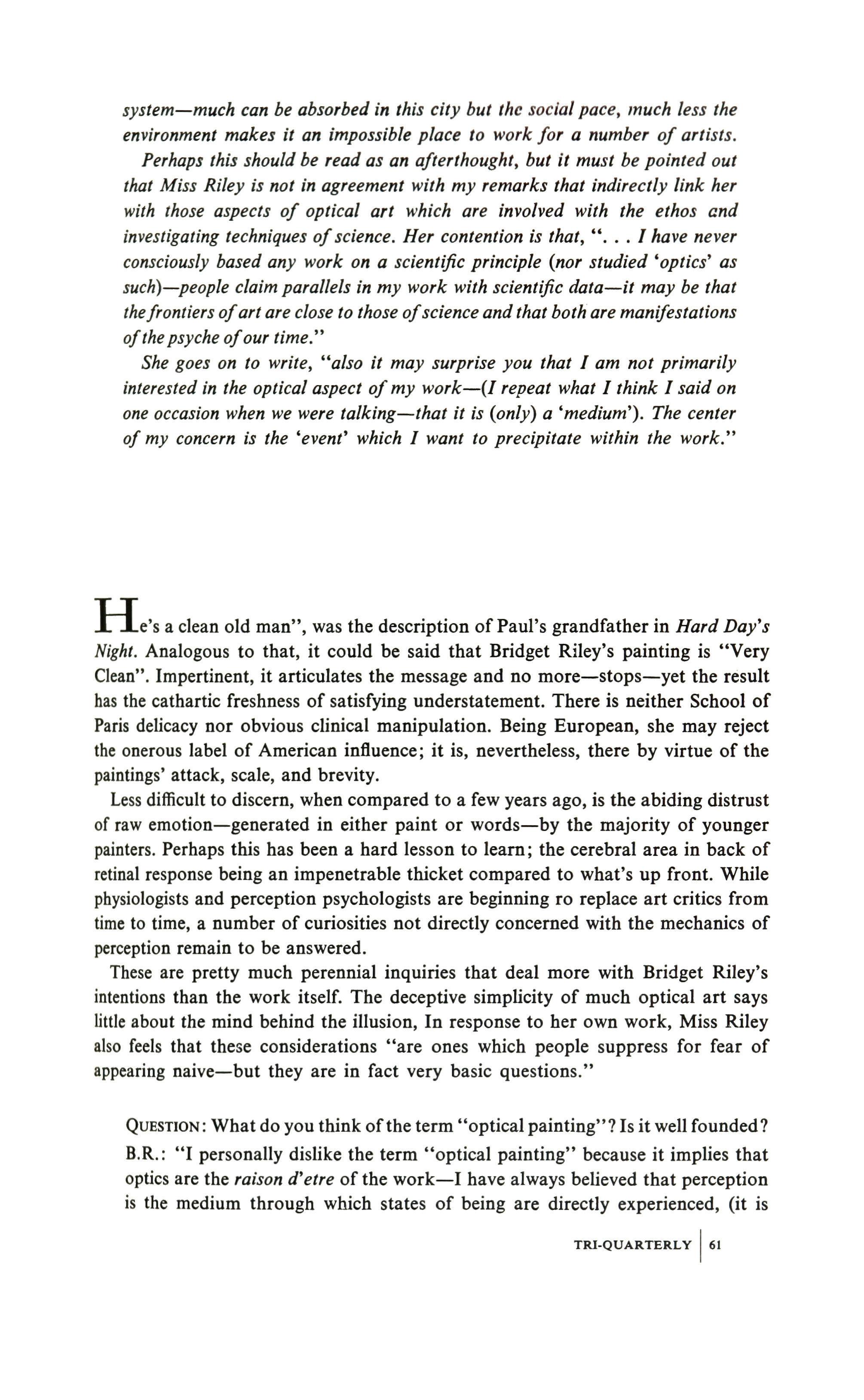
e's a clean old man", was the description of Paul's grandfather in Hard Day's Night. Analogous to that, it could be said that Bridget Riley's painting is "Very Clean". Impertinent, it articulates the message and no more stops yet the result has the cathartic freshness of satisfying understatement. There is neither School of Paris delicacy nor obvious clinical manipulation. Being European, she may reject the onerous label of American influence; it is, nevertheless, there by virtue of the paintings' attack, scale, and brevity.
Less difficult to discern, when compared to a few years ago, is the abiding distrust of raw emotion generated in either paint or words by the majority of younger painters. Perhaps this has been a hard lesson to learn; the cerebral area in back of retinal response being an impenetrable thicket compared to what's up front. While physiologists and perception psychologists are beginning ro replace art critics from time to time, a number of curiosities not directly concerned with the mechanics of perception remain to be answered.
These are pretty much perennial inquiries that deal more with Bridget Riley's intentions than the work itself. The deceptive simplicity of much optical art says little about the mind behind the illusion, In response to her own work, Miss Riley also feels that these considerations "are ones which people suppress for fear of appearing naive but they are in fact very basic questions."
QUESTION: What do you think ofthe term "optical painting"? Is it well founded?
B.R.: "I personally dislike the term "optical painting" because it implies that optics are the raison d'etre of the work I have always believed that perception is the medium through which states of being are directly experienced, (it is
TRI-QUAR"IERLY 61

widely acknowledged and should need no further emphaiss, that Neurophysiological and psychological responses are inseparable).
"But the labels given to movements in art (e.g. Fauvism, The Blue Rider, Pointillism) are usually only a question of identification; they have seldom shown any profound insight into the nature of the work itself."
An interesting sidelight exists to the problem of labels. Although optical work generally falls into the "hard-edge" category of painting, in conversation Bridget Riley qualifies the inclusion of her own work by explaining that most "hard-edge" is "gestural" by nature while her work is not. "Gestural" in the context of abstract expressionism describes the act of the painter making his particular mark on the canvas. It implies (according to some of its exponents) a spontaneous ritual of plastic means that seeks recognition through painterly idiosyncracies. For Miss Riley, at least, the pursuasiveness of "gestural", hard-edge painting has too much to do with associations and implications outside the work itself. Perceptual ambiguity or stimulation are quite secondary in a painting by Mortensen, Nicholson, or Stella. Stance is everything. Familiar handwriting, no matter how precise or unique, cannot make an optical painting.
In sequal, Bridget Riley admits that "handwriting" or personal style is desirable, possibly even essential. In retrospect, much new non-objective painting went through the initial ordeal of appearing highly impersonal. With time the individual qualities of a painter becomes increasingly apparent. The paradox of a "styleless style" was never confined to op art.
QUESTION: Do you feel any sever limitations in the expressive potential of your approach?
B.R.: "No not at all maybe because I have no rigid theoretical premise and consequently no inhibitions about making a painting which might be theoretically contrary. The only limitations which I do respect arise naturally out of each particular work, and these are plastic considerations rather than emotional."
Traces of the American pop attitude and technique have developed to a marked degree, but quite separately, in Bridget Riley's work. The lack ofpaint manipulation, the commercial precision and explosion of scale seem to work as a means of magnifying the expressive aspects of illusion. Not surprisingly, Miss Riley has had substantial experience as a commercial artist. She values this training and views it neither as an annihilator of talent nor as the means to a loss of integrity. Although advertising art can be, and much of the time is, a vast waste of human energy, the tedium of precise detail was a form of valuable technical discipline for the artist.
A kind of "reverse English" takes place when one reads that Miss Riley has had some of her canvases sent out to be painted commercially. Today this has a certain, no longer subversive, appeal. Optical artists are in a seeming, tacit competition with one another for painted surfaces that appear with a precision equalling the finest silk screen printing.
62 TRI-QUARTERLY

Four years ago Bridget Riley began experimentation with her first black and white studies. An early work, Hidden Squares, has a relatively reticent, Benday quality. In impact the painting is softly optical and is concerned with discrepancies rather than pulsating tension. Steadily in the past two years her work has pushed towards maximum focus. Whether this quality ofvisual collision is American or International in origin is not so important as that it tended to separate her in style and intention from an early mentor at a distance, Vasarely.
QUESTION; Are you interested in a mystique? Is it at all possible or necessary for your art?
B.R.; "There is an element of symbolism in my work but there are some artists working in this field who would eschew associations of any kind, and others who are building up a mystique so it is possible the question of whether it is necessary or not lies with each artist."
It is helpful to remember that the laureates of most successful movements did work out a particular goal beyond the existance of the work itself; whether it had to do with "freeing" art, devising a new visual language, or limbering the psyche, the attempt could be and was made to establish a viable aesthetic beyond retinal impact. Witnessing such drastic and unquestioning appropriation of scientific perception data, any transcendent potential that optical painting can have may be fairly questioned.
.Pioneers of the early days of non-objective art, Kandinsky and Mondrian for example, spread by means of eloquent exegesis an aura of devout understanding around their work. Their prose helped to make their painting a reality for many people. Non-objective art unadorned with a plausible mystique, or at least a set of plastic objectives, has usually found the going difficult. Nevertheless, we live in an era when manifestos and declarations of purpose are profoundly distrusted by both the public and artists alike!

As optical painting in its purest form is naked in intention, silence is a most practical defence. This type of painting wants no saga for itself; still, the absence of a higher cause is felt. Uncontrolled heat has always been wasted energy in the thermodynamics of art. Yet quite possibly such a transcendent philosophy may work itself out when present, so-called optical art can be viewed in retrospect and as a totality.
QUESTION: Are your paintings meant to be lived with?
B.R.: "They certainly can be lived with but they are painted because they have to be painted."
Curiously, the public response to optical art is enthusiastic and relatively uninhibited. Experts and critics are the ones displaying doubts: citing optical art's text book origins, emotional aridity and formal determinism. Doubts also exist that are less easily stated.
One may surmize that the purpose of the best optical art is to some still undetermined extent, radically distinct from previous non-objective art. In viewing a Riley painting, the kinethetic sensations which frequently result are the door to fluxuating pleasure irritant response pattern. Lingering on are remnents of older aesthetic closure sets, but unaccounted for is the disquieting sense of immediate sensory gratification and disturbance. If one accepts Marshall McLuhan's contention that painting today is involved in a losing conflict with newer media for the public attention, then possibly we can expect growing intensification of assaults on viewers' sensory equipment. Latency has traditionally been the method by which art makes its effect. Difficult as it is to accept, it presages a Duchamp prophecy re-realizing itself en masse, that disengagement that came over Duchamp when he began to deal with the psycho-physical aspects of pure optical patterns; "Unfrocked Artist" is what he thought of himself at this point, according to Lebel.
QUESTION: If a painting simply (or not simply) works for you is that sufficient?
B.R.: "No there has to be something akin to a sense of recognition within the work it has to be simultaneously an experience of something strange yet familiar.
Up to now Bridget Riley's contribution has been to isolate, purify and raise the experience of field illusion beyond illustration and into a situation of direct per se confrontation. Her painting produces a feedback relationship between observer and art object, an interchange that delays all certainty of intention, hinging on the viewer's natural will to perceptual resolution and the artist's efforts to suspend resolution. If Bridget Riley's attitude is "new tendency", then its trade mark is its ingeniousness, a lack of doctrinaire alignment or concern for "coolness" and ultimately, an obliviousness to everything except performance. The goal is the traditional one where painting tries to penetrate beyond its own surface effects.
TRI-QUARTERLY
64

the art 01 bridget riley
e
.'.4 .' I-, ,) -, '. .' '.� I

• • • • • ....••••••••••••••••••••••••••• •••••••••••••••••••••••••••••••• • •• • ••• •••• •• • ••• •••••••• • • • ••• 4 •••• •• • ••• •••• •• • ••• 4 •••• •••• • ••• •••• • •• • ••• •••••••• • •• 2
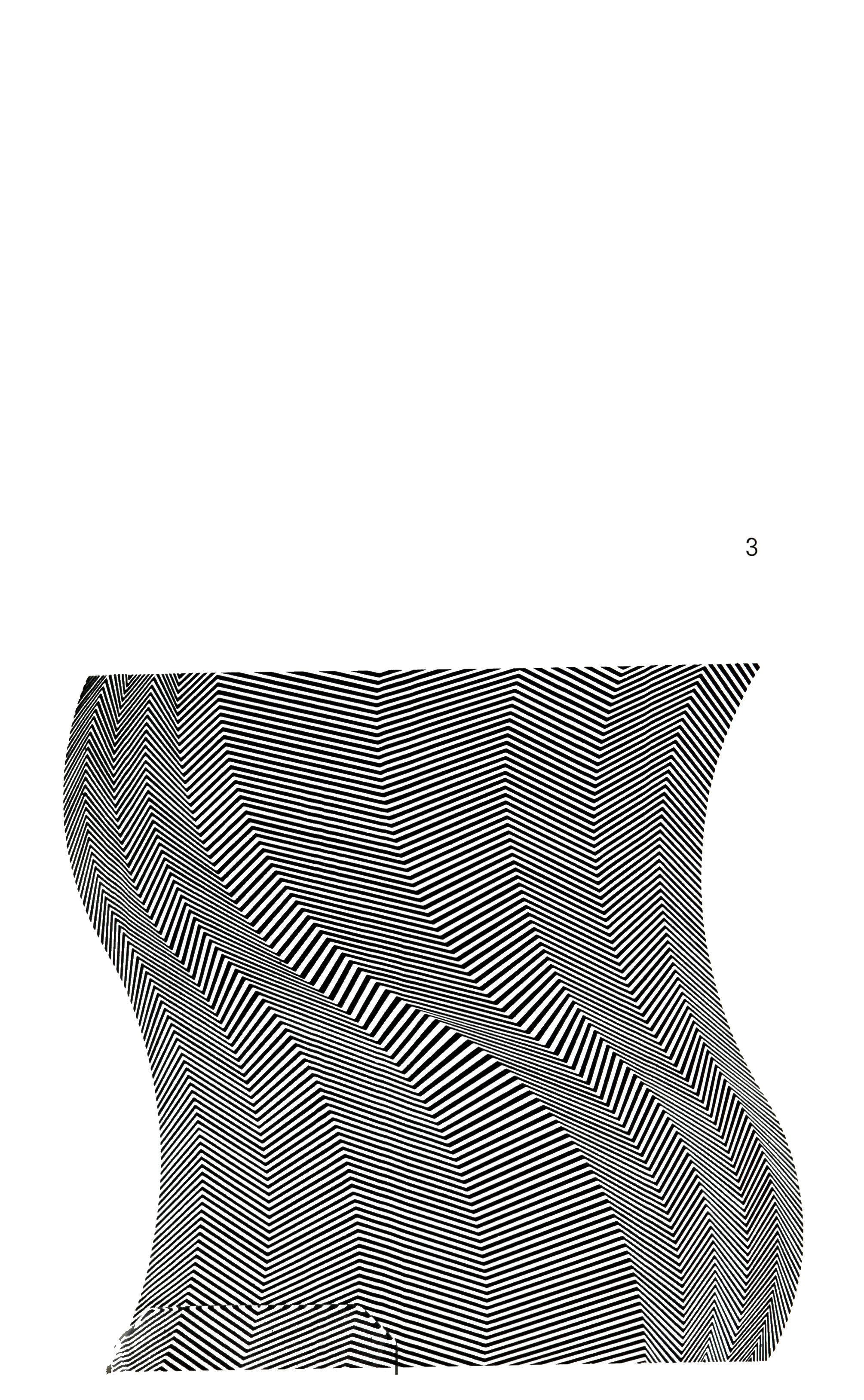
3
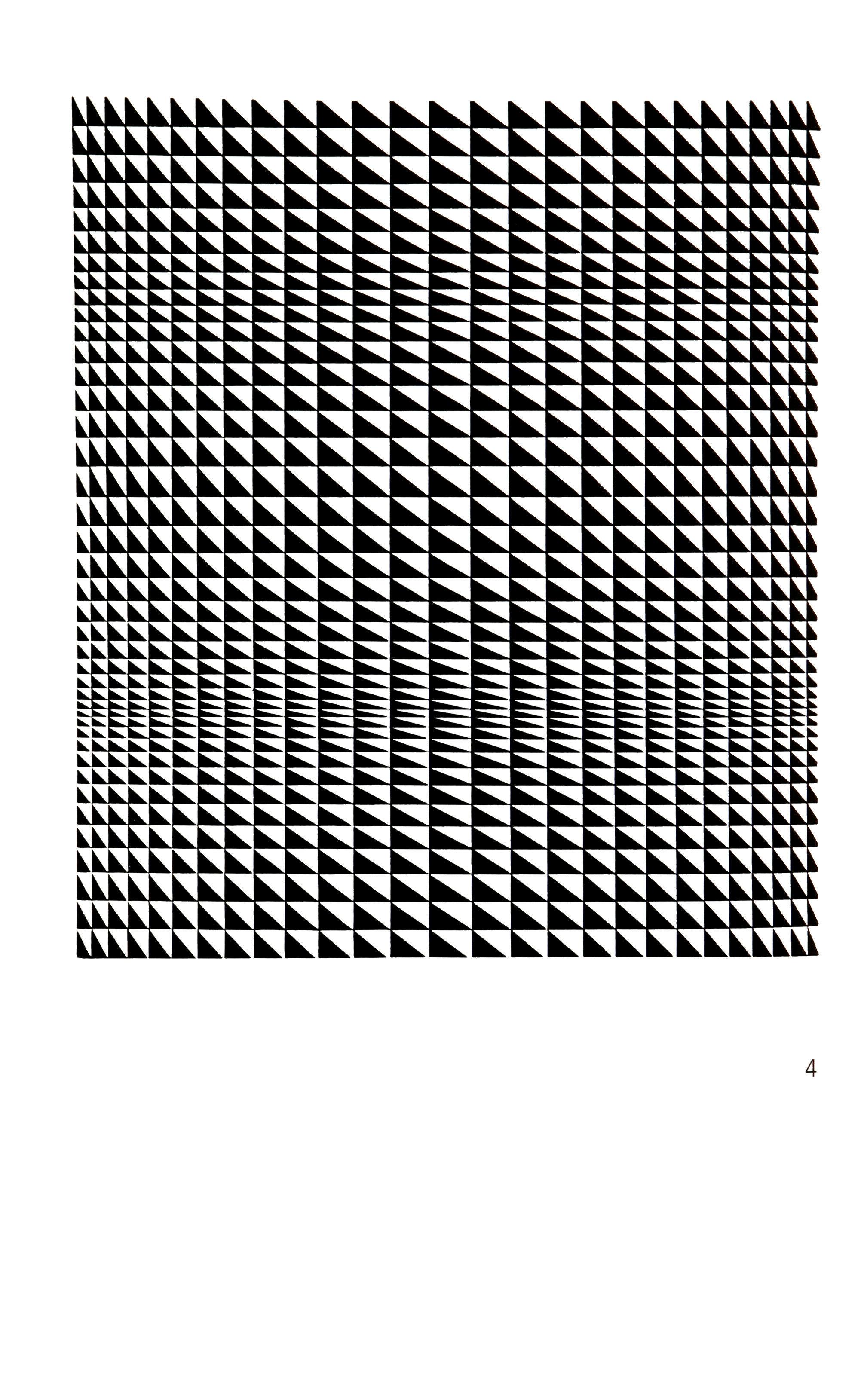
4
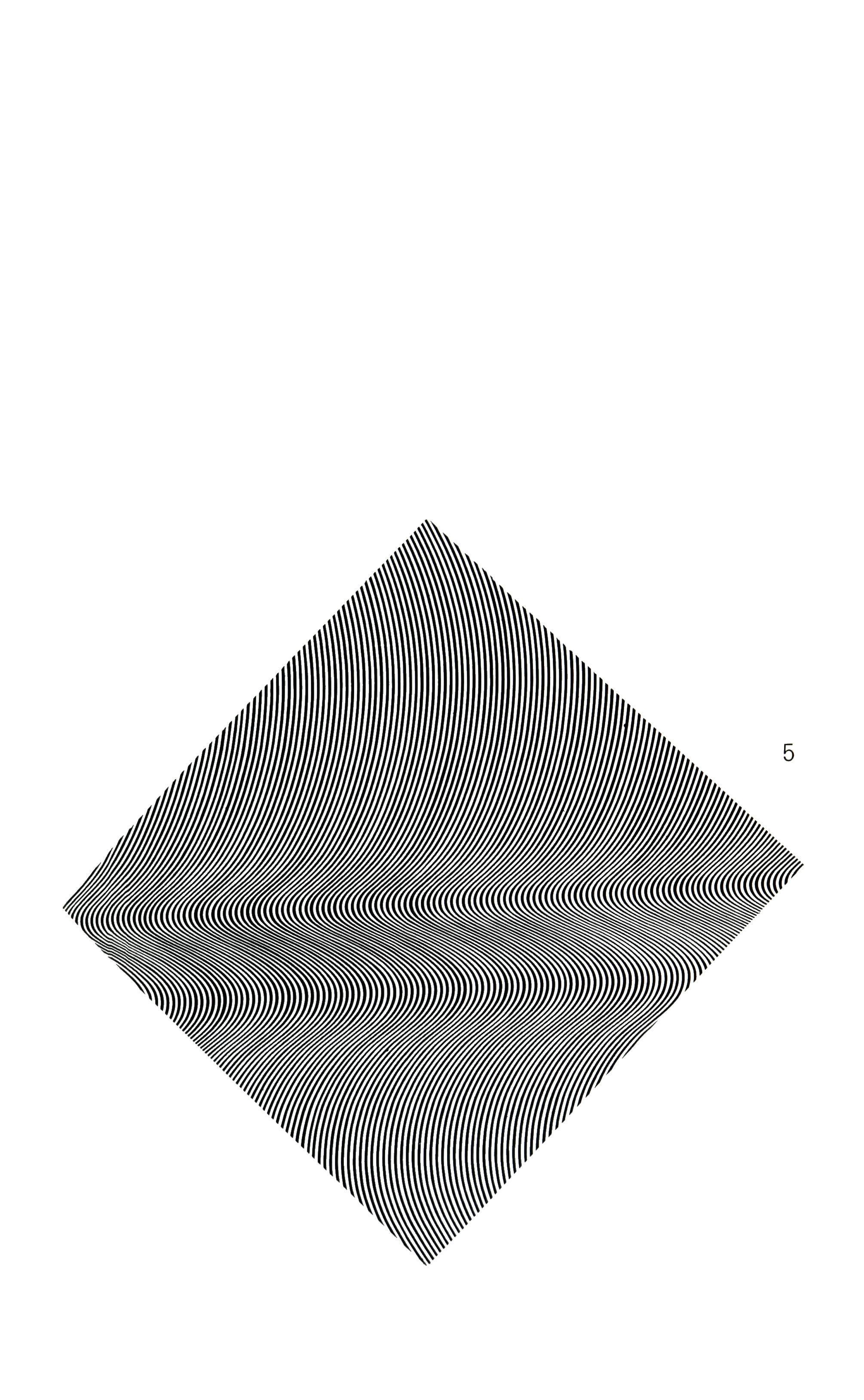
5

• • • • • • • • • • • • • • • • • • • • • • • • • • •

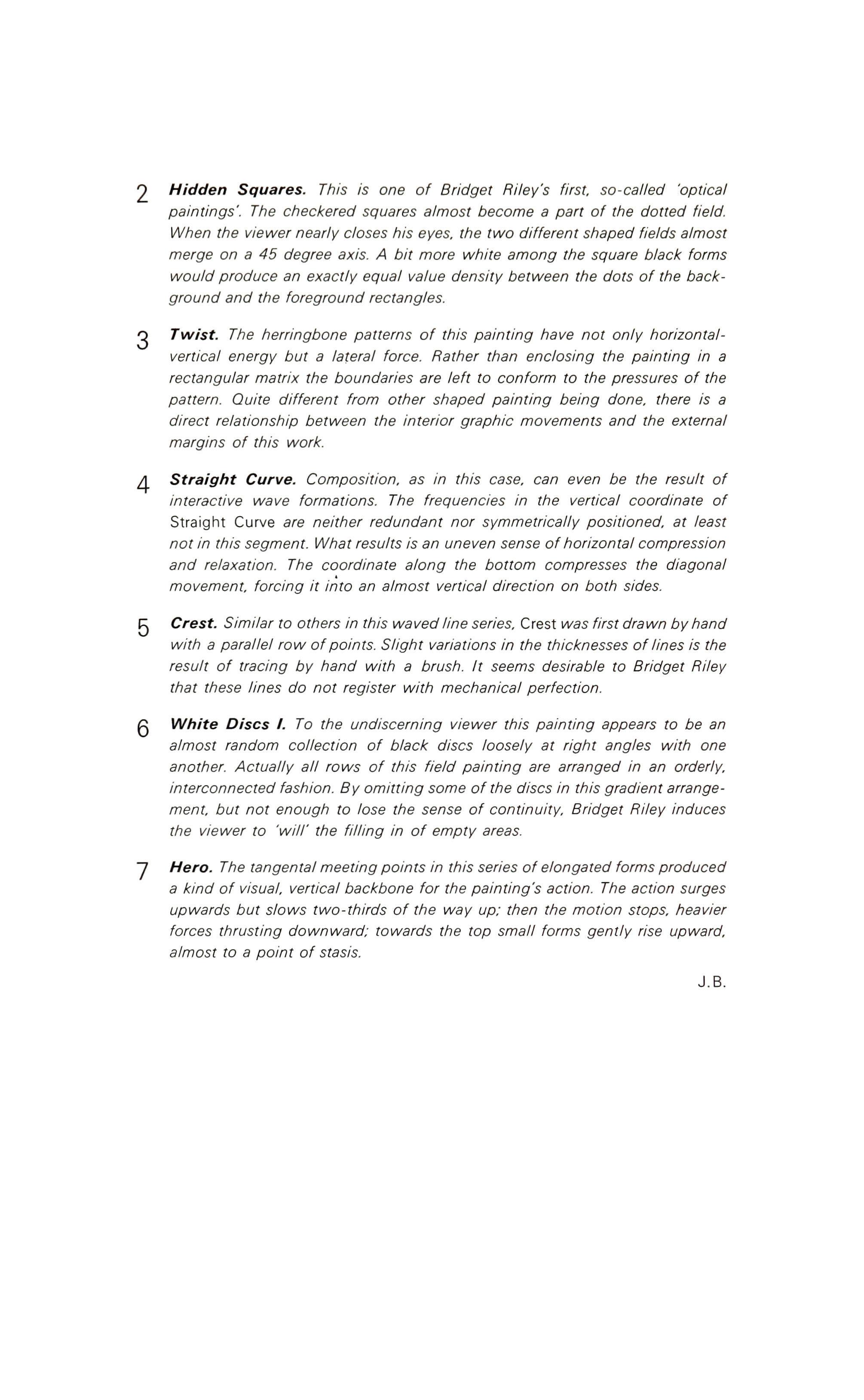
2 Hidden Squares. This is one of Bridget Riley's first, so-called 'optical paintings'. The checkered squares almost become a part of the dotted field. When the viewer nearly closes his eyes, the two different shaped fields almost merge on a 45 degree axis. A bit more white among the square black forms would produce an exactly equal value density between the dots of the background and the foreground rectangles.
3 Twist. The herringbone patterns of this painting have not only horizontalvertical energy but a lateral force. Rather than enclosing the painting in a rectangular matrix the boundaries are left to conform to the pressures of the pattern. Quite different from other shaped painting being done, there is a direct relationship between the interior graphic movements and the external margins of this work.
4 Straight Curve. Composition, as in this case, can even be the result of interactive wave formations. The frequencies in the vertical coordinate of Straight Curve are neither redundant nor symmetrically positioned, at least not in this segment. What results is an uneven sense of horizontal compression and relaxation. The coordinate along the bottom compresses the diagonal movement, forcing it into an almost vertical direction on both sides.
5 Crest. Similar to others in this waved line series, Crest was first drawn by hand with a parallel row ofpoints. Slight variations in the thicknesses of lines is the result of tracing by hand with a brush. It seems desirable to Bridget Riley that these lines do not register with mechanical perfection.
6 White Discs I. To the undiscerning viewer this painting appears to be an almost random collection of black discs loosely at right angles with one another. Actually all rows of this field painting are arranged in an orderly, interconnected fashion. By omitting some of the discs in this gradient arrangement, but not enough to lose the sense of continuity, Bridget Riley induces the viewer to 'will' the filling in of empty areas.
7 Hero. The tangental meeting points in this series of elongated forms produced a kind of visual, vertical backbone for the painting's action. The action surges upwards but slows two-thirds of the way up: then the motion stops, heavier forces thrusting downward: towards the top small forms gently rise upward, almost to a point of stasis.
J. B.
In a hole
GEORGE P. ET.T.TOTT
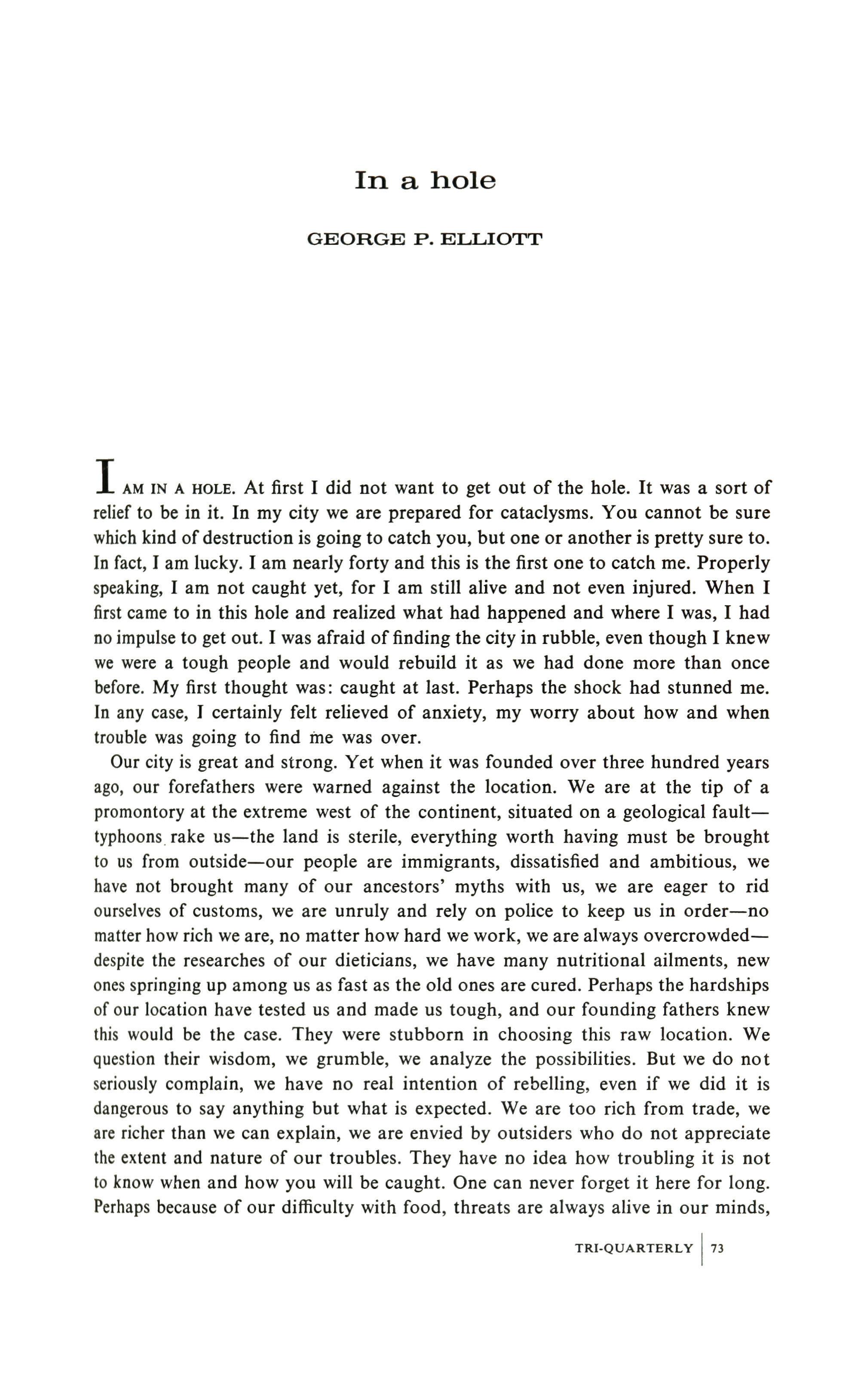
AM IN A HOLE. At first I did not want to get out of the hole. It was a sort of relief to be in it. In my city we are prepared for cataclysms. You cannot be sure which kind of destruction is going to catch you, but one or another is pretty sure to. In fact, I am lucky. I am nearly forty and this is the first one to catch me. Properly speaking, I am not caught yet, for I am still alive and not even injured. When I first came to in this hole and realized what had happened and where I was, I had no impulse to get out. I was afraid of finding the city in rubble, even though I knew we were a tough people and would rebuild it as we had done more than once before. My first thought was: caught at last. Perhaps the shock had stunned me. In any case, I certainly felt relieved of anxiety, my worry about how and when trouble was going to find me was over.
Our city is great and strong. Yet when it was founded over three hundred years ago, our forefathers were warned against the location. We are at the tip of a promontory at the extreme west of the continent, situated on a geological faulttyphoons rake us the land is sterile, everything worth having must be brought to us from outside our people are immigrants, dissatisfied and ambitious, we have not brought many of our ancestors' myths with us, we are eager to rid ourselves of customs, we are unruly and rely on police to keep us in order no matter how rich we are, no matter how hard we work, we are always overcrowdeddespite the researches of our dieticians, we have many nutritional ailments, new ones springing up among us as fast as the old ones are cured. Perhaps the hardships of our location have tested us and made us tough, and our founding fathers knew this would be the case. They were stubborn in choosing this raw location. We question their wisdom, we grumble, we analyze the possibilities. But we do not seriously complain, we have no real intention of rebelling, even if we did it is dangerous to say anything but what is expected. We are too rich from trade, we are richer than we can explain, we are envied by outsiders who do not appreciate the extent and nature of our troubles. They have no idea how troubling it is not to know when and how you will be caught. One can never forget it here for long. Perhaps because of our difficulty with food, threats are always alive in our minds, TRI-QUARTERLY 73

ready to leap at us. No matter how much we eat, no matter what our dieticians do, no matter what chefs we import to make our food savory, we suffer from malnutrition. We are fat and undernourished. The stupid are luckiest for they do not know they lack. The wise suffer most. There are a few who make a virtue of fasting and austerity; they say they are at peace; but I have never seen one look me in the eye when he said it. They look up at the sky or out to sea, and talk of love and peace and truth. Their strict diet makes their skin rough and scaly, their nails thicken and turn blue, their eyes become vague. They do not bother people much, nobody cares enough to restrain them. We keep on trying to improve our diet, we hold conferences and symposiums on the subject, it has become the subject of our most intensive experiments.
An earthquake caught me. It was quite a severe one, but I don't think it was as bad as the one that killed a third of our people when I was a young man. I was nimble and quick, and came through with nothing worse than a few bruises. In that one, great chasms opened, whereas the hole I am in now is not more than twenty feet deep. This one caught me just as I was coming out of the telephone building.
I had gone there to argue about a mistake on my bill. They had charged me for two long distance calls to Rome the month before. Absurd! Neither my wife nor I would dream of talking with anyone at such a distance. Overseas connections are notoriously unreliable, even with our communications system, our greatest civic pride we would be able to talk with the moon if there were anyone there to talk to. Neither my wife nor I have any friends in Rome. It is true that I have corresponded for years with a numismatist in Rome I collect old coins but our common interest conceals the profoundest disagreement. I would do much to avoid meeting him in person, should he ever propose such a thing, as he has never shown the slightest sign of doing. To him ancient coins are objects of trade, their value varies from time to time but at any given moment it can be agreed upon, they are commodities. I would never expose to him the slightest edge of what they mean to me, of the speculations they excite in me. (A drachma which was worth many loaves of bread two thousand years ago is now worth nothingexcept to a few antiquarians like me, to whom it means a hundred times more than it did then. I look at it unable to comprehend. If I did comprehend, it would cease to be worth even a slice of bread to me. Do all those to whom it is worthless understand something that eludes me?) The numismatist and I share no language but the code of catalogues. We would not be able to talk to one another face to face, much less over the telephone. And the length of time these supposed long distance calls went on! One lasted an hour, the other nearly as long. I went to the telephone building to complain, politely of course, but firmly. They had to prove that my wife or I had made such preposterous calls. They said they would find out who it was the call had gone to both calls to Rome were to the same number. I saw they did not believe me. I knew that legally they could not force me to pay if I denied responsibility. All the same, I was not feeling cleanly victorious as I left the building. I was thrown to the street. I remember seeing the facade of the telephone building topple out towards me in one slab, then crack and buckle. When J came
74 TRI-QUARTERLY
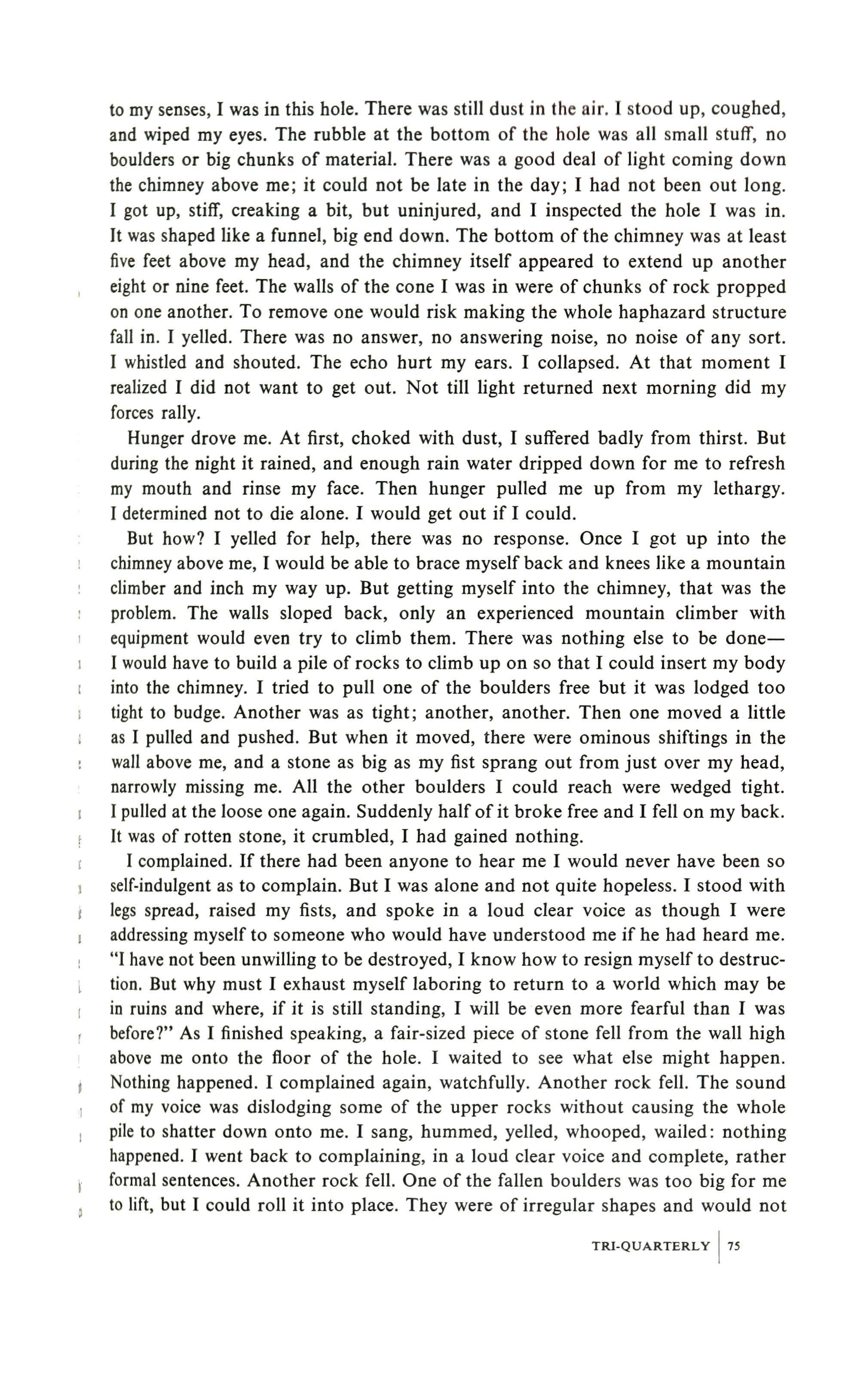
I to my senses, I was in this hole. There was still dust in the air. I stood up, coughed, and wiped my eyes. The rubble at the bottom of the hole was all small stuff, no boulders or big chunks of material. There was a good deal of light coming down the chimney above me; it could not be late in the day; I had not been out long. I got up, stiff, creaking a bit, but uninjured, and I inspected the hole I was in. It was shaped like a funnel, big end down. The bottom of the chimney was at least five feet above my head, and the chimney itself appeared to extend up another eight or nine feet. The walls of the cone I was in were of chunks of rock propped on one another. To remove one would risk making the whole haphazard structure fall in. I yelled. There was no answer, no answering noise, no noise of any sort. I whistled and shouted. The echo hurt my ears. I collapsed. At that moment I realized I did not want to get out. Not till light returned next morning did my forces rally.
Hunger drove me. At first, choked with dust, I suffered badly from thirst. But during the night it rained, and enough rain water dripped down for me to refresh my mouth and rinse my face. Then hunger pulled me up from my lethargy. I determined not to die alone. I would get out if I could.
But how? I yelled for help, there was no response. Once I got up into the chimney above me, I would be able to brace myself back and knees like a mountain climber and inch my way up. But getting myself into the chimney, that was the problem. The walls sloped back, only an experienced mountain climber with equipment would even try to climb them. There was nothing else to be doneI would have to build a pile of rocks to climb up on so that I could insert my body into the chimney. I tried to pull one of the boulders free but it was lodged too tight to budge. Another was as tight; another, another. Then one moved a little as I pulled and pushed. But when it moved, there were ominous shiftings in the wall above me, and a stone as big as my fist sprang out from just over my head, narrowly missing me. All the other boulders I could reach were wedged tight. I pulled at the loose one again. Suddenly half of it broke free and I fell on my back. It was of rotten stone, it crumbled, I had gained nothing. I complained. If there had been anyone to hear me I would never have been so self-indulgent as to complain. But I was alone and not quite hopeless. I stood with legs spread, raised my fists, and spoke in a loud clear voice as though I were addressing myself to someone who would have understood me if he had heard me. "I have not been unwilling to be destroyed, I know how to resign myself to destruction. But why must I exhaust myself laboring to return to a world which may be in ruins and where, if it is still standing, I will be even more fearful than I was before?" As I finished speaking, a fair-sized piece of stone fell from the wall high above me onto the floor of the hole. I waited to see what else might happen. Nothing happened. I complained again, watchfully. Another rock fell. The sound of my voice was dislodging some of the upper rocks without causing the whole pile to shatter down onto me. I sang, hummed, yelled, whooped, wailed: nothing happened. I went back to complaining, in a loud clear voice and complete, rather formal sentences. Another rock fell. One of the fallen boulders was too big for me to lift. but I could roll it into place. They were of irregular shapes and would not
t I l r j
I I I
TRI-QUARTERLY 75

pile easily and securely. I was going to need a great many pieces of stone of this size. I am healthy and my gardening has kept me in good condition; nevertheless, I felt myself weaker after each complaining and rock-piling episode and had to rest for longer and longer periods. My predicament did not allow me to complain mildly. I am reserved by temperament, I tried to hold back both out of inclination and out of a desire to save my strength, but I found that I could give each complaint nothing less than everything I could muster.
I did not dare complain during the night, for fear a dislodged stone would fallon me. In the daytime I watched when I talked, I could jump to one side in time. I kept trying to figure out which of my words had the power to dislodge the rocks; it must have something to do with vibrations, wave-lengths.
In our city we are quite experimental. Even a private citizen like myself is infected with the spirit of experiment. I live off the income from my inheritance. My wife and I love gardening above everything. Our few friends are scattered throughout the city, we make a point of being strangers to our neighbors. Our rock garden, at the edge of a cliff overlooking a northern cove, is quite remarkable. I am sure it would win prizes and be much visited if we were interested in that sort of thing. But our friends respect our wish to keep our garden private, and our neighbors, whose gardens are severely arranged and have swept paths, do not notice the perfection of our succulents (which they think of as being no more than cliff plants anyway) nor do they see any order in the way our paths and stepping-stones adapt themselves to the terrain. My wife and I have little use for most of what our city gets excited about, we are inclined to scorn prizes and fashion, I had thought I was equally indifferent to the fervor for experimentation. Now, in this hole, I have learned better.
The second night, unable to sleep well because of the discomfort of the floor, I planned experiments to try the next day. I have never heard of anyone who was in a hole like mine. Perhaps these conditions are unique. There are plenty of holes into which our citizens have been known to have fallen; sometimes they were rescued, sometimes they died before they could be got out, often no doubt they just disappeared from sight as I have done. Perhaps no one else discovered how to dislodge boulders as I did. There might be something exceptional about my voice, though no one has ever commented on it. There certainly is nothing odd about my words. They are just ordinary words used with care. Still, though I am not slovenly in my use of words, neither am I a poet. I must not let this opportunity to experiment slip from me, even though, since I need all the physical strength I have to pile the rocks up, I must work fast before I give out. During the night I planned a series of speeches to tryout.
I prayed. When our city was founded, many churches had been built, strong, handsome, stone structures. Our city had originally been built with walls, to withstand the assaults of pirates. To be sure, the pirates were suppressed two centuries ago, and the city grew far beyond the walls, which are now visited by tourists as museum pieces. But our churches, the best ones, which look like and once served as fortresses, have been kept in good repair, services are held in them, the choir schools still function at public expense. I knew many prayers, having been a boy
76 TRI-QUARTERLY

soprano for a few years till my voice cracked. Neither the prayers I recollected nor the ones I made up worked to dislodge the stones.
I delivered the patriotic speeches memorized by every schoolchild the salute to the flag, a constitution day address, the funeral oration which had been delivered by our first prime minister after the revolution had established parliamentary government, our oath of allegiance. None of them worked.
I gave an exact and full history of how I came to be where I was. I described my condition with scientific accuracy and offered every reasonable hypothesis about why I was doing what I was doing. Nothing happened.
I recited a poem, nursery rhymes, a folk tale, the prologue of our constitution. I counted to twenty in Latin, I recited as many of Euclid's axioms as I could recall. No result.
I recited a speech from a play I had acted in when I was in college. Actually I saved this till the last because the speech had become more than the character's words for me, it had come to say what I meant or at least I had come to mean what it said. The part was a small one. I was one of the lesser court gentlemen. At a crucial moment the king gives me a vital message, his throne depends on its delivery. Halfway to the nobleman to whom I am supposed to deliver it, I decide not to, and then the playwright gives me my only important speech, a soliloquy, the great speech of the play. I have no good political reason not to deliver the message, nothing but good will befall me if I do deliver it, I have never before done such a thing as I am now doing. The longer I try to account to myself and the audience for what I am doing, the stranger my action appears; I labor to find the right words, for my court language is insufficient. Twice in the history of our city this play, one of our classics, has been proscribed because of this speech, which cannot be cut out of the play, being its keystone. I recite it now in my hole. A boulder is dislodged all right, but it almost hits me. It is too large for me to lift to the top of the pile I have made. Worst, it comes from the mouth of the chimney above, enlarging it, so that now I must build up my pile even higher than before, in order to be able to brace myself in the chimney and work my way out.
I have to use our language in my own way, I have to speak for myself.
"I am in a hole, I want to get out. I don't know what I shall find when I make my way back into the city. I long to see my wife; if she is still alive and well, she will care for me while I recuperate; if she is injured, I will do what I can for her. These stones are heavy; after I put one up onto the pile, my muscles do not leave off trembling until I raise my voice to talk another rock down from the jumble about me and then hoist it into place; each time after such effort, the trembling penetrates into me deeper. I fear I will not have strength to work my way up the chimney once I have got myself into it. I want to cry, but I must save my strength for words. I do not know why I am here, I did nothing to deserve being thrown down here alone and abandoned."
So, the rocks fall.
What would happen if I did not pretend someone is listening to what I say? I know of course that no one hears my voice, but I speak as though I were being listened to. It must be that which gives my voice the right wave-lengths to dislodge
TRI-QUARTERLY 77
the stones. It obviously is neither the words themselves nor their arrangement; my experiments have removed those possibilities. In the interests of exact knowledge I should complain without audience. I know well enough that I have no audience, not a sound from outside has reached me. But I cannot imagine doing anything so unreasonable as to complain without any audience at all, even though that is what I am in fact doing. Besides, suppose when I did that, all the rocks should fall in on me at once? If I had more strength I would take the risk, I would try to imagine myself as I am. Meanwhile, I had better get on with my complaining while I still have strength and time.

My wife of the town
The stairs are teeth that chew her heels. She grows shorter each day. The child tears her with nails and with cries. I cannot hear the night sounds that burrow in the sheets, unwinding her like thread onto the winter boards.
She moves in the closets mewling among the garments as though she were a sleeve looking for its coat. Where are they, those sheep days, wool days, days fleeced from green time and woven to wear? A black rat chews her heels.
LEWIS TURCO
78 TRI-QUARTERLY
A. R. AnlIDOnS
RICHARD HOWARD
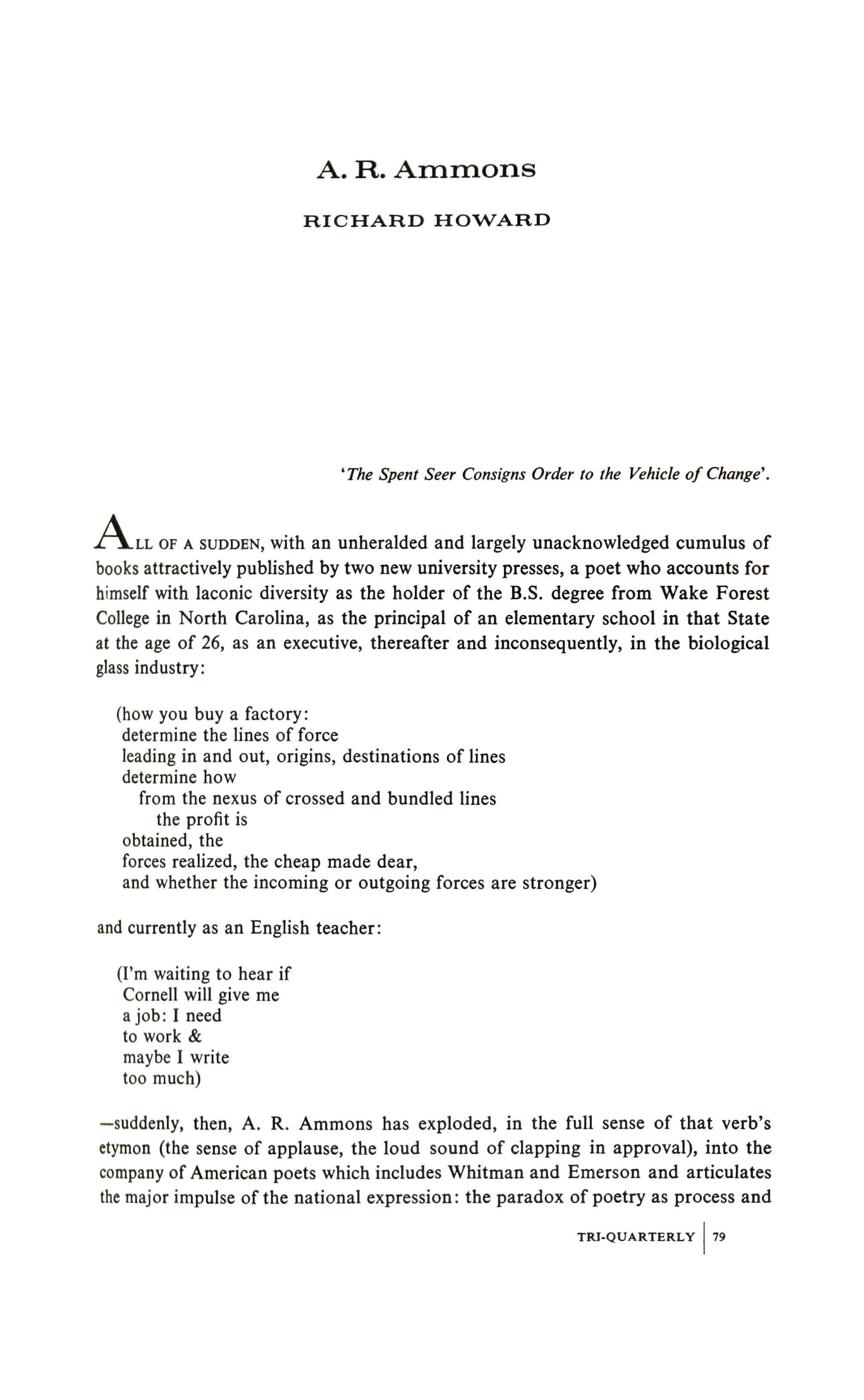
'The
Spent Seer Consigns Order to the Vehicle of Change'.
LL OF A SUDDEN, with an unheralded and largely unacknowledged cumulus of books attractively published by two new university presses, a poet who accounts for himself with laconic diversity as the holder of the B.S. degree from Wake Forest College in North Carolina, as the principal of an elementary school in that State at the age of 26, as an executive, thereafter and inconsequently, in the biological glass industry:
(how you buy a factory: determine the lines of force leading in and out, origins, destinations of lines determine how from the nexus of crossed and bundled lines the profit is obtained, the forces realized, the cheap made dear, and whether the incoming or outgoing forces are stronger) and currently as an English teacher:
(I'm waiting to hear if Cornell will give me a job: I need to work & maybe I write too much)
=suddenly, then, A. R. Ammons has exploded, in the full sense of that verb's etymon (the sense of applause, the loud sound of clapping in approval), into the company of American poets which includes Whitman and Emerson and articulates the major impulse of the national expression: the paradox of poetry as process and
TRJ-QUARTERLY 79
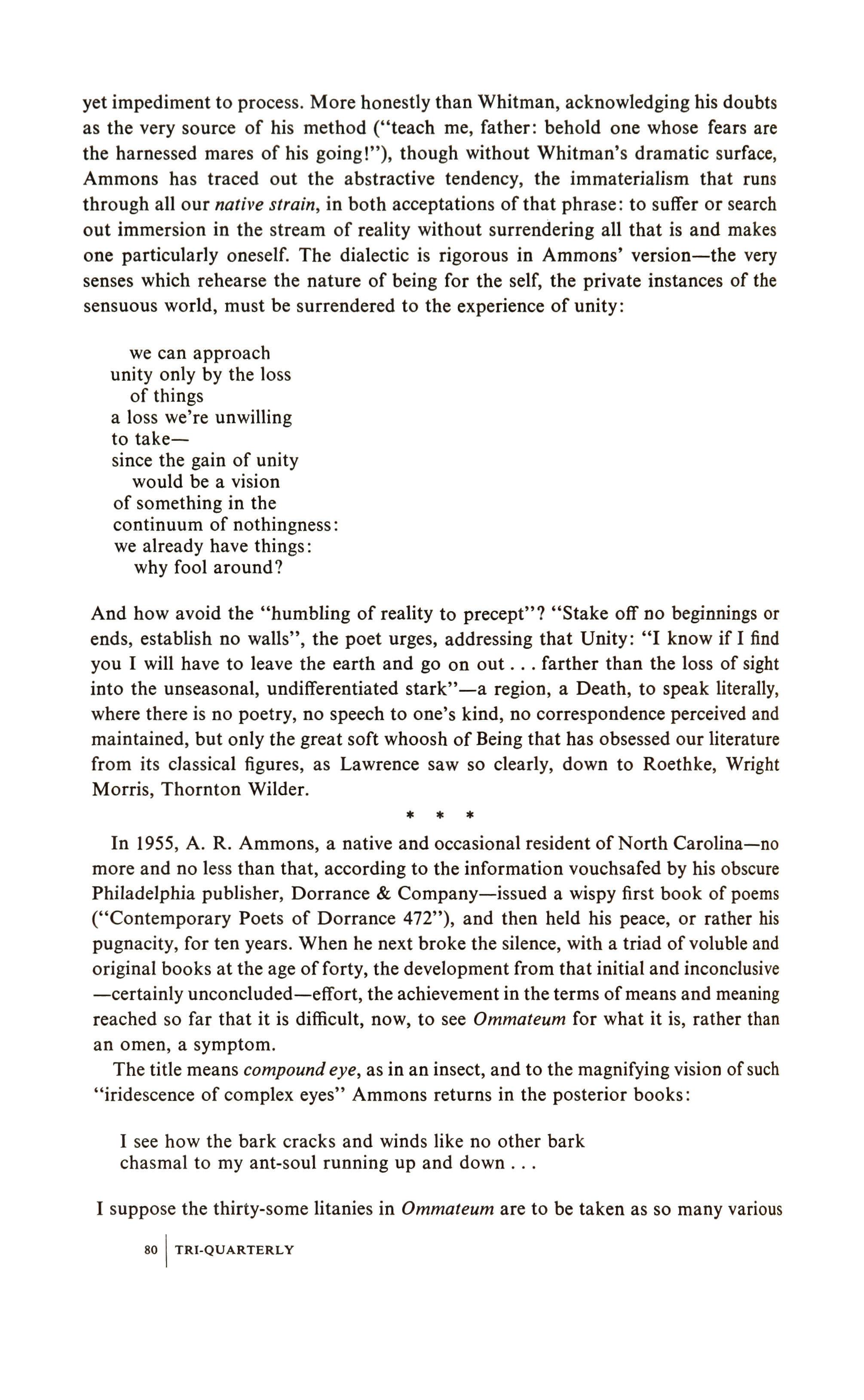
yet impediment to process. More honestly than Whitman, acknowledging his doubts as the very source of his method ("teach me, father: behold one whose fears are the harnessed mares of his going!"), though without Whitman's dramatic surface, Ammons has traced out the abstractive tendency, the immaterialism that runs through all our native strain, in both acceptations of that phrase: to suffer or search out immersion in the stream of reality without surrendering all that is and makes one particularly oneself. The dialectic is rigorous in Ammons' version the very senses which rehearse the nature of being for the self, the private instances of the sensuous world, must be surrendered to the experience of unity:
we can approach unity only by the loss of things a loss we're unwilling to takesince the gain of unity would be a vision of something in the continuum of nothingness: we already have things: why fool around?
And how avoid the "humbling of reality to precept"? "Stake off no beginnings or ends, establish no walls", the poet urges, addressing that Unity: "I know if I find you I will have to leave the earth and go on out farther than the loss of sight into the unseasonal, undifferentiated stark" a region, a Death, to speak literally, where there is no poetry, no speech to one's kind, no correspondence perceived and maintained, but only the great soft whoosh of Being that has obsessed our literature from its classical figures, as Lawrence saw so clearly, down to Roethke, Wright Morris, Thornton Wilder.
In 1955, A. R. Ammons, a native and occasional resident of North Carolina no more and no less than that, according to the information vouchsafed by his obscure Philadelphia publisher, Dorrance & Company issued a wispy first book of poems ("Contemporary Poets of Dorrance 472"), and then held his peace, or rather his pugnacity, for ten years. When he next broke the silence, with a triad of voluble and original books at the age of forty, the development from that initial and inconclusive -certainly unconcluded effort, the achievement in the terms of means and meaning reached so far that it is difficult, now, to see Ommateum for what it is, rather than an omen, a symptom.
The title means compound eye, as in an insect, and to the magnifying vision of such "iridescence of complex eyes" Ammons returns in the posterior books:
I see how the bark cracks and winds like no other bark chasmal to my ant-soul running up and down
I suppose the thirty-some litanies in Ommateum are to be taken as so many various
80 TRI-QUARTERLY
* * *

lenses, ways of looking at landscape, history and deity which together make up one of those strange bug-eyed views wherein the world is refracted into various but adjacent fragments. The book is dedicated to Josephine Miles, the distinguished poet and teacher with whom Ammons had studied (three semesters) at the University of California, and is prefaced by an arrogant, unsigned foreword which asserts that the poems "rather grow in the reader's mind than exhaust themselves in completed, external form." It is just such exhaustion, "the coercive charm of form" as Henry James called it, which the collection lacks, for all its nicely witnessed natural movements:
and the snake shed himself in ripples across a lake of sand or again, more wittily:
The next morning 1 was dead excepting a few peripheral cells and the buzzards waiting for a savoring age to come sat over me in mournful conversations that sounded excellent to my eternal ear
and despite its many fine passages, aspirations to share yet shed a nature regarded, throughout, as a goal and equally as a prison, the pitch is insistently wordy and too shrill:
But the wind has sown loose dreams In my eyes and telling unknown tongues drawn me out beyond the land's end and rising in long parabolas of bliss borne me safely from all those ungathered stones
After many such vociferations, one wonders whose voice it is that utters these hymns to and against Earth. The sapless lines, terminated only by the criterion of conversational or rhetorical sense, cannot beat against a stiffening rhythmic constant, and we are reminded of Miss Moore's prescription, taking her words in whatever pejorative sense they may bear: "ecstasy affords the occasion, and expediency determines the form." Whose, then, is the voice that chants these prayers to the unstringing of all harps? The only aid the young poet affords is the assumption in several poems of the identity of the prophet Ezra. In his latest book too, "I Ezra" returns, "the dying portage of these deathless thoughts," and we recall that this prophet is generally regarded as responsible for the revision and editing of the earlier books of Scripture and the determination of the canon. The persona appears in Ammons' poems, I think, when he is desperate for an authoritative voice; the nature ofhis enterprise is so extreme, and the risks he is willing to take with hysterical
TRI-QUARTERLY 81
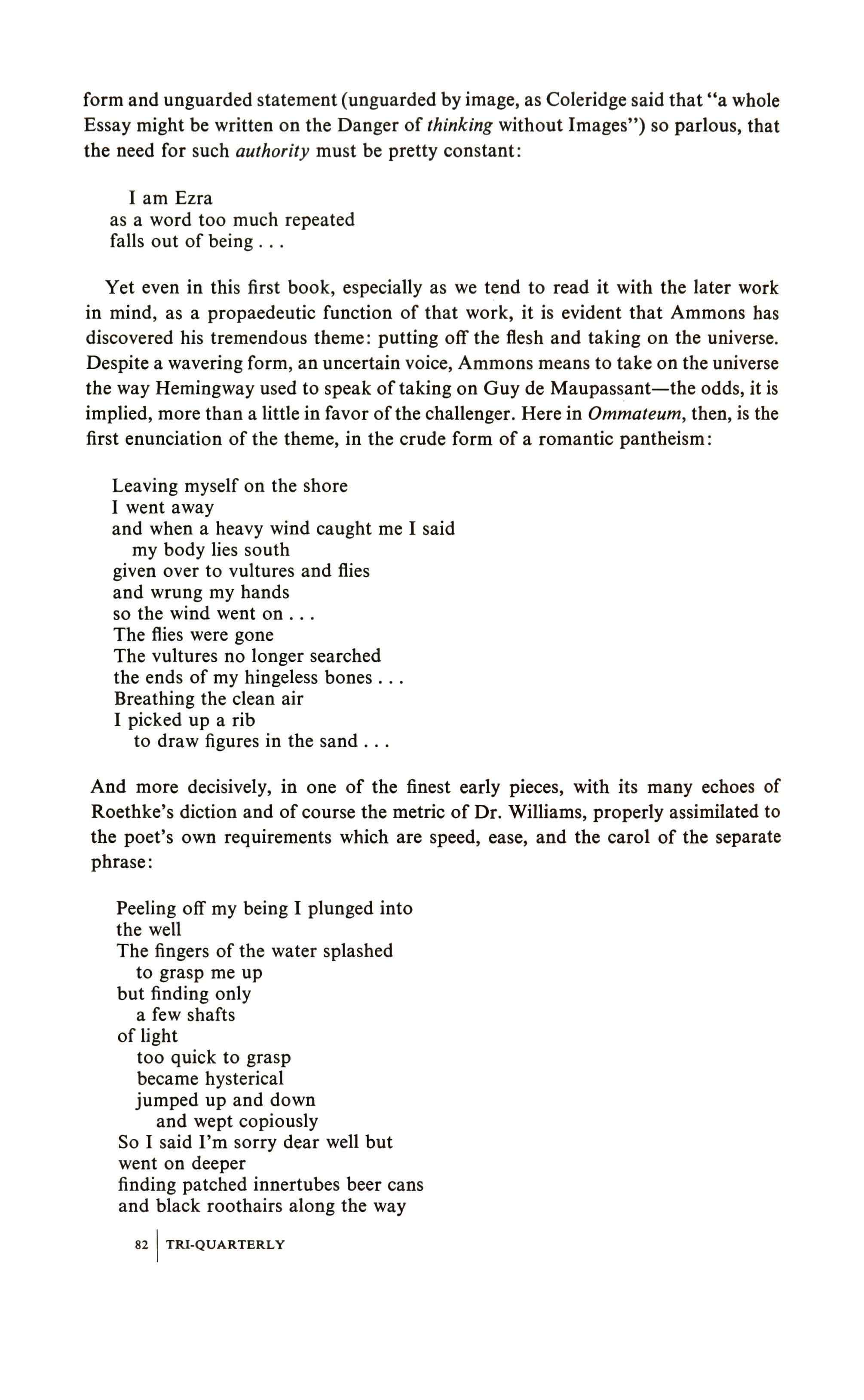
form and unguarded statement (unguarded by image, as Coleridge said that "a whole Essay might be written on the Danger of thinking without Images") so parlous, that the need for such authority must be pretty constant:
I am Ezra as a word too much repeated falls out of being
Yet even in this first book, especially as we tend to read it with the later work in mind, as a propaedeutic function of that work, it is evident that Ammons has discovered his tremendous theme: putting off the flesh and taking on the universe. Despite a wavering form, an uncertain voice, Ammons means to take on the universe the way Hemingway used to speak of taking on Guy de Maupassant the odds, it is implied, more than a little in favor of the challenger. Here in Ommateum, then, is the first enunciation of the theme, in the crude form of a romantic pantheism:
Leaving myself on the shore
I went away and when a heavy wind caught me I said my body lies south given over to vultures and flies and wrung my hands so the wind went on
The flies were gone
The vultures no longer searched the ends of my hingeless bones
Breathing the clean air
I picked up a rib to draw figures in the sand
And more decisively, in one of the finest early pieces, with its many echoes of Roethke's diction and of course the metric of Dr. Williams, properly assimilated to the poet's own requirements which are speed, ease, and the carol of the separate phrase:
Peeling off my being I plunged into the well
The fingers of the water splashed to grasp me up but finding only a few shafts of light too quick to grasp became hysterical jumped up and down and wept copiously
So I said I'm sorry dear well but went on deeper finding patched innertubes beer cans and black roothairs along the way
82 TRI-QUARTERLY
but went on deeper till darkness snuffed the shafts of light against the well's side night kissing the last bubbles from my lips.
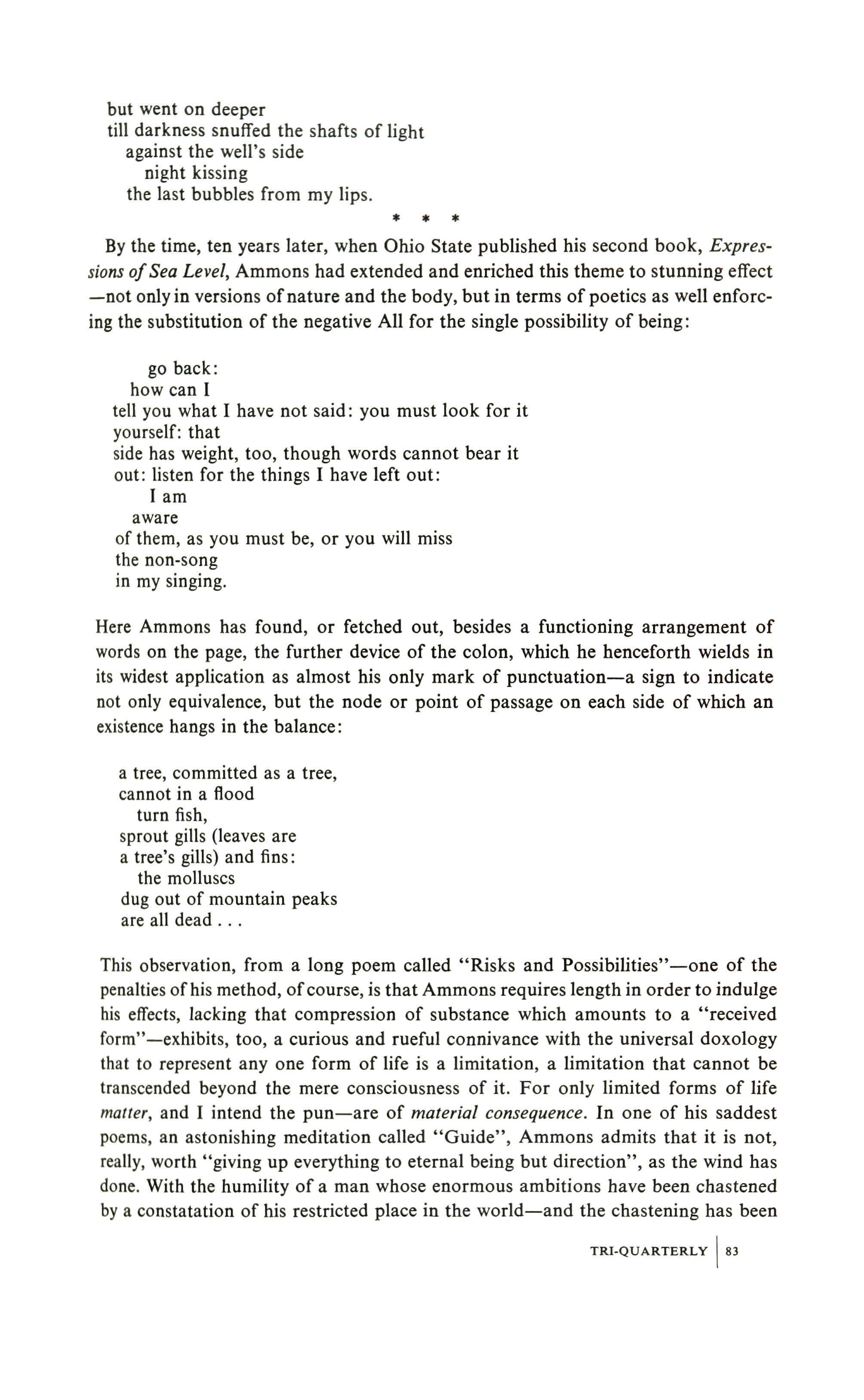
•
By the time, ten years later, when Ohio State published his second book, Expressions ofSea Level, Ammons had extended and enriched this theme to stunning effect -not onlyin versions ofnature and the body, but in terms of poetics as well enforcing the substitution of the negative All for the single possibility of being:
go back: how can I tell you what I have not said: you must look for it yourself: that side has weight, too, though words cannot bear it out: listen for the things I have left out: lam aware of them, as you must be, or you will miss the non-song In my singing.
Here Ammons has found, or fetched out, besides a functioning arrangement of words on the page, the further device of the colon, which he henceforth wields in its widest application as almost his only mark of punctuation a sign to indicate not only equivalence, but the node or point of passage on each side of which an existence hangs in the balance:
a tree, committed as a tree, cannot in a flood turn fish, sprout gills (leaves are a tree's gills) and fins: the molluscs dug out of mountain peaks are all dead
This observation, from a long poem called "Risks and Possibilities" one of the penalties ofhis method, of course, is that Ammons requires length in order to indulge his effects, lacking that compression of substance which amounts to a "received form" exhibits, too, a curious and rueful connivance with the universal doxology that to represent anyone form of life is a limitation, a limitation that cannot be transcended beyond the mere consciousness of it. For only limited forms of life matter, and I intend the pun are of material consequence. In one of his saddest poems, an astonishing meditation called "Guide", Ammons admits that it is not, really, worth "giving up everything to eternal being but direction", as the wind has done. With the humility of a man whose enormous ambitions have been chastened by a constatation of his restricted place in the world and the chastening has been
TRI-QUARTERLY 83
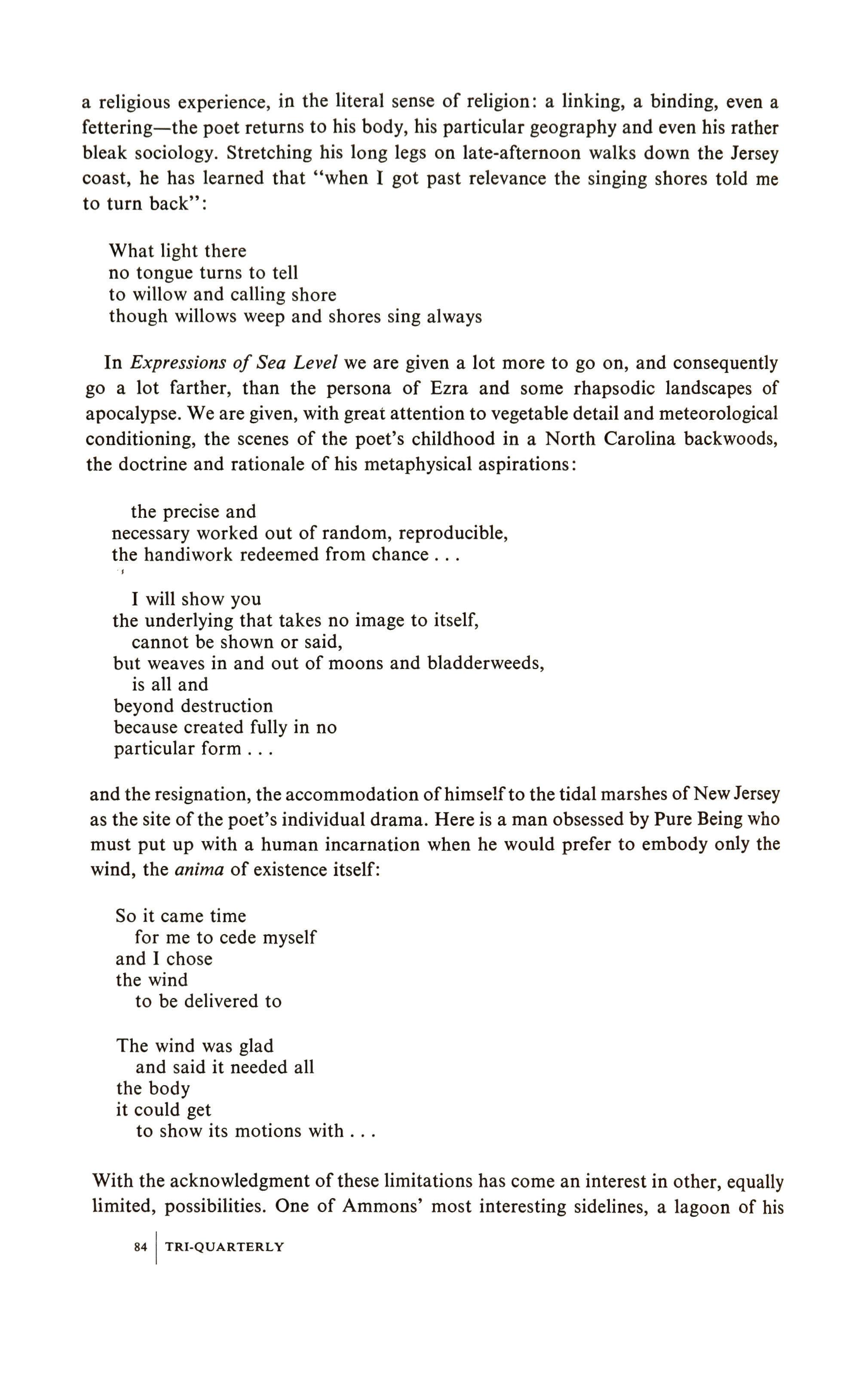
a religious experience, in the literal sense of religion: a linking, a binding, even a fettering the poet returns to his body, his particular geography and even his rather bleak sociology. Stretching his long legs on late-afternoon walks down the Jersey coast, he has learned that "when I got past relevance the singing shores told me to turn back":
What light there no tongue turns to tell to willow and calling shore though willows weep and shores sing always
In Expressions of Sea Level we are given a lot more to go on, and consequently go a lot farther, than the persona of Ezra and some rhapsodic landscapes of apocalypse. We are given, with great attention to vegetable detail and meteorological conditioning, the scenes of the poet's childhood in a North Carolina backwoods, the doctrine and rationale of his metaphysical aspirations:
the precise and necessary worked out of random, reproducible, the handiwork redeemed from chance
I will show you the underlying that takes no image to itself, cannot be shown or said, but weaves in and out of moons and bladderweeds, is all and beyond destruction because created fully in no particular form
and the resignation, the accommodation ofhimselfto the tidal marshes ofNew Jersey as the site of the poet's individual drama. Here is a man obsessed by Pure Being who must put up with a human incarnation when he would prefer to embody only the wind, the anima of existence itself:
So it came time for me to cede myself and I chose the wind to be delivered to
The wind was glad and said it needed all the body it could get to show its motions with
With the acknowledgment of these limitations has come an interest in other, equally limited, possibilities. One of Ammons' most interesting sidelines, a lagoon of his
84 TRI-QUARTERLY
main drift, is a concern with archaic cultures whose aspect often reminds us, in its amalgam of the suggestive detail and the long loose line, in its own prose music, of Perse:
Returning silence unto silence the Sumerian between the rivers lies. His skull crushed and molded into rock does not leak or peal. The gold earring lies in the powder of his silken perished lobe. The incantations, sheep trades, and night-gatherings with central leaping fires, roar and glare still in the crow's foot walking of his stylus on clay.
But not until his most recent book, Corson's Inlet, would this mode be brought into accord with the main burden of Ammon's song the made thing of his impulse. Song may seem an odd word for a verse in which I have descried the music of prose, a verse which is as near as words can get us to our behavior, no more than a fairly cautious means of putting down words so that they will keep. And though the iambic cadence, and all it implies and demands by way of traditional lilt, has been jettisoned as utterly as Dr. Williams ever decreed, there is a song in Ammons' windy lines, a care for the motion of meaning in language which is the whole justice of prosody; consider this invocation to the wind, one more of many, and perhaps the loveliest:
When the tree of my bones rises from the skin come and whirwinding stroll my dust around the plain
so I can see how the ocotillo does and how the saguaro-wren is and when you fall with evening fall with me here where we can watch the closing up of day and think how morning breaks

There is another strand of discourse in Expressions of Sea Level, whose very title gives an idea of Ammons' use of a new vocabulary, one that Kenneth Burke would call "scientistic", I guess, to mean the dramatic use of an exact nomenclature, in Ammons' case a use quite properly managed:
TRI-QUARTERLY 85
* *

An individual spider web identifies a species: an order of instinct prevails through all accidents of circumstance though the possibility is high along the peripheries of spider webs: you can go all around the fringing attachments and find disorder ripe, entropy rich, high levels of random, numerous occasions of accident
this poem concludes: if the web were perfectly pre-set the spider could never find a perfect place to set it in: and if the web were perfectly adaptable, if freedom and possibility were without limit, the web would lose its special identity
The dangers of this kind of thing, the dangers of which Coleridge spoke, were evident, of course, to the author of "River", whose mastery of natural imagery and vocalic music is exact and generous, as in this example of what Hopkins called "vowelling off":
I shall go down to the deep river, to the moonwaters where the silver willows are and the bay blossoms, to the songs of dark birds to the great wooded silence of flowing forever down the dark river silvered at the moon-singing of hidden birds.
The repetition of the short i and the variants on the sound of "river" in "forever" and "silvered" in the last two lines not to sound too much like the later Dr. Sitwell -indicate and insure a consciousness of effects that become the living twist of things we call idiom.
86 TRI-QUARTERLY

Insurance is what we shall mostly need in dealing with Ammons' next book, published like the latest one by Cornell. Mooning around the house and waiting for Expressions of Sea Level to come off the press in December of 1964, the poet produced, in a two month period, and with a determination to reach an end that became more than obsessive, became self-destructive, "a long thin poem" written on a huge roll of adding-machine tape run through the typewriter to its conclusion ("I am attracted to paper, visualize kitchen napkins scribbled with little masterpieces: so it was natural for me "). The "serious novelty" of the enterprise is unquestionable, and there are many beautiful tropes in this long Tape.for the Turn of the Year, chiefly in the form of pious assurances that the undertaking is or will be worthwhile:
let this song make complex things salient, saliences clear, so there can be some understanding
Enough to suggest that the text is not so much a poem as the ground of a poem, the dark backing of a mirror out of which all brightness may, as a condition, come. There are two moments of confrontation, when Ammons links his 200-page transcribed tape with the generality of his gift as a poet:
ecology is my word: tag me with that: come in there: you will find yourself in a firmless country: centers and peripheries In motion, organic interrelations! that's the door: here's the key: come in, celebrant, to the one meaning that totals my meanings
The other moment of address follows closely: my other word is provisional you may guess the meanings from ecology: don't establish the boundaries first and then
TRI-QUARTERLY 87

pour life into them, trimming off left-over edges, ending potential the center-arising form adapts, tests the peripheries, draws in, finds a new factor, utilizes a new method, gains a new foothold, responds to inner and outer change
This is the poet arguing himself onward. His book arrives, the Muse ("a woman in us who gives no rest") reassures him (if not us), and in acknowledgment he turns, a moment, to address us before returning to his vocation in the last, most luscious of his books so far, Corson's Inlet:
I've given you the interstices: the space between I've given you the dull days when turning and turning revealed nothing I've given you long uninteresting walks so you could experience vacancy: our journey is done: thank you for coming: the sun's bright: the wind rocks the naked trees
Published almost simultaneously with the indiscreet Tape, Corson's Inlet is Ammons' finest work, a book of poems in which doctrine has been assimilated into "one song, an overreach from which all possibilities, like filaments, depend: killing, nesting, dying, sun or cloud, figure up and become song simple, hard: removed." That is Ammons' definition of his aspiration a long way from the breezy expostulations of Ommateum and, I believe, of his achievement as well: his consciousness and his imagination have become one. Not that the poet has lost his initial impulsefor example, the close of the finest poem in that first volume, quoted earlier "night kissing / the last bubbles from my lips" finds itself enlarged and accommodated to the poet's wider utterance here, and the poem called "Libation" ends: "Now keep me virile and long at love: let submission kiss off I the asking words from my lips." There is a loyalty to a central impulse that runs through all this latest book, and if there is also a freedom to explore an eccentric impulse, as in the brilliant poem
TRI-QUARTERLY
88

"The Strait", it is a freedom granted because the divergent "filaments" have been braided back into the main cable. The poem concerns a worshipper at the pythoness' cave, questioning the ways ofreceiving the oracle, and ends with the kind of "simple, hard: removed" words that so often suggest, in this poet, the pre-Socratic impulse:
go to your fate: if you succeed, praise the god: if you fail, discover your flaw.
Yet such terrors of self-knowledge are generally, in this book, abated by the poet's more habitual reference to the design of the natural world: "for it is not so much to know the self / as to know it as it is known / by galaxy and cedar cone": as if birth had never found it and death could never end it.
*A collection of Richard Howard's essays on Contemporary Poets will be published by the Horizon Press in 1966.
TRI·QUARTERLY 89

Saliences
Consistencies rise and ride the mind down hard routes walled with no outlet and so to open a variable geography, proliferate possibility, here is this dune fest releasing, mind feeding out, gathering clusters, fields of order in disorder, where choice can make beginnings, turns, reversals, where straight line and air-hard thought can meet unarranged disorder, dissolve before the one event that creates present time in the multi-variable scope: a variable of wind among the dunes, making variables of position and direction and sound of every reed leaf and bloom, running streams of sand, winding, rising, at a depression falling out into deltas, weathering shells with blast,
A.H. AMMONS

striking hiss into clumps of grass, against bayberry leaves, lifting the spider from footing to footing hard across the dry even crust toward the surf: wind, a variable, soft wind, hard steady wind, wind shaped and kept in the bent of trees, the prevailing dipping seaward of reeds, the kept and erased sandcrab trails: wind, the variable to the gull's flight, how and where he drops the clam and the way he heads in, running to loft: wind, from the sea, high surf and cool weather; from the land, a lessened breakage and the land's heat: wind alone as a variable, as a factor in millions of events, leaves no two moments on the dunes the same: keep free to these events, bend to these changing weathers: multiple as sand, events of sense alter old dunes of mind, release new channels of flow, free materials to new forms: wind alone as a variable takes this neck of dunes out of calculation's reach:

come out of the hard routes and ruts, pour over the walls of previous assessments: turn to the open, the unexpected, to new saliences of feature.
* The reassurance is that through change continuities sinuously work. cause and effect, without alarm, gradual shadings out or in, motions that full with time do not surprise, no abrupt leap or burst: possibility, with meaningful development of circumstance:
when I went back to the dunes today, saliences, congruent to memory, spread firmingly across my sight: the narrow white path rose and dropped over grassy rises toward the sea: sheets of reeds, tasseling now near fall, filled the hollows with shapes of ponds or lakes: bayberry, darker, made wandering chains of clumps, sometimes pouring into heads, like stopped water: much seemed constant, to be looked forward to, expected: from the top of a dune rise, look of ocean salience: in the hollow,

where a runlet makes in at full tide and fills a bowl, extravagance of pink periwinkle along the grassy edge, and a blue, bunchy weed, deep blue, deep into the mind the dark blue constant: minnows left high in the tide-deserted pocket, fiddler crabs bringing up gray pellets of drying sand, disappearing from air's faster events at any close approach: certain things and habits recognizable as having lasted through the night: though what change in a day's doing! desertions of swallows that yesterday ravaged air, bush, reed, attention in gatherings wide as this neck of dunes: now, not a sound or shadow, no trace of memory, no remnant explanation: summations of permanence! where not a single single thing endures, the overall reassures, deaths and flights, shifts and sudden assaults claiming limited orders, the separate particles: earth brings to grief much in an hour that sang, leaped, swirled, yet keeps a round quiet turning, beyond loss or gain, beyond concern for the separate reach.
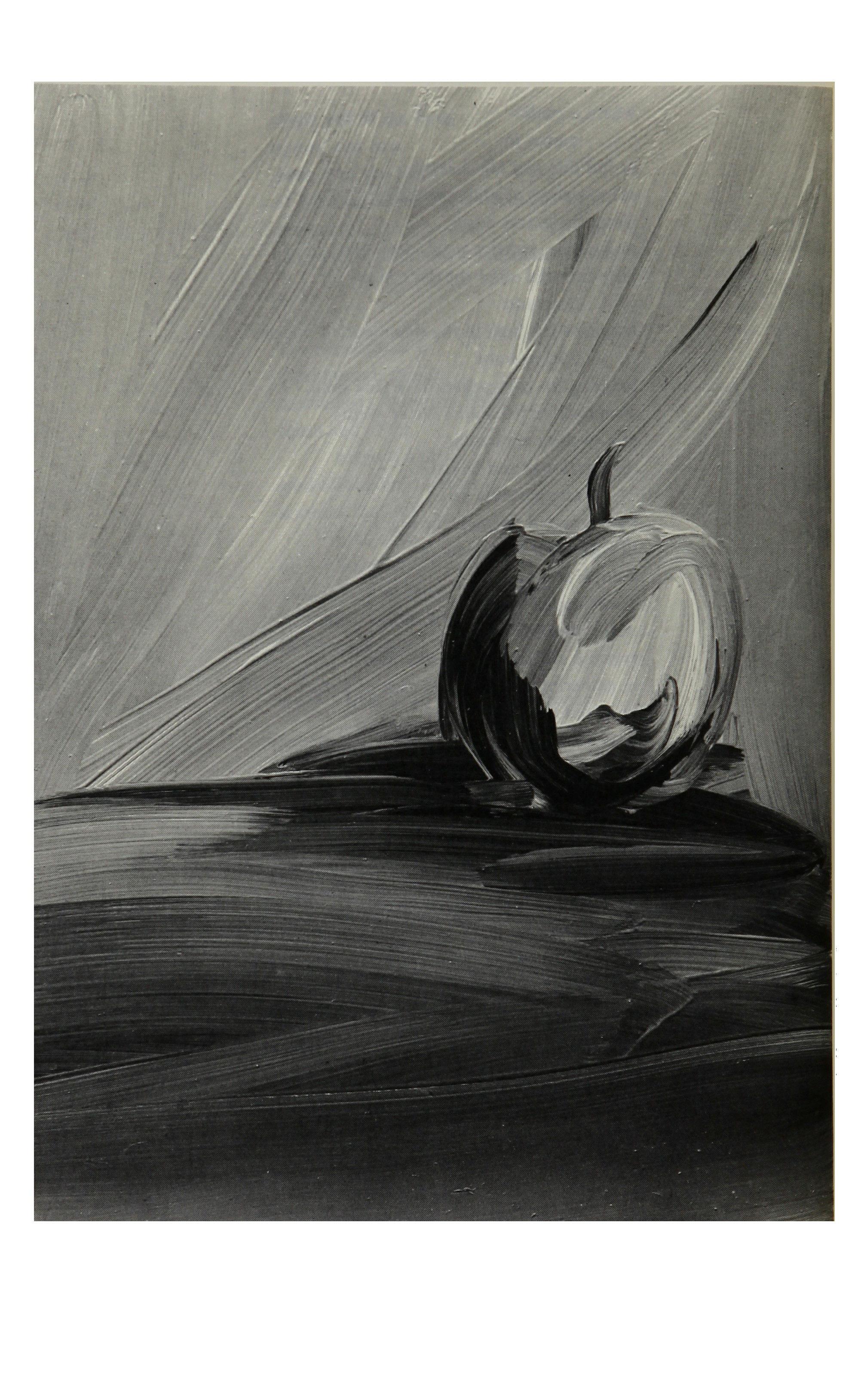
Byzantios
EUGENE IONESCO
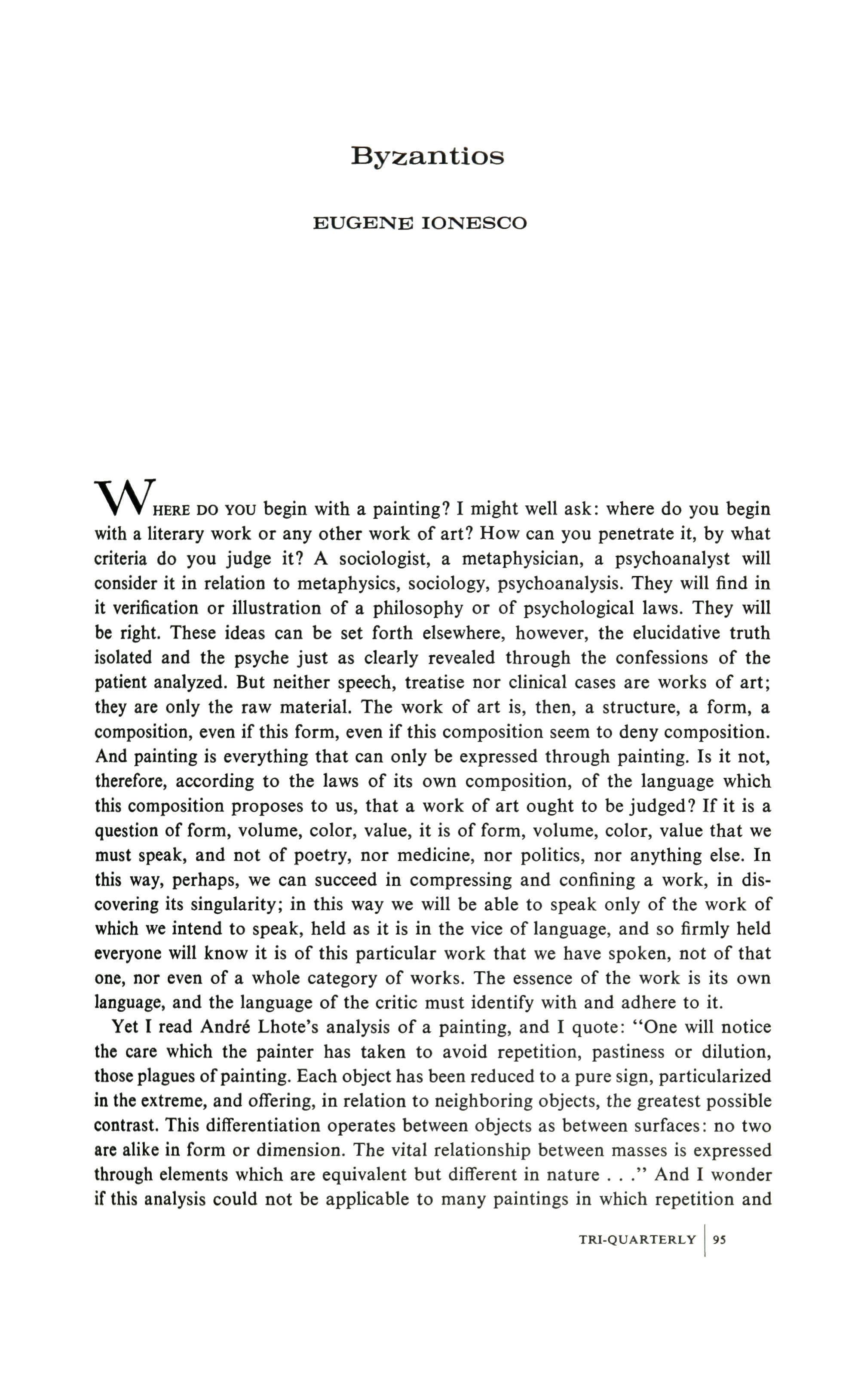
HERE DO YOU begin with a painting? I might well ask: where do you begin with a literary work or any other work of art? How can you penetrate it, by what criteria do you judge it? A sociologist, a metaphysician, a psychoanalyst will consider it in relation to metaphysics, sociology, psychoanalysis. They will find in it verification or illustration of a philosophy or of psychological laws. They will be right. These ideas can be set forth elsewhere, however, the elucidative truth isolated and the psyche just as clearly revealed through the confessions of the patient analyzed. But neither speech, treatise nor clinical cases are works of art; they are only the raw material. The work of art is, then, a structure, a form, a composition, even if this form, even if this composition seem to deny composition. And painting is everything that can only be expressed through painting. Is it not, therefore, according to the laws of its own composition, of the language which this composition proposes to us, that a work of art ought to be judged? If it is a question of form, volume, color, value, it is of form, volume, color, value that we must speak, and not of poetry, nor medicine, nor politics, nor anything else. In this way, perhaps, we can succeed in compressing and confining a work, in discovering its singularity; in this way we will be able to speak only of the work of which we intend to speak, held as it is in the vice of language, and so firmly held everyone will know it is of this particular work that we have spoken, not of that one, nor even of a whole category of works. The essence of the work is its own language, and the language of the critic must identify with and adhere to it.
Yet I read Andre Lhote's analysis of a painting, and I quote: "One will notice the care which the painter has taken to avoid repetition, pastiness or dilution, those plagues ofpainting. Each object has been reduced to a pure sign, particularized in the extreme, and offering, in relation to neighboring objects, the greatest possible contrast. This differentiation operates between objects as between surfaces: no two are alike in form or dimension. The vital relationship between masses is expressed through elements which are equivalent but different in nature And I wonder if this analysis could not be applicable to many paintings in which repetition and
TRI-QUARTERLY 95

other "plagues of paintings" have been avoided, to many paintings in which the object is reduced to "a pure sign, particularized in the extreme, and offering, in relation to neighboring objects, the greatest possible contrast." I also wonder if, when Andre Lhote says of another painting, "Each element is so disposed that it constitutes with the neighboring elements a veritable composition based on a system of compensation of angles (right, obtuse, acute) or curves (more or less open or closed) and of dimensions no two of which are alike," and that "Nothing is more ordered than this apparent disorder, and nothing more unexpected upon analysis," he is not speaking of various paintings in which the composition is based on a "system of compensation of angles" and of all paintings in which "an apparent disorder" hides a secret order. One might well wonder if this is a description of a Mondrian or of a G. Van Velde. But no! Andre Lhote is talking about a Breughel and a Mantegna.
I had always felt that description was the most promising approach to an artist and his work. But Marcel Brion tells us: "His art remains close to nature, impressionistic even in those landscapes where one finds the sensation, intact and vibrant of the gentle roll of ships and sails in port." But of whom is he speaking? Of Dufy, of some impressionistic painter, of an older master? Not at all. He is speaking of Manessier! When Marcel Brion says further: "The night of the Epiphany is a legend peopled with elves and unicorns where wanders the procession of the Kings with a fairytale atmosphere, a sort of suggestion of lavish orientalism ." it is not of Delacroix, nor of some Renaissance painter, nor of a surrealistic painter that he speaks, but once again of Manessier.
When you read Etienne Souriau or Gaston Bachelard, who speak of works of art which illustrate their theories, the theory usually holds up very well, although other examples could be substituted for the examples which they give us, and although the same flamboiement is the self-same problem of light which is resolved in equivalent relationships. It is always this light born of black, this same nothingness, at once menacing and fertile, from which creation emerges, creation appearing as a hole in nothingness (one could also say, certainly, that nothingness seems to us a hole in being).
A work of art is a major work to the extent that, through the subjectivity of the artist one discovers, stripped bare, his (the artist's) profound vision, but also an objectivity, a truth which seems unarguable and evident. A work is of the second order when, whatever effort the artist has made to uncover realities, he has merely been able to express a shallow SUbjectivity, a "realism" which, whatever its nature, is exterior and conventional as well as insincere as must be any realism. Reality is beyond realisms. Realism which is a convention can only express particular examples of contingencies for which other examples might be substituted, and it is not revelatory.
Byzantios, through signs, reveals himself essentially, he reveals his world, his world is our own, we recognize it; it is a world in holiday dress, powerful and tragic, that assembles itself before us. Thus, the diversity of the world seems contained and meaningful in the flame of spectacular forms. Byzantios coaxes motion. He integrates it dynamically, gives it order without negating it. In this
96
TRI-QUARTERLY
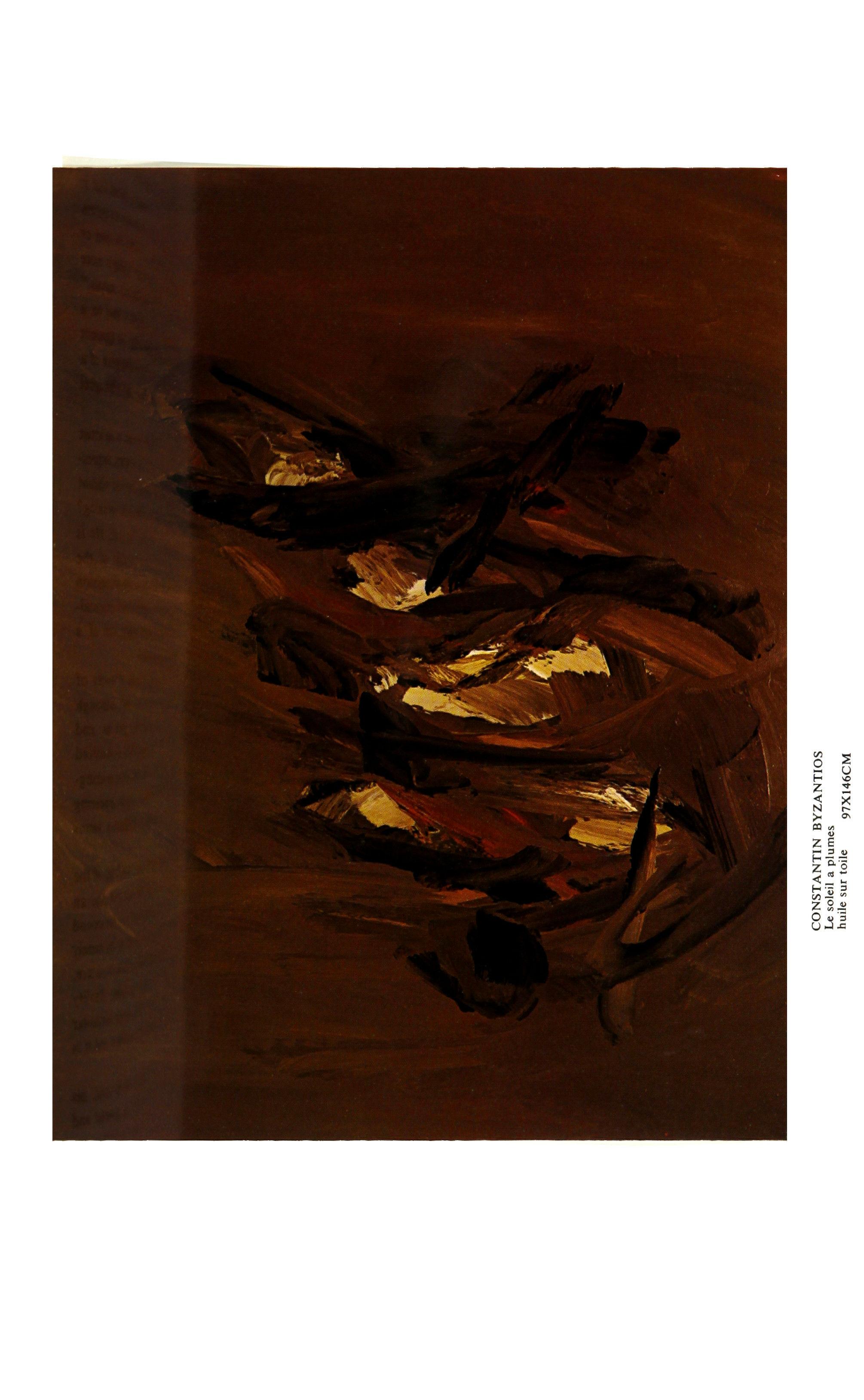
oI-< Z < N >ill ZE� r-' 0..Z",.s <_'-< I-<'_ CII�VJ ZO" o u..':l,g -
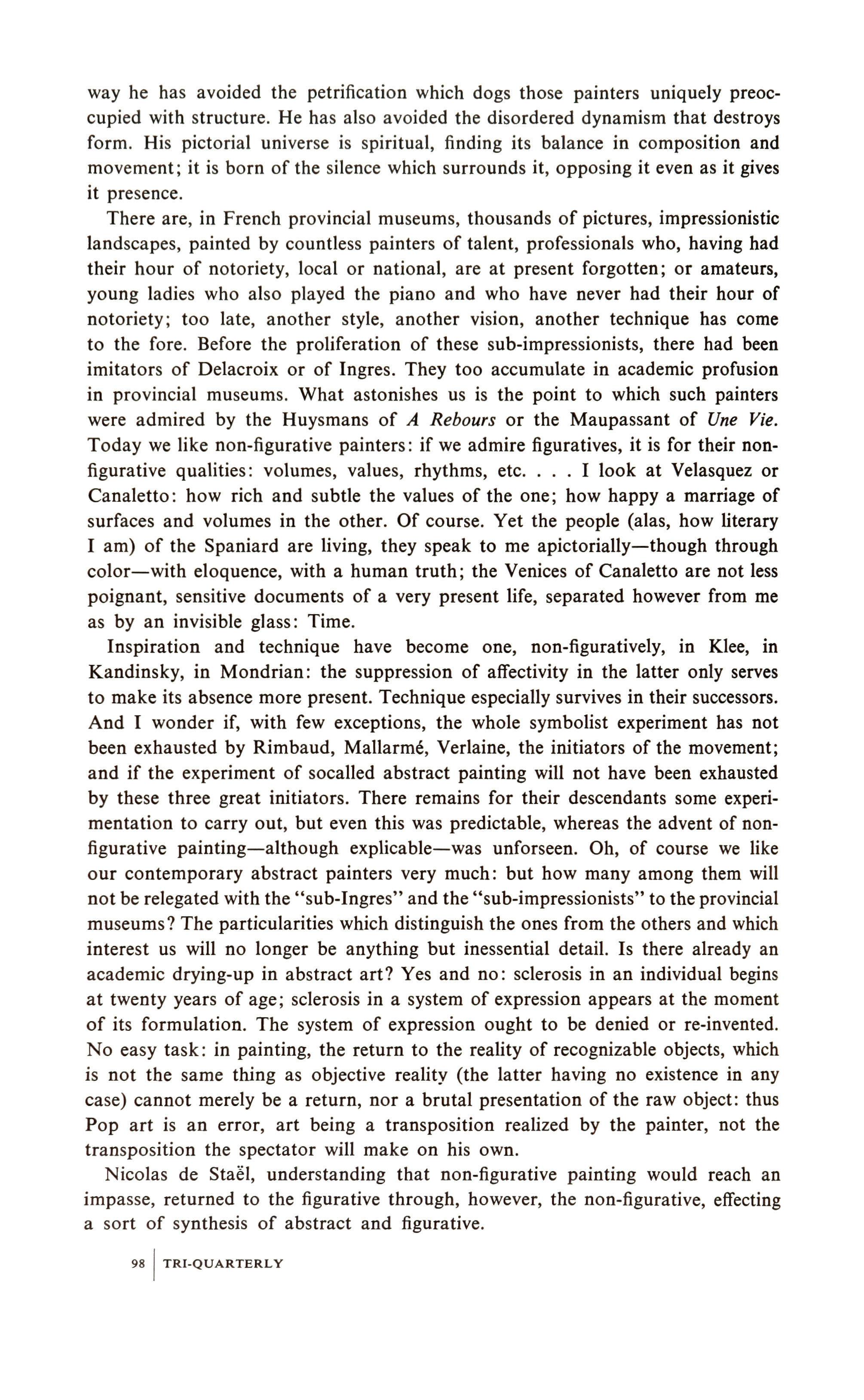
way he has avoided the petrification which dogs those painters uniquely preoccupied with structure. He has also avoided the disordered dynamism that destroys form. His pictorial universe is spiritual, finding its balance in composition and movement; it is born of the silence which surrounds it, opposing it even as it gives It presence.
There are, in French provincial museums, thousands of pictures, impressionistic landscapes, painted by countless painters of talent, professionals who, having had their hour of notoriety, local or national, are at present forgotten; or amateurs, young ladies who also played the piano and who have never had their hour of notoriety; too late, another style, another vision, another technique has come to the fore. Before the proliferation of these sub-impressionists, there had been imitators of Delacroix or of Ingres. They too accumulate in academic profusion in provincial museums. What astonishes us is the point to which such painters were admired by the Huysmans of A Rebours or the Maupassant of Une Vie. Today we like non-figurative painters: if we admire figuratives, it is for their nonfigurative qualities: volumes, values, rhythms, etc I look at Velasquez or Canaletto: how rich and subtle the values of the one; how happy a marriage of surfaces and volumes in the other. Of course. Yet the people (alas, how literary I am) of the Spaniard are living, they speak to me apictorially though through color with eloquence, with a human truth; the Venices of Canaletto are not less poignant, sensitive documents of a very present life, separated however from me as by an invisible glass: Time.
Inspiration and technique have become one, non-figuratively, in Klee, in Kandinsky, in Mondrian: the suppression of affectivity in the latter only serves to make its absence more present. Technique especially survives in their successors. And I wonder if, with few exceptions, the whole symbolist experiment has not been exhausted by Rimbaud, Mallarrne, Verlaine, the initiators of the movement; and if the experiment of socalled abstract painting will not have been exhausted by these three great initiators. There remains for their descendants some experimentation to carry out, but even this was predictable, whereas the advent of nonfigurative painting although explicable was unforseen. Oh, of course we like our contemporary abstract painters very much: but how many among them will not be relegated with the "sub-Ingres' and the "sub-impressionists" to the provincial museums? The particularities which distinguish the ones from the others and which interest us will no longer be anything but inessential detail. Is there already an academic drying-up in abstract art? Yes and no: sclerosis in an individual begins at twenty years of age; sclerosis in a system of expression appears at the moment of its formulation. The system of expression ought to be denied or re-invented. No easy task: in painting, the return to the reality of recognizable objects, which is not the same thing as objective reality (the latter having no existence in any case) cannot merely be a return, nor a brutal presentation of the raw object: thus Pop art is an error, art being a transposition realized by the painter, not the transposition the spectator will make on his own.
Nicolas de Stael, understanding that non-figurative painting would reach an impasse, returned to the figurative through, however, the non-figurative, effecting a sort of synthesis of abstract and figurative.
98 TRI·QUARTERLY
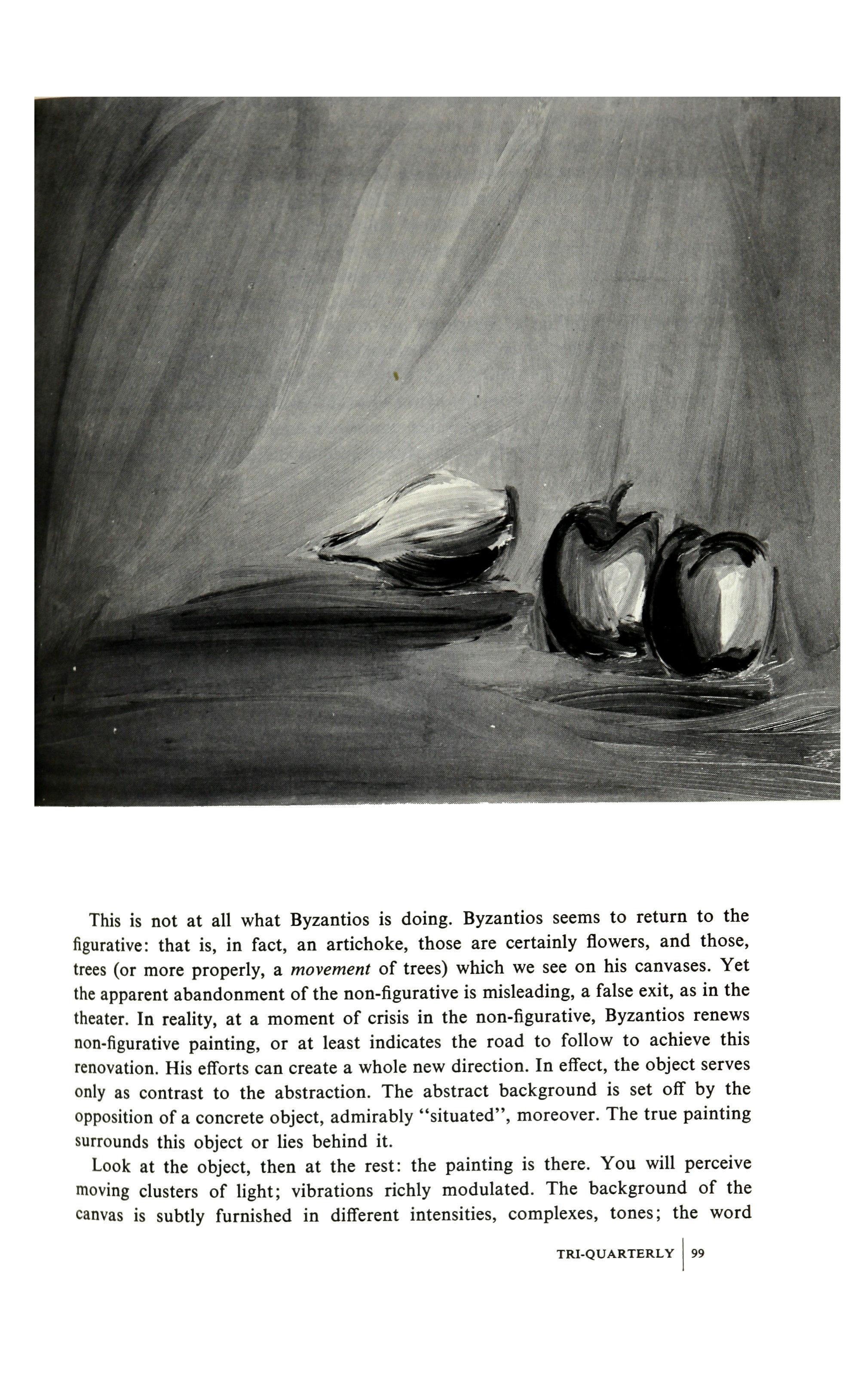
This is not at all what Byzantios is doing. Byzantios seems to return to the figurative: that is, in fact, an artichoke, those are certainly flowers, and those, trees (or more properly, a movement of trees) which we see on his canvases. Yet the apparent abandonment of the non-figurative is misleading, a false exit, as in the theater. In reality, at a moment of crisis in the non-figurative, Byzantios renews non-figurative painting, or at least indicates the road to follow to achieve this renovation. His efforts can create a whole new direction. In effect, the object serves only as contrast to the abstraction. The abstract background is set off by the opposition of a concrete object, admirably "situated", moreover. The true painting surrounds this object or lies behind it.
Look at the object, then at the rest: the painting is there. You will perceive moving clusters of light; vibrations richly modulated. The background of the canvas is subtly furnished in different intensities, complexes, tones; the word TRI-QUARTERLY 99
"furnished" (meuble') is perhaps misleading, for everything is in motion, or "meuble" in the sense of mobility. * All is movement vibrant cross-currents which merge, clash or unite in their brilliant courses. The non-figurative diversity of movement is made sensible, thanks to the presence of the object, which itself takes on the value of an event installed in the abstract. The problems of light which preoccupied Byzantios, abstract painter, are rendered more explicit by the introduction of this object. The object permits, by the oppositions it engenders, by the support it offers, a play of variations (making the non-figurative stand out from the figuration): it permits a new dimension in painting, a fourth, apparently.
In the earlier paintings of Byzantios one could already detect in the centera certain concentration of luminous directions, a sort of solidification or condensation of light: now, the object born of these luminous intensities, giving birth in turn to them, separates from the light and at the same time becomes one with it in a creative opposition of astonishing pictorial events.
I believe in the course Byzantios has chosen because it is simple. Someone should have thought of it.
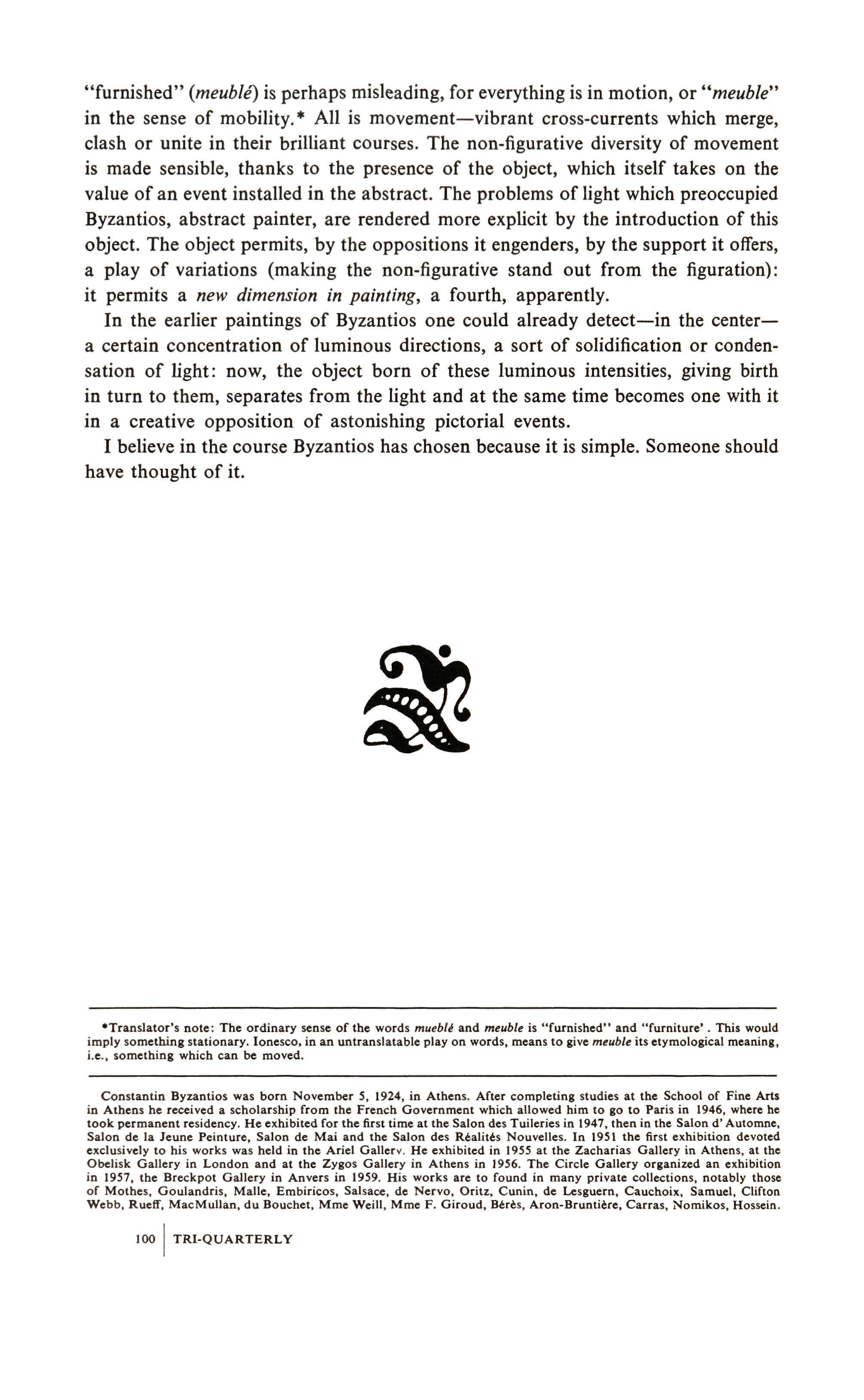
·Translator's note: The ordinary sense of the words mueble and meuble is "furnished" and "furniture' This would imply something stationary. Ionesco, in an untranslatable play on words, means to give meuble its etymological meaning, i.e., something which can be moved.
Constantin Byzantios was born November 5, 1924, in Athens. After completing studies at the School of Fine Arts in Athens he received a scholarship from the French Government which allowed him to go to Paris in 1946, where he took permanent residency. He exhibited for the first time at the Salon des Tuileries in 1947, then in the Salon d' Automne, Salon de la Jeune Peinture, Salon de Mai and the Salon des Realites Nouvelles. In 1951 the first exhibition devoted exclusively to his works was held in the Ariel Gallery. He exhibited in 1955 at the Zacharias Gallery in Athens, at the Obelisk Gallery in London and at the Zygos Gallery in Athens in 1956. The Circle Gallery organized an exhibition in 1957, the Breckpot Gallery in Anvers in 1959. His works are to found in many private collections, notably those of Mothes, Goulandris, Malle, Embiricos, Salsace, de Nervo, Oritz, Cunin, de Lesguern, Cauchoix, Samuel, Clifton Webb, Rueff, MacMullan, du Bouchet, Mme Weill, Mme F. Giroud, Beres, Aron-Bruntiere, Carras, Nomikos, Hossein.
100 TRI-QUARTERLY
GERARD MALANGA

A date In tunis
Behind the signpost, the Sahara. The model's for browning, not burning, I Wearing a Patrick de Barentzen sunsuit, Black jersey with long legs, Dolman sleeves, plunging V-neckline Arrested by two yellow bows.
Over on the right, supported by An 800-year-old tree, A wandering model In hand-knitted Jaeger cardigan
Over white silk sheath With draw-string neckline
Evenings
Will be stirred by a desert breeze, A Belinda-printed chiffon evening dress With straight front and plunging V-back
Flowing into widely tiered frills.
Rising from the rushes, A rose-pink Helanca swimsuit
Clingy and all unpadded, Worn with matching
Printed overblouse tied loose
At the neck and sleeves.
KLAUS RIFBJERG
translated by Jens NyholIn
Kindergarten
The difficult burden of togetherness is put in our coddled mitten-hands. Here we walk we small fry the world's ever stumbling army of pixies behind the teacher's bumping bottom.
Divine hand candy hand yours, Lone, in mine never will the sponge of oblivion wash off the memory of the happy snot that swung from your nose rhythmically with each breath like the swing under a skillful Swiss clock.
Poet of the past we can't imagine you walked weeping on these suburban lanes our sorrow is not the soul's our knot not the Gordian but that of the shoe lace it comes undone by itself and we are unable to tie.

And darkness falls a box on the ear in one instant extinguishes the day its metallic bat-wing crosses the face neatly Montessori system slow daybreak and high up hovering this face with glasses over the nose like a daddy-long-legs. The pedagogic smile.
Institutional porridge bought in the corner wallpaper store lands in our trembling throats like dead jelly fish. Afterward healthy sleep on hard beds with our sneakers on we sleep at command.
The kindergarten puts its stamp on me for one week.
Fetus
Most joyous way of experiencing Mount Hood! Like a night owl
I sit with warm eyes in the dark. I fetus-fish a little rubber man with gills under mother's heart. We are hiking in Oregon. Ah, Portland sensed through a navel!
Shaking with laughter I put my feet hard against the membrane of the womb. How comical the ladies on the road cloches bell-sheep 1931.
The depression doesn't enter my snug cove where I'm a stickleback among the garlands of intestines.
The thought of all the eiderdowns I shall enjoy in times to come sprouts in the cradle of the womb life's first overstuffed bike.
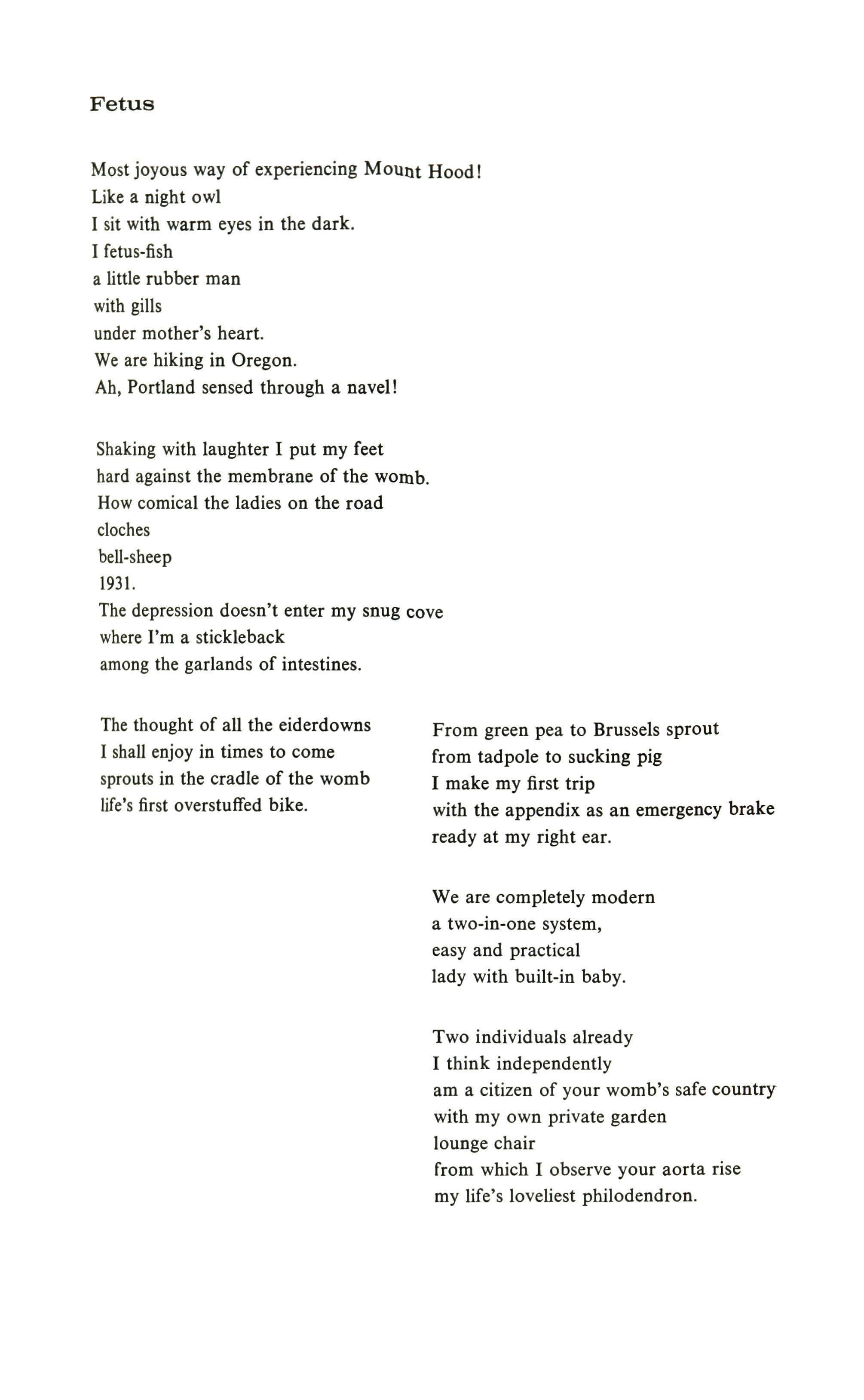
From green pea to Brussels sprout from tadpole to sucking pig I make my first trip with the appendix as an emergency brake ready at my right ear.
We are completely modern a two-in-one system, easy and practical lady with built-in baby.
Two individuals already I think independently am a citizen of your womb's safe country with my own private garden lounge chair from which I observe your aorta rise my life's loveliest philodendron.
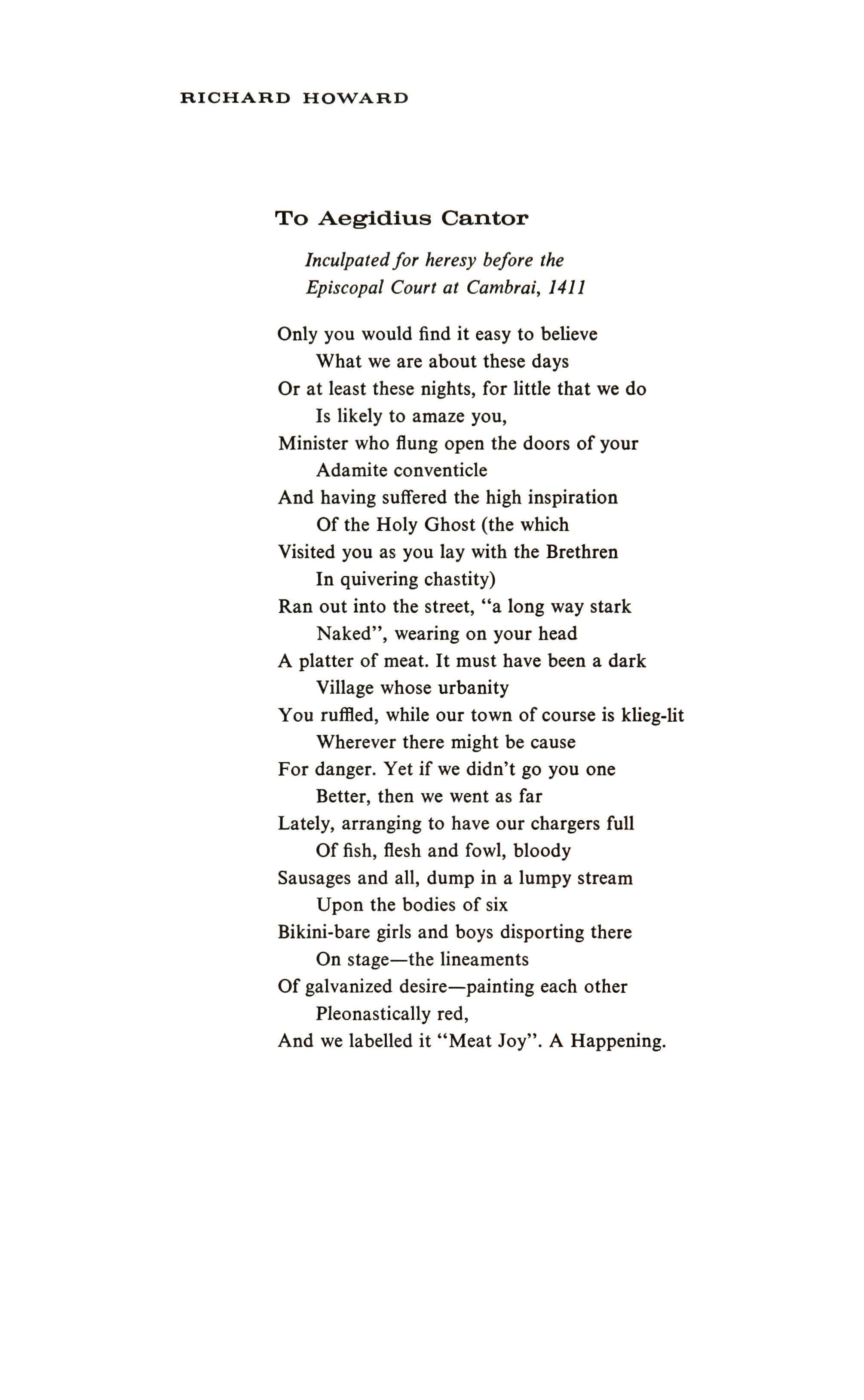
To Aegidius Cantor
Inculpatedfor heresy before the Episcopal Court at Cambrai, 1411
Only you would find it easy to believe What we are about these days
Or at least these nights, for little that we do Is likely to amaze you, Minister who flung open the doors of your Adamite conventicle
And having suffered the high inspiration Of the Holy Ghost (the which Visited you as you lay with the Brethren In quivering chastity)
Ran out into the street, "a long way stark Naked", wearing on your head
A platter of meat. It must have been a dark Village whose urbanity
You ruffled, while our town of course is klieg-lit Wherever there might be cause For danger. Yet if we didn't go you one Better, then we went as far Lately, arranging to have our chargers full Of fish, flesh and fowl, bloody Sausages and all, dump in a lumpy stream Upon the bodies of six Bikini-bare girls and boys disporting there On stage the lineaments Of galvanized desire painting each other Pleonastically red, And we labelled it "Meat Joy". A Happening.
RICHARD HOWARD
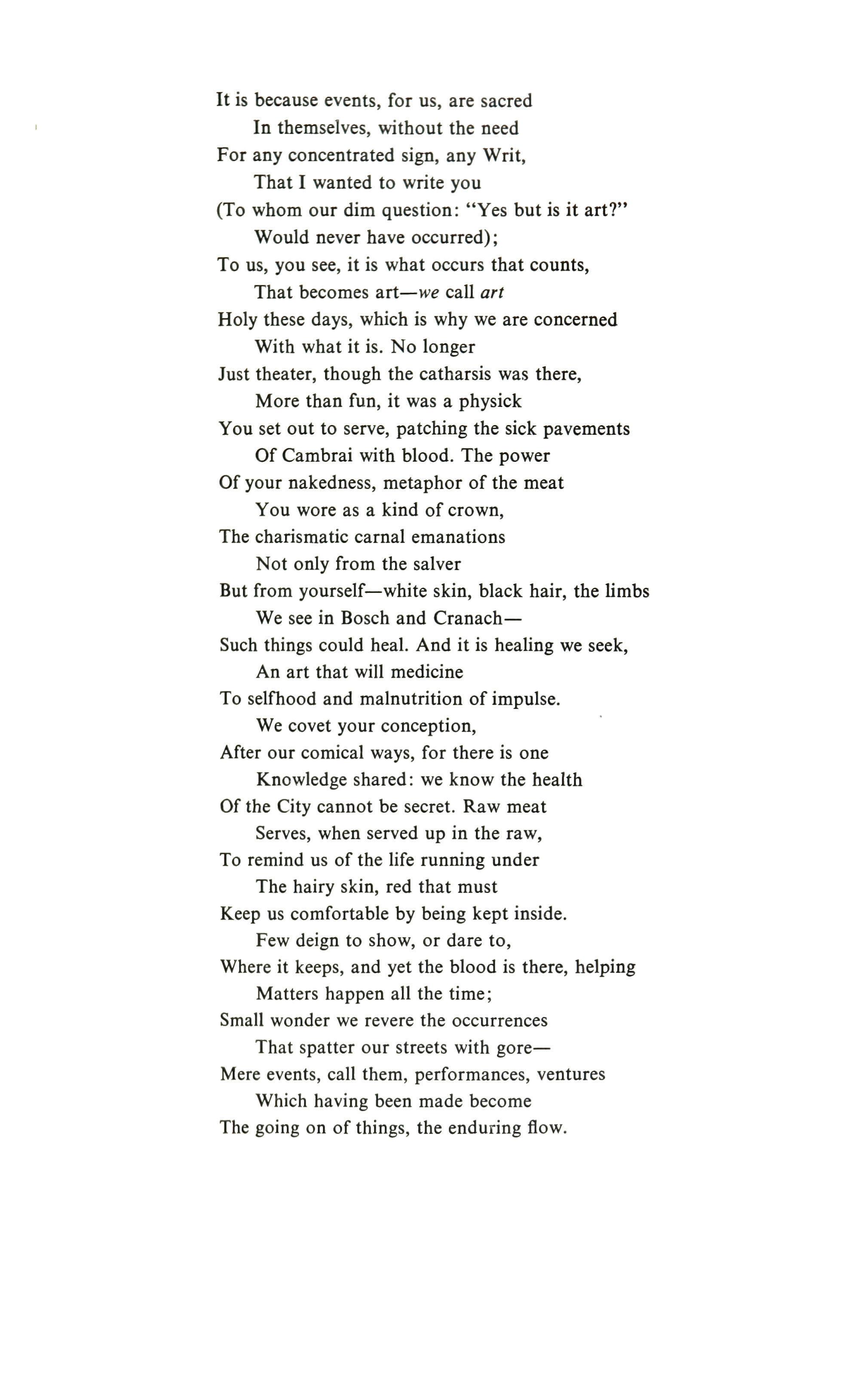
It is because events, for us, are sacred In themselves, without the need For any concentrated sign, any Writ, That I wanted to write you
(To whom our dim question: "Yes but is it art?" Would never have occurred);
To us, you see, it is what occurs that counts, That becomes art we call art Holy these days, which is why we are concerned With what it is. No longer Just theater, though the catharsis was there, More than fun, it was a physick You set out to serve, patching the sick pavements Of Cambrai with blood. The power Of your nakedness, metaphor of the meat
You wore as a kind of crown, The charismatic carnal emanations Not only from the salver But from yourself white skin, black hair, the limbs We see in Bosch and CranachSuch things could heal. And it is healing we seek, An art that will medicine To selfhood and malnutrition of impulse. We covet your conception, After our comical ways, for there is one Knowledge shared: we know the health Of the City cannot be secret. Raw meat Serves, when served up in the raw, To remind us of the life running under The hairy skin, red that must Keep us comfortable by being kept inside. Few deign to show, or dare to, Where it keeps, and yet the blood is there, helping Matters happen all the time; Small wonder we revere the occurrences That spatter our streets with goreMere events, call them, performances, ventures Which having been made become The going on of things, the enduring flow.
Take another time, to wit
One April in Paris, Dali dropped an ox, Flayed and dripping, to the stage
As emblematic climax to a ballet, Among the gasps and greasy
Legs of girls, the painted drops still running while The curtain fell, and the riot
Which followed surprised no one, of course. Silly, That sympathetic magic Must have seemed to you, but inevitable To carnivores, and meaning,
For all our burlesque, much what you had in mind: Human love resists the body It inhabits, its old enemy and friend. Cantor, I remember you
And prize your heretic episode the more Because I praise what we do:
There is a pitch past cruelty as past love
When all flesh acquires the same Queer smell. Then the order of our blood commands, Enforces a discipline
Though never a predictable one. Say It is the mess we live by, Made into a joy. The meat joy. You know. Thanks.
JU.DSON JEROME
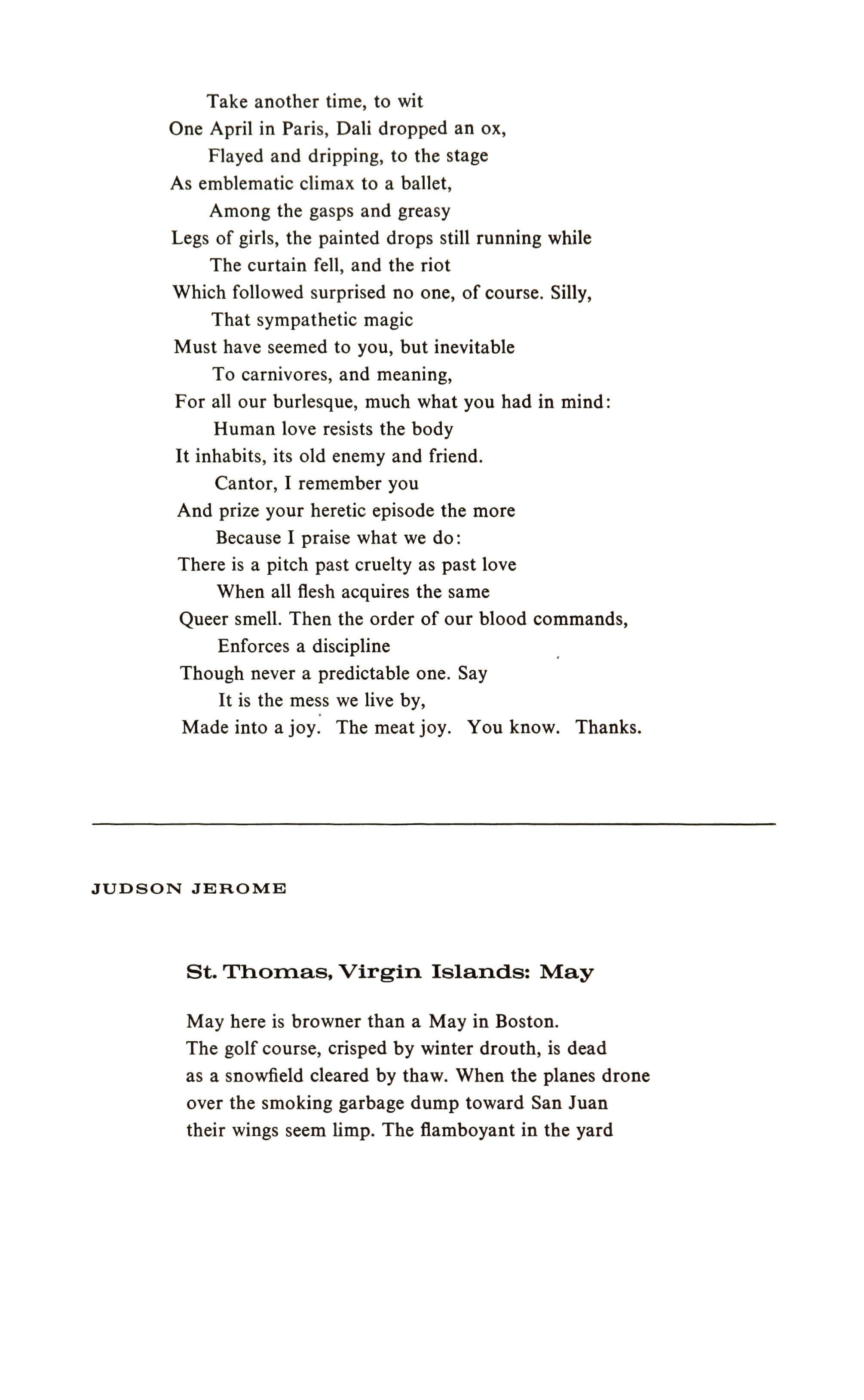
St. T'b.orruae, Virgin Islands: May
May here is browner than a May in Boston. The golf course, crisped by winter drouth, is dead as a snowfield cleared by thaw. When the planes drone over the smoking garbage dump toward San Juan their wings seem limp. The flamboyant in the yard
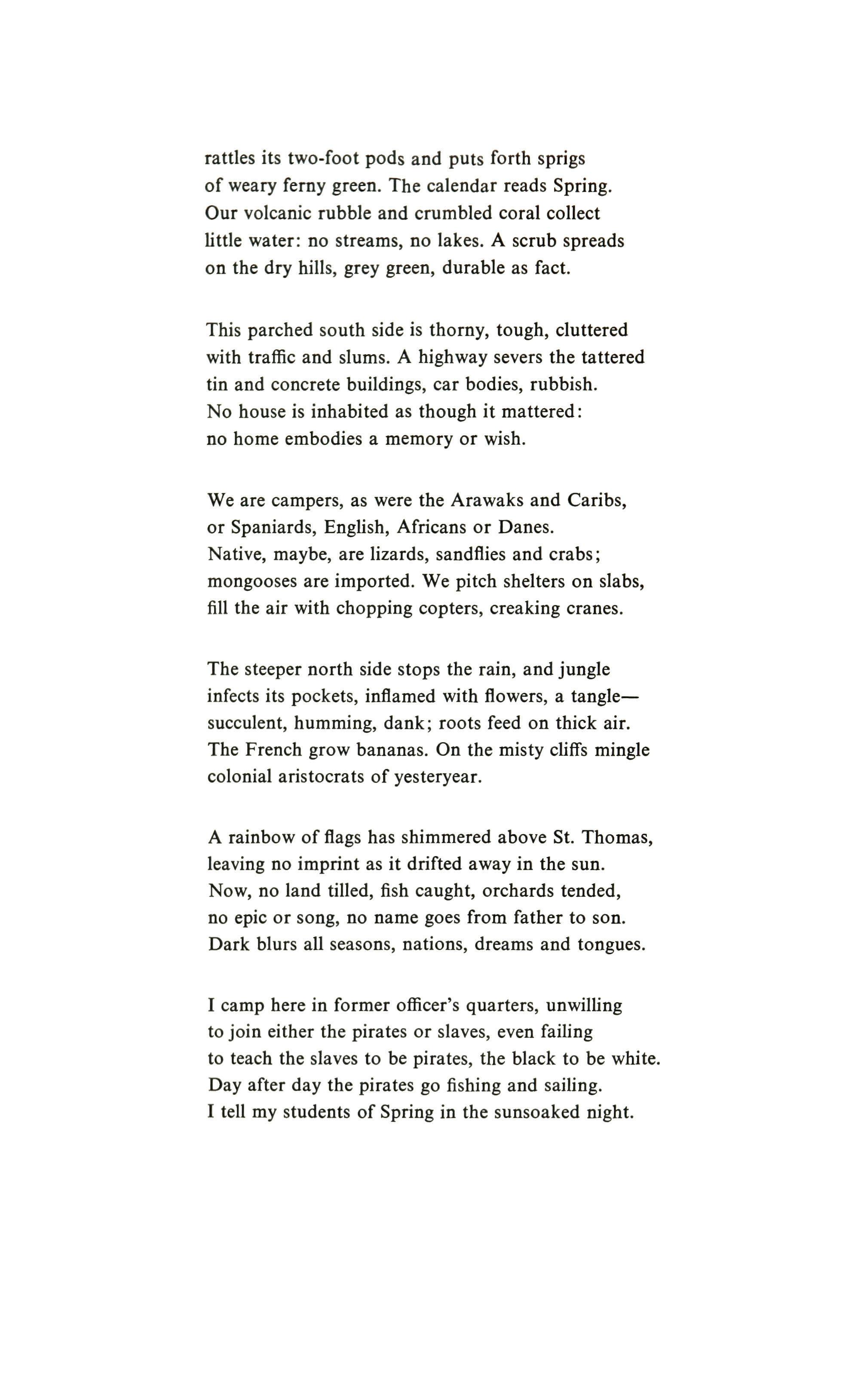
rattles its two-foot pods and puts forth sprigs of weary ferny green. The calendar reads Spring. Our volcanic rubble and crumbled coral collect little water: no streams, no lakes. A scrub spreads on the dry hills, grey green, durable as fact.
This parched south side is thorny, tough, cluttered with traffic and slums. A highway severs the tattered tin and concrete buildings, car bodies, rubbish. No house is inhabited as though it mattered: no home embodies a memory or wish.
We are campers, as were the Arawaks and Caribs, or Spaniards, English, Africans or Danes. Native, maybe, are lizards, sandflies and crabs; mongooses are imported. We pitch shelters on slabs, fill the air with chopping copters, creaking cranes.
The steeper north side stops the rain, and jungle infects its pockets, inflamed with flowers, a tanglesucculent, humming, dank; roots feed on thick air. The French grow bananas. On the misty cliffs mingle colonial aristocrats of yesteryear.
A rainbow of flags has shimmered above St. Thomas, leaving no imprint as it drifted away in the sun. Now, no land tilled, fish caught, orchards tended, no epic or song, no name goes from father to son. Dark blurs all seasons, nations, dreams and tongues.
I camp here in former officer's quarters, unwilling to join either the pirates or slaves, even failing to teach the slaves to be pirates, the black to be white. Day after day the pirates go fishing and sailing.
I tell my students of Spring in the sunsoaked night.
 Mr. John Dryden,
Mr. John Dryden,
I want to tell you that it IS yes the very predictability of your lines and your means of rules and regulations to reduce things to sterility and dryness that I love.
I don't want this to be another one of those "and everything left unsaid" poems, I just want to say that I want you to be the last thing that I wanted and lost.
RONALD TAVEL
108 TRI-QUARTERLY

ROBERT SWARD
Idyll
First mattresses, The girl collects 90 mattresses, Tables next
Chairs bedsheets bookcases
Goes up the hill on donkeys, Trail winds
As the donkey steps; On her head mattresses, Chairs bedsheets bookcases
Trail winds off the hills Rain falls Trails rise Over hills
The girl walks into air, Walks Into donkeys
The man singing, Hills walking Into donkeys
The light Like the donkeys;
Chairs bedsheets bookcases
The donkeys singing, The bedsheets singing The tables, mattresses
Each in the other's-
They walk into Donkeys, walk Into donkeys
Walk into Singing, Light.
ROBERT SWARD
The poet declares for the reader
This girl has scales and eyes and eleven noses. She makes woodcuts, 0 Of genitals and people And often human faces; and never Leaves the room. Remember that, For on the other side of the courtyard There is a young man, also scaly And he too works with knives
Reader, the cuttings are not only of her, And of his and her holy fantasies, But of you. Your truly indescribable beauty Has them, holds them prisoner. Or is it the purity of your being? And the attempt on their part To depict this of you? Whatever it is, reader, Whatever the essentials of this are, I declare myself, let me declare myselfI too pass water and judgment upon them, And the contempt they so richly deserve. Reader, 0 reader, I am with you.
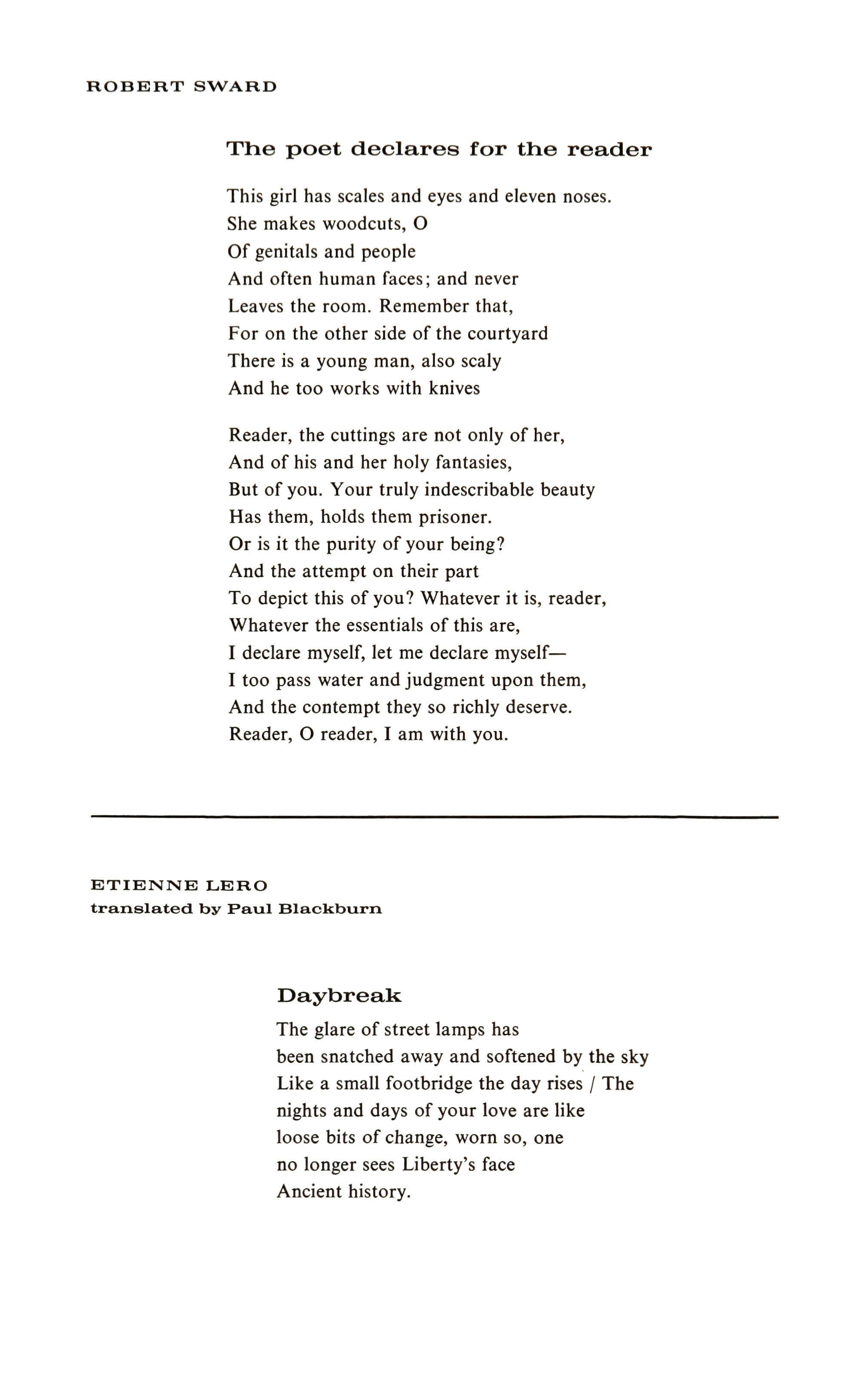 ETIENNE LERO
translated by Paul Blackburn
ETIENNE LERO
translated by Paul Blackburn
Daybreak
The glare of street lamps has been snatched away and softened by the sky Like a small footbridge the day rises / The nights and days of your love are like loose bits of change, worn so, one no longer sees Liberty's face Ancient history.
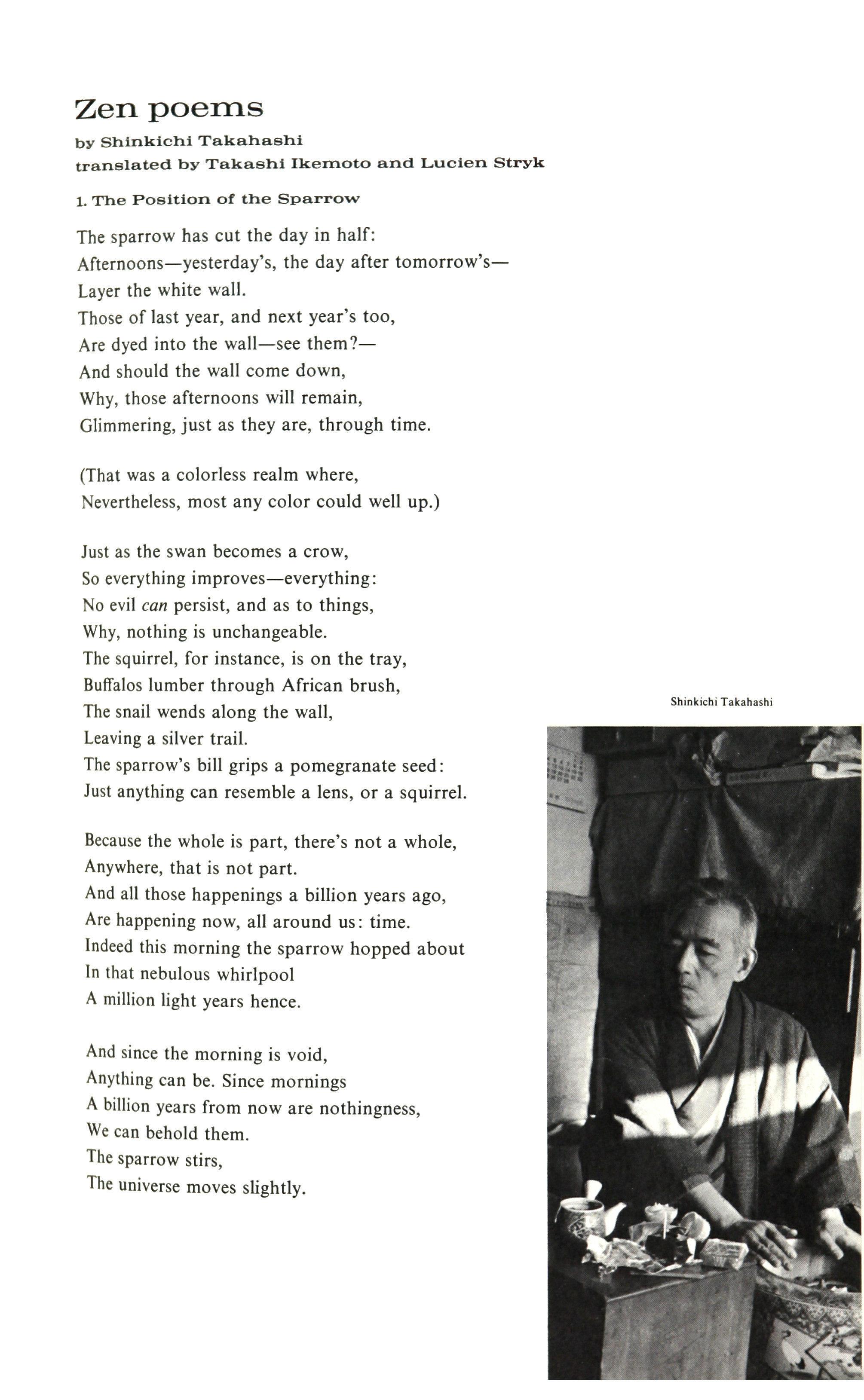
Zen poeIllS
by Shinkichi Takahashi
translated by Takashi Ikellloto and Lucien Stryk
1. The Position of the Spal"I'o'IIV
The sparrow has cut the day in half: Afternoons yesterday's, the day after tomorrow'sLayer the white wall. Those of last year, and next year's too, Are dyed into the wall see them?And should the wall come down, Why, those afternoons will remain, Glimmering, just as they are, through time.
(That was a colorless realm where, Nevertheless, most any color could well up.)
Just as the swan becomes a crow, So everything improves everything: No evil can persist, and as to things, Why, nothing is unchangeable.
The squirrel, for instance, is on the tray, Buffalos lumber through African brush, The snail wends along the wall, Leaving a silver trail.
The sparrow's bill grips a pomegranate seed: Just anything can resemble a lens, or a squirrel.
Because the whole is part, there's not a whole, Anywhere, that is not part. And all those happenings a billion years ago, Are happening now, all around US: time. Indeed this morning the sparrow hopped about In that nebulous Whirlpool A million light years hence.
And since the morning is void, Anything can be. Since mornings A billion years from now are nothingness, We can behold them.
The sparrow stirs, The universe moves slightly.
Shinkichi Takahashi

2. Deck
If time is but a stream flowing from past to future, Why, it's nothing more than sardine guts! If all is carried away by it,
Then everything is seaweed along a desolate strand! Has this stream no end at all?
Then there ought to be an unmapped sea around it.
The tide moves at its own sweet will, Yet whether it moves or not who cares?
Still, an absolutely immobile ship is by the quay: Should its anchor drop to the depths of time, We'll have had it, the harbor will dry up.
A sailor goes ashore, walking along With existence in the palm of his hand. With nothing under him, His tapering toes extend, Then like a meteor disappear.
The sailor is free to go anywhere, No deck is bigger than his hand.
3. The Cloud and the Butterfly
The idea that's just popped into my head Is that butterfly settled On the field's warped bamboo fence.
At times it just gathers wings and rests, Then flits wildly about the field: The fence has nothing to do with the butterfly, I have nothing to do with my idea
Go dig in the field, you won't find me: I'm neither field nor fence.
There's a white cloud above, But I'm not that either.
The cloud? It seeks the butterfly Which, wings folded, lies on the cold ground.
\ I
,
4. Black Sl11.oke
I have thrown my "me" away: The river willows bud pale blue.
Where did I toss that "me"? I sought it in wind and water.
Resigned, I looked Up: A cat at the controls of a helicopter!
Landing and sidling up to me, Where I lay flat on my back, she asked:
"Have you emerged from the earth you?"
"Who me?"
"Well then, what's that grass sprouting Allover your behind ?"
Out shot my hand and grabbed The eat's tail, which I was still holding When the helicopter went up again.
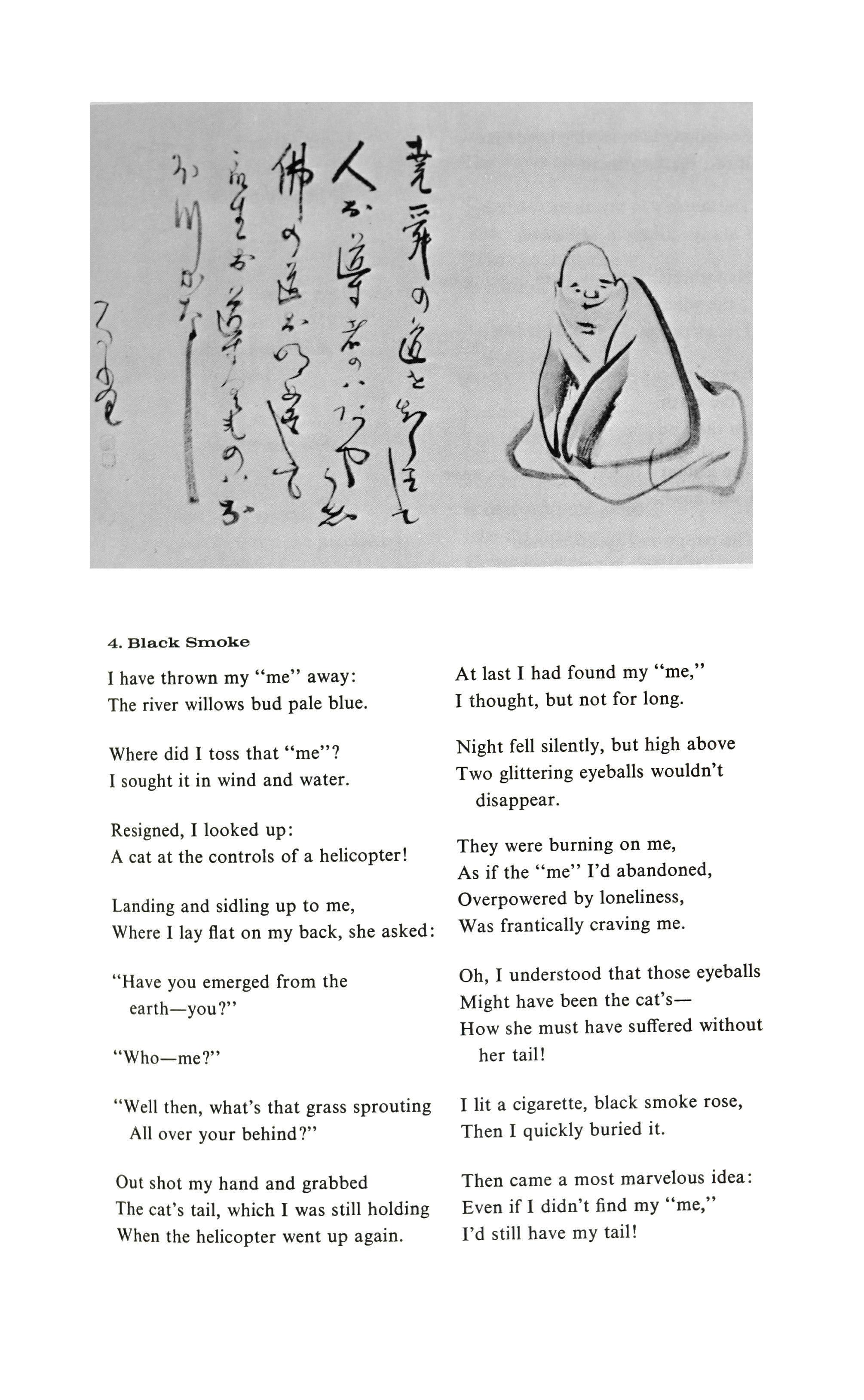
At last I had found my "me," I thought, but not for long.
Night fell silently, but high above Two glittering eyeballs wouldn't disappear.
They were burning on me, As if the "me" I'd abandoned, Overpowered by loneliness, Was frantically craving me.
Oh, I understood that those eyeballs Might have been the cat'sHow she must have suffered without her tail!
I lit a cigarette, black smoke rose, Then I quickly buried it.
Then came a most marvelous idea: Even if I didn't find my "me," I'd still have my tail!
f ".. "\ -6' I e: OJ <1J A·u ,to ./ t, �'" ,1 ,q'j ) /�
5. Mascot
Somebody is breathing inside meBirds, the very earth.
The ocean's in my chest. Walking, I always throw myself down.
Newssheets, a puppy were dancing in the windTrucks rushed by, I
Empty trucks stout enough to carry the earth
On their puncture-proof tires.
The instant I raised my hand to wave, I was nowhere.
The puppy was sprawled out on its belly, Run over again, again.
You're a badger, I'll bet, posing as a mascot
With that moonlit tie
And, sticking from your pocket, night's flower.
6. Stitches
My wife is always knitting, knittir Not that I watch her, Not that I know what she thinks.
(Awake till dawn I drowned in your eyesI must be dead: Perhaps it's the mind that stirs.)
With that bamboo needle
She knits all space, piece by piece, Hastily hauling time in.
Brass-cold, exhausted, She drops into bed and, Breathing calmly, falls asleep.
Her dream must be deepening, Her knitting coming loose.
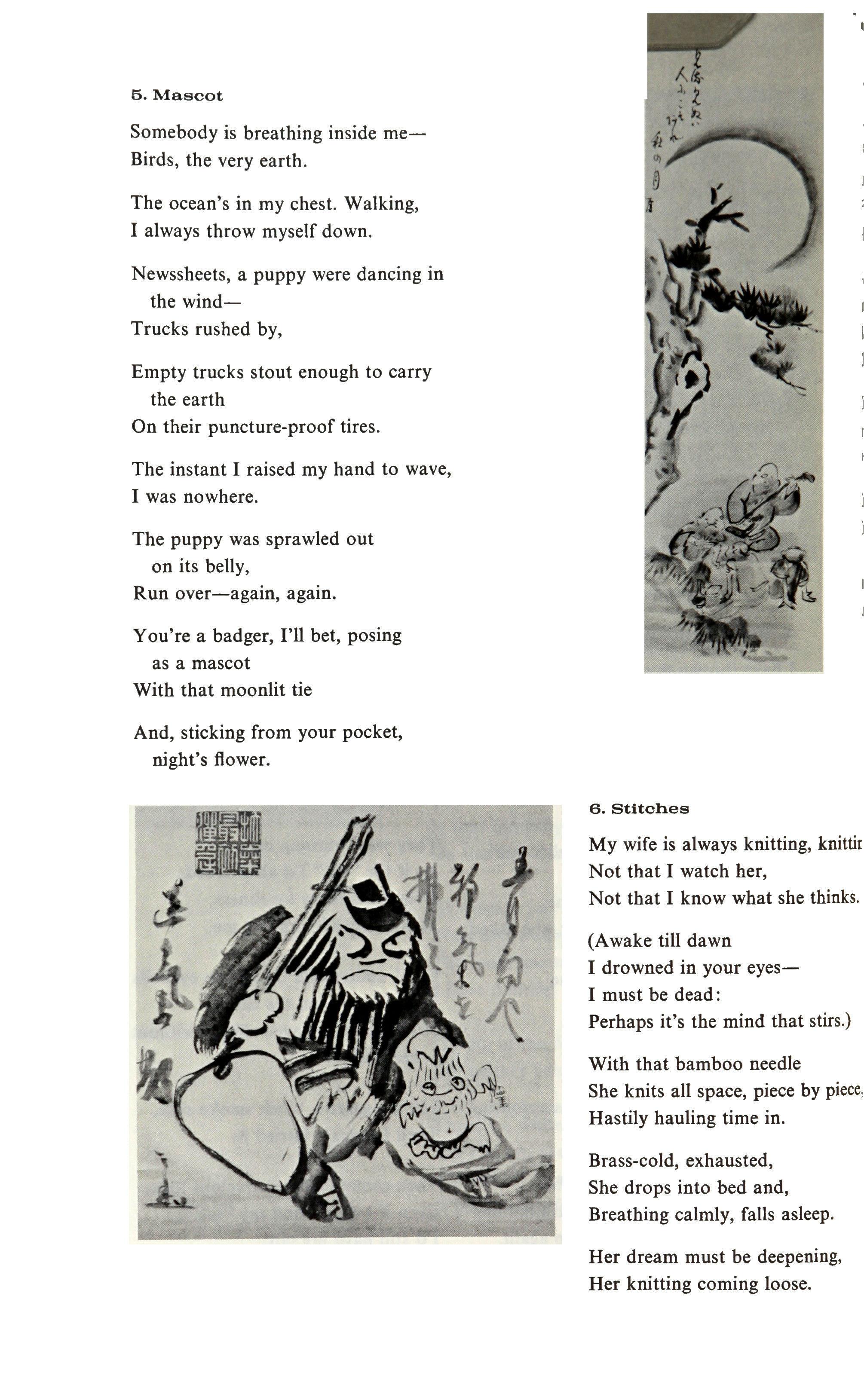
"�. i ,·t h 11 r .' Il) �
I
I
7. COII�et
A word swims through the airFish, vomited dust-speck; Jet through the sound barrier, Full of Thames fog. How far is it flying?
A man wrings out a casting net In the upper reaches of the Milky Way: Rain pours through his brains, Cliffs reveal themselves.
The sun, ah the sun, it dissolved In blue, and now seer and seen Are one: wet, smoky.
There were no rocks around, The word plunged down the precipice= Now blanched, dead, Mere time carcass, it sways Like seaweed on the beach
Its eyes devoured by crows, The waves splash over it.
Then as from inside a violoncello Someone said to himself: "The sun is hidden In a single sand-grain."
An airfield too luxuriant with word endings, Contact of white and black clouds
Followed by thunder=The birth of new figures.
The moment it is announced It rises with the globe Into the stratosphere, Up to the shores of constellations, The word.
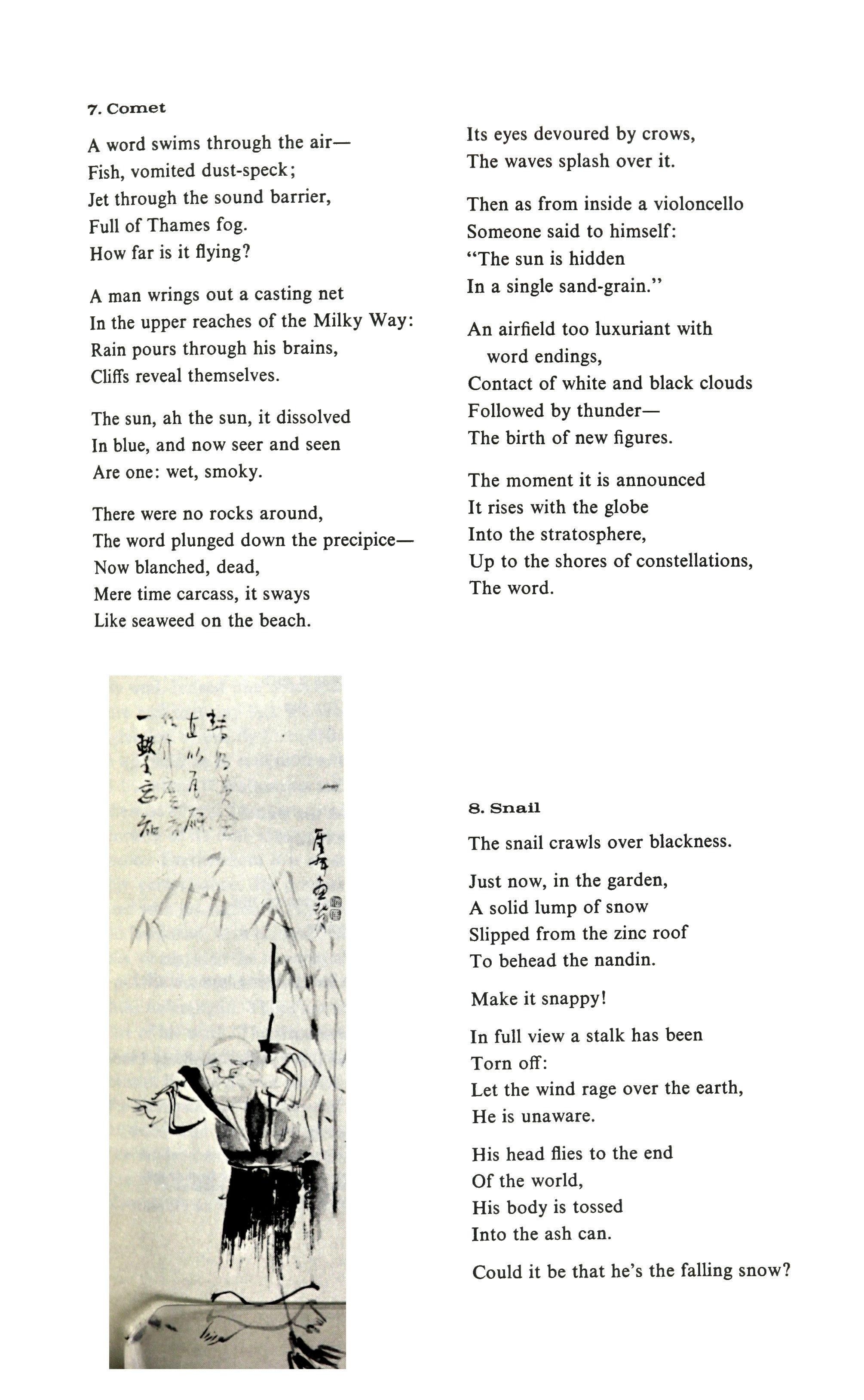
S. Snail
The snail crawls over blackness.
Just now, in the garden, A solid lump of snow Slipped from the zinc roof To behead the nandin.
Make it snappy!
In full view a stalk has been Torn off: Let the wind rage over the earth, He is unaware
His head flies to the end Of the world, His body is tossed Into the ash can.
Could it be that he's the falling snow?
'. t 1 rI .;rl" � -,
J I
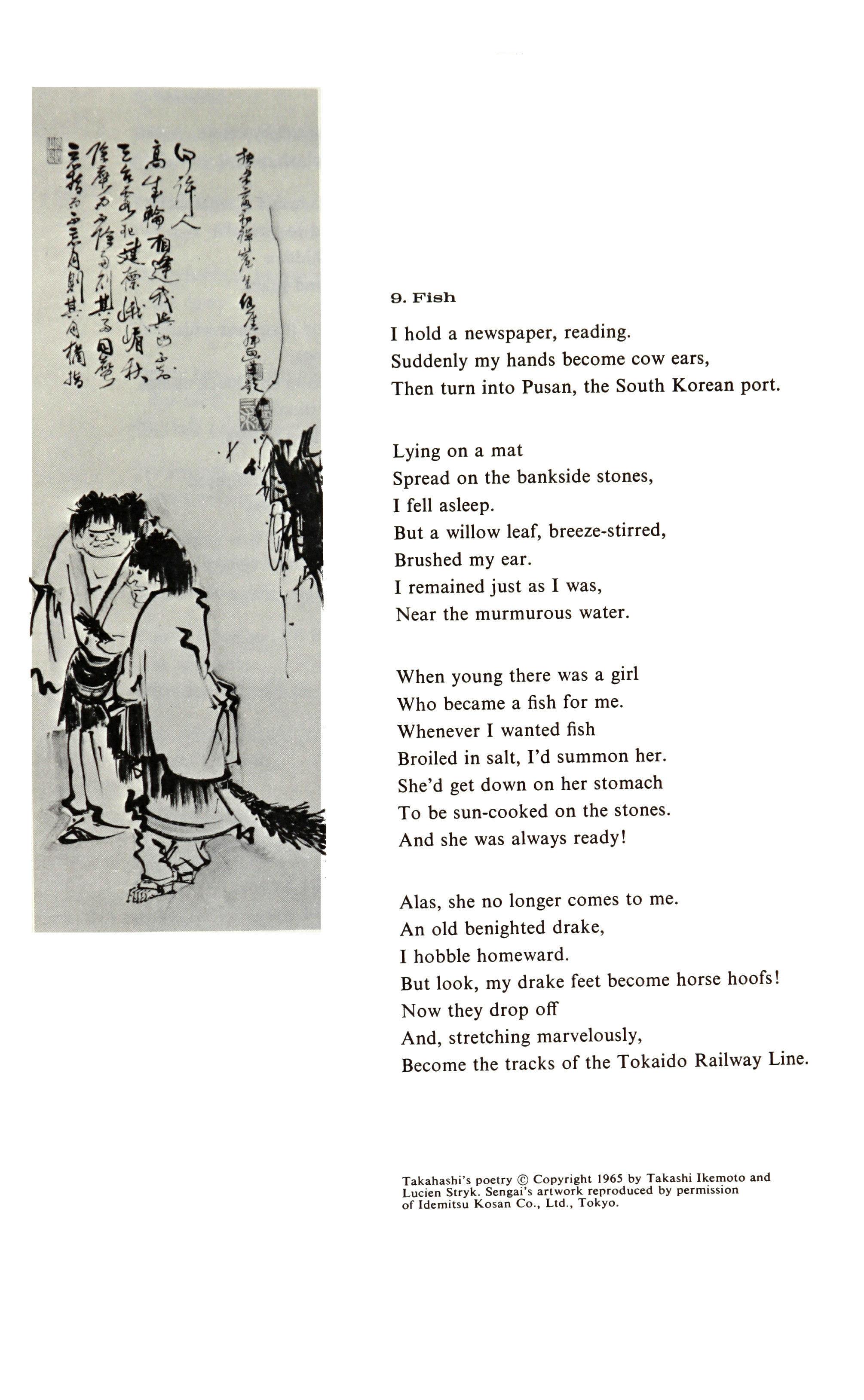
I hold a newspaper, reading. Suddenly my hands become cow ears, Then turn into Pusan, the South Korean port. 9. Fish
Lying on a mat Spread on the bankside stones, I fell asleep. But a willow leaf, breeze-stirred,
Brushed my ear.
I remained just as I was, Near the murmurous water.
When young there was a girl Who became a fish for me. Whenever I wanted fish
Broiled in salt, I'd summon her. She'd get down on her stomach
To be sun-cooked on the stones. And she was always ready! ,
Alas, she no longer comes to me. An old benighted drake, I hobble homeward.
But look, my drake feet become horse hoofs! Now they drop off And, stretching marvelously, Become the tracks of the Tokaido Railway Line.
'I' JY-1t t � !"P� ,. , �I'.. � A
Takahashi's poetry © Copyright 1965 by Takashi Ikemoto and Lucien Stryk. Sengai's artwork reproduced by permission of Idemitsu Kosan Co., Ltd., Tokyo.
Tradition and change In Nigerian literature
MICHAEL CROWDER

HERE IS NO readily apparent continuity between the creative writing of modern Nigerian authors and the traditional literature of Nigeria, which, with the exception of a certain amount of material recorded in the Arabic script, was exclusively oral. Indeed one is tempted to believe that the two are of a totally different nature and that any link between them is either a fiction of the expatriate critic's imagination or merely fortuitous.
It will help us to see just how different contemporary Nigerian literature is from oral literature if we enumerate some of their respective distinguishing features. In the case of oral literature, probably its most important distinguishing feature was a function of its oral nature: that is the direct contact between the reciter and his audience. Furthermore it is clear that audience response played an important part in his performance. By contrast the modern Nigerian writer is only indirectly related with his audience. His immediate relationship is with his typewriter, or, if he is old-fashioned, with his pen. His contact with his audience is through reviews of his books, or plays, in the newspapers, and through his half yearly royalty returns from his publishers, which in any case only tell him how well his book was doing six months beforehand. These are the only ways in which he can gauge the success or failure of his work. The situation is of course somewhat different for the playwright who can at least experience audience-contact direct, though the conventions of the European theatre do not permit a nightly adjustment of the play to suit the temper of the audience, for the shape of the play has been determined both by the original printed text and by the interpretation of its producer.
The modern writer therefore is a lonely person, an individual creative artist, for whom plagiarism is or ought to be a deadly sin. His traditional equivalent is as unidentifiable as Homer. Who for instance wrote the superb poetry that forms the
TRI-QUARTERLY 117

Odu of Ifa? Who first told that particular story of the tortoise and hare? Yet, no two babalawos will tell the Odu of Ifa in exactly the same way. Indeed attempts to standardize these Odu have floundered because it is impossible to decide just whose version to take as the standard one. Folktales may vary in the telling, in the imagery used. But the essential point is that the actual original author is unknown; for oral literature is the expression not of the genius of one man but of the group, whose corporate property it is.
The repositories of this oral literature may vary considerably from one ethnic group to another. Amongst the tribes of the West Atlantic coast there is a special caste known as griots whose duty it is to remember the traditions of the tribe, recite the deeds of famous men, and recite folktales. Amongst the Yoruba the remembering of the Odu of Ifa or the Ijala poems is the duty of specialized groups: babalawo or priests in the case of the former, hunters in the latter. What is important in this folk literature, then, is not the original creative act but the method of telling the story, the singing of the song, or the reciting of the poem, for the audience probably also knows the tale or song in question and half the pleasure for the audience is thus in anticipation. I have seen a traditional tale told to an audience most of whom knew the plot, but each time the hero of the tale faced another more difficult task than the one before, even though they knew he would succeed, their excitement was such that they might have been hearing it for the first time. Perhaps the most striking example of the way in which oral literature is commonly-owned lies in the field of proverbs. It is usually sufficient in Africa to allude to the first few words of a proverb only for the whole significance of it to be understood by the person to whom you wish to tell it.
A further point that distinguishes traditional literature from modern Nigerian literature is that it was inseparable from the whole social structure of the tribe. The whole range of this literature, from the religious divination poetry of the Odu of Ifa, through the reciting of king lists to the telling of moralistic folktales, were all part of the life of every member of the tribe in which religious, political and social activity had no very sharp distinctions. Culture in traditional society was not secularised as it has become in Nigeria today with the advent of dance-halls, cinema and television.
Traditional oral literature, despite all the variations that may have taken place in its telling, followed a fixed pattern. There was little room for experimentation which is the lifeblood of the creative writer. Furthermore traditional literature did not consist of words alone. It was often recited to the accompaniment of drums and other musical instruments; sometimes it was sung; and it was delivered with a great deal of dramatic interpretation. Another essential feature of much oral literature was the chorus, usually formed from the audience who sung in response and sometimes even danced.
To sum up, oral literature was distinguished by the following features: there was a direct relationship between the story teller and his audience; authorship of a particular tale or poem was rarely identified; oral literature was the property of the group not of the individual, and it was an essential part of the fabric of society, not a particular sphere of rather specialised activity. On the whole it followed fixed 118 TRI-QUARTERLY
patterns and allowed little or no room for experimentation virtuosity lay in the telling of the tale, rather than in invention. Furthermore literature was frequently recited to the accompaniment of drums and other musical instruments, and attended by singing and dancing of the audience.
Finally traditional oral literature was of significance only to the ethnic group from which it emanated. By its very nature it could not reach a large audience. On the other hand the modem Nigerian writer has the whole world as his potential audience through the medium of wide-scale distribution in the English-speaking world and through translation.

2
The dilemma of the modern writer who seeks inspiration from traditional literature is that the medium he is working in has no obvious ancestry in oral literature which had no place for the individual creative writer. This situation, it must of course be stressed, is not special to Africa. It is present in any change over from a society with a corporate way of life to the individualistic society of the technological age. Just as the prison of traditional literature was the strict rules governing its form and content and its method of presentation, so the prison of the modern writer is his lack of direct contact with his audience. Any attempt to derive inspiration from traditional literature has to be a very conscious one indeed. We know how stilted the strict interpretation of oral literature by the anthropologist can be. This is because this literature, divorced from its audience and accompanying response in singing and dancing and reduced to hard print, and, most important of all, translated into a foreign language, has to be completely rethought if it is to retain anything of its original impact.
The most difficult problem confronting the writer who wishes to use traditional literature creatively in this way is the problem oftranslating ideas from one language to another. Most, though by no means all, creative writers in Nigeria use English as their medium of expression. The whole problem of translating one system of thought into another raises itself. We know well how difficult it is to translate French ideas into meaningful English when both peoples have such different conceptions of liberty, justice and democracy. The more difficult then is it to translate traditional African ideas into English or French, unless the writer imposes his acquired English thought system on the African system. Professor Robert G. Armstrong ofthe Institute of African Studies, University of Ibadan, in his recent inaugural lecture cited a passage from Marcel Griaule's study of Dogon philosophy which records the Dogon conception of the beginning of the world which I think makes my point.
"Gla, which designates the original empty nothingness and at the same time the ideas ofmovement, being full ofits emptiness and its emptiness full ofitself, extended its power everywhere. It emitted a "voice of emptiness" which created first of all its double, dya: gla became two, thus marking the primordial existential character of twinness." What is the European to make of this? or indeed the non-Dogon African?
The dilemma of the Nigerian author then is that the nature of his medium cuts
TRI-QUARTERLY 119
him off from traditional literature, and even in conscious attempts to derive inspiration from it he is often frustrated by the difficulties of translating ideas from one language to another, without imposing the thought structure, of, in this case, English, on that of the original. And at the risk of sounding repetitive but to emphasise once again a point I have already made, the Nigerian author is cut off from direct contact with his audience.
There seem to be two possible ways out of this dilemma: first through the play which, if flexibly treated, can give the writer contact with his audience and can bring together literature, music, singing and dancing. The second through poetry, which it does seem to me has more possibilities of a direct link with traditional literature. I think here of the Yoruba oriki translated by VIIi Beier and Bakore Gbadamosi, to take a traditional example and the poetry of George Awoonor-Williams of Ghana, to take a modern example. Awoonor-Williams, though a modern poet, specialises in research into vernacular poetry in the Institute of African Studies of the University of Ghana. It seems to be significant that the two most interesting Nigerian writers in my own opinion, and certainly the most experimental, Wole Soyinka and John Pepper Clark, use the medium of the blank verse play and are also poets of distinction.

3
The dilemma of the modern Nigerian writer who feels out of contact with his past seems to me to find its most obvious expression in the works of those writers who take as their main theme the conflict of the two cultures: those of Europe and Africa. In French West Africa this finds its expression in the literature of negritude where writers are trying to establish that there was a distinct African civilisation, with its OWl1 sets of values and its own particular way of life that could be set up in contrast to European civilisation, and more specifically French civilisation, which had been held up to them by their colonisers as the only true civilisation. Most English speaking writers have at some time or other been preoccupied with this problem of culture conflict, though here we must make exception of Clark and Soyinka, though some may dispute the exclusion of the latter from this category. The two writers most representative of what I might call the culture-conflict school are Achebe and Nzekwu. Both, too, seem to be writing largely for European audiences. Of the two writers, Achebe is a superb stylist, though he is unadventurous in his use of English. Curiously it is his use of proverbs in the text, which is said by so many critics to be one of his achievements in the field of combining traditional Africa and modern Africa, that I find the most self-conscious aspect of his books. This self-consciousness is taken further in Nzekwu's Wand ofNoble Wood, where the writer is continuously at pains to explain Ibo society to the English audience. In Wand of Noble Wood Peter Obiesie, the hero, is unable to marry the mistress by whom he has a child because she comes from a different ethnic group. He goes reluctantly to seek a wife from his own town, convinced that it is impossible to find a wife who will be traditionally acceptable to his parents and at the same time make a satisfactory
120 TRI-QUARTERLY

emotional and intellectual partner. The miracle happens when in Nneka, a young school mistress, he finds such a person. But his earlier forebodings seem to be confirmed when she reveals that she has a curse on her that will kill any man she marries. The story ends in deep tragedy, hinting that the two worlds will never reconcile themselves. Many considerable literary critics in England gave this novel and its successor Blade Among the Boys (which deals with the conflict of Christianity and traditional religion) very favourable reviews because of the insight they felt it gave them into African society, as though they were at last being given a peep behind the curtain. However the main criticism, that can be levelled against Nzekwu as a writer (and it is very frequently levelled by his fellow African writers) is that be is too concerned to explain his society to the outsider, in this case the European. We may of course pause here to consider whether in fact the African writer talking about his own ethnic group will not also have to explain its own characteristics in this same way to Africans from other ethnic groups just as he feels he must to Europeans. After all, I suppose Ibo religion, which plays an important role in Nzekwu's two books, must be as difficult for the Muslim from Mali to understand as it is for the European. What is wrong with Nzekwu's explanation is his technique of description, not the very fact of explanation itself.
At the other end of the same spectrum are the writers of the negritude school, who far from seeking to explain themselves to the European audience, allocate to the Negro a special sensitivity to, and understanding of, the world that is they say lacking to the white man, and which the white man can never comprehend. Whilst in its day this was be'ieved sincerely by many good writers of this school, it has subsequently been used by lesser writers as a defense against critics. Thus a secondrate work by a Negro author published under the umbrella of negritude could escape criticism by the white on the grounds that, not being Negro, he could not possibly appreciate the work in question. Africans daring to criticise the work were attacked as being bought by the Americans or of being colonist stooges. Fortunately this climate has never developed in English-speaking countries where the dominant attitude is that of Wole Soyinka: A Tiger does not have to proclaim his tigritude. We have thus two extremes: the self-conscious desire to explain Africa to the European audience; and the belief that the European by his very whiteness could not understand the essence of Negro society. Both seem to me unhealthy for the long-term development of African literature. Good literature does not explain itself to, or exclude itself deliberately from, any particular audience. It may of course have individual, even highly individual, characteristics that give it its particular distinction; but it must nevertheless be judged by universal not special standards. And in this connexion, until very recently, African writing has been treated far too gently by European critics fearing that criticism would be confused with racism, an attitude as unhealthy as that of negritude which in its extreme moments denied any validity in non-Negro criticism of Negro writing.
The problem of the writer until recently has been exacerbated by the fact that he has felt that his main audience has been European and his main outlet has been through European publishing houses.This inevitably has determined consciously or unconsciously his mode of writing. We can imagine what a trammel to style and
TRI-QUARTERLY 121

expression this must be if we think of Tchekov having to write all his short stories with an Indonesian audience in mind. The situation was further complicated by the fact that even when a Nigerian wrote in an English closer to that spoken daily by many of his fellow Nigerians, it was rejected by them as not being proper English but was accepted with delight in Britain. Here I of course refer to the Palm Wine Drinkard by Amos Tutuola.
Cyprian Ekwensi in a recently published article in Nigeria Magazine entitled "Problems of Nigerian Writers" bears out this argument. I quote: "Perhaps the greatest problem facing Nigerian writers is finding Nigerian readers and again "Tile Nigerian creative writer is left with a very limited audience critics, intellectuals and non-Nigerians Recently there has been two important developments. First the potential Nigerian audience has grown immensely in the last decade. In 1954 when Cyprian Ekwensi published the first novel by a Nigerian writer, People of the City, it sold almost exclusively in England, and was very difficult to obtain in Nigeria. Now it has been reissued in Heinemann's African Writers series, a series specifically designed for the African market. Achebe's Things Fall Apart was according to the Annual Report of the Enugu library in 1960 the most popular book on its shelves, followed, it might be added, in the field of the novel, by Marie Corelli's The Mighty Atom. The second major factor is the growth of proto-indigenous publishers and indeed indigenous publishers themselves, as alternative outlets for Nigerian writers work. Thus Cyprian Ekwensi's novel Burning Grass was published in Heinemann's African series, and will probably sell relatively few copies on the bookstalls in England. A number of overseas publishers like Oxford University Press, Cambridge University Press, Longmans and Andre Deutsch have established semi-autonomous branches in Nigeria with their own directors, several of them Nigerian, and with their own editorial directors two of whom are Nigerian: Christopher Okigbo, the poet, is manager of Cambridge University Press and Chief T. T. Solaru, the manager of Oxford University Press. The only indigenous publishing house that does publish Nigerian writers and artists is Mbari, which has produced the work of Clark, Soyinka and Okigbo. The main point about this development is that there is now growing up a publishing community in Nigeria. 4
Two main schools of Nigerian writing seem to be forming themselves at the moment, though both overlap to a considerable extent. The first is the popular school, headed by Cyprian Ekwensi. Let me say straight away that the designation popular for this school does not imply that it lacks distinction in the quality of its writing. This school seems to me to reflect the popular strain in both European and African writing. You may ask what I mean by the popular strain in African oral literature! I would specify that literature that was considered mainly for its entertainment value: as distinct from sacred and historical literature. I would include in this popular literature: folktales, sagas; the semi-fictitious deeds of tribal heroes etc. This school aims at a mass audience, is written in an easy style, aims at mass sales 122 TRI-QUARTERLY
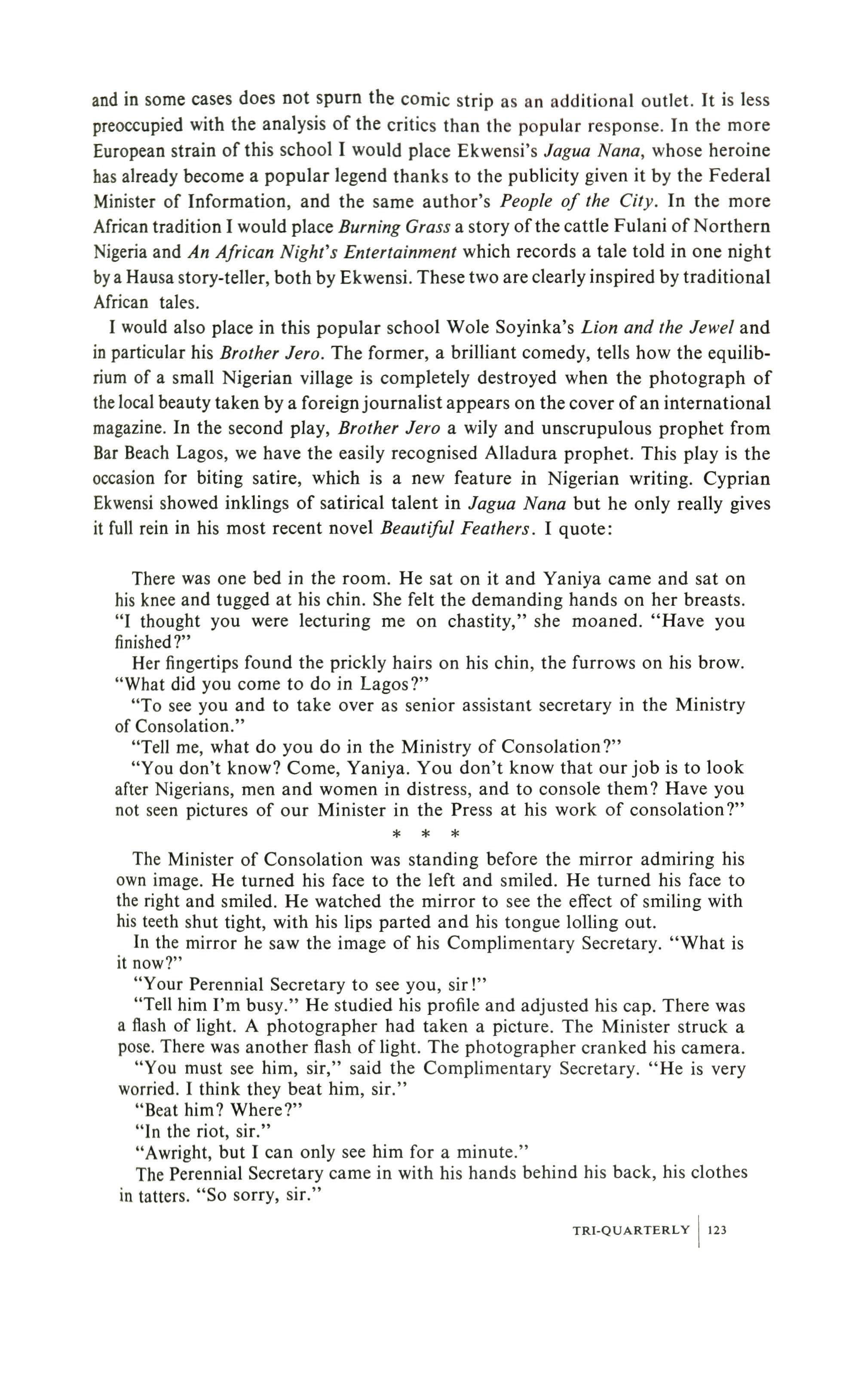
and in some cases does not spurn the comic strip as an additional outlet. It is less preoccupied with the analysis of the critics than the popular response. In the more European strain of this school I would place Ekwensi's Jagua Nana, whose heroine has already become a popular legend thanks to the publicity given it by the Federal Minister of Information, and the same author's People of the City. In the more African tradition I would place Burning Grass a story ofthe cattle Fulani of Northern Nigeria and An African Night's Entertainment which records a tale told in one night by a Hausa story-teller, both by Ekwensi. These two are clearly inspired by traditional African tales.
I would also place in this popular school Wole Soyinka's Lion and the Jewel and in particular his Brother Jero. The former, a brilliant comedy, tells how the equilibrium of a small Nigerian village is completely destroyed when the photograph of the local beauty taken by a foreignjournalist appears on the cover of an international magazine. In the second play, Brother Jero a wily and unscrupulous prophet from Bar Beach Lagos, we have the easily recognised Alladura prophet. This play is the occasion for biting satire, which is a new feature in Nigerian writing. Cyprian Ekwensi showed inklings of satirical talent in Jagua Nana but he only really gives it full rein in his most recent novel Beautiful Feathers. I quote:
There was one bed in the room. He sat on it and Yaniya came and sat on his knee and tugged at his chin. She felt the demanding hands on her breasts. "I thought you were lecturing me on chastity," she moaned. "Have you finished 1"
Her fingertips found the prickly hairs on his chin, the furrows on his brow. "What did you come to do in Lagos ?"
"To see you and to take over as senior assistant secretary in the Ministry of Consolation."
"Tell me, what do you do in the Ministry of Consolation ?"
"You don't know? Come, Yaniya. You don't know that our job is to look after Nigerians, men and women in distress, and to console them? Have you not seen pictures of our Minister in the Press at his work of consolation ?"
The Minister of Consolation was standing before the mirror admiring his own image. He turned his face to the left and smiled. He turned his face to the right and smiled. He watched the mirror to see the effect of smiling with his teeth shut tight, with his lips parted and his tongue lolling out.
In the mirror he saw the image of his Complimentary Secretary. "What is it now?"
"Your Perennial Secretary to see you, sir !"
"Tell him I'm busy." He studied his profile and adjusted his cap. There was a flash of light. A photographer had taken a picture. The Minister struck a pose. There was another flash of light. The photographer cranked his camera.
"You must see him, sir," said the Complimentary Secretary. "He is very worried. I think they beat him, sir."
"Beat him? Where?"
"In the riot, sir."
"Awright, but I can only see him for a minute."
The Perennial Secretary came in with his hands behind his back, his clothes in tatters. "So sorry, sir."
* * *
TRI-QUARTERLY 123

"What happened ?"
"Nothing really I was driving towards your honourable residence when I was waylaid by a group of rioters. They stopped the car, pulled me out and beat me. They fell on the girl, with intent to assault her. But for Wilson Iyari "Where did this happen ?"
"Near the race-course."
"I'm sorry to hear that. You want to go home now, or "No, it's nothing at all, sir."
"All right, then. I want you to write me a speech, quickly." He glanced at the mirror. "Don't make it too long. Any speech I"�
The Perennial Secretary was prepared. He sat in a corner of the lounge and drafted a speech which he took along to the Minister, who was still standing before the mirror.
"Thank you." He smiled, and with flourishes read the speech to the mirror, making appropriate gestures.
Hearing a noise, the Minister asked, "Who are those?"
Indeed, his courtyard was filling up with a crowd of men, women with children on their backs, glamour girls in slacks. They came into the lounge and sat on the best chairs. Some of them drifted into the dining-room and began helping themselves to the meal laid out on the table. Some of them had addressed envelopes in their hands.
"The usual crowd, sir," said the Perennial Secretary. "From your constituency. Would you like to see them, sir?"
"Be tactful Tell them no jobs for them as yet."
One of those carrying an addressed envelope burst into the room. "But, Minister, one of our brodder who came here last week you gave him job." His clothes were an embarrassment. He held his stomach and rolled his eyes. "We are hungry. We hear that plenty work come out in the Ministry of Consolation. So we hear."
The minister smiled and shook his head. He dipped his hand into his wallet and held up six pound notes. "Tha's the last I have. Take and divide among yourselves. I will not hide work from you if there is work. Is what I'm here for. To see that you don' suffer. After all, I represent you."
"Thank you, sir. Next election you will go in by the power of our vote."
It has been said that satire is foreign to Nigerian tradition. However, anyone who has watched the Yoruba Egungun masqueraders will confirm that this is far from the truth.
The second main school which seems to be developing is also one that has rejected the theme of culture-conflict, and is not particularly concerned with a European audience. I would add that I do not wish it to be thought that I consider the culture-conflict theme a trivial one. It has, in the case of Things Fall Apart, produced a very important novel. But it is only one of many possible themes open to the writer, and there was a time when it looked as though all West African writers, French and English-speaking, would become exclusively preoccupied with it, and that it would prove a literary dead-end. This second school is represented by the playwright-poets Soyinka and Clark and by the poets Okigbo and Okara. Their intellectual preoccupations exclude a popular audience. A typical example of this new tradition is J. Pepper Clark's Song of a Goat. The theme of this play, the tragedy of sterility in a Nigerian man, specifically from the Niger Delta, is not
124 TRI-QUARTERLY
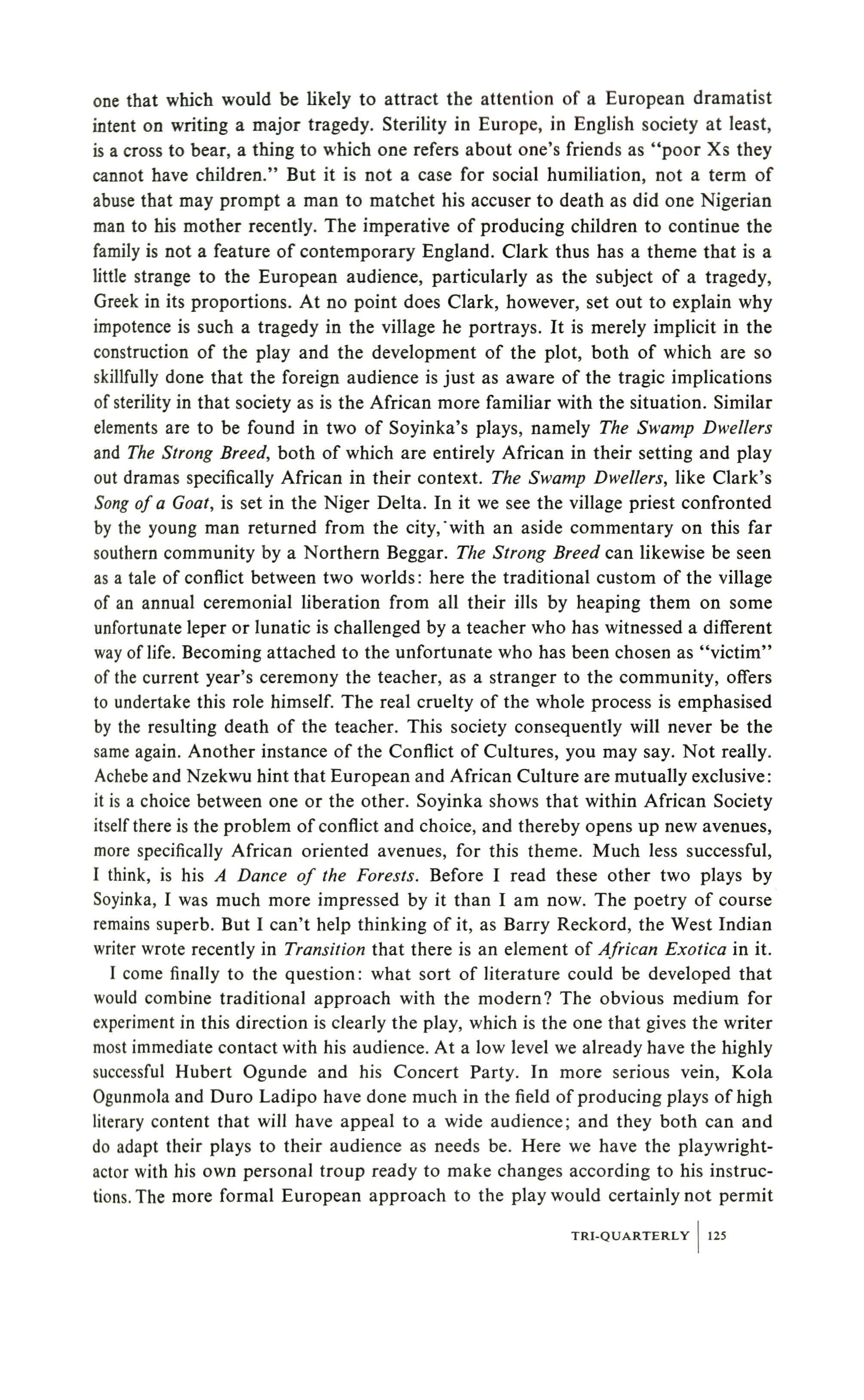
one that which would be likely to attract the attention of a European dramatist intent on writing a major tragedy. Sterility in Europe, in English society at least, is a cross to bear, a thing to which one refers about one's friends as "poor Xs they cannot have children." But it is not a case for social humiliation, not a term of abuse that may prompt a man to matchet his accuser to death as did one Nigerian man to his mother recently. The imperative of producing children to continue the family is not a feature of contemporary England. Clark thus has a theme that is a little strange to the European audience, particularly as the subject of a tragedy, Greek in its proportions. At no point does Clark, however, set out to explain why impotence is such a tragedy in the village he portrays. It is merely implicit in the construction of the play and the development of the plot, both of which are so skillfully done that the foreign audience is just as aware of the tragic implications of sterility in that society as is the African more familiar with the situation. Similar elements are to be found in two of Soyinka's plays, namely The Swamp Dwellers and The Strong Breed, both of which are entirely African in their setting and play out dramas specifically African in their context. The Swamp Dwellers, like Clark's Song of a Goat, is set in the Niger Delta. In it we see the village priest confronted by the young man returned from the city, with an aside commentary on this far southern community by a Northern Beggar. The Strong Breed can likewise be seen as a tale of conflict between two worlds: here the traditional custom of the village of an annual ceremonial liberation from all their ills by heaping them on some unfortunate leper or lunatic is challenged by a teacher who has witnessed a different way of life. Becoming attached to the unfortunate who has been chosen as "victim" of the current year's ceremony the teacher, as a stranger to the community, offers to undertake this role himself. The real cruelty of the whole process is emphasised by the resulting death of the teacher. This society consequently will never be the same again. Another instance of the Conflict of Cultures, you may say. Not really. Achebe and Nzekwu hint that European and African Culture are mutually exclusive: it is a choice between one or the other. Soyinka shows that within African Society itself there is the problem of conflict and choice, and thereby opens up new avenues, more specifically African oriented avenues, for this theme. Much less successful, I think, is his A Dance of the Forests. Before I read these other two plays by Soyinka, I was much more impressed by it than I am now. The poetry of course remains superb. But I can't help thinking of it, as Barry Reckord, the West Indian writer wrote recently in Transition that there is an element of African Exotica in it.
I come finally to the question: what sort of literature could be developed that would combine traditional approach with the modern? The obvious medium for experiment in this direction is clearly the play, which is the one that gives the writer most immediate contact with his audience. At a low level we already have the highly successful Hubert Ogunde and his Concert Party. In more serious vein, Kola Ogunmola and Duro Ladipo have done much in the field of producing plays of high literary content that will have appeal to a wide audience; and they both can and do adapt their plays to their audience as needs be. Here we have the playwrightactor with his own personal troup ready to make changes according to his instructions. The more formal European approach to the play would certainly not permit
TRI-QUARTERLY 125
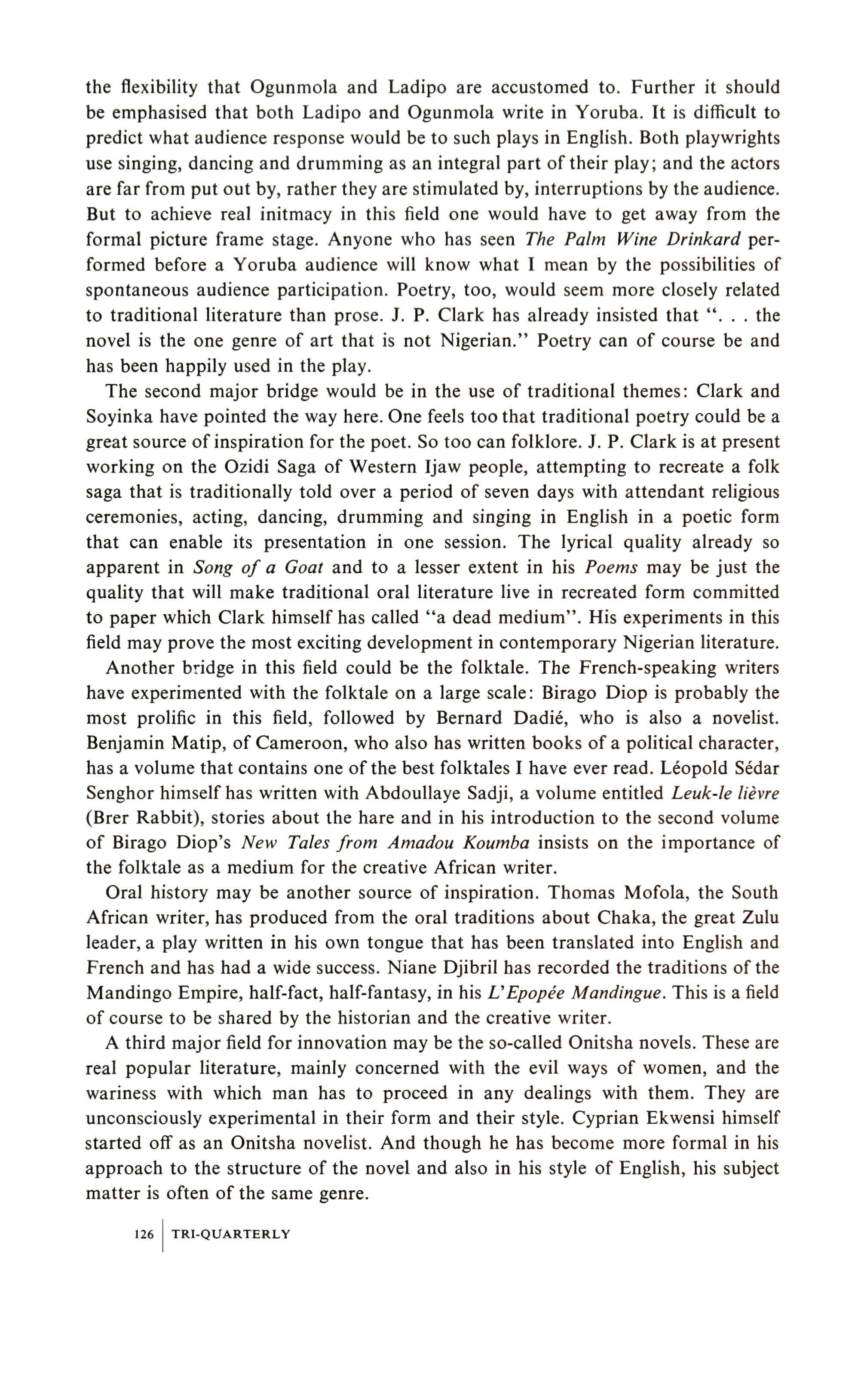
the flexibility that Ogunmola and Ladipo are accustomed to. Further it should be emphasised that both Ladipo and Ogunmola write in Yoruba. It is difficult to predict what audience response would be to such plays in English. Both playwrights use singing, dancing and drumming as an integral part of their play; and the actors are far from put out by, rather they are stimulated by, interruptions by the audience. But to achieve real initmacy in this field one would have to get away from the formal picture frame stage. Anyone who has seen The Palm Wine Drinkard performed before a Yoruba audience will know what I mean by the possibilities of spontaneous audience participation. Poetry, too, would seem more closely related to traditional literature than prose. J. P. Clark has already insisted that the novel is the one genre of art that is not Nigerian." Poetry can of course be and has been happily used in the play.
The second major bridge would be in the use of traditional themes: Clark and Soyinka have pointed the way here. One feels too that traditional poetry could be a great source of inspiration for the poet. So too can folklore. J. P. Clark is at present working on the Ozidi Saga of Western Ijaw people, attempting to recreate a folk saga that is traditionally told over a period of seven days with attendant religious ceremonies, acting, dancing, drumming and singing in English in a poetic form that can enable its presentation in one session. The lyrical quality already so apparent in Song of a Goat and to a lesser extent in his Poems may be just the quality that will make traditional oral literature live in recreated form committed to paper which Clark himself has called "a dead medium". His experiments in this field may prove the most exciting development in contemporary Nigerian literature.
Another bridge in this field could be the folktale. The French-speaking writers have experimented with the folktale on a large scale: Birago Diop is probably the most prolific in this field, followed by Bernard Dadie, who is also a novelist. Benjamin Matip, of Cameroon, who also has written books of a political character, has a volume that contains one of the best folktales I have ever read. Leopold Sedar Senghor himself has written with Abdoullaye Sadji, a volume entitled Leuk-le lievre (Brer Rabbit), stories about the hare and in his introduction to the second volume of Birago Diop's New Tales from Amadou Koumba insists on the importance of the folktale as a medium for the creative African writer.
Oral history may be another source of inspiration. Thomas Mofola, the South African writer, has produced from the oral traditions about Chaka, the great Zulu leader, a play written in his own tongue that has been translated into English and French and has had a wide success. Niane Djibril has recorded the traditions of the Mandingo Empire, half-fact, half-fantasy, in his L'Epopee Mandingue. This is a field of course to be shared by the historian and the creative writer.
A third major field for innovation may be the so-called Onitsha novels. These are real popular literature, mainly concerned with the evil ways of women, and the wariness with which man has to proceed in any dealings with them. They are unconsciously experimental in their form and their style. Cyprian Ekwensi himself started off as an Onitsha novelist. And though he has become more formal in his approach to the structure of the novel and also in his style of English, his subject matter is often of the same genre.
126 TRI-QVARTERLY
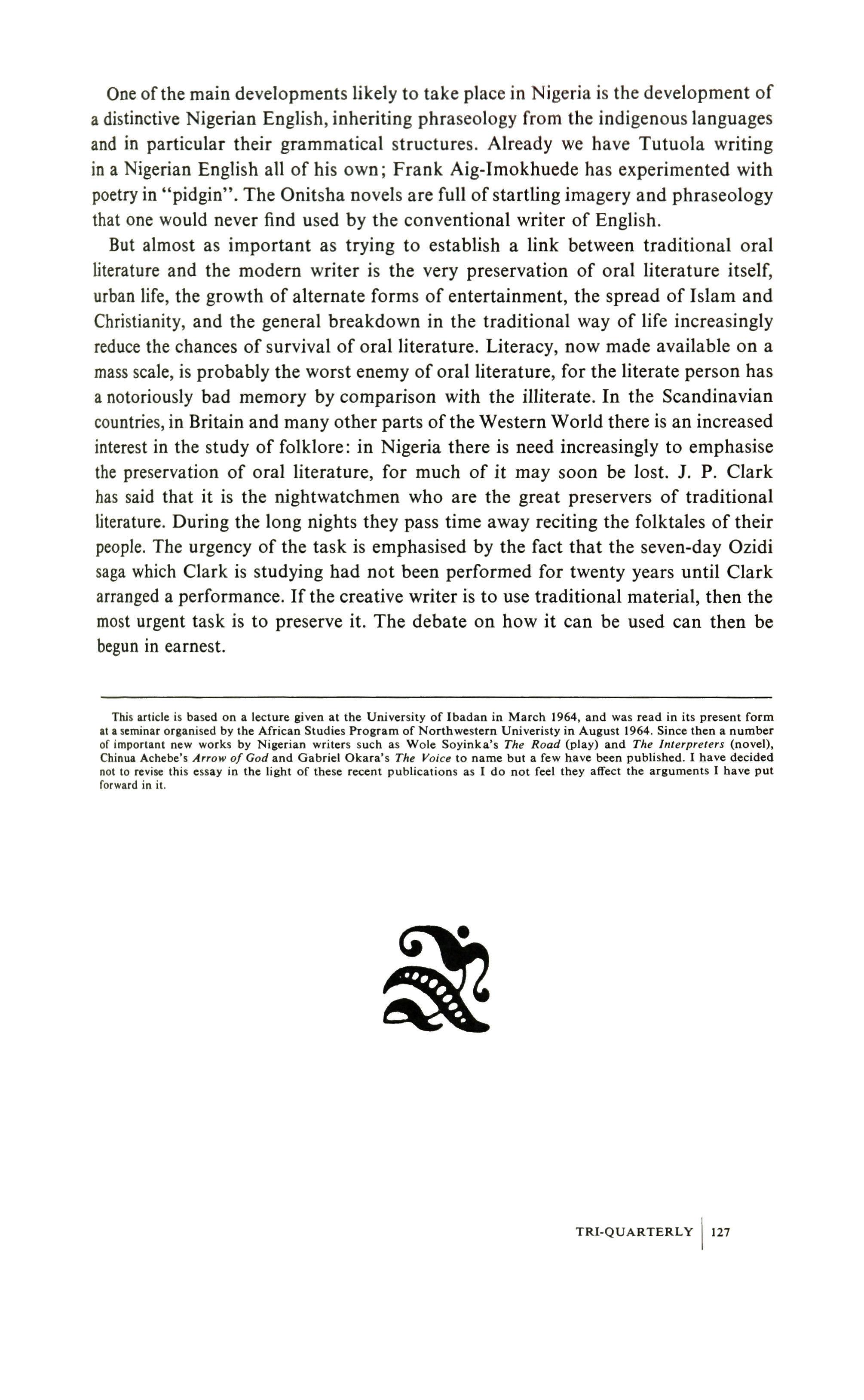
One of the main developments likely to take place in Nigeria is the development of a distinctive Nigerian English, inheriting phraseology from the indigenous languages and in particular their grammatical structures. Already we have Tutuola writing in a Nigerian English all of his own; Frank Aig-Imokhuede has experimented with poetry in "pidgin". The Onitsha novels are full of startling imagery and phraseology that one would never find used by the conventional writer of English. But almost as important as trying to establish a link between traditional oral literature and the modem writer is the very preservation of oral literature itself, urban life, the growth of alternate forms of entertainment, the spread of Islam and Christianity, and the general breakdown in the traditional way of life increasingly reduce the chances of survival of oral literature. Literacy, now made available on a mass scale, is probably the worst enemy of oral literature, for the literate person has a notoriously bad memory by comparison with the illiterate. In the Scandinavian countries, in Britain and many other parts of the Western World there is an increased interest in the study of folklore: in Nigeria there is need increasingly to emphasise the preservation of oral literature, for much of it may soon be lost. J. P. Clark has said that it is the nightwatchmen who are the great preservers of traditional literature. During the long nights they pass time away reciting the folktales of their people. The urgency of the task is emphasised by the fact that the seven-day Ozidi saga which Clark is studying had not been performed for twenty years until Clark arranged a performance. If the creative writer is to use traditional material, then the most urgent task is to preserve it. The debate on how it can be used can then be begun in earnest.
This article is based on a lecture given at the University of Ibadan in March 1964, and was read in its present form at a seminar organised by the African Studies Program of Northwestern Univeristy in August 1964. Since then a number of important new works by Nigerian writers such as Wole Soyinka's The Road (play) and The Interpreters (novel), Chinua Achebe's Arrow of God and Gabriel Okara's The Voice to name but a few have been published. I have decided not to revise this essay in the light of these recent publications as I do not feel they affect the arguments I have put forward in it.
TRI-QUARTERLY 127

ACHEBE, Chinua, 1930-
Things Fall Apart: (novel) London, Heinemann, 1958
No Longer at Ease: (novel) London, Heinemann, 1960
The Sacrificial Egg and other Stories: (short stories) Onitsha, Etudo, 1962
The Arrow of God: (novel) London, Heinemann, 1964
AKINSEMOYIN, Kunle
Twilight and the Tortoise: (for schools) Lagos, African Universities Press, 1963
ALUKO, Timothy Mofolorunsho, 1918-
One Man-One Wife: (novel) Lagos, Nigerian Printing and Publishing Company, 1959
One Man-One Matchet: London, Heinemann, 1962
CLARK, John Pepper, 1935-
Song of a Goat: (play) Ibadan, Mbari, 1961
Poems. Ibadan, Mbari, 1962
Three Plays. Oxford University Press, 1964
EKWENSI, Cyprian Odiatu Duaka, 1921-
When Love Whispers: (novel) 1947
The Leopard's Claw: (novel) 1947
Okolo the Wrestler: (novel) London, Nelson, 1947
For A Roll of Parchment: (novel) 1951
Beware of the Bight of Benin: (novel) 1951
People of the City: (novel) London, Barkers, 1954
The Passport of Mallam Ilia: (school reader) London, Cambridge University Press, 1960
The Drummer Boy: (school reader) London, Cambridge University Press, 1960
Jagua Nana: (novel) London, Hutchinson, 1961
Burning Grass: a story of the Fulani of Northern Nigeria: (novel) London, Heinemann, 1962
Beautiful Feathers: (novel) London, Hutchinson, 1963
Murder at the Yaba Roundabout. Lagos, 1963
ESAN, Yetunde
Don't Say It in Writing: (play) 1960
HENSHAW, James Ene
This Is Our Chance: (plays) London, University of London Press, 1956
NWANKWO, Nkem
Tales Out of School: (for schools) Lagos, African Universities Press, 1963
NZEKWU, Onuora, 1928-
Wand of Noble Wood: (novel) London, Hutchinson, 1961
Blade among the Boys: (novel) London, Hutchinson, 1962
(with Michael Crowder) Eze Goes to School: (for schools) Lagos, African Universities Press, 1963
OKIGBO, Christopher, 1932-
Heavensgate: (poetry) Ibadan, Mbari, 1962
Limits: (poetry) Ibadan, Mbari, 1964
ONADIPE, Kola
The Adventures of Souza, the Village Lad: (for schools) Lagos, African Universities Press, 1963
SOFOLA, Samuel Adeniyi
When A Philosopher Falls in Love: (play) New York, Comet, 1956
SOYINKA, Wole
A Dance of the Forest: (play) Ibadan, Oxford University Press, 1963
The Lion and the Jewel: (play) Ibadan, Oxford University Press, 1963
Three Plays: Ibadan, Mbari, 1963
TUTUOLA, Amos, 1920-
The Palm Wine Drinkard: (novel) London, Faber, 1952
My Life in the Bush of Ghosts: (novel) London, Faber, 1954
Simbi and the Satyr of the Dark Jungle: (novel) London, Faber, 1955
The Brave African Huntress: (novel) London, Faber, 1958
Feather Woman of the Jungle: (novel) London, Faber, 1962
APPENDIX
128 TRI-QUARTERLY
Wale Sayinka and the Nigerian Dr-arrra
JOHN F. POVEY

1-IE DEVELOPMENT of writing in English in Nigeria of the past decade has not concentrated exclusively upon the more widely known genre of the novel. Simply because of the availability ofthe novel abroad, Chinua Achebe and Cyprian Ekwensi are the names that come most readily to mind when one thinks of the new writing of Nigeria. Just as vigorous and interesting is the drama in that country. Whatever the situation elsewhere (and one is constantly despairing of the hit or flop alternatives of Broadway economics) in West Africa the theater is energetic, ambitious and thriving.
To a degree the dramatic mode avoids some of the problems that harrass the novelist; the cultural differences between writer and audience; the absence of any similar idigenous tradition. Although obviously both conventional and experimental elements of the European theater influence the Nigerian playwright, there is another aspect. The Nigerian theater can utilize and absorb another tradition, the dancing and drumming, tile exhilarating pantomime that are features of performances at traditional Nigerian festivals. The effectiveness of these devices was demonstrated last year at the Berlin Festival of African Arts. Duro Ladipo's folk opera Oba Koso was highly acclaimed. This connection between traditional drama and religious ritual has led some commentators to note a similarity between the origins of African and Greek drama. Both arise from public celebration oflocal festival that approaches religious rite. Soyinka's own A Dance of the Forests is developed from the Yoruba Egungun Festival. Probably the point is theoretically valid, but I doubt whether we are helped to proper evaluation of this drama if we have the sublime power of Greek tragedy echoing in our memory.
Some new African dramatists aim at the conventionally European structure. They simply take over the format of the British "well made play." Only the fact that the
TRI-QUARTERLY 129
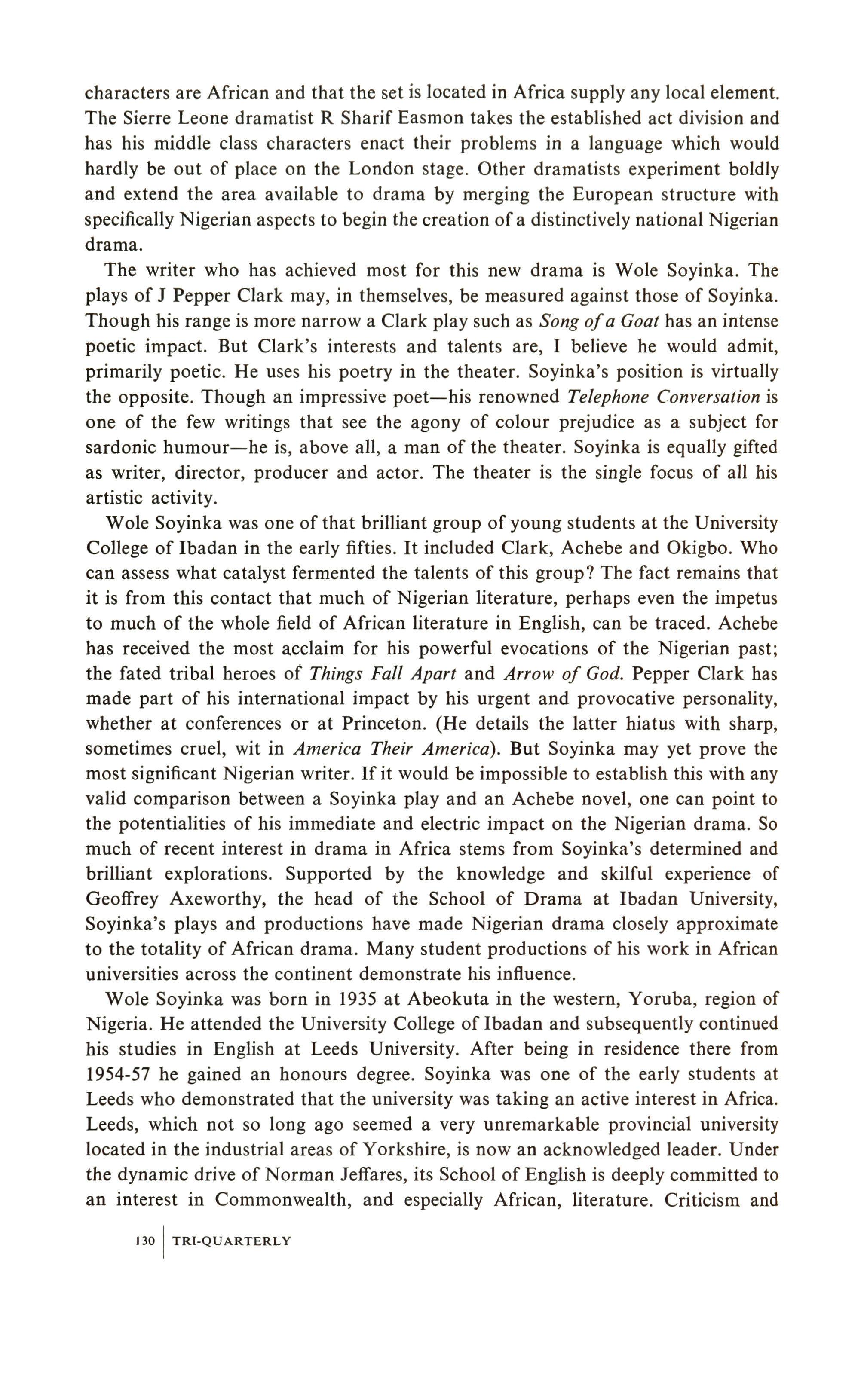
characters are African and that the set is located in Africa supply any local element. The Sierre Leone dramatist R Sharif Easmon takes the established act division and has his middle class characters enact their problems in a language which would hardly be out of place on the London stage. Other dramatists experiment boldly and extend the area available to drama by merging the European structure with specifically Nigerian aspects to begin the creation of a distinctively national Nigerian drama.
The writer who has achieved most for this new drama is Wole Soyinka. The plays of J Pepper Clark may, in themselves, be measured against those of Soyinka. Though his range is more narrow a Clark play such as Song ofa Goat has an intense poetic impact. But Clark's interests and talents are, I believe he would admit, primarily poetic. He uses his poetry in the theater. Soyinka's position is virtually the opposite. Though an impressive poet his renowned Telephone Conversation is one of the few writings that see the agony of colour prejudice as a subject for sardonic humour he is, above all, a man of the theater. Soyinka is equally gifted as writer, director, producer and actor. The theater is the single focus of all his artistic activity.
Wole Soyinka was one of that brilliant group of young students at the University College of Ibadan in the early fifties. It included Clark, Achebe and Okigbo. Who can assess what catalyst fermented the talents of this group? The fact remains that it is from this contact that much of Nigerian literature, perhaps even the impetus to much of the whole field of African literature in English, can be traced. Achebe has received the most acclaim for his powerful evocations of the Nigerian past; the fated tribal heroes of Things Fall Apart and Arrow of God. Pepper Clark has made part of his international impact by his urgent and provocative personality, whether at conferences or at Princeton. (He details the latter hiatus with sharp, sometimes cruel, wit in America Their America). But Soyinka may yet prove the most significant Nigerian writer. If it would be impossible to establish this with any valid comparison between a Soyinka play and an Achebe novel, one can point to the potentialities of his immediate and electric impact on the Nigerian drama. So much of recent interest in drama in Africa stems from Soyinka's determined and brilliant explorations. Supported by the knowledge and skilful experience of Geoffrey Axeworthy, the head of the School of Drama at Ibadan University, Soyinka's plays and productions have made Nigerian drama closely approximate to the totality of African drama. Many student productions of his work in African universities across the continent demonstrate his influence.
Wole Soyinka was born in 1935 at Abeokuta in the western, Yoruba, region of Nigeria. He attended the University College of Ibadan and subsequently continued his studies in English at Leeds University. After being in residence there from 1954-57 he gained an honours degree. Soyinka was one of the early students at Leeds who demonstrated that the university was taking an active interest in Africa. Leeds, which not so long ago seemed a very unremarkable provincial university located in the industrial areas of Yorkshire, is now an acknowledged leader. Under the dynamic drive of Norman Jeffares, its School of English is deeply committed to an interest in Commonwealth, and especially African, literature. Criticism and
J30 TRI-QUARTERLY

creativity are both supported when in a single year Leeds have Professor Eldred Jones of Sierra Leone as visiting professor and East Africa's first promising novelist, James Ngugi, in residence. Perhaps Soyinka's success gave some support to their decision.
While he was in England Soyinka also began professional drama study at the London School of Drama. In 1957 the Royal Court Theater produced his first play The Inventor. This was a significant gesture of approval because at this time the Royal Court was the focus of an exciting new attitude to the theater. The management were determinedly seeking an alternative to the tired and declining tradition of Noel Coward and Terence Rattigan. It was the Royal Court production ofJohn Osborne's Look Back in Anger, which, almost overnight, signalled a new assertion of the potential of the theater. Soyinka was to be part of the opposition to the established popular hit theater.
During the next year in London there was a student production of The Swamp Dwellers, Soyinka's first important play. By 1959, when he returned to his native Nigeria, Soyinka's reputation had preceded him and the University of Ibadan's School of Drama heralded his return with a Soyinka Festival. Productions of The Swamp Dwellers and The Lion and the Jewel not only introduced Soyinka's work to his countrymen, but the response of the Nigerian audience was so enthusiastic that he was established, almost at once, as a figure of consequence on the Nigerian scene.
Those two plays, now included in the Oxford University Press collection Five Plays (1964) exemplify two tones of Soyinka's dramatic writing. His theme is always some aspect of Africa struggling with the social and religious problems arising from the transition from tradition to modernity. Sometimes his tone is cheerfully comic, at others the situation becomes a vehicle for high tragedy.
The Lion and the Jewel is a joyous comedy with a touch of serious social comment. It is similar in tone to Brother Jerro the amusing story of prophet and swindler Brother Jeroboam the Immaculate. The Lion and the Jewel speaks of progress and the bride price, the conflict between western concepts of progress and traditional African custom. By making the conservative patriarch a figure of leonic proportions and by putting the arguments for progress in the mouth of the snivelling and ludicrous school teacher, Soyinka prevents us from judging the alternatives in the usual stereotyped way. The advantages of progress do not seem so unquestionable when they are to create the world visualized by the teacher.
LAKUNLE: We'll burn the forest, cut the trees
Then plant a modern park for lovers
We'll print newspapers every day With pictures of seductive girls.
The world will judge our progress by The girls that will win beauty contests.
Sidi, the jewel, rejects this "book-nourished shrimp" for "the perpetual youthful zest of the panther of the trees." There is satisfaction that she is not taken in by the false standards of misapplied progress.
TRl-QUARTERLY 131
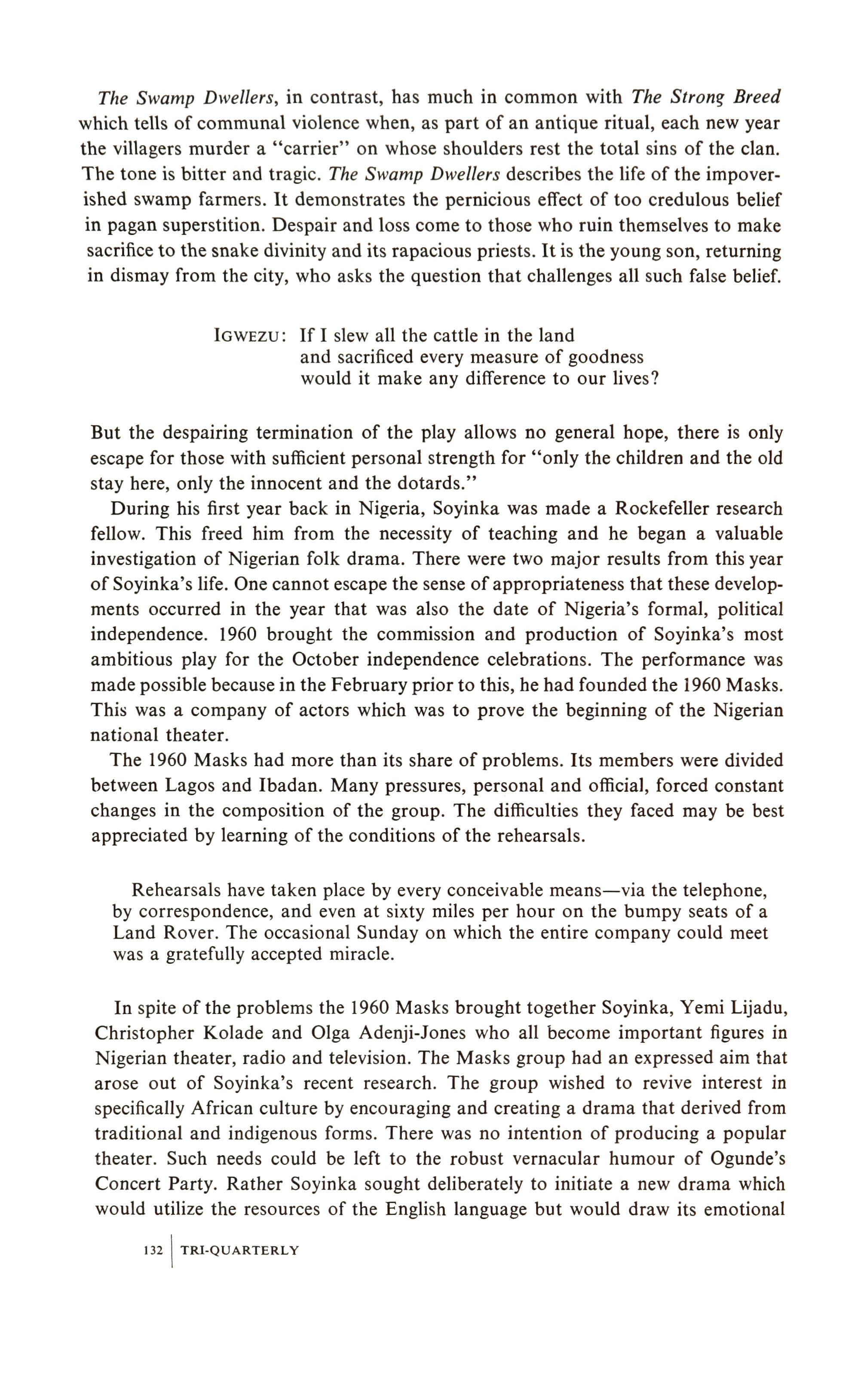
The Swamp Dwellers, in contrast, has much in common with The Strong Breed which tells of communal violence when, as part of an antique ritual, each new year the villagers murder a "carrier" on whose shoulders rest the total sins of the clan. The tone is bitter and tragic. The Swamp Dwellers describes the life of the impoverished swamp farmers. It demonstrates the pernicious effect of too credulous belief in pagan superstition. Despair and loss come to those who ruin themselves to make sacrifice to the snake divinity and its rapacious priests. It is the young son, returning in dismay from the city, who asks the question that challenges all such false belief.
IGWEzu: If I slew all the cattle in the land and sacrificed every measure of goodness would it make any difference to our lives?
But the despairing termination of the play allows no general hope, there is only escape for those with sufficient personal strength for "only the children and the old stay here, only the innocent and the dotards."
During his first year back in Nigeria, Soyinka was made a Rockefeller research fellow. This freed him from the necessity of teaching and he began a valuable investigation of Nigerian folk drama. There were two major results from this year of Soyinka's life. One cannot escape the sense of appropriateness that these developments occurred in the year that was also the date of Nigeria's formal, political independence. 1960 brought the commission and production of Soyinka's most ambitious play for the October independence celebrations. The performance was made possible because in the February prior to this, he had founded the 1960 Masks. This was a company of actors which was to prove the beginning of the Nigerian national theater.
The 1960 Masks had more than its share of problems. Its members were divided between Lagos and Ibadan. Many pressures, personal and official, forced constant changes in the composition of the group. The difficulties they faced may be best appreciated by learning of the conditions of the rehearsals.
Rehearsals have taken place by every conceivable means via the telephone, by correspondence, and even at sixty miles per hour on the bumpy seats of a Land Rover. The occasional Sunday on which the entire company could meet was a gratefully accepted miracle.
In spite of the problems the 1960 Masks brought together Soyinka, Yemi Lijadu, Christopher Kolade and Olga Adenji-Jones who all become important figures in Nigerian theater, radio and television. The Masks group had an expressed aim that arose out of Soyinka's recent research. The group wished to revive interest in specifically African culture by encouraging and creating a drama that derived from traditional and indigenous forms. There was no intention of producing a popular theater. Such needs could be left to the robust vernacular humour of Ogunde's Concert Party. Rather Soyinka sought deliberately to initiate a new drama which would utilize the resources of the English language but would draw its emotional
132 TRI-QUARTERLY
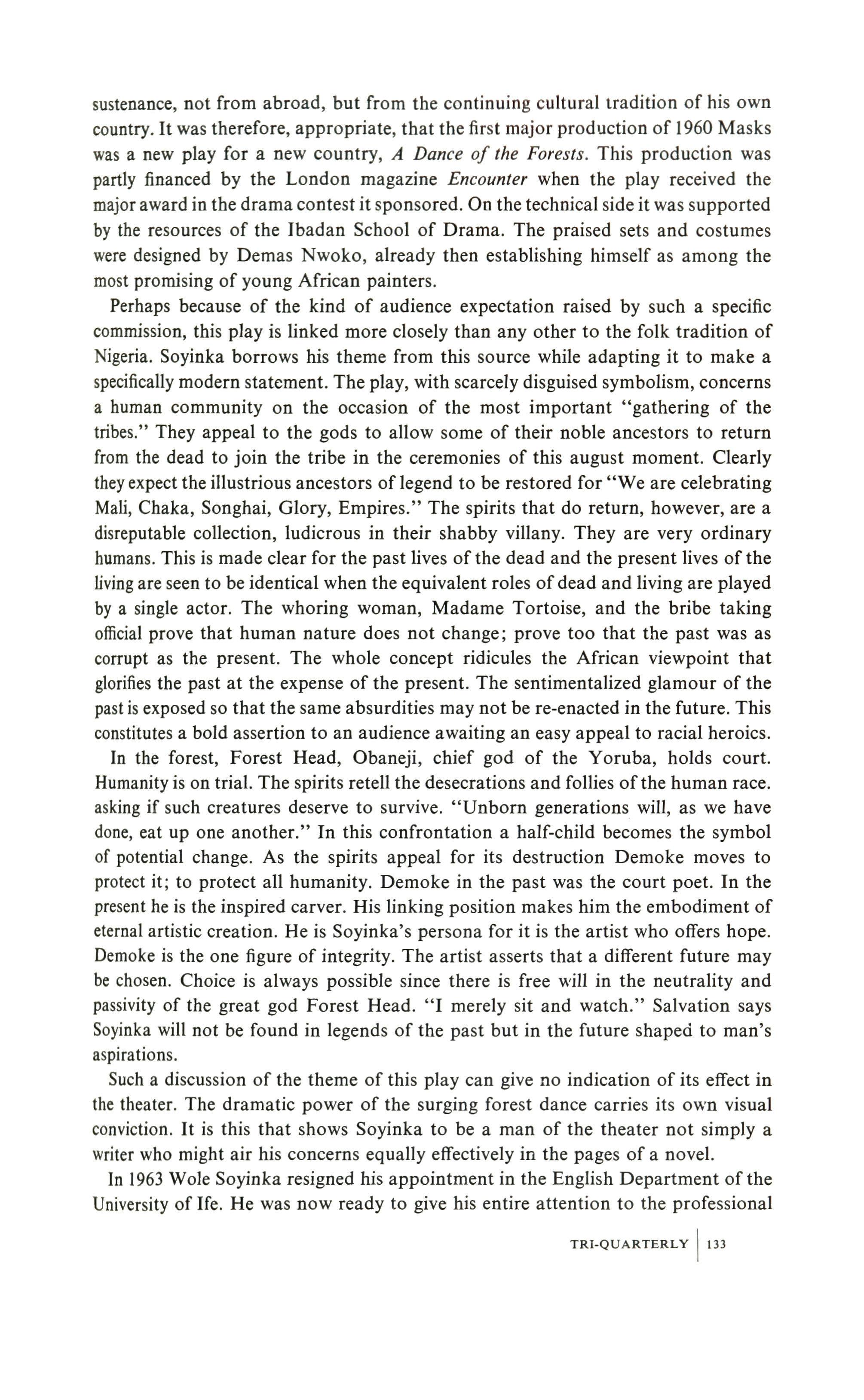
sustenance, not from abroad, but from the continuing cultural tradition of his own country. It was therefore, appropriate, that the first major production of 1960 Masks was a new play for a new country, A Dance of the Forests. This production was partly financed by the London magazine Encounter when the play received the major award in the drama contest it sponsored. On the technical side it was supported by the resources of the Ibadan School of Drama. The praised sets and costumes were designed by Demas Nwoko, already then establishing himself as among the most promising of young African painters.
Perhaps because of the kind of audience expectation raised by such a specific commission, this play is linked more closely than any other to the folk tradition of Nigeria. Soyinka borrows his theme from this source while adapting it to make a specifically modern statement. The play, with scarcely disguised symbolism, concerns a human community on the occasion of the most important "gathering of the tribes." They appeal to the gods to allow some of their noble ancestors to return from the dead to join the tribe in the ceremonies of this august moment. Clearly they expect the illustrious ancestors of legend to be restored for "We are celebrating Mali, Chaka, Songhai, Glory, Empires." The spirits that do return, however, are a disreputable collection, ludicrous in their shabby villany. They are very ordinary humans. This is made clear for the past lives of the dead and the present lives of the living are seen to be identical when the equivalent roles of dead and living are played by a single actor. The whoring woman, Madame Tortoise, and the bribe taking official prove that human nature does not change; prove too that the past was as corrupt as the present. The whole concept ridicules the African viewpoint that glorifies the past at the expense of the present. The sentimentalized glamour of the past is exposed so that the same absurdities may not be re-enacted in the future. This constitutes a bold assertion to an audience awaiting an easy appeal to racial heroics. In the forest, Forest Head, Obaneji, chief god of the Yoruba, holds court. Humanity is on trial. The spirits retell the desecrations and follies ofthe human race. asking if such creatures deserve to survive. "Unborn generations will, as we have done, eat up one another." In this confrontation a half-child becomes the symbol of potential change. As the spirits appeal for its destruction Demoke moves to protect it; to protect all humanity. Demoke in the past was the court poet. In the present he is the inspired carver. His linking position makes him the embodiment of eternal artistic creation. He is Soyinka's persona for it is the artist who offers hope. Demoke is the one figure of integrity. The artist asserts that a different future may be chosen. Choice is always possible since there is free will in the neutrality and passivity of the great god Forest Head. "I merely sit and watch." Salvation says Soyinka will not be found in legends of the past but in the future shaped to man's aspirations.
Such a discussion of the theme of this play can give no indication of its effect in the theater. The dramatic power of the surging forest dance carries its own visual conviction. It is this that shows Soyinka to be a man of the theater not simply a writer who might air his concerns equally effectively in the pages of a novel.
In 1963 Wole Soyinka resigned his appointment in the English Department of the University of Ife. He was now ready to give his entire attention to the professional
TRI-QUARTERLY 133
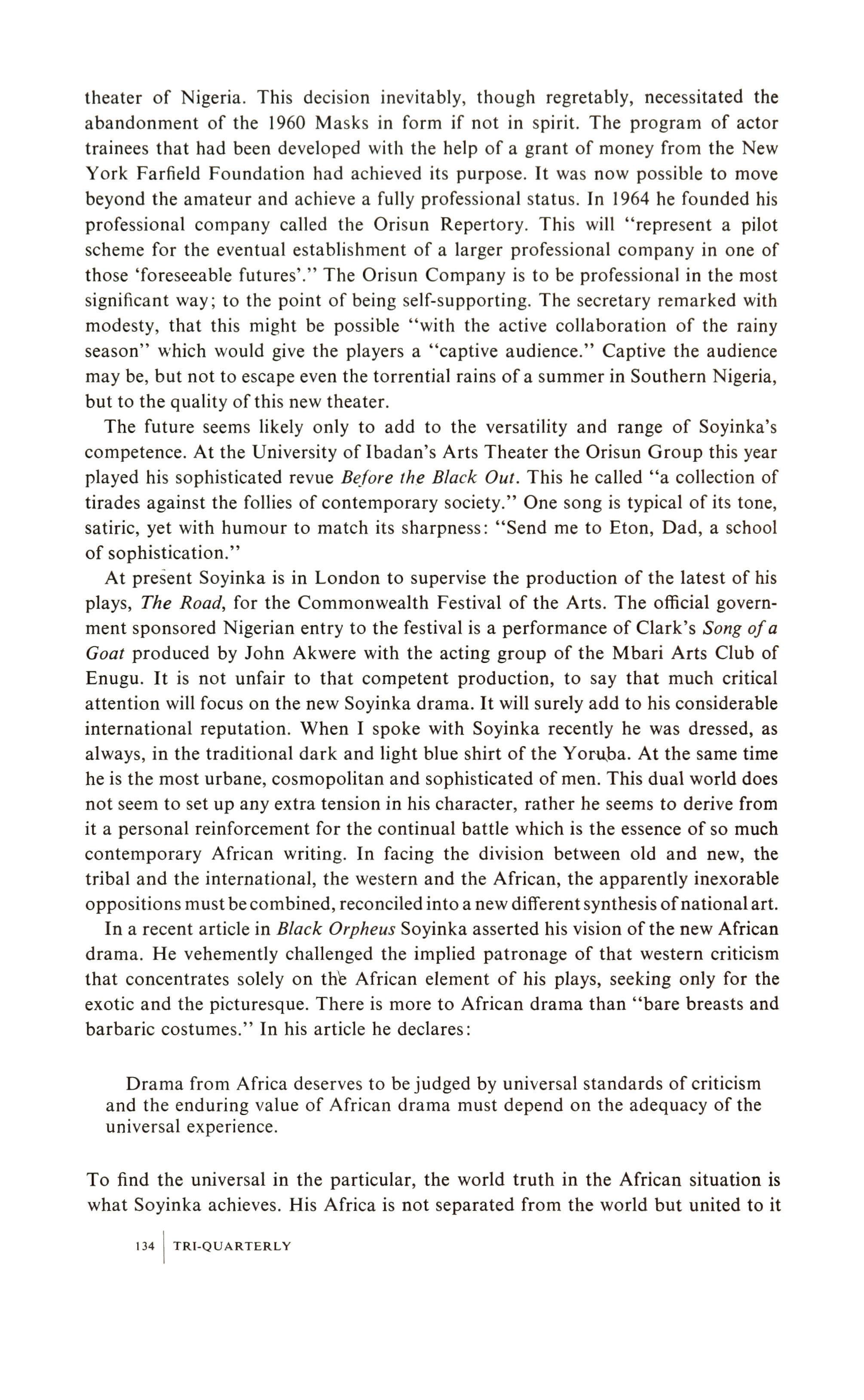
theater of Nigeria. This decision inevitably, though regretably, necessitated the abandonment of the 1960 Masks in form if not in spirit. The program of actor trainees that had been developed with the help of a grant of money from the New York Farfield Foundation had achieved its purpose. It was now possible to move beyond the amateur and achieve a fully professional status. In 1964 he founded his professional company called the Orisun Repertory. This will "represent a pilot scheme for the eventual establishment of a larger professional company in one of those 'foreseeable futures'." The Orisun Company is to be professional in the most significant way; to the point of being self-supporting. The secretary remarked with modesty, that this might be possible "with the active collaboration of the rainy season" which would give the players a "captive audience." Captive the audience may be, but not to escape even the torrential rains of a summer in Southern Nigeria, but to the quality of this new theater.
The future seems likely only to add to the versatility and range of Soyinka's competence. At the University of Ibadan's Arts Theater the Orisun Group this year played his sophisticated revue Before the Black Out. This he called "a collection of tirades against the follies of contemporary society." One song is typical of its tone, satiric, yet with humour to match its sharpness: "Send me to Eton, Dad, a school of sophistication."
At present Soyinka is in London to supervise the production of the latest of his plays, The Road, for the Commonwealth Festival of the Arts. The official government sponsored Nigerian entry to the festival is a performance of Clark's Song of a Goat produced by John Akwere with the acting group of the Mbari Arts Club of Enugu. It is not unfair to that competent production, to say that much critical attention will focus on the new Soyinka drama. It will surely add to his considerable international reputation. When I spoke with Soyinka recently he was dressed, as always, in the traditional dark and light blue shirt of the Yoruba. At the same time he is the most urbane, cosmopolitan and sophisticated of men. This dual world does not seem to set up any extra tension in his character, rather he seems to derive from it a personal reinforcement for the continual battle which is the essence of so much contemporary African writing. In facing the division between old and new, the tribal and the international, the western and the African, the apparently inexorable oppositions must be combined, reconciled into a new different synthesis ofnational art.
In a recent article in Black Orpheus Soyinka asserted his vision of the new African drama. He vehemently challenged the implied patronage of that western criticism that concentrates solely on the African element of his plays, seeking only for the exotic and the picturesque. There is more to African drama than "bare breasts and barbaric costumes." In his article he declares:
Drama from Africa deserves to be judged by universal standards of criticism and the enduring value of African drama must depend on the adequacy of the universal experience.
To find the universal in the particular, the world truth in the African situation is what Soyinka achieves. His Africa is not separated from the world but united to it
134 TRI-QUARTERLY
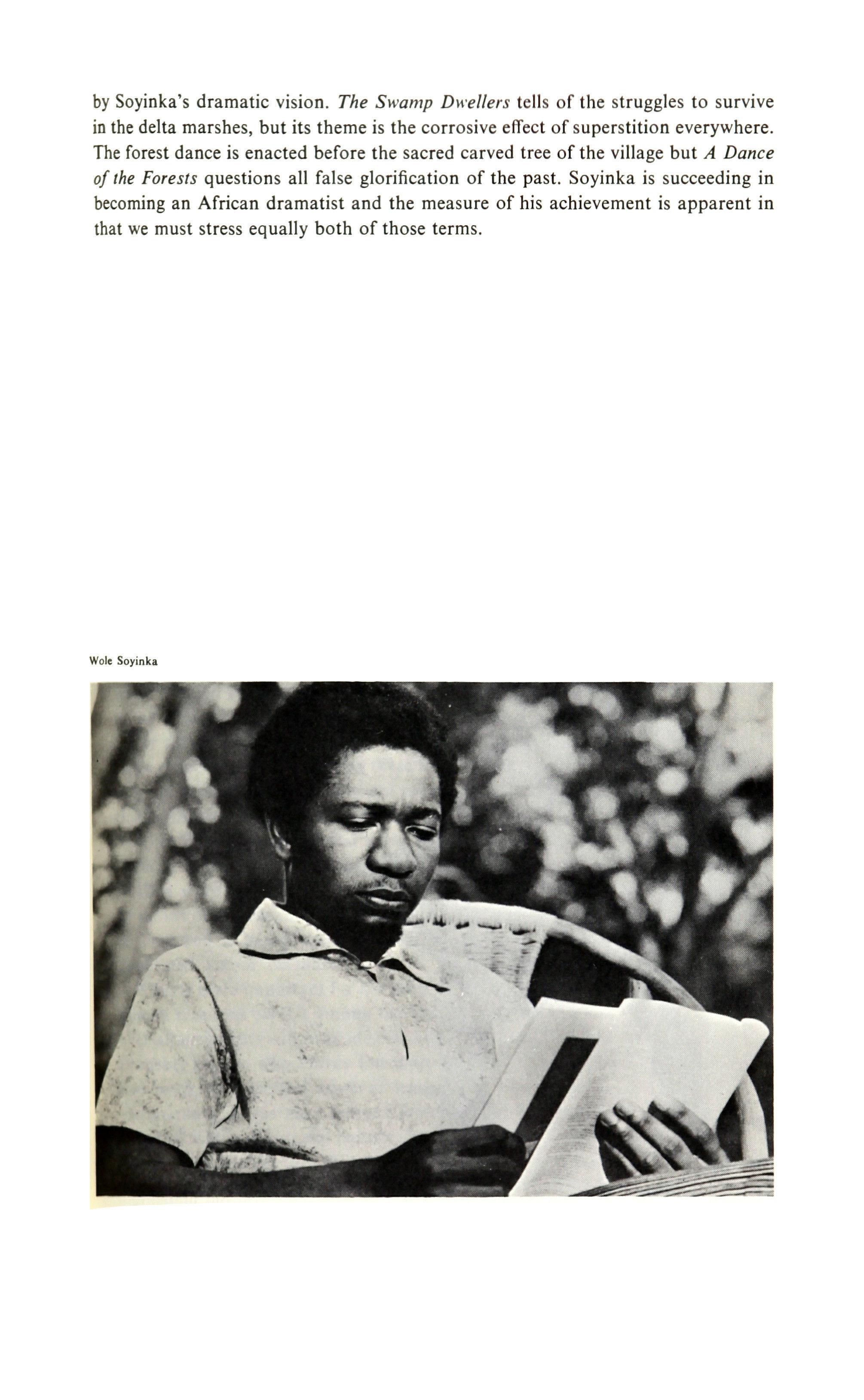
by Soyinka's dramatic vision. The Swamp Dwellers tells of the struggles to survive in the delta marshes, but its theme is the corrosive effect of superstition everywhere. The forest dance is enacted before the sacred carved tree of the village but A Dance of the Forests questions all false glorification of the past. Soyinka is succeeding in becoming an African dramatist and the measure of his achievement is apparent in that we must stress equally both of those terms.
Wole Soyinka
.", ."-
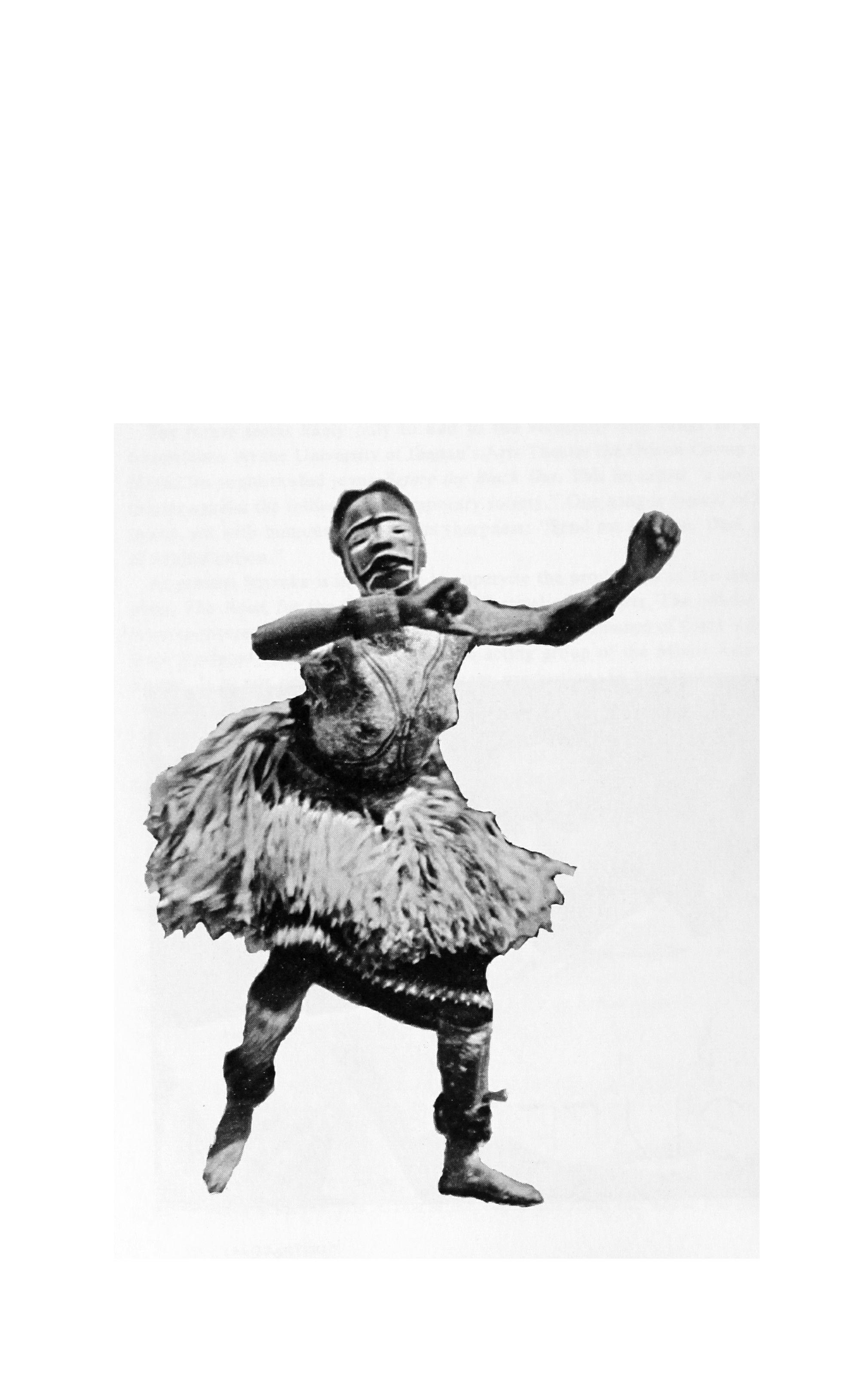
Guineaislll
ROBERT PLANT ARMSTRONG

OWEVER UNCERTAIN we may be about what art is, in any philosophical sense, we know with a certainty that not even the most determined questioner can shake or obscure certain pertinent facts about it. We know that there are only given classes of things and events from which works of art come those invested with feeling or belief, probably always by the creators and hopefully most of the time by their audiences. We know, therefore, that feeling or belief is intended to be connected with these performances in line, shape, color, volume, sound, movement, or word. Finally, we know that some of the products of these means depict something in the physical universe while others do not.
For these reasons we may say that we are concerned here with African art or more properly arts. Concerning these arts it is important to point out that whether they are depictions or not, they are representations. The reason for this is our view that fabrication in each ofthe arts proceeds from one simp e metaphoric base peculiar to it. In music, narrative, and verse, time is fractioned into rhythm by tones and stresses, by incidents, by images. Sculpture, architecture, and drawing and painting fraction space by volumes, by lines, by colors. Dance exploits both time and space by means of successive volumes. In each case the irreducible metaphor lies in space or time and is based upon the assumption that reality or super-reality can be duplicated and/or extended.
What is more important for the purposes of this essay is our knowledge that such human creations exhibit among the innumerable members of each class definable, over-all similarities within an identifiable geographical area and within a given epoch. Probably anyone who knows European art can recognize and attribute to its time and place, in a general sense at least, the medieval statue of a Christian saint. Furthermore, as we have learned from such large movements as Classicism and Romanticism in European culture, two additional conditions are true about such products. First, there exist differing ways ofperceiving and consequently ofexpressing the world about one through the mediation of metaphors; and second, there is an over-all orchestration among the metaphors of the various classes of such works, so TRI-QUARTERLY 137
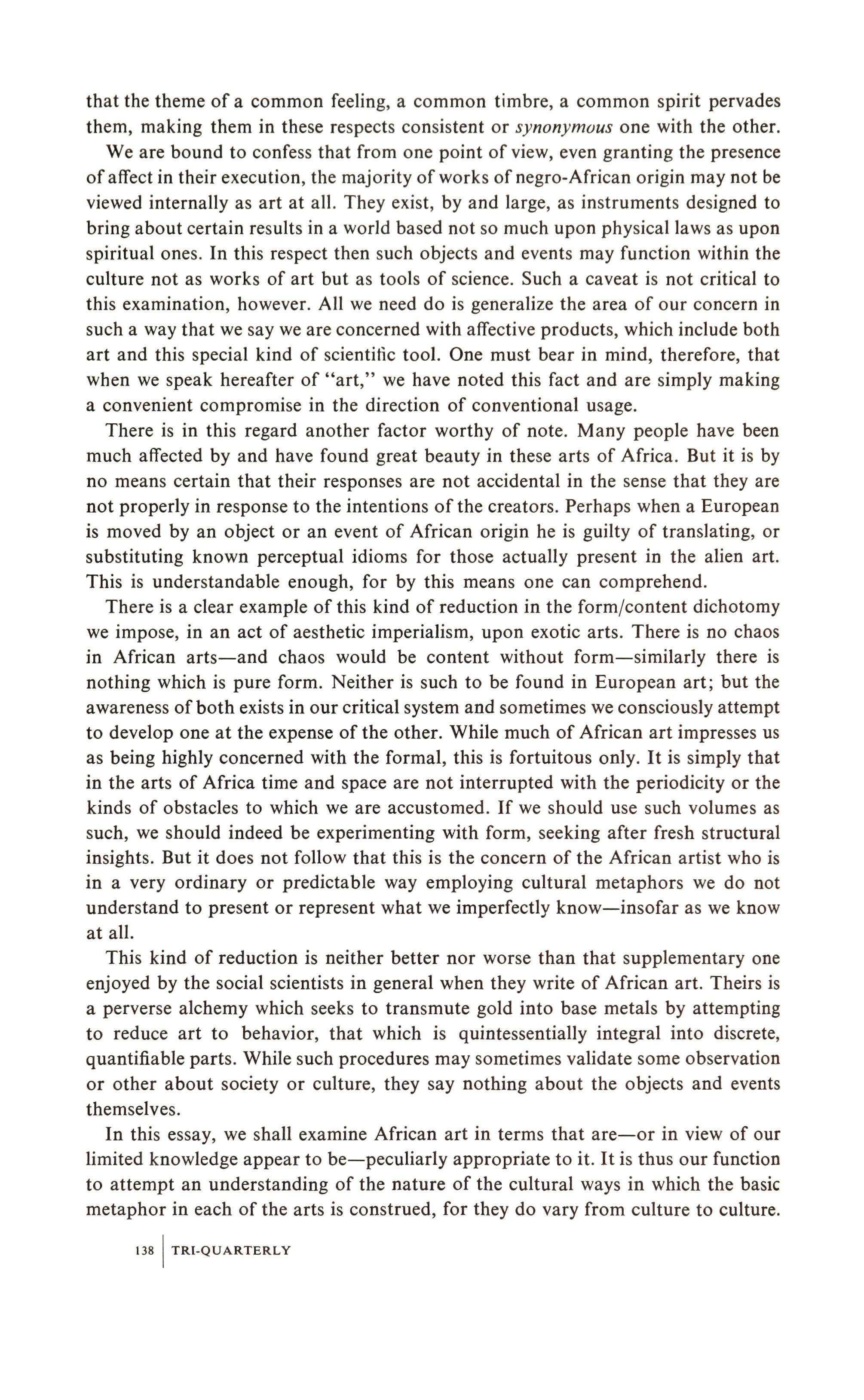
that the theme of a common feeling, a common timbre, a common spirit pervades them, making them in these respects consistent or synonymous one with the other. We are bound to confess that from one point of view, even granting the presence of affect in their execution, the majority of works of negro-African origin may not be viewed internally as art at all. They exist, by and large, as instruments designed to bring about certain results in a world based not so much upon physical laws as upon spiritual ones. In this respect then such objects and events may function within the culture not as works of art but as tools of science. Such a caveat is not critical to this examination, however. All we need do is generalize the area of our concern in such a way that we say we are concerned with affective products, which include both art and this special kind of scientific tool. One must bear in mind, therefore, that when we speak hereafter of "art," we have noted this fact and are simply making a convenient compromise in the direction of conventional usage.
There is in this regard another factor worthy of note. Many people have been much affected by and have found great beauty in these arts of Africa. But it is by no means certain that their responses are not accidental in the sense that they are not properly in response to the intentions of the creators. Perhaps when a European is moved by an object or an event of African origin he is guilty of translating, or substituting known perceptual idioms for those actually present in the alien art. This is understandable enough, for by this means one can comprehend.
There is a clear example of this kind of reduction in the form/content dichotomy we impose, in an act of aesthetic imperialism, upon exotic arts. There is no chaos in African arts and chaos would be content without form similarly there is nothing which is pure form. Neither is such to be found in European art; but the awareness of both exists in our critical system and sometimes we consciously attempt to develop one at the expense of the other. While much of African art impresses us as being highly concerned with the formal, this is fortuitous only. It is simply that in the arts of Africa time and space are not interrupted with the periodicity or the kinds of obstacles to which we are accustomed. If we should use such volumes as such, we should indeed be experimenting with form, seeking after fresh structural insights. But it does not follow that this is the concern of the African artist who is in a very ordinary or predictable way employing cultural metaphors we do not understand to present or represent what we imperfectly know insofar as we know at all.
This kind of reduction is neither better nor worse than that supplementary one enjoyed by the social scientists in general when they write of African art. Theirs is a perverse alchemy which seeks to transmute gold into base metals by attempting to reduce art to behavior, that which is quintessentially integral into discrete, quantifiable parts. While such procedures may sometimes validate some observation or other about society or culture, they say nothing about the objects and events themselves.
In this essay, we shall examine African art in terms that are or in view of our limited knowledge appear to be peculiarly appropriate to it. It is thus our function to attempt an understanding of the nature of the cultural ways in which the basic metaphor in each of the arts is construed, for they do vary from culture to culture. 138 TRI-QUARTERLY

The first statements will be purely descriptive of these metaphors. Subsequently we shall attempt to make a synthetic and interpretive statement based upon the relationships of equivalence that obtain among the arts, all bespeaking the existence of a common system of affect. In this view, the arts are different but the same.
But we shall not be concerned with all the arts. In the first place there is little of painting in Africa, and traditional literature presents too great difficulties due to the fact that it exists in a language we do not know, although we shall want to comment ultimately upon the English language novel. But chiefly, we shall consider sculpture, music, and dance all dominant African arts. They are representative of each of the elementary media space, time, and space-and-time. There is further logic to studying these three arts since each of them projects the body image.
Further, we may not study all of Africa, since it is too vast and of too great diversity. Also, we cannot most meaningfully study even part of Africa out of the context of any other place in the world. Accordingly, we shall examine West Coast Africa the large western bulge of the continent which has previously been identified as a culture area, called Guinea Coast, demonstrating among its various cultures certain common features of society, rite, and artifact. In addition, we shall proceed by making contrastive statements about the sculpture, music, and dance of Java. In effect, we shall have the benefit of a third comparison, for inevitably there will be in our minds the facts, as we know them, of European arts. For all three arts we shall attempt to discern that overriding orchestration of a commonality of themethat identity of affect which makes it possible, for example, to recognize that which is Romantic in Romantic music, an identity based upon the operation of common values, common perceptions, and common modes of expressing them.
Since we may not wander about in time, we shall be concerned to study the recent traditional, excluding, save for the novel, modern expressions which have been subject to intensive acculturative influences in Africa and Java from Europe, in Europe from Africa.
Finally, it is critically important to bear in mind the fact that to proceed it is necessary to write at the highest possible level of generalization. Such procedure inevitably entails much particular exclusion. But the task here is to write of sculpture, music, and dance in such a way that what is said will be generally true. The objective is to provide for Guinea Coast arts, and in passing for Javanese arts, descriptions and interpretations that are true at or greater than the level of the "movements" defined for European arts.
Sculpture is abundant in Guinea Coast Africa, so abundant as to exist in profligacy, a response to and a symbol of the seminality of the religion. Far and away the greatest numbers of the sculptural forms are created for instrumental purposes dictated by the worship of the ancestors and gods.
The sculptured forms are primarily figures and masks, made mostly of wood, although some metal is used, and a small amount of work is done in earth. In the interest of both generalization and brevity, we shall concern ourselves only with figures.
* * * *
TRI-QUARTERLY 139

Bodies are not executed with any marked interest in naturalistic depiction, and the space which has been exploited for the figure is disrupted with intervals different from those one encounters in European art. Further, the characteristics of the interrupting volumes themselves are radically different as well. The predominating scheme of spatial interruption is vertical. Length or height is the overwhelming spatial interval, and these linear volumes are divided into the head, large in proportion to the rest of the body; the generally narrow trunk whose length is emphasized to the point where its relationship to reality is in no real sense factual; and the legs, which are shorter than life, are flexed, and have bulk incommensurate with their height.
The volumes tend to be developed into strong columns. The head rests upon a columnar neck; the neck in turn rests upon the columns of the trunk, slightly molded ventrally, and dorsally composed of two positive columns and one intervening
Baoule ancestral figure
From the collection of Robert P. Armstrong
Photo: John Putnam
negative column representing the spine, which is inevitably inverted. Columns constitute the legs, and the arms as well, which frequently are close to the bodyat the sides, or resting on the abdomen. But skeletality is not emphasized at the expense of muscularity; although there is no accuracy of muscular detail, there is little doubt that the bones are fleshed or that cavities contain their organs. The sacrifice of horizontality lends thrust to the bodies. They are always forcefully intruded into their space, a dynamic which gives secondary assertion to the force they initially assert by virtue of their purpose with respect to the commemoration or management of power.
In Java one must extricate from the bewildering wealth of sculptures (great deities, incredible bas-reliefs in stone) the wayang puppets as the chief viable traditional form. Executed fancifully, these wayang are made either of leather or of wood. Since they are mechanical being articulated at shoulder and elbow in both leather and wood and in wood at the head as well they interrupt space with greater rhythmic complexity than the sculptures of the Guinea Coast. The head of the wayang is also large in proportion to the most often long, thin trunk. Legs are relatively short, while the arms are invariably long.
These volumes also tend toward the columnar, but the interest in musculature is minimal. Indeed in Java it is the bone itself that seems to count. Further, finial details abound in these puppets the fingers, the wrists, the elbows, the shoulders, even the toes. The figures are radically decentralized. Everything pushes toward the periphery.
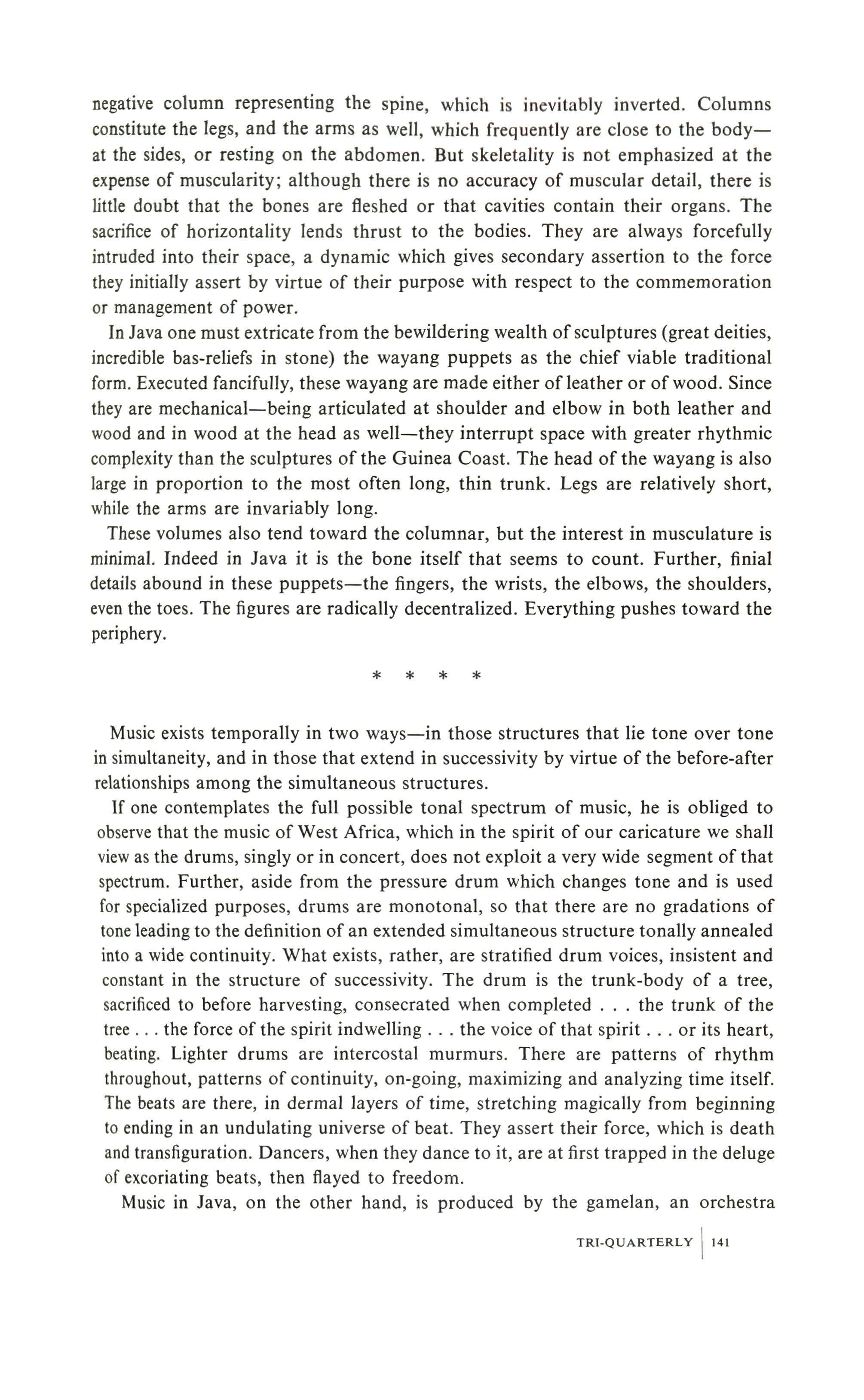
Music exists temporally in two ways in those structures that lie tone over tone in simultaneity, and in those that extend in successivity by virtue of the before-after relationships among the simultaneous structures.
If one contemplates the full possible tonal spectrum of music, he is obliged to observe that the music of West Africa, which in the spirit of our caricature we shall view as the drums, singly or in concert, does not exploit a very wide segment of that spectrum. Further, aside from the pressure drum which changes tone and is used for specialized purposes, drums are monotonal, so that there are no gradations of tone leading to the definition of an extended simultaneous structure tonally annealed into a wide continuity. What exists, rather, are stratified drum voices, insistent and constant in the structure of successivity. The drum is the trunk-body of a tree, sacrificed to before harvesting, consecrated when completed the trunk of the tree the force of the spirit indwelling the voice of that spirit or its heart, beating. Lighter drums are intercostal murmurs. There are patterns of rhythm throughout, patterns of continuity, on-going, maximizing and analyzing time itself. The beats are there, in dermal layers of time, stretching magically from beginning to ending in an undulating universe of beat. They assert their force, which is death and transfiguration. Dancers, when they dance to it, are at first trapped in the deluge of excoriating beats, then flayed to freedom.
Music in Java, on the other hand, is produced by the gamelan, an orchestra
TRI-QUARTERLY 141
* * * *
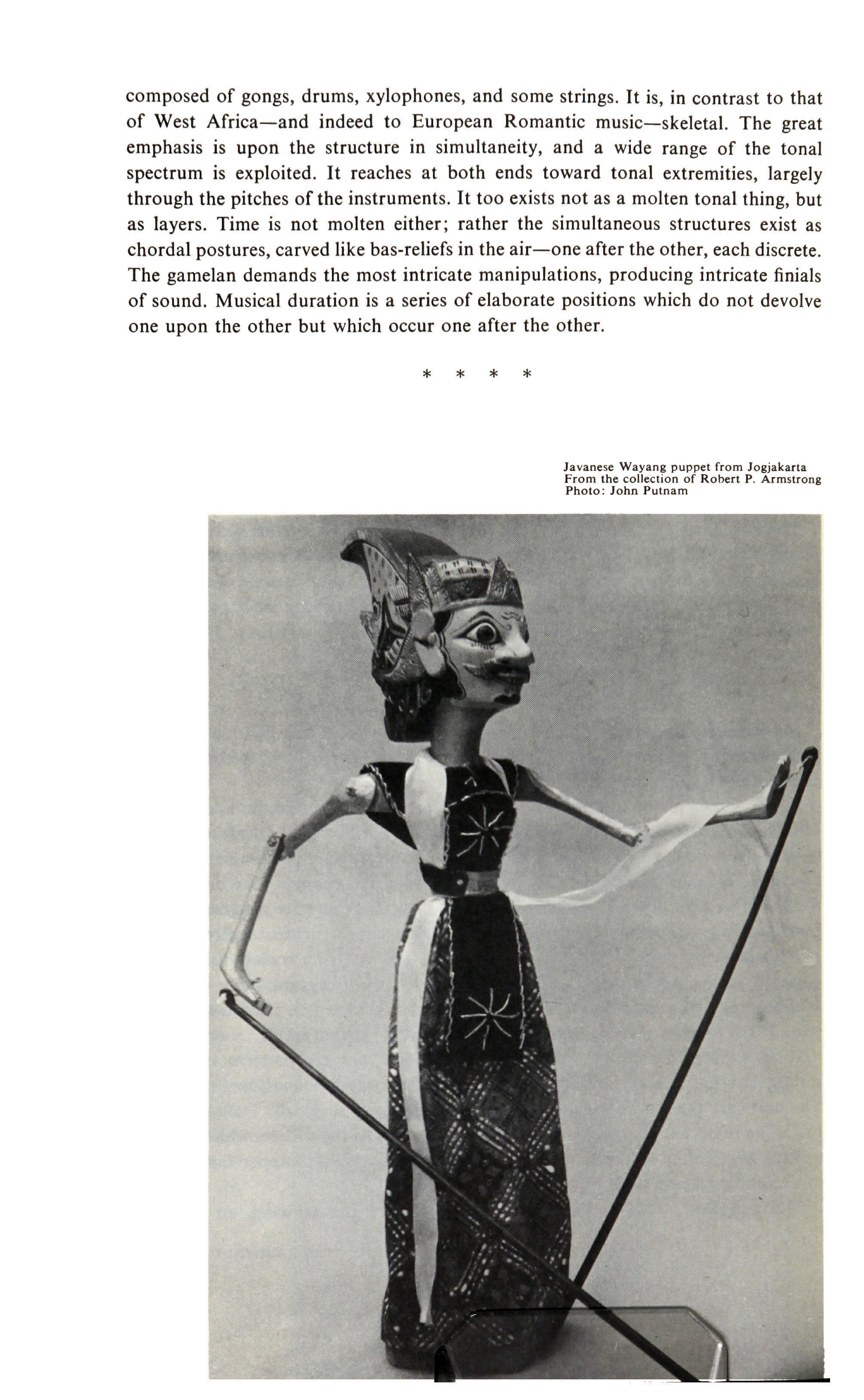
composed of gongs, drums, xylophones, and some strings. It is, in contrast to that of West Africa and indeed to European Romantic music skeletal. The great emphasis is upon the structure in simultaneity, and a wide range of the tonal spectrum is exploited. It reaches at both ends toward tonal extremities, largely through the pitches of the instruments. It too exists not as a molten tonal thing, but as layers. Time is not molten either; rather the simultaneous structures exist as chordal postures, carved like bas-reliefs in the air one after the other, each discrete. The gamelan demands the most intricate manipulations, producing intricate finials of sound. Musical duration is a series of elaborate positions which do not devolve one upon the other but which occur one after the other.
* * * *
Javanese Wayang puppet from Jogjakarta From the collection of Robert P. Armstrong
Photo: John Putnam
In both West Africa and Java the presentation of the body in the structures of simultaneity is like the presentation in sculpture. The structure in successivity exhibits the same characteristics as the music.
In West Africa the dance is the thrust of the head, shoulders, and trunk, with minimal interest in hands and feet as instruments of dance expression. The body itself is the instrument, with its roundnesses and its columnar volumes thrust into motion shoving, retreating, shoving, yielding, shoving and throughout rotations of hips and upper arms frame the trunk itself. Movement is not fluid, so that as in tone there is little of gradation from one thing into the other. But time is nonetheless continuously exploited. There is little of straightforward narrative development duration and thrust are all. Development is rhythmic, and rhythm, which is intrinsic to the calling of the gods, must be viewed as force, visceral, vital. Dance in Java, on the contrary, is all finials the head, the hands, and the feet, even to the execution of movements with the great toes, are all intricately moved. It is a succession of postures, maximally extending the body's extremities in space, as with the wayang. All the extremities are variables one position, one structure of music; another structure, a shift in the variables and another movement. The body is ends and angles, stressing not soft viscera or strong muscles, but exploiting articulation of the skeleton as such. Durationally, the principle of successivity is thus, like the music, chordal. But also there is narrative development, for dancers enact ancient tales.
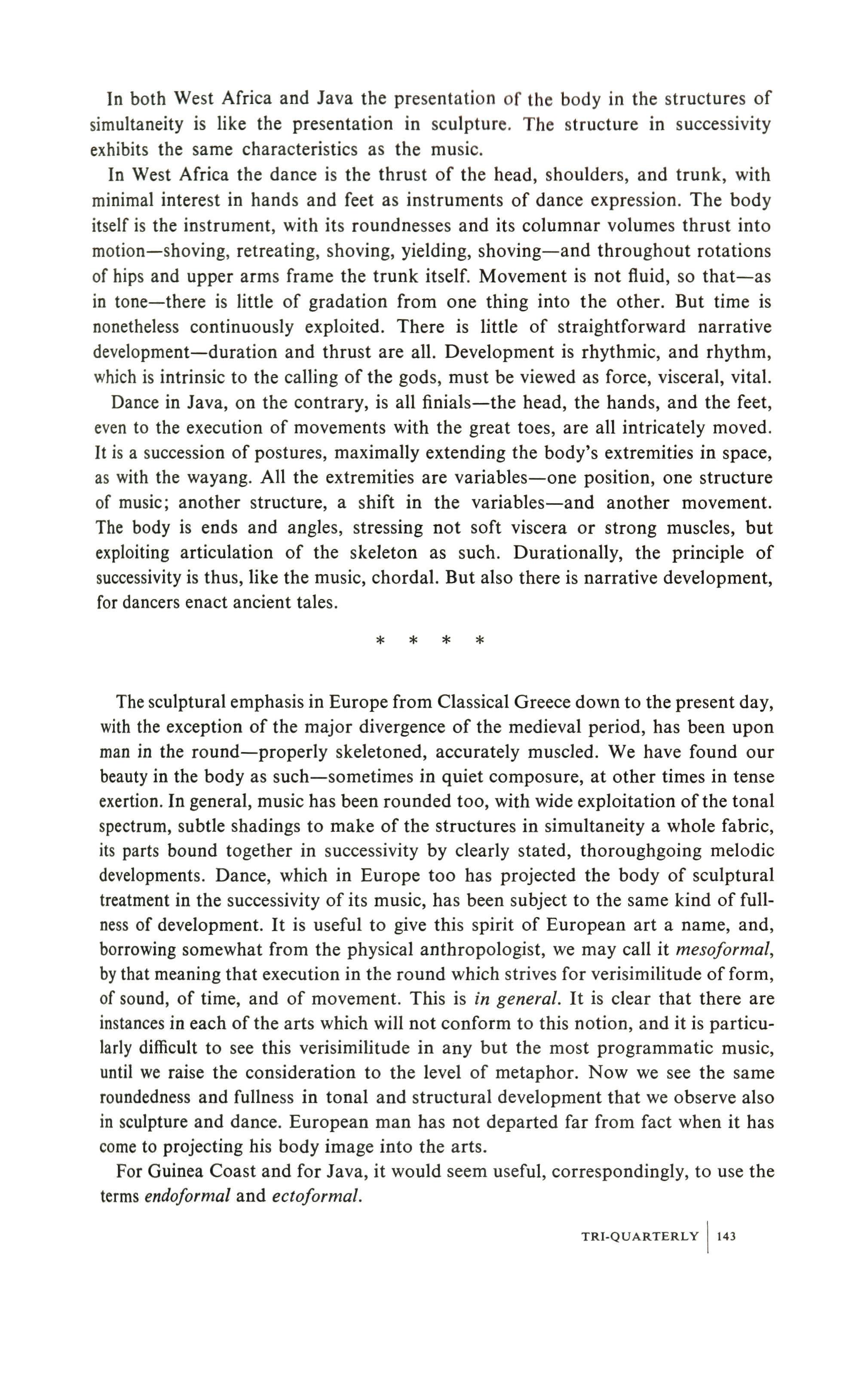
The sculptural emphasis in Europe from Classical Greece down to the present day, with the exception of the major divergence of the medieval period, has been upon man in the round properly skeletoned, accurately muscled. We have found our beauty in the body as such sometimes in quiet composure, at other times in tense exertion. In general, music has been rounded too, with wide exploitation of the tonal spectrum, subtle shadings to make of the structures in simultaneity a whole fabric, its parts bound together in successivity by clearly stated, thoroughgoing melodic developments. Dance, which in Europe too has projected the body of sculptural treatment in the successivity of its music, has been subject to the same kind of fullness of development. It is useful to give this spirit of European art a name, and, borrowing somewhat from the physical anthropologist, we may call it mesoformal, by that meaning that execution in the round which strives for verisimilitude of form, of sound, of time, and of movement. This is in general. It is clear that there are instances in each of the arts which will not conform to this notion, and it is particularly difficult to see this verisimilitude in any but the most programmatic music, until we raise the consideration to the level of metaphor. Now we see the same roundedness and fullness in tonal and structural development that we observe also in sculpture and dance. European man has not departed far from fact when it has corne to projecting his body image into the arts.
For Guinea Coast and for Java, it would seem useful, correspondingly, to use the terms endoformal and ectoformal.
* * * *
TRI-QUARTERLY 143
Inherent in the descriptions we have made is a system of metaphor equivalents. For Guinea Coast Africa the truncal emphasis of the sculpture may be seen as synonymous with the relatively narrow range of tonal exploitation and the columnar execution of the sculptural forms as synonymous with the intensive development of musical time a through thrust. The swerve and assertion of the shoulders, thorax, abdomen, and hips in the dance is clearly the execution in motion of the same principles. It is all close, economic, truncal.
In Javanese arts, the sculptural exploitation of the extremities of the human figure is metaphorically the synonym of wide tonal development, and the articulation of the wayangs, producing highly formalized posturism, is related to the marked chordal structure of the music, to the fact that there is no usurpation of time's continuity, with the effect that the radical exploitation of continuity in African musical time is absent. In the dance the articulation of the head upon the neck, the arms and legs at each joint, and even the fingers and toes all this is the quintessential expression of interest in distality, in the virtuosity of exhausting structure-in-articulation as such.
We may assume that there are systems of attitudes in each of these cultures which would appear to be related to the cultural art metaphors. Mesoformalism may thus be viewed as a projection of western humanism into the arts, with that humanism's stress upon the value of the individual, fully rounded and realized, from viscera to extremities interposed into the world.
Ectoformalism, with its distality and phasal discontinuity, would seem to correspond to certain features and values ofJavanese life. The ideal is the Javanese man, halus (fine), formal and elegant in conduct and demeanor. Intensive socialization of the individual is sought, so that he becomes submerged in a sea of roles. The expression of feeling is individual and is therefore perhaps less commonly to be found than in other places in the world. Indeed, the Balinese dance is criticized by the Javanese as being "too emotional." Other people are treated distally. They are kept, as it were, at arm's length.
Endoformalism, equally, fits with what one feels of West African life. Continuity in the arts is reinforced with the continuity of existence, from ancestors to babes. Further, this continuity is expressed continuously, so that it, like music, is structured both in simultaneity and in successivity, ancestors to future, now and forevermore. Relationships are quickly made, and they are warm. Life is a matter of head, of heart, and frankly of guts. Life is thrusts in act of procreation, in fullness of harvests shoved from the earth, in the drumming possessions of the gods.
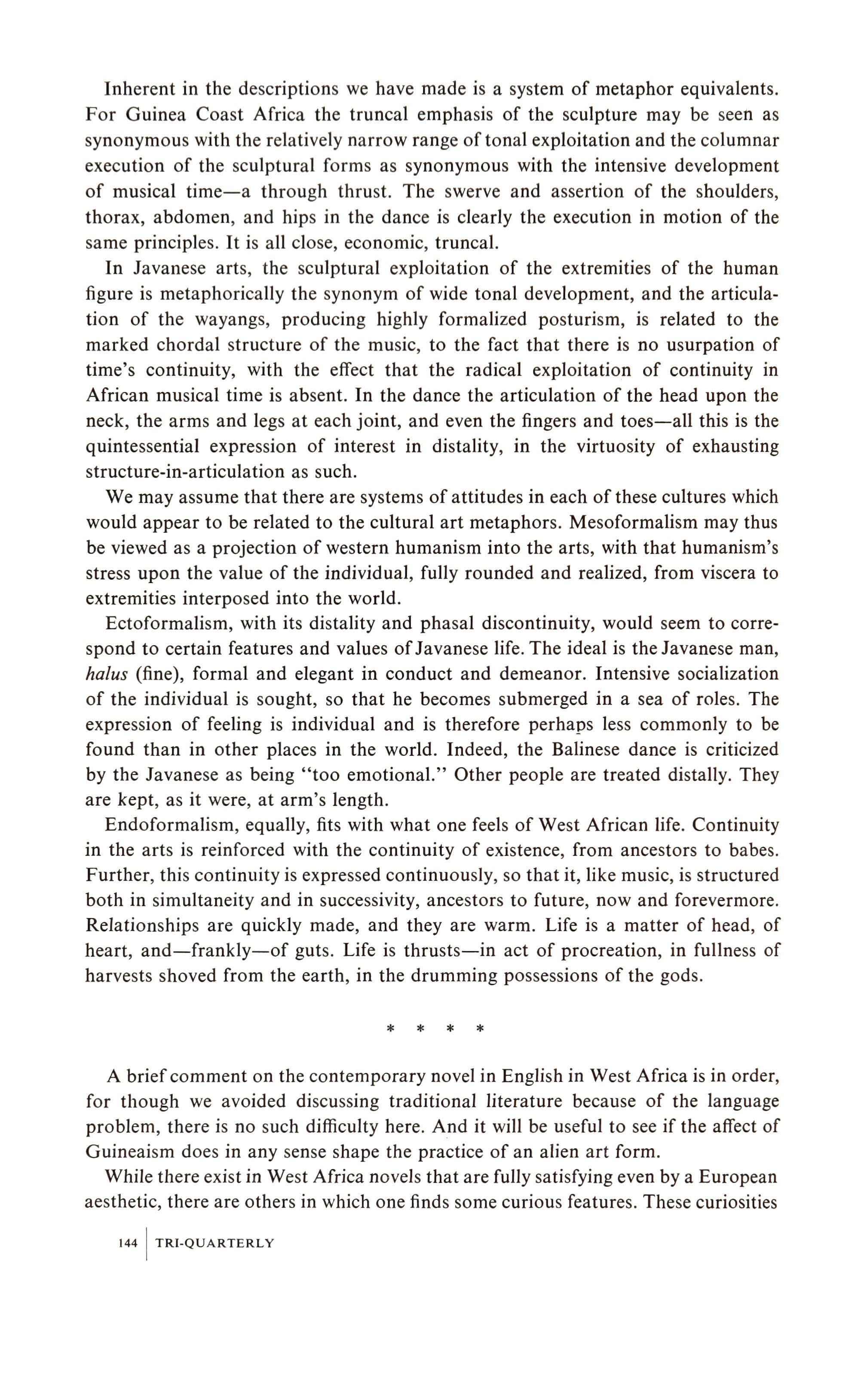
A brief comment on the contemporary novel in English in West Africa is in order, for though we avoided discussing traditional literature because of the language problem, there is no such difficulty here. And it will be useful to see if the affect of Guineaism does in any sense shape the practice of an alien art form.
While there exist in West Africa novels that are fully satisfying even by a European aesthetic, there are others in which one finds some curious features. These curiosities
* * *
144
TRI-QUARTERLY
must either be considered, from our point of view, as blemishes in the practice of the novel, or else they must be examined and explained in the frame of reference of another aesthetic. The former approach has been followed, both in reviews and in the conversation of informed people. The latter has not, in any meaningful way, been attempted.
There are two practices to be considered. The first pertains to the tendency, present in varying degrees in all the novels, to depict characters in such a way that the European reader finds them without believable dimensionality. They exist, in a word, as types, and as wooden. The second factor is the common presence of a structure lacking the dramatic build the European is accustomed to witnessing. This latter tendency is particularly noticeable in the endings, which often appear to be contrived rather than integral.
It is not impossible to speculate, in terms of the aesthetic of endoformalism, that lack of individuation in characters is affectively related to the practice of exploiting narrow ranges and of avoiding distality which is intrinsically manipulative and thus of significance in character delineation. These shadowy actors of the novels are in fact reminiscent of the generalization of the carvings, a generalization deriving from the concern with force and its representation through truncal emphasis. Indeed, with such preoccupation portraiture is difficult, and when individuation is necessary, it is in effect "written" in scars upon the trunk or face of the sculpture.
The curiosities of dramatic structure relate functionally to this. Shallow characters do not act in full emotion or full reason. But there is another factor as well. The absence of mounting, believably evolved, and integrated dramatic structure is possibly related also to that attitude toward the exploitation of time one sees in both music and dance. Further, the ultimate logical referents are, in the Guinea Coast arts, external to the works themselves, since the works are instrumental. Accordingly, density of action would be sufficient in itself, and dramatic evolution, as long as it is minimally sufficient, is sacrificed to an external in this case socialpurpose.

We have isolated some of the metaphors that inform the arts of Java and Guinea Coast Africa, and we have suggested their inter-art synonymity. It is perfectly possible that others might see differently. It is also possible that we have perceived what we will rather than what exists. This is a methodological limitation that is in fact inherent in all interpretations of foreign cultures done by those who are not native to lifelong enculturation in perceiving and expressing.
But the feeling persists that what we have observed derives not from the inventions of the author but from the nature of the works. The system of inter-art equivalents seems further to validate anyone of its terms. Guineaism is robust; it is forceful, deriving its vigor from the thrusting exploitation of short ranges, whether in simulating the body in wood or word, in manipulating it in space, or in providing musical accompaniment for it in time. It is not that breadth of range is not of interest, but that the short spectrum is. Durationality, which in the final view may be regarded
* * *
145
TRI-QUARTERLY

as the consummate symbol of force and vigor, is positively sought through the minute and continuous analysis of time, and the insistent statement of long volumes. There is little doubt that, unless affective systems change more quickly than one has any reason to suspect, these elements of the aesthetic of endoformalism will long inform and determine the most important affective production of Guinea Coast Africa. Glimpsing something of it, we shall be the better equipped to perceive.
EUGENIA MACER
Some shattering act defines the whole, some bottom plank yanked out to bring the lot of the pile down like rain and spread it out to be jig-sawed.
Facts are absolutely too correlated modern-wise to be worth much simply stacked without a madness.
Birds or geese, or blue-eyed rabbits remain unessential when seen under porches.
146
TRI-QUARTERLY

o The perils of Prosody: Configurations of the corrternpor-az-y voice
PETER MICHELSON
Harvey Gross, Soundand Form in Modern Poetry, Univ. of Michigan Press (Ann Arbor, 1964), $8.50.
Joseph Langland, The Wheel ofSummer, The Dial Press (New York, 1963), $3.50.
A. R. Ammons, Corsons Inlet, Cornell Univ. Press (Ithaca, 1965), $3.95.
John William Corrington, Lines to the South and Other Poems, Louisiana State University Press (Baton Rouge, 1965), $3.50.
"Obviously," Harvey Gross tells us in a chapter entitled "Prosody as Rhythmic Cognition," "Obviously we must expand our concept of 'meaning' to include rhythmic cognition if we admit prosody as an important structural element in poetry." And thereby hangs the tale. One does not wish to be intimidated by Mr. Gross' vocabulary, assumptions, or technique, but the effect of his dialetic of the "obvious," the statement of his prosodic theory, is such that one is rather intimidated than enlightened. "A poem," he says, "is a symbol in which idea, experience, and attitude are transmuted into feelings; these feelings move in significant arrangements: rhythmically." By defining a poem as a symbol he allows himself to discuss poetic rhythm in the diffuse, speculative, and often ambiguous vocabulary of symbolism. We should not forget that symbolism and poetry are quite distinct, however much the one may employ the other. There is, after all, an art of poetry; there is no art of symbolism. To transfer the terms of the one to the terms of the other, then, is to confuse the relation of prosody to poetry, of sound to form. And that is the Peril of Prosody. The next proposition in Mr. Gross' dialectic, for instance, is stated thus:
Rhythmic structure, like all aesthetic structure, is a symbolic form, signifying the ways we experience organic processes and the phenomena of nature. We speak of the rhythm of life: the curve of human develop-
ment up from birth, through growth, and down to decay and death. These are not elements in a pattern of simple recurrence. They form patterns of expectation and fulfillment; birth prepares us for each succeeding stage of human development, but no stage merely repeats the stage which precedes it. All process, human or natural, thus has characteristic rhythm.
Rhythm has now evolved from poetic form through symbolic form, through the natural order, and has become at last "process." And so, by equating prosody with rhythmic cognition and rhythmic cognition with symbolic structure, Mr. Gross has turned prosody into an analogy for the energy of the universe. It is as if we are being led willy nilly to the conclusion that only God can make a tree.
What then is the function of prosody? Not unexpectedly, "the function of prosody is to image, in a rich and complex way, human process as it moves in time." At this point prosody has taken on an almost incomprehensible synthesis of psychic, historic, and symbolic qualities. These are conceived, in Mr. Gross' theory, finally as epistemological:
The view I take is that meter, and prosody in general, is itself meaning. Rhythm is neither outside of a poem's meaning nor an ornament to it. Rhythmic structures are expressive forms, cognitive elements, communicating those experiences which rhythmic consciousness can alone communicate: empathic human responses to time in its passage.
But his theory is not easily to be got at: "Prosody is an aural symbolism, a significant arrangement ofacoustical phenomena." And what are the "acoustical phenomena"? "The acoustic arrangements of meter are images of time shaped and charged by human feeling." But whether or not one finds such language clear, at this level of generalization (perhaps jargon) we are pretty remote from useful prosodic discussion. And if prosody is not a useful art, it is no art at all.
Mr. Gross is at his best when he dispenses with theorizing and gets on with prosodic TRI-QUARTERLY
147
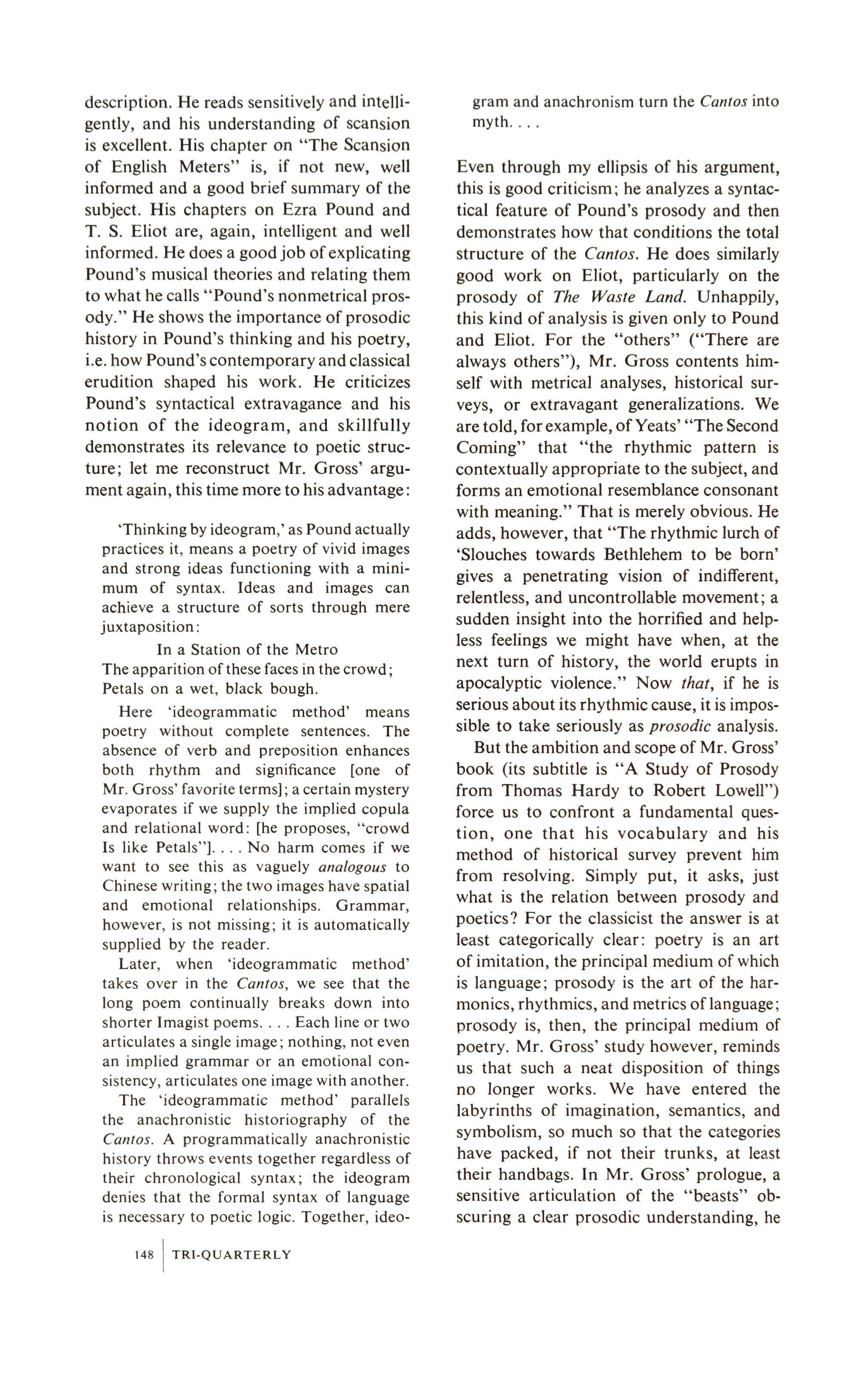
description. He reads sensitively and intelligently, and his understanding of scansion is excellent. His chapter on "The Scansion of English Meters" is, if not new, well informed and a good brief summary of the subject. His chapters on Ezra Pound and T. S. Eliot are, again, intelligent and well informed. He does a good job of explicating Pound's musical theories and relating them to what he calls "Pound's non metrical prosody." He shows the importance of prosodic history in Pound's thinking and his poetry, i.e. how Pound's contemporary and classical erudition shaped his work. He criticizes Pound's syntactical extravagance and his notion of the ideogram, and skillfully demonstrates its relevance to poetic structure; let me reconstruct Mr. Gross' argument again, this time more to his advantage:
'Thinking by ideogram,' as Pound actually practices it, means a poetry of vivid images and strong ideas functioning with a minimum of syntax. Ideas and images can achieve a structure of sorts through mere juxtaposition:
In a Station of the Metro
The apparition of these faces in the crowd; Petals on a wet, black bough.
Here 'ideogrammatic method' means poetry without complete sentences. The absence of verb and preposition enhances both rhythm and significance [one of Mr. Gross' favorite terms]; a certain mystery evaporates if we supply the implied copula and relational word: [he proposes, "crowd Is like Petals"] No harm comes if we want to see this as vaguely analogous to Chinese writing; the two images have spatial and emotional relationships. Grammar, however, is not missing; it is automatically supplied by the reader.
Later, when 'ideogrammatic method' takes over in the Cantos, we see that the long poem continually breaks down into shorter Imagist poems Each line or two articulates a single image; nothing, not even an implied grammar or an emotional consistency, articulates one image with another.
The 'ideogrammatic method' parallels the anachronistic historiography of the Cantos. A programmatically anachronistic history throws events together regardless of their chronological syntax; the ideogram denies that the formal syntax of language is necessary to poetic logic. Together, ideo-
gram and anachronism turn the Cantos into myth
Even through my ellipsis of his argument, this is good criticism; he analyzes a syntactical feature of Pound's prosody and then demonstrates how that conditions the total structure of the Cantos. He does similarly good work on Eliot, particularly on the prosody of The Waste Land. Unhappily, this kind of analysis is given only to Pound and Eliot. For the "others" ("There are always others"), Mr. Gross contents himself with metrical analyses, historical surveys, or extravagant generalizations. We are told, for example, of Yeats' "The Second Coming" that "the rhythmic pattern is contextually appropriate to the subject, and forms an emotional resemblance consonant with meaning." That is merely obvious. He adds, however, that "The rhythmic lurch of 'Slouches towards Bethlehem to be born' gives a penetrating vision of indifferent, relentless, and uncontrollable movement; a sudden insight into the horrified and helpless feelings we might have when, at the next turn of history, the world erupts in apocalyptic violence." Now that, if he is serious about its rhythmic cause, it is impossible to take seriously as prosodic analysis.
But the ambition and scope of Mr. Gross' book (its subtitle is "A Study of Prosody from Thomas Hardy to Robert Lowell") force us to confront a fundamental question, one that his vocabulary and his method of historical survey prevent him from resolving. Simply put, it asks, just what is the relation between prosody and poetics? For the classicist the answer is at least categorically clear: poetry is an art of imitation, the principal medium of which is language; prosody is the art of the harmonics, rhythmics, and metrics of language; prosody is, then, the principal medium of poetry. Mr. Gross' study however, reminds us that such a neat disposition of things no longer works. We have entered the labyrinths of imagination, semantics, and symbolism, so much so that the categories have packed, if not their trunks, at least their handbags. In Mr. Gross' prologue, a sensitive articulation of the "beasts" obscuring a clear prosodic understanding, he
148 TRI-QUARTERLY

suggests that, "perhaps the title of this book should be Examples of Style in Modem Prosody. Style in art, as Whitehead remarks, 'is the fashioning of power, the restraining of power' in other words, control." To expand prosodic concerns to stylistic concerns is considerably more useful to readers of modern poetry. Contemporary poets are after, to use Joseph Langland's phrase, "the contemporary voice." Which is to say they are after a style appropriate to the expression of the contemporary aesthetic imagination. Rhythm, harmony and meter no longer mean what they meant. And so they no longer pose the same problems. As Mr. Gross points out, "it seems absurd to discuss the metric of lines like these" (of Cummings): "(im) c-a-t(mo) / b,i;l:e / FalllleA / ps !fl / OattumblI And the achievements of such poets as Whitman, Hopkins, Eliot and Cummings have shifted the emphasis from what we might call the grammatical problems of prosody to the rhetorical problems of prosody. The primary technical problem for the contemporary poet is not what meter or rhythm to write in, that will be greater or lesser according to his personal skills; the problem is locating the precise figure to convey his emotional and thematic statement. Eliot's articulation of the principle of the "objective correlative" has been the key to this, of course. Since then, the primary problem for the poet is to find the object (i.e. figure) which will most effectively correlate the poet's subjective emotion with that of his audience. Allen Ginsberg comes to poetic (or stylistic) terms with his anguish through the use of the Kaddish as a rhetorical figure (i.e. object), and his sense of Hebraic rhythm, language, harmony, etc., in that poem follows from and is subordinate to that figure. The same is true of Gregory Corso's ironic use of the "emblem" figure in "Bomb"; what is more appropriate than that he should call upon 'tradition' for an emblem, currently fashioned, of its own self-destruction? Or we have the more "respectable" example of Robert Lowell's Life Studies, where the low key "prosody" of the whole volume is determined by the unifying and pervasive figure of reflection.
We need not multiply examples. The point is that the facts of contemporary poetry tell us that modern prosody does indeed include style, and the central problem of contemporary style is using figures of thought (e.g. metaphor or irony) to convey and control rhythmic and imagistic structure.
Not long ago a famous editor of a famous poetry magazine lamented in conversation that the new poets didn't write like Yeats. I think he must have meant two things; that contemporary prosody, the sense of rhythm, harmony, and meter, no longer centers on the traditionally well wrought unit (i.e. verse, couplet, stanza, etc.) and that contemporary rhetoric, the sense of imagery and figures, has turned from an apocalyptical to a social mythology for its "topics." Jospeh Langland, A. R. Ammons, and John William Corrington do not "write like Yeats." The phrase "contemporary voice" is Langland's, but it applies to the poetic styles of all three. They are from three different "generations," but all of them write simultaneously for the same generation. And so the range of their poetry gives us some sense of how perspectives from different generations turn the contemporary experience into the contemporary voice.
Mr. Langland is of that generation for which Cleanth Brooks' The Well- Wrought Urn might be considered the critical paradigm. But the emphasis on craftsmanship, so characteristic of Brooks, is suffused by the central quality of Mr. Langland's poetry, its prophecy. Not that he foretells the future, but rather that he captures the pathos of experience that unifies human nature and, more importantly, turns it to song. This, his singing, gives magnitude to what might otherwise be a precious preoccupation with form. "Ecclesiastes," an early poem from his first book, The Green Town, will demonstrate:
ECCLESIASTES
Out of the icy storms the white hare came Shivering into a haven of human arms; It was not love but fear that made him tame.
TRI-QUARTERLY 149

He lay in the arms of love, having no name But comfort to address. Shaking alarms Out of the icy storms, the white hare came
Across the haunted meadows crackling with game.
What evil eye pinpointed his soft charms? It was not love but fear. That made him tame
Among the chilling hail and scattering aim. Helpless against the sport of ancient farms, Out of the icy storms the white hare came
Thinking, perhaps, it leaped through icy flame,
Thinking, with instinct, hate or trust disarms. It was not love. But fear that made him tame
Leaped again in his heart; his flesh became Translated into havens. From sudden harms Out of the icy storms the white hare came; I t was not love but fear that made him tame.
The basic sestina form has been modified by turning the elaborate rotation of line endings into the more simple aba rhyme pattern of each stanza. The returning rhymes act as a refrain, something again not characteristic of the sestina, and the refrain tends to suffuse the poem, giving it the effect of incantation. But working through the incantatory tone is the narrative image of the white hare "shaking alarms Out of the icy storms." That image is rhythmically punctuated by the gnome, "It was not love but fear that made him tame"; the subtle rhythmic variations effected by the syntactic revisions of the statement give this refrain a kind of choric effect. So that the image has two parts, the narrative image of the hare running into the arms of what one supposes to be the hunter himself, and the choric image chanting the prophecy of his motivation ("It was not love but fear "). So structured, the image is turned into a metaphor (figure) ironically comparing the Ecclesiastical law ("Fear God, and keep his commandments: for this is the whole duty of man.") with the Natural Law (" having no name / But comfort to address"). One feels that this poem must have started with the image of the hare, which became also an image of fear. As the poem took shape, as its figurative character materialized, the poet seems 150 TRI-QUARTERLY
to have called upon literary tradition for the sestina form and the Biblical tradition for theme. But his figurative sense was the crucial thing; it revised the sestina form to effect the incantatory tone, i.e. give it the quality of song, and it structured the ironic Biblical metaphor equating religious motive and animal fear. Thus it is the figurative sense that enables him to turn traditional stylistic and thematic materials into "the contemporary voice."
This poem, I think, presents the conditions of Mr. Langland's particular genius. His subjects deal with the pathos of experience (there is little or no humor; his wit takes rather the form of profound irony), and he uses the narrative mode, but his narrative is given the quality of song (e.g, the incantation in "Ecclesiastes"); the story itself expands into metaphor, and the song quality provides the levitation necessary for prophecy. One senses the prophecy, then, not of the prophet but rather of the story teller.
This stylistic character is most ambitiously and significantly presented in the cycle of "Sacrifice" poems which are the basis of his most recent volume, The Wheel of Summer. The cycle presents a naturalistic dialectic of sacrifice. Jt records the moral experience of a young boy, presumably the poet himself, as it is recollected (to alter a phrase) in the resignation of a later and more mature understanding. It might be described technically as a series of tales (tale rather than story, because tale suggests a more elliptical and lyrical manner) about the necessary destructiveness of experience, the thematic statements of which are made by the narrator's retrospective point of view and manner of telling the tale as much as they are by the tales themselves. The sacrifice image is, of course, the unifying figure of the cycle, which is resolved in the wheel figure of the title poem. Each tale of sacrifice is another confirmation of the destructive rhythm of life. The sacrifices are either natural or moral, suggesting the two kinds of universal law. The natural sacrifice describes a natural catastrophe beyond the control or ken of man; the concluding stanza of "Sacrifice of a Flock of Sheep" will demonstrate:
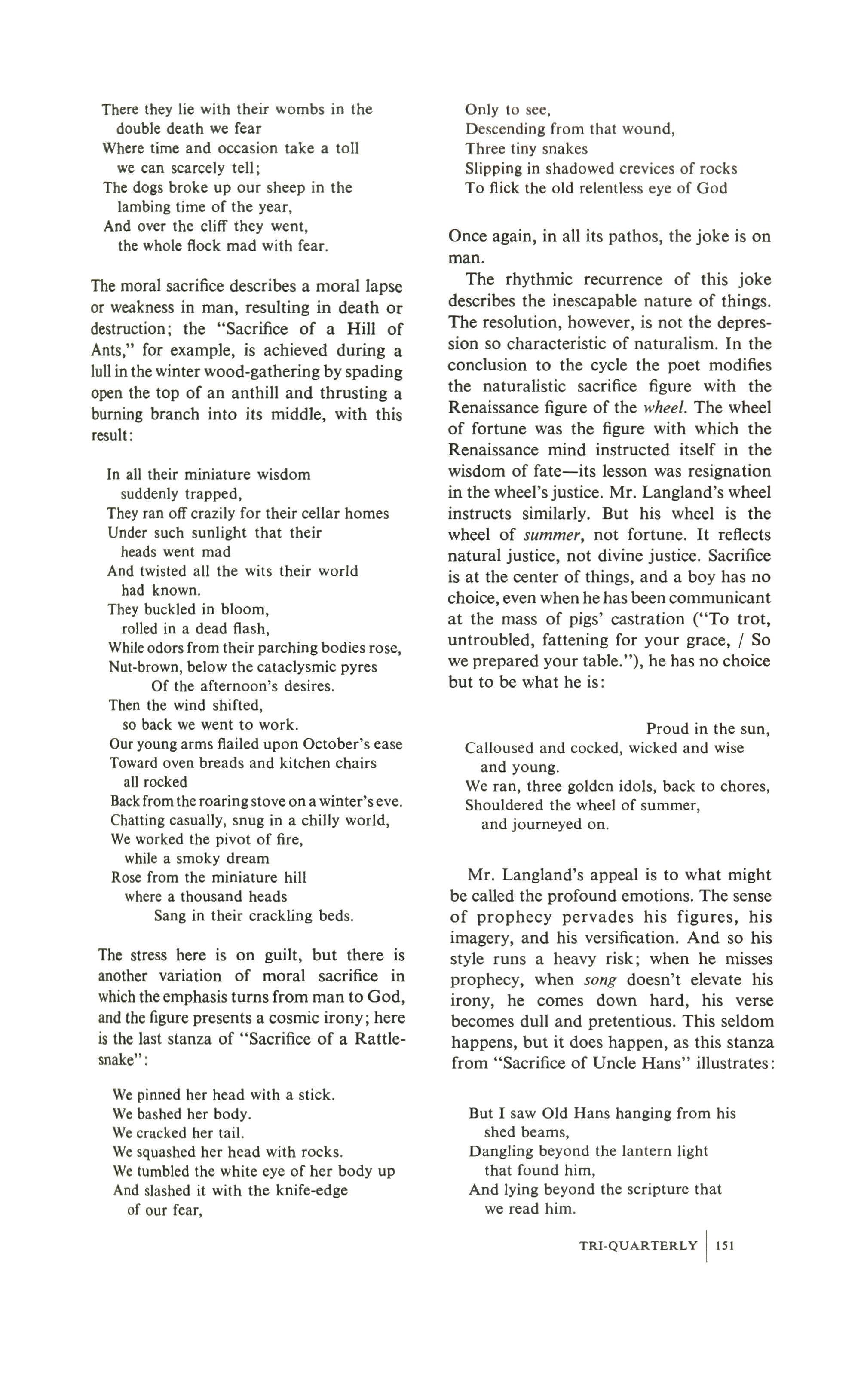
There they lie with their wombs in the double death we fear Where time and occasion take a toll we can scarcely tell; The dogs broke up our sheep in the lambing time of the year, And over the cliff they went, the whole flock mad with fear.
The moral sacrifice describes a moral lapse or weakness in man, resulting in death or destruction; the "Sacrifice of a Hill of Ants," for example, is achieved during a lull in the winter wood-gatheringby spading open the top of an anthill and thrusting a burning branch into its middle, with this result:
In all their miniature wisdom suddenly trapped, They ran off crazily for their cellar homes Under such sunlight that their heads went mad And twisted all the wits their world had known.
They buckled in bloom, rolled in a dead flash, While odors from their parching bodies rose, Nut-brown, below the cataclysmic pyres Of the afternoon's desires. Then the wind shifted, so back we went to work.
Our young arms flailed upon October's ease Toward oven breads and kitchen chairs all rocked
Back from the roaring stove on a winter's eve. Chatting casually, snug in a chilly world, We worked the pivot of fire, while a smoky dream Rose from the miniature hill where a thousand heads Sang in their crackling beds.
The stress here is on guilt, but there is another variation of moral sacrifice in which the emphasis turns from man to God, and the figure presents a cosmic irony; here is the last stanza of "Sacrifice of a Rattlesnake" :
We pinned her head with a stick.
We bashed her body.
We cracked her tail. We squashed her head with rocks. We tumbled the white eye of her body up And slashed it with the knife-edge of our fear,
Only to see, Descending from that wound, Three tiny snakes
Slipping in shadowed crevices of rocks
To flick the old relentless eye of God
Once again, in all its pathos, the joke is on man.
The rhythmic recurrence of this joke describes the inescapable nature of things. The resolution, however, is not the depression so characteristic of naturalism. In the conclusion to the cycle the poet modifies the naturalistic sacrifice figure with the Renaissance figure of the wheel. The wheel of fortune was the figure with which the Renaissance mind instructed itself in the wisdom of fate its lesson was resignation in the wheel's justice. Mr. Langland's wheel instructs similarly. But his wheel is the wheel of summer, not fortune. It reflects natural justice, not divine justice. Sacrifice is at the center of things, and a boy has no choice, even when he has been communicant at the mass of pigs' castration ("To trot, untroubled, fattening for your grace, / So we prepared your table."), he has no choice but to be what he is:
Proud in the sun, Calloused and cocked, wicked and wise and young.
We ran, three golden idols, back to chores, Shouldered the wheel of summer, and journeyed on.
Mr. Langland's appeal is to what might be called the profound emotions. The sense of prophecy pervades his figures, his imagery, and his versification. And so his style runs a heavy risk; when he misses prophecy, when song doesn't elevate his irony, he comes down hard, his verse becomes dull and pretentious. This seldom happens, but it does happen, as this stanza from "Sacrifice of Uncle Hans" illustrates:
But I saw Old Hans hanging from his shed beams, Dangling beyond the lantern light that found him, And lying beyond the scripture that we read him.
TRI-QUARTERLY 151

Some think it isn't so, but he sleeps soundly. (St. Paul and the others tried, but they didn't know Uncle Hans.)
It is this kind of risk, I think, that younger poets are concerned with, especially those like A. R. Ammons and John William Corrington whose styles are much more verbally and syntactically facile than Langland's.
Ammons appeals to what we might call the "turbulent" emotions, and he encounters his own risk, the tendency to tour de force. The figure central to nearly all of Ammons' recent book, Corsons Inlet, is the rhythm of natural forces the ebb and flow of tides, winter and spring flights of birds, the rotation of seasons, etc. While this elaborate rhythmic metaphor maintains an attachment to sensible objects (i.e. to images) it is the key to Mr. Ammons' turbulent lyricism. This passage from "Four Motions for the Pea Vines," for instance, represents the spring growth of new peas, the first "motion" of the vines:
the rhythm is out and
In, diffusion and concentration:
the dry pea from the ground expands to vines and leaves, harvests sun and water into
baby-white new peas: the forms that exist in this rhythm! the whirling forms!
grief and glory of this rhythm: the rhythm is
The prosodic rhythm here is obviously determined by the basic figure, the poet's wonder at natural rhythms. The turbulence this sets up in his mind manifests itself in the rhythmic alternation between the concept ("the rhythm is / out and / in, / diffusion and concentration") and the image ("the dry pea from the/ ground/ expands to vines and leaves"). The prosodic rhythm, in other words, is a kind of representation of the figurative rhythm. This is the central
structural and prosodic technique of Mr. Ammons' poetry. When, however, the image and the concept don't correlate, when the image is without substance, however pictoral, then the result is a tour de force display of rhythmic sensibility. "Lines," for instance, becomes merely a highly agitated graph:
Lines flying in, out: logarithmic curves coiling toward an infinitely inward center: lines weaving in, threads lost in clustral scrawl, weaving out into loose ends
Even with the help of metaphor ("the longnecked, uteral gourd, bass line/ continuous in curve,/ melodiclinefilling and thinning:/") no image develops and the figure of universal rhythm (and along with it the brilliant prosodic rhythm) goes flat at its conclusion despite an adverbial fireworks display: "lines exploring, intersecting, paralleling, twisting,/ noding: deranging, clustering."
The function of Ammons' central poetic figure, then, is to establish a correlation between the force of rhythm in nature and the force of rhythm in poetic style. Style is a more or less strict analogue of subject. His particular genius lies in the ability to isolate the "commonplace" facts of nature and then celebrate them by figuratively expanding them to universal equation with the life force, showing like Hopkins, whom Mr. Ammons has studied to great advantage, that they are "mined with a motion." I don't mean to suggest that Mr. Ammons is all drum and fife. The successful handling of such broad, perhaps basically pretentious, subject matter requires subtlety of imagery and metaphor to carry off the thematic figure. The concluding motion of "Four Motions for the Pea Vines," for example, modulates its earlier broad rhythmic statement into a metaphor equating the ageing of pea vines (seasons are the motions) with ageing of men; of both ageing is dynamic. He establishes the terms of the metaphor with what is for his style unusual formality:
slow as the pale low-arcing sun, the women move
152
TRI-QUARTERLY
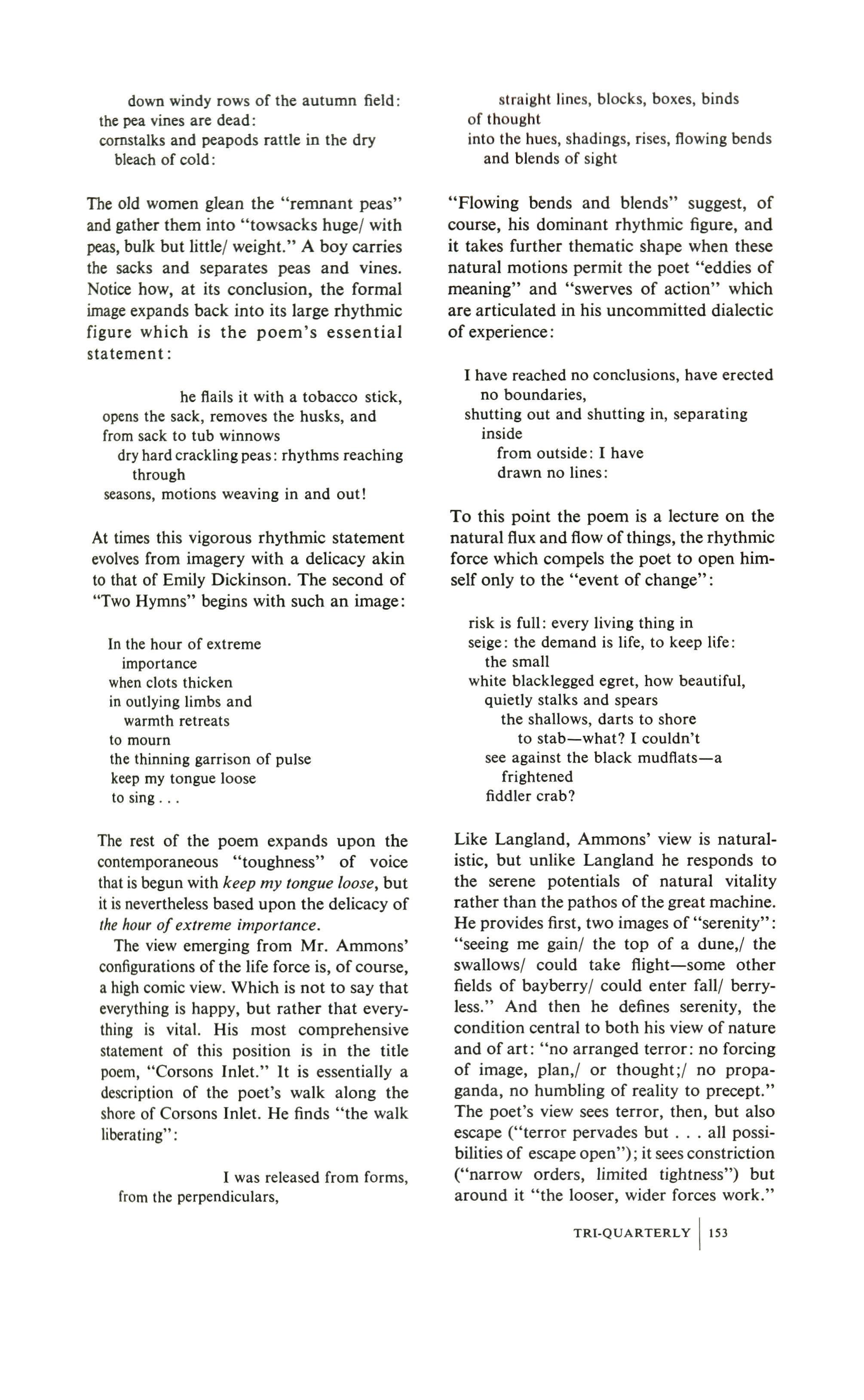
down windy rows of the autumn field: the pea vines are dead: cornstalks and peapods rattle in the dry bleach of cold:
The old women glean the "remnant peas" and gather them into "towsacks huge/ with peas, bulk but little/ weight." A boy carries the sacks and separates peas and vines. Notice how, at its conclusion, the formal image expands back into its large rhythmic figure which is the poem's essential statement:
he flails it with a tobacco stick, opens the sack, removes the husks, and from sack to tub winnows dry hard crackling peas: rhythms reaching through seasons, motions weaving in and out!
At times this vigorous rhythmic statement evolves from imagery with a delicacy akin to that of Emily Dickinson. The second of "Two Hymns" begins with such an image:
In the hour of extreme importance when clots thicken in outlying limbs and warmth retreats to mourn the thinning garrison of pulse keep my tongue loose to sing
The rest of the poem expands upon the contemporaneous "toughness" of voice that is begun with keep my tongue loose, but it is nevertheless based upon the delicacy of the hour of extreme importance.
The view emerging from Mr. Ammons' configurations of the life force is, of course, a high comic view. Which is not to say that everything is happy, but rather that everything is vital. His most comprehensive statement of this position is in the title poem, "Corsons Inlet." It is essentially a description of the poet's walk along the shore of Corsons Inlet. He finds "the walk liberating" :
I was released from forms, from the perpendiculars,
straight lines, blocks, boxes, binds of thought into the hues, shadings, rises, flowing bends and blends of sight
"Flowing bends and blends" suggest, of course, his dominant rhythmic figure, and it takes further thematic shape when these natural motions permit the poet "eddies of meaning" and "swerves of action" which are articulated in his uncommitted dialectic of experience:
I have reached no conclusions, have erected no boundaries, shutting out and shutting in, separating inside from outside: I have drawn no lines:
To this point the poem is a lecture on the natural flux and flow of things, the rhythmic force which compels the poet to open himself only to the "event of change":
risk is full: every living thing in seige: the demand is life, to keep life: the small white blacklegged egret, how beautiful, quietly stalks and spears the shallows, darts to shore to stab what? I couldn't see against the black mudflats a frightened fiddler crab?
Like Langland, Ammons' view is naturalistic, but unlike Langland he responds to the serene potentials of natural vitality rather than the pathos of the great machine. He provides first, two images of "serenity" : "seeing me gain/ the top of a dune,/ the swallows/ could take flight some other fields of bayberry/ could enter fall/ berryless." And then he defines serenity, the condition central to both his view of nature and of art: "no arranged terror: no forcing of image, plan,/ or thought;/ no propaganda, no humbling of reality to precept."
The poet's view sees terror, then, but also escape ("terror pervades but all possibilities of escape open"); it sees constriction ("narrow orders, limited tightness") but around it "the looser, wider forces work."
TRI-QUARTERLY 153

His final view comes back to the "liberation" with which the poem began and casts it once again in the rhythmic figure which is the essence of his lyricism; the poet is,
enjoying the freedom that Scope eludes my grasp, that there is no finality of vision, that I have perceived nothing completely, that tomorrow a new walk is a new walk.
Running through this, as I have suggested, is a didactic quality. What saves it from pretentiousness is its intense personality on the one hand and its contemporaneous honesty on the other. What more honest proposition is there for this generation than that tomorrow a new walk is, after all, neither a miracle nor a disaster but simply a new walk.
Langland's poetry reflects the moral resignation characteristic of the generation which most directly experienced World War II; Ammons' poetry reflects the moral disengagement of the post-war generation bred up on Camus, Sartre, and existentialism. John William Corrington's poetry reflects that moral indignation which takes the form of satire and parody and which has found its spokesmen in the Theater of the Absurd and in Pop Art. Its central quality is an incisively ironic wit, and its figurative basis is pop culture. A glance at Mr. Corrington's titles gives an idea of his figurative approach: "it happens every spring," "viva zapata," "the portable goya," "mr clean," "rudolph to greta," "surreal for lorca," "maid in the shade," etc. Parody is the starting point of much of Corrington's work; he isolates a cultural object, e.g. the Mr. Clean advertisement, from its own vacuous context and puts it into a moral context, e.g. religion or militarism, and the parody thus expands into satire.
In "mr clean," for instance, the structure of the poem reproduces the patter and pattern of the cleanser ad. Here we are, citizens, right here in Coalbin, Pa. talking with Mrs. Siltdown, and believe me she has a problem. What is your problem, Mrs. Siltdown? Believe me, in Coalbin we got
greasy grime! Corrington picks up this inanity and turns it, figuratively, into a cultural equivalent: "All the houses on drastic street/ crawl with uneasy dirt." Drastic street transports us immediately from Pennsylvania to the moral dimensions of cultural inanity. The uneasy dirt is equated with the "inutterable dark off each development hutch," where "only the kiddies imagine tomorrow/ and fear no three 0' clock dawn." And what does the culture offer the personal darkness C"where wives moan untouched/ beside daddy taking the long count/ dreaming of gina and liz")? Or what does it offer the public darkness C"where the militant ones/ squat in their hqs/ ears tipped for things at twice sounds speed/ hurtling in from/ Out There")? It offers the light of the panacea cleanser:
Probably not tonight possibly not tomorrow maybe not this august please god not on christmas eve but certainly all attaches agree out of fears overcast sometime before we wake
To end the darkness to cleanse the dirt to clobber the sensitive distribute the hurt some afternoon or evening some certain hour and minute Mr Clean will clean your whole house and everything thats in it
The poem is an indictment of the stupid appeal to absolutes, and of the stupid cultural mentality that tolerates such an exploitation of either its marketing or political power. The satirical effect depends upon the poet's manipulation of the pop culture metaphor of the Mr. Clean advertisement. In the passage above, the terms of the metaphor are established in the prepositional phrases which grammatically postpone and qualify the subject, Mr Clean, and make the comparison with the bomb which turns clean your whole house from an image of inanity to an image of Nagasaki. It is saved from being simply another
154
TRI-QUARTERLY

'ndignant bomb poem by the control of thematic focus Corrington maintains through, not only this skillful use of grammatical rhythm, but also the strategic irony of his images. The image conveyed in the parody of please god not on christmas eve, forexample, keeps the poem sharply focused on cultural cliche, the advertisement mentality that is the cause of which the bomb is only the most spectacular effect. This incisive use of the image is central to his satirical manner.
Mr. Corrington has the eye and ear of the parodist, the wit of the satirist, and the poeticimagination necessary to work parody and wit into a figurative statement. Sharp wit is perhaps the basis of his poetic technique, and it is obviously an attitude that he finds more meaningful than sentiment, for instance. The wit is characteristically infused with the moral indignation we have mentioned, and moral indignation is usually impatient with sentiment. The effect of this, negatively described, is an absence of compassion in his poetry; positively described, his poetry is highly reasonable, intelligent, analytical. It is a style that forfeits traditional lyricism for toughness, a toughness perhaps more appropriate than lyricism for a generation raised on newsreel images of Nazi genocide, Hiroshima Maidens, Korean waifs, Cuban Batistas, and flaming Buddhist monks. Be that as it may, it does give Mr. Corrington a distinctivecontemporaryvoice.
Sometimes, of course, the voice goes wrong, the wit turns to cuteness. In "a trip to omaha," for instance, the over all figurative device is understatement. The poem, as it turns out, is about the Normandy invasion, so there is the pun on Normandy/ Nebraska which sets the whole ironic tone: the trip is the famous suicidal assault on Omaha Beach. With that context, then, Corrington comes up with this image of the landings:
that bloomed instant red and wonderful scattering iron petals on the sandy stage ahead
Witty? Yes. Ingenius? Yes. But so irrelevant that not even a sharp Corrington "punch line" (" dying is a bitch/ and perhaps the goddess of love") can pull the poem back together. But that, of course, is the risk of wit. To which Mr. Corrington would doubtless reply by invoking his conclusion to "the portable goya," there is no art without risk/ as dr frankenstein] wheezed dying to a/ village constable.
More characteristically, however, Corrington's hard wit uses the grotesque as a means of expanding his imagery into a figurative statement. "on my 18th birthday" uses the following grotesque image to metaphorically express the natural selection of the "scary and adult" world; for this birthday the speaker's "analyst," a bizarre barber, gives him "a slip of paper tied with some dental floss :"
it said -you must have learned you can eat almost anything and almost everything will certainly try to eat you this is for the winner to clean his teeth from now on a haircut is six bits.
This, of course, is the comic grotesque; Corrington uses the ghastly grotesque as well. In the conclusion to "surreal for lorca," which is more an indictment of religious and political power than a lament for Lorca, the grotesque image ("while/ the city walls/ ricocheted/ tommygun laughter/ god/ stood by/ with a mouthful off cartridges/ trying to stammer the truth") becomes a metaphor equating God with a fascist machine gunner. This image suggests both Corrington's moral view and his figurative technique. Morally, he tends to fasten on those objects that the culture makes somehow inviolate (advertising, religion, patriotism, etc.) and figuratively project them out of cliche and into a if he had seen us mincing in the surf like balletgirls armed to the teats
and some shy admirers tossing roses from the wings
TRI·QUARTERLY 155
demanding moral context. Thus God, through the corruption of religious power in the Spanish civil war, becomes equated with his political ally, the fascist gunner.
Corrington does not give much energy to pathos (it does appear, e.g., in "at recess" or "viva zapata") because pathos is somehow too passive, too lyrical for his imagination. His figures, his imagery, his approach to popular culture are directed to ridiculing stupidity and corruption. The crux of this kind of poetry, of course, is finding the cultural image most vulnerable, most capable of being expanded into a satiric figure. This ability hallmarks the Corrington manner. Even where his purposes are essentially lyrical rather than satirical his moral indignation prevails. The ironic title of "viva zapata," a dithyrambic lamentation of the Mexican revolutionary, suggests the context of betrayal and corruption that are the tragedy of the Zapata mythology. The poem focuses on the drama of Zapata's failure, his death, with this concluding image,

and rendered harvest maimed the weeds placed his hands so to build with stone and learned that rock is moved by justice no less nor more than shame
his coming like a muse of terrible architecture a trumpet urging the bull and we scratch the soil in his memory bring forth fresh stone in his name
through the thunderous ages emiliano lies burning in the lava of his dream the clouds are scattered banners and the drums are grass
This is a strongly lyrical lament for a hero, to be sure, but the lament itself invokes the cultural "shame" of the betrayal of heroism. Thus Zapata's death becomes a figurative statement of moral corruption, underscoring the ironic viva in viva zapata, and fastening in our consciousness the moral injustice of his death.
lSI> TRI-QUARTERLY
In "A Note on Prosody" (Poetry, June, 1963) Mr. Ammons suggested of verse that "a nonlinear movement is possible which uses both the beginning and the end of the line as glancing-off points, so that the movement is not across the page but actually, centrally down the page." This sounds as if it might be a general prosodic principle. But the game is given up in the previous paragraph where he more metaphorically describes central movement:
A central poise suggests the pendulum: it is held in an instant of sight at either extremity ofits swing, but what is constantly operating around is the bottom point of its downward swing. Though there is an emphasis of light and "stillness" at either extremity, the real center is passed in rapid motion.
What happens is that Ammons' prosodic note really reflects the metaphor of rhythm which is the center of his total poetic method. Intrinsically there is no more interest in central movement than in linear movement. Langland's movement is linear, Ammons' is central; but their poetic values are not determined by that. Formally, questions of value are not prosodic, but are concerned rather with how style corresponds with imaginative action. Form, for these three poets, as indeed for most contemporary poetry, means figurative structure. A strong figurative structure will determine its proper style. Langland talks as a prophet should talk; Ammons talks as the impassioned should talk; Corrington talks as a wit should talk. The sounds they make are three major configurations of the contemporary voice.
o Poems of experience
RALPH J. MILLS, JR.
Midnight in the Century, by Maurice English. The Prairie School Press, Park Forest, Ill.: 1964. $4
Occasionally there appears on the contemporary literary scene a book of poems, of considerable distinction and merit,

written by a person who has thus far pursued a career other than literature but has yet managed to capture, in moments stolen from the demands of his actual occupation, the essential quality of his life's experience in a small though very substantial body of poetry. Such is the case with Midnight in the Century, Mr. English's first collection, published now in its author's middle years, which brings together poems composed 'on the side' during his lengthy career as a reporter, correspondent, and editor.
It is, of course, on these very grounds that some will dismiss a volume of this sort out of hand, charging that the author is merely an amateur, one who has simply amused himself in spare time with verse. Several answers to such prejudice can be made, the first of which is that the poems themselves are too good to be so readily dispensed with. Yet it must be admitted that Mr. English has not lived the life of poetry in the absolutely full-time sense in which, say, Roethke lived it and Lowell is still living it. On the other hand when we set his work against that of so many contemporary versifiers grinding out their skilled imitations year by year we can see how the amateur beautifully and independently outdoes his professional rivals. In addition, Mr. English has the distinct advantage of having been outside the fashions, movements, and factions of the literary world; his learning is, moreover, eclectic, lightly-used, and never obtrusive: he is no academician.
Mr. English's poems are handsome pieces, for he has obviously taken great pains with them. Each one is carefully worked; so much is evident even when we draw up a list of preferences. But more than craftsmanship is involved here, or perhaps we ought to say that the labors of craft have been made to serve, and serve well, the poet's individual perceptions, to realize them as fully as possible. Perception is, however, tempered by Mr. English's contemplative habits of mind and qualified by his irony. He is not above mocking his own limitations:
How have you lived who have not lived my life?
Beyond the trespass of my taking gaze
There is no world. The nicking of time's knife
Less surely than my mere unknowing slays.
("Go, Little Book ")
If this poet's irony is sometimes very strong, he still does not use it as a defensive weapon to protect himself from the darkest kind of knowledge but rather employs it as a means of breaking through whatever he conceives to be a barrier of deception or illusion. Knowledge, however bleak, he will entertain. So in his poems he penetrates deep, questions the reality he encounters, even if, in the end, he stands in a fearful isolation. His loneliness and skepticism, though not his style, are reminiscent of Wallace Stevens, who believed that only the human imagination could transform our brute reality into a habitable domain an idea which might seem to Mr. English excessively optimistic. The poem "Life as Languages" concludes in a section which explores, through the fundamental metaphor of speech, death and faith in God. Like Stevens, our poet visualizes the human word reaching out into the depths of space only to return, at last, to its point of departure, that is, to man in his physical world. Man's sense of things may be intensified, enriched, by this endeavor, but that is all. Mr. English sets forth his conviction in a series of fine and moving stanzas:
How will death utter me, as thou or you?
And whispering where: in that cold cancel, flame, Or the fanged rhetoric of ice, Or warm, the lick of worms? No matter for
The rasp and ravage of those sibilants, I'll will you, now and dying, my life's word:
As colors are the passions of the light, There is some silence which we cannot scan
That's more than sound or stillness: it scoops up
My sighs and blubberings, our oaths and prayers, Each click-and-whistle dialect of earth, And the gaunt screeching from the galaxies:
Like colors spinning into light, spin all Such mouthings into meanings.Meant for whom?
TRI-QUARTERLY 157
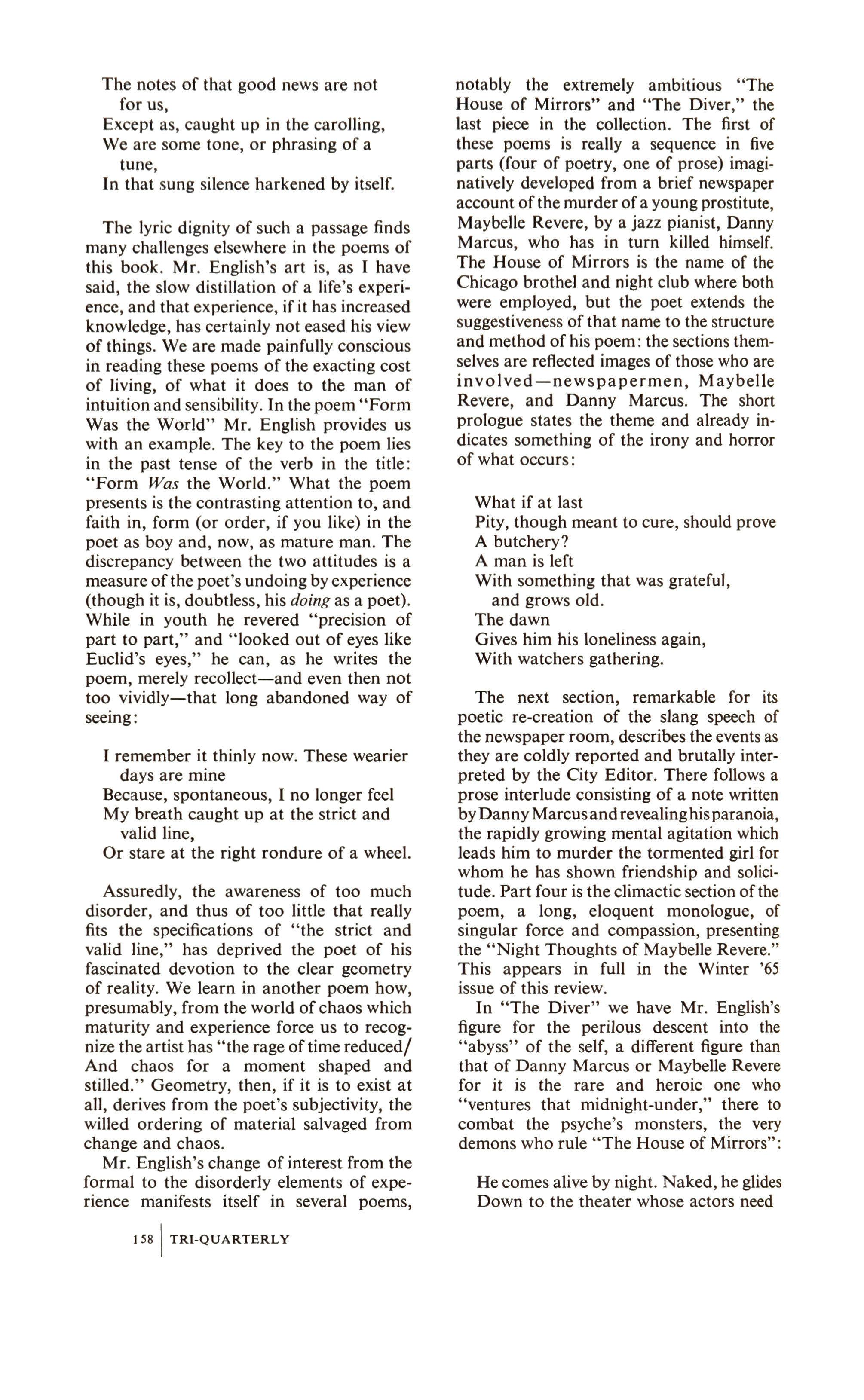
The notes of that good news are not for us,
Except as, caught up in the carolling, We are some tone, or phrasing of a tune, In that sung silence harkened by itself.
The lyric dignity of such a passage finds many challenges elsewhere in the poems of this book. Mr. English's art is, as I have said, the slow distillation of a life's experience, and that experience, if it has increased knowledge, has certainly not eased his view of things. We are made painfully conscious in reading these poems of the exacting cost of living, of what it does to the man of intuition and sensibility. In the poem "Form Was the World" Mr. English provides us with an example. The key to the poem lies in the past tense of the verb in the title: "Form Was the World." What the poem presents is the contrasting attention to, and faith in, form (or order, if you like) in the poet as boy and, now, as mature man. The discrepancy between the two attitudes is a measure of the poet's undoing byexperience (though it is, doubtless, his doing as a poet). While in youth he revered "precision of part to part," and "looked out of eyes like Euclid's eyes," he can, as he writes the poem, merely recollect and even then not too vividly that long abandoned way of
seeing:
I remember it thinly now. These wearier days are mine
Because, spontaneous, I no longer feel My breath caught up at the strict and valid line, Or stare at the right rondure of a wheel.
Assuredly, the awareness of too much disorder, and thus of too little that really fits the specifications of "the strict and valid line," has deprived the poet of his fascinated devotion to the clear geometry of reality. We learn in another poem how, presumably, from the world of chaos which maturity and experience force us to recognize the artist has "the rage of time reduced/ And chaos for a moment shaped and stilled." Geometry, then, if it is to exist at all, derives from the poet's subjectivity, the willed ordering of material salvaged from change and chaos.
Mr. English's change of interest from the formal to the disorderly elements of experience manifests itself in several poems,
158 TRI-QUARTERLY
notably the extremely ambitious "The House of Mirrors" and "The Diver," the last piece in the collection. The first of these poems is really a sequence in five parts (four of poetry, one of prose) imaginatively developed from a brief newspaper account of the murder of a young prostitute, Maybelle Revere, by a jazz pianist, Danny Marcus, who has in turn killed himself. The House of Mirrors is the name of the Chicago brothel and night club where both were employed, but the poet extends the suggestiveness of that name to the structure and method of his poem: the sections themselves are reflected images of those who are involved newspapermen, Maybelle Revere, and Danny Marcus. The short prologue states the theme and already indicates something of the irony and horror of what occurs:
What if at last Pity, though meant to cure, should prove A butchery?
A man is left
With something that was grateful, and grows old.
The dawn Gives him his loneliness again, With watchers gathering.
The next section, remarkable for its poetic re-creation of the slang speech of the newspaper room, describes the events as they are coldly reported and brutally interpreted by the City Editor. There follows a prose interlude consisting of a note written byDanny Marcusandrevealinghisparanoia, the rapidly growing mental agitation which leads him to murder the tormented girl for whom he has shown friendship and solicitude. Part four is the climactic section of the poem, a long, eloquent monologue, of singular force and compassion, presenting the "Night Thoughts of Maybelle Revere." This appears in full in the Winter '65 issue of this review.
In "The Diver" we have Mr. English's figure for the perilous descent into the "abyss" of the self, a different figure than that of Danny Marcus or Maybelle Revere for it is the rare and heroic one who "ventures that midnight-under," there to combat the psyche's monsters, the very demons who rule "The House of Mirrors":
He comes alive by night. Naked, he glides Down to the theater whose actors need
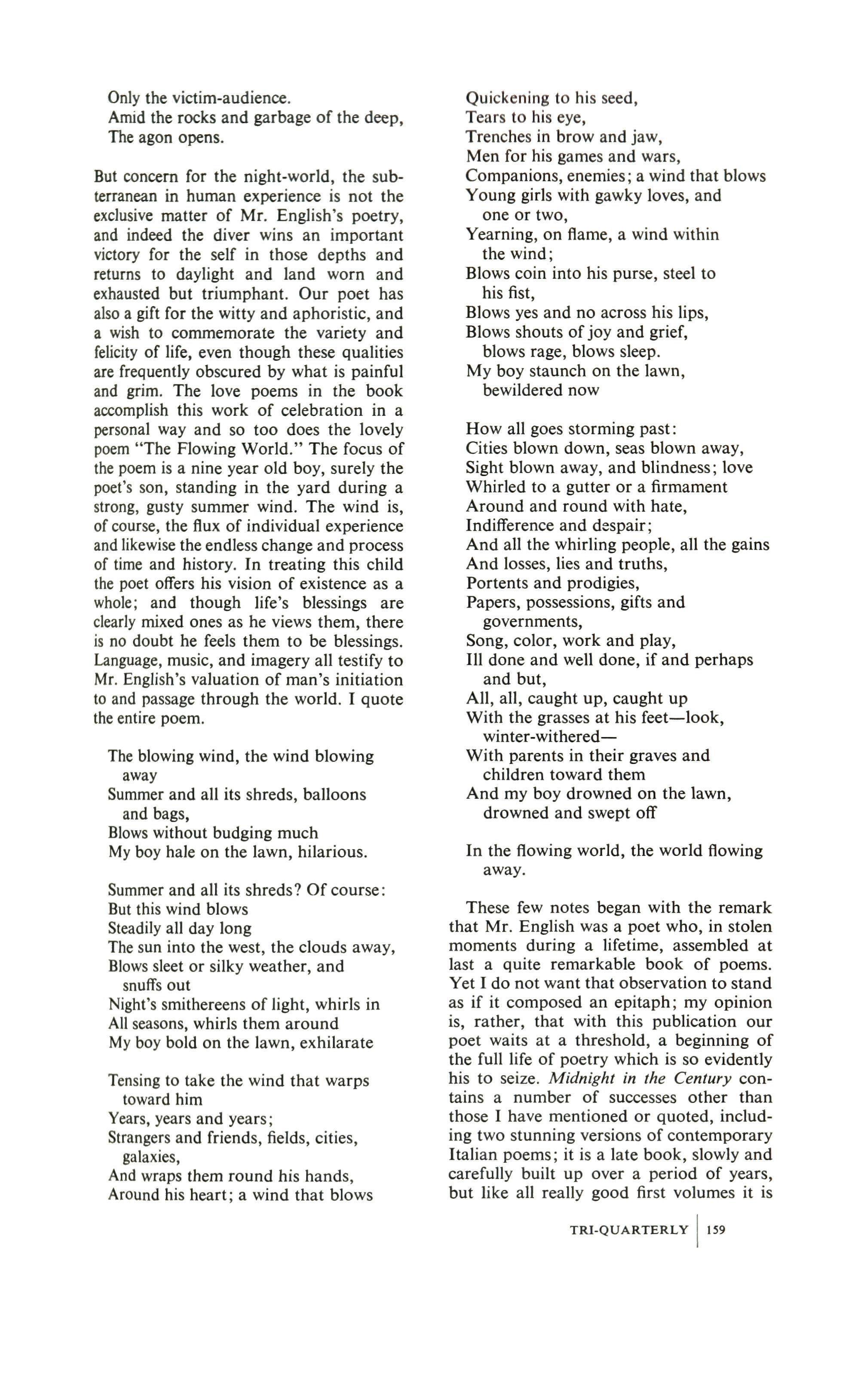
Only the victim-audience. Amid the rocks and garbage of the deep, The agon opens.
But concern for the night-world, the subterranean in human experience is not the exclusive matter of Mr. English's poetry, and indeed the diver wins an important victory for the self in those depths and returns to daylight and land worn and exhausted but triumphant. Our poet has also a gift for the witty and aphoristic, and a wish to commemorate the variety and felicity of life, even though these qualities are frequently obscured by what is painful and grim. The love poems in the book accomplish this work of celebration in a personal way and so too does the lovely poem "The Flowing World." The focus of the poem is a nine year old boy, surely the poet's son, standing in the yard during a strong, gusty summer wind. The wind is, of course, the flux of individual experience and likewise the endless change and process of time and history. In treating this child the poet offers his vision of existence as a whole; and though life's blessings are clearly mixed ones as he views them, there is no doubt he feels them to be blessings. Language, music, and imagery all testify to Mr. English's valuation of man's initiation to and passage through the world. I quote the entire poem.
The blowing wind, the wind blowing away
Summer and all its shreds, balloons and bags, Blows without budging much My boy hale on the lawn, hilarious.
Summer and all its shreds? Of course:
But this wind blows Steadily all day long
The sun into the west, the clouds away, Blows sleet or silky weather, and snuffs out
Night's smithereens of light, whirls in All seasons, whirls them around My boy bold on the lawn, exhilarate
Tensing to take the wind that warps toward him
Years, years and years; Strangers and friends, fields, cities, galaxies, And wraps them round his hands, Around his heart; a wind that blows
Quickening to his seed, Tears to his eye, Trenches in brow and jaw, Men for his games and wars, Companions, enemies; a wind that blows Young girls with gawky loves, and one or two, Yearning, on flame, a wind within the wind; Blows coin into his purse, steel to his fist, Blows yes and no across his lips, Blows shouts of joy and grief, blows rage, blows sleep. My boy staunch on the lawn, bewildered now
How all goes storming past: Cities blown down, seas blown away, Sight blown away, and blindness; love Whirled to a gutter or a firmament
Around and round with hate, Indifference and despair; And all the whirling people, all the gains And losses, lies and truths, Portents and prodigies, Papers, possessions, gifts and governments, Song, color, work and play, III done and well done, if and perhaps and but,
All, all, caught up, caught up
With the grasses at his feet look, winter-witheredWith parents in their graves and children toward them And my boy drowned on the lawn, drowned and swept off
In the flowing world, the world flowing away.
These few notes began with the remark that Mr. English was a poet who, in stolen moments during a lifetime, assembled at last a quite remarkable book of poems. Yet I do not want that observation to stand as if it composed an epitaph; my opinion is, rather, that with this publication our poet waits at a threshold, a beginning of the full life of poetry which is so evidently his to seize. Midnight in the Century contains a number of successes other than those I have mentioned or quoted, including two stunning versions of contemporary Italian poems; it is a late book, slowly and carefully built up over a period of years, but like all really good first volumes it is
TRI·QUARTERLY 159
more than a token of apprenticeship: Maurice English has made here a genuine contribution to the durable body of contemporary American verse.

o Corrte.rrrpoz-e.r-y rruaatc and the society it does not belong to
PETER P. JACOBI
The almost legendary Wilhelm Furtwangler said some years ago: "If you want to fill a concert hall, it is more than ever the works of Tchaikovsky and Beethoven you must play. A work by Debussy sends the boxoffice receipts down, and a poster which displays nothing but the names of living composers is a sure promise of an empty concert hall."
Furtwangler spoke of tonal music as "life itself," meeting "certain deep-rooted biological requirements in human nature," of providing "a succession of tension and relaxation." Atonal music, he said, "offers no relaxation," provides only "a deep disquietude." And the listener "is seized for a moment, but afterward he wonders what he has really heard."
Furtwangler as conductor specialized in tonal music, in the romantics that built great mountains of sound upon an orchestral structure. His career flowered upon the seeds of the old masters. Thus, his thoughts about the new could be explained away: "He never played our music of today. Maybe he couldn't. He really did not understand.
Possibly. Herr Furtwangler had his troubles understanding other matters, the menace of Fascism, for example. But developments in music bear out his words. The works of living composers do threaten an empty hall. The public does respond negatively to the lures or are they really repellent, counter-magnetic forces of contemporary music. Contemporary is a loose term commonly used but not truly descriptive since some of the works of Schonberg, written 50, 60 years ago, must be included.
160 TRI-QUARTERLY
They are as estranged from the public, more or nearly, as works written by composers of this year and last.
An Aristotelian tragedy is being conceived in music.
The characters: Composer, Performer, Listener, and a Chorus of Advertisers and Salesmen.
The plot: very simple yet with the requisite beginning, middle, and end. Composer sits in his cubicle writing music, dreaming strange dreams and recreating them in strange sounds. He telephones Performer, asks him to come to the cubicle to hear the new composition. Performer refuses, says he has enough music to perform but that if Composer should come to his abode, then he'll at least listen. Composer does, saddened that creator should by the fates of his era be forced to bow to re-creator. Performer the re-creator hears the work and after Composer's plea decides to perform it. Chorus of Advertisers and Salesmen warn: "It won't sell. Don't do it."
Performer takes his instrument, stereo speakers, and tapes of electronic sound to the concert hall, this after passage of time, much rehearsal, and a scene during which music and the Chorus of Advertisers and Salesmen mingle in cacophonous noise. The final moments are at the concert hall. Performer and paraphernalia are on stage. Composer sits facing a curtain which at the striking of eight gongs opens. There is motion on stage, a performance in progress, but there is no sound. Surrounding the composer in Ionescoesque fantasy are rows and rows of chairs, all empty. There is no Listener. Composer sees a discarded tuba lying nearby. He jumps into its cold and brassy bell and with anguished wail upon his lips disappears forever in the tubing. The Chorus intones the words, "We told you so." Listener stands to the side, watching with frigid countenance.
So, we have a complete plot with action; we have characters; we have a chorus; we have music, and we would have dialogue if someone would take time to complete the play. We have a serious play that could be a beautiful tragedy.
The plot, according to Aristotle, should involve a tragic hero whose misfortune is
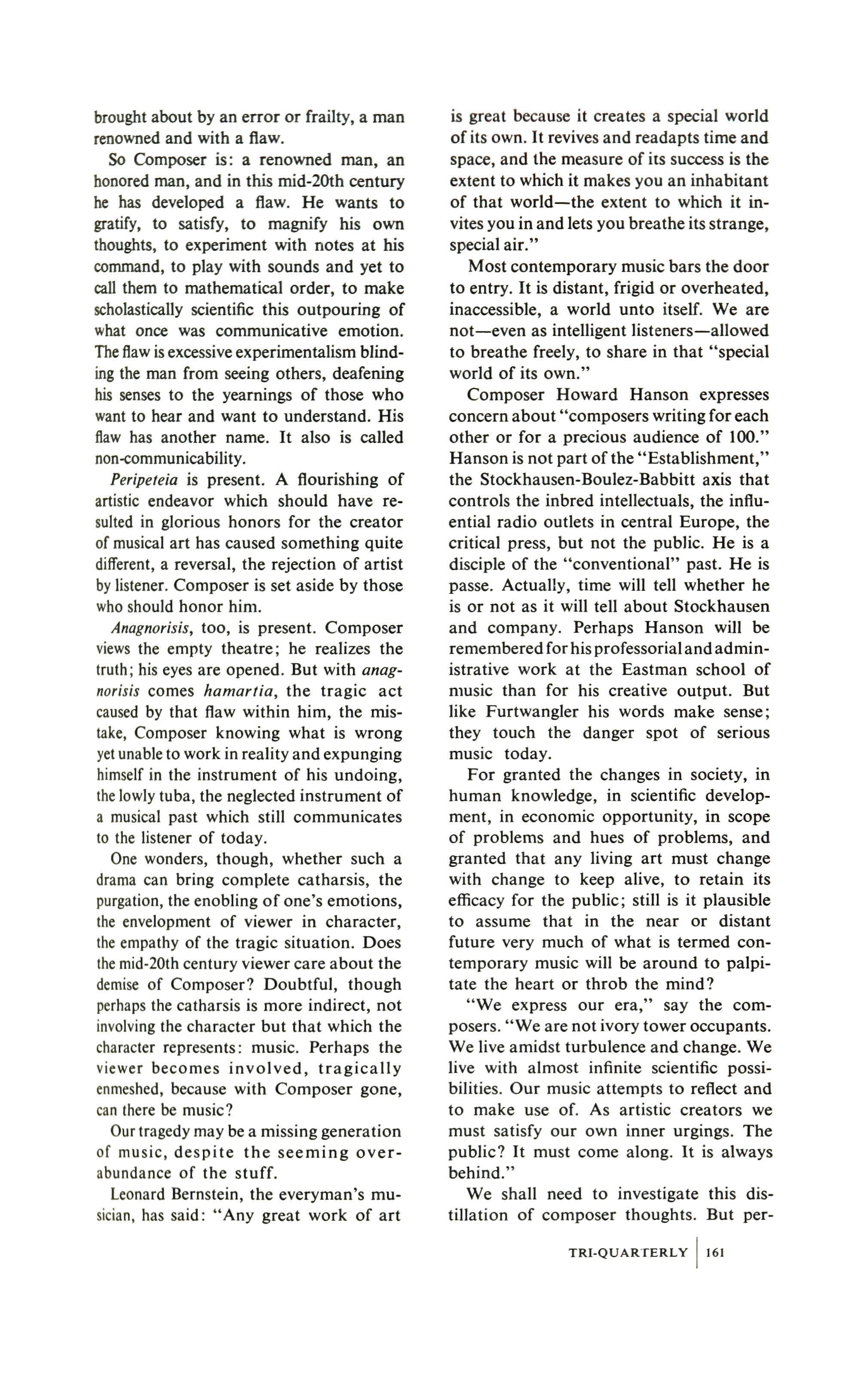
brought about by an error or frailty, a man renowned and with a flaw.
So Composer is: a renowned man, an honored man, and in this mid-20th century he has developed a flaw. He wants to gratify, to satisfy, to magnify his own thoughts, to experiment with notes at his command, to play with sounds and yet to call them to mathematical order, to make scholastically scientific this outpouring of what once was communicative emotion. The flaw is excessive experimentalism blinding the man from seeing others, deafening his senses to the yearnings of those who want to hear and want to understand. His flaw has another name. It also is called non-communicability.
Peripeteia is present. A flourishing of artistic endeavor which should have resulted in glorious honors for the creator of musical art has caused something quite different, a reversal, the rejection of artist by listener. Composer is set aside by those who should honor him,
Anagnorisis, too, is present. Composer views the empty theatre; he realizes the truth; his eyes are opened. But with anagnorisis comes hamartia, the tragic act caused by that flaw within him, the mistake, Composer knowing what is wrong yet unable to work in reality and expunging himself in the instrument of his undoing, the lowly tuba, the neglected instrument of a musical past which still communicates to the listener of today.
One wonders, though, whether such a drama can bring complete catharsis, the purgation, the enobling of one's emotions, the envelopment of viewer in character, the empathy of the tragic situation. Does the mid-20th century viewer care about the demise of Composer? Doubtful, though perhaps the catharsis is more indirect, not involving the character but that which the character represents: music. Perhaps the viewer becomes involved, tragically enmeshed, because with Composer gone, can there be music?
Our tragedy may be a missing generation of music, despite the seeming overabundance of the stuff.
Leonard Bernstein, the everyman's musician, has said: "Any great work of art
is great because it creates a special world of its own. It revives and readapts time and space, and the measure of its success is the extent to which it makes you an inhabitant of that world the extent to which it invites you in and lets you breathe its strange, special air.
Most contemporary music bars the door to entry. It is distant, frigid or overheated, inaccessible, a world unto itself. We are not even as intelligent listeners allowed to breathe freely, to share in that "special world of its own."
Composer Howard Hanson expresses concern about "composers writing for each other or for a precious audience of 100." Hanson is not part of the "Establishment," the Stockhausen-Boulez-Babbitt axis that controls the inbred intellectuals, the influential radio outlets in central Europe, the critical press, but not the public. He is a disciple of the "conventional" past. He is passe. Actually, time will tell whether he is or not as it will tell about Stockhausen and company. Perhaps Hanson will be remembered for his professorial and administrative work at the Eastman school of music than for his creative output. But like Furtwangler his words make sense; they touch the danger spot of serious music today.
For granted the changes in society, in human knowledge, in scientific development, in economic opportunity, in scope of problems and hues of problems, and granted that any living art must change with change to keep alive, to retain its efficacy for the public; still is it plausible to assume that in the near or distant future very much of what is termed contemporary music will be around to palpitate the heart or throb the mind?
"We express our era," say the composers. "We are not ivory tower occupants. We live amidst turbulence and change. We live with almost infinite scientific possibilities. Our music attempts to reflect and to make use of. As artistic creators we must satisfy our own inner urgings. The public? It must come along. It is always behind."
We shall need to investigate this distillation of composer thoughts. But perTRI-QUARTERLY 161

haps we should first quote from an astute article of 1928, published in Musical Quarterly. Carl Engel wrote it; either he or the editor called it "Marking Back and Looking Forward." Engel said:
"What we need most of all is an explanation for the probable connection between the latest changes in music and the increase in noise. The progress of music is based on and conditioned by the necessity of constantly overcoming fatigue. And the fatigue of the ear has been hastened or aggravated by the alarming increase in noise to which modern life is subjecting us. Probably our whole nervous system is affected by it, and not to its profit. Where two hundred years ago melodious street-calls announced the approach of itinerant vendors and the song of an ungreased axle-tree merely emphasized the ordinary stillness, we have now the involved and strident counterpoint of traffic over an ostinato of policemen's whistles and automobile horns. The timid tinkle of the spinet has been replaced by the aggressive tones of the 'loud speaker.' Loudness and coarseness go hand in hand. Pandemonium in the street, and the home a jazz dive or a roaring Chautauqua truly the art of music is hard put to devise new stimuli wherewith to counteract the growing aural disturbance. The wonderful and consoling fact is that music, apparently, is equal to any occasion."
Noise we have aplenty. And with it the apparent drive of composers to be heard. But more than noise is involved. Change, too. The composer reacts with a passionthe human passion always to do something new, to experiment with known and unknown elements. The composer, the experimenter, free now because his food and essentials are supported by teaching and writing and lecturing, plays with music, tears it apart and pieces it back together in weird, complex, twisted images. No nobleman to please so that the family's supper is assured. No publisher to please so that a public can be reached and won. No public to please so that the publisher will buy more. Just please yourself, says today's composer, and find a few like you to perform the work for a few more. It's diversion anyway, avocation rather than vocation,
162 TRI-QUARTERLY
spare-time hobby, or, at the most, activity subsidized by other activities like teaching a class of theory, an instrument, or even music history. Account to no one, and do what you please. Or if you do compose full time which is a rare rarity then by all means follow the dictates of those who count, the members of the "Establishment" who can get you accepted into the inner circle of arts ministries, avant-garde festivals, or on German radio networks, or even on the college circuit.
Denied?
Why else "Four Minutes and ThirtyThree Seconds" by John Cage, with its tail-coated piano player sitting before piano, a watch by his side, and sitting there exactly that length of time without playing a note?
How else explain a man playing sounds, sounds, sounds with a thermometer in his mouth, taking it out occasionally to read the temperature?
Or a piece done in Wiesbaden by a South Korean who covered himself with shaving foam, scattered pebbles and rice on the floor and into the audience, then wept and lamented over a roll of cheap paper? Suddenly he took a running, screaming dive into a bathtub of water. Emerging, he sulked in a corner to play snatches of a nursery rhyme on an old-fashioned horn phonograph.
Twelve-tone scales, and 43-tone scales of Harry Partch who builds his own instruments of piecemeal bottles, steam whistles and bellows, lightbulbs, and harps of one string.
Dada, "happenings" with nudes dancing to gurgled sounds and screeches, banging on piano strings with hammers, smashing grand pianos to bits, concerts without human performers, and already music composed by computer such as the 24-n1inute "Computer Cantata" written for conventional instruments by the digital computer at the University of Illinois.
It reminds one of the current day Sirs Darwin, Charles, and Huxley, Julian, conversing on a television program a few seasons back. Huxley predicted that computers would be writing poetry before long. "Yes," said Darwin, "but it will be the kind of
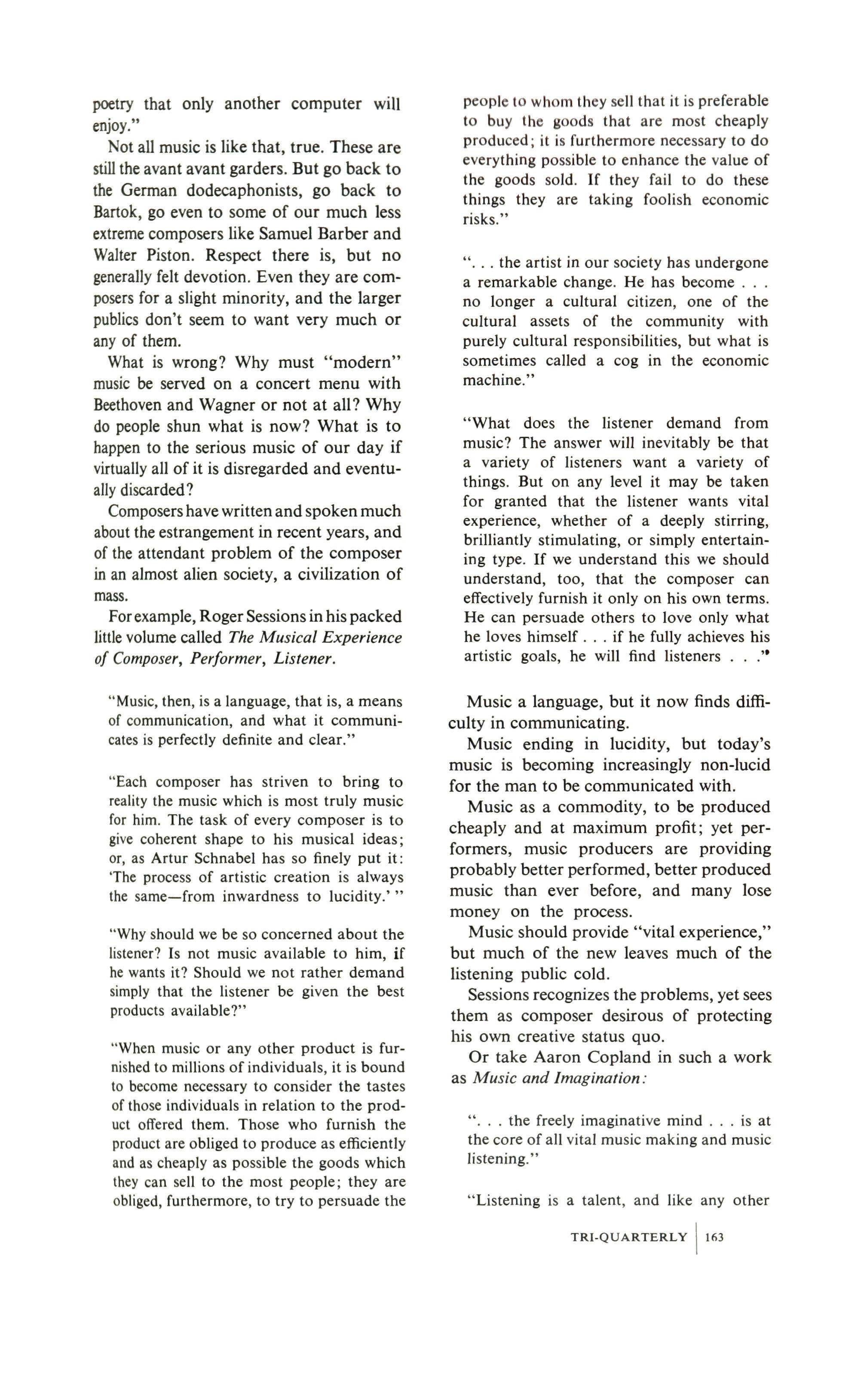
poetry that only another computer will enjoy."
Not all music is like that, true. These are still the avant avant garders. But go back to the German dodecaphonists, go back to Bartok, go even to some of our much less extreme composers like Samuel Barber and Walter Piston. Respect there is, but no generally felt devotion. Even they are composers for a slight minority, and the larger publics don't seem to want very much or any of them.
What is wrong? Why must "modern" music be served on a concert menu with Beethoven and Wagner or not at all? Why do people shun what is now? What is to happen to the serious music of our day if virtually all of it is disregarded and eventually discarded?
Composers have written and spoken much about the estrangement in recent years, and of the attendant problem of the composer in an almost alien society, a civilization of mass.
Forexample, Roger Sessions in his packed little volume called The Musical Experience of Composer, Performer, Listener.
"Music, then, is a language, that is, a means of communication, and what it communicates is perfectly definite and clear."
"Each composer has striven to bring to reality the music which is most truly music for him. The task of every composer is to give coherent shape to his musical ideas; or, as Artur Schnabel has so finely put it: 'The process of artistic creation is always the same-from inwardness to lucidity.'"
"Why should we be so concerned about the listener? Is not music available to him, if he wants it? Should we not rather demand simply that the listener be given the best products available?"
"When music or any other product is furnished to millions of individuals, it is bound to become necessary to consider the tastes of those individuals in relation to the product offered them. Those who furnish the product are obliged to produce as efficiently and as cheaply as possible the goods which they can sell to the most people; they are obliged, furthermore, to try to persuade the
people to whom they sell that it is preferable to buy the goods that are most cheaply produced; it is furthermore necessary to do everything possible to enhance the value of the goods sold. If they fail to do these things they are taking foolish economic risks.
the artist in our society has undergone a remarkable change. He has become no longer a cultural citizen, one of the cultural assets of the community with purely cultural responsibilities, but what is sometimes called a cog in the economic machine."
"What does the listener demand from music? The answer will inevitably be that a variety of listeners want a variety of things. But on any level it may be taken for granted that the listener wants vital experience, whether of a deeply stirring, brilliantly stimulating, or simply entertaining type. If we understand this we should understand, too, that the composer can effectively furnish it only on his own terms. He can persuade others to love only what he loves himself if he fully achieves his artistic goals, he will find listeners
Music a language, but it now finds difficulty in communicating.
Music ending in lucidity, but today's music is becoming increasingly non-lucid for the man to be communicated with.
Music as a commodity, to be produced cheaply and at maximum profit; yet performers, music producers are providing probably better performed, better produced music than ever before, and many lose money on the process.
Music should provide "vital experience," but much of the new leaves much of the listening public cold.
Sessions recognizes the problems, yet sees them as composer desirous of protecting his own creative status quo.
Or take Aaron Copland in such a work as Music and Imagination,'
the freely imaginative mind is at the core of all vital music making and music listening.
"Listening is a talent, and like any other
TRI-QUARTERLY 163

talent or gift, we possess it in varying degrees. I have found among music-lovers a marked tendency to underestimate and mistrust this talent, rather than to overestimate it I should say that there are two principal requisites for talented listening: first, the ability to open oneself up to musical experience; and secondly, the ability to evaluate critically that experience."
"Recognizing the beautiful in an abstract art like music partakes somewhat of a minor miracle."
"The ideal listener, above all else, possesses the ability to lend himself to the power of music."
"An unusual and disturbing situation has gradually become all-pervasive at public performances of music: the universal preponderance of old music on concert programs. This unhealthy state of affairs, this obsession with old music, tends to make all music listening safe and unadventurous since it deals so largely in the works of the accepted masters. Filling our halls with familiar sounds induces a sense of security in our audiences; they are gradually losing all need to exercise freely their own musical judgment The simple truth is that our concert halls have been turned into musical museums auditory museums of a most limited kind. Our musical era is sick in that respect our composers invalids who exist on the fringe of musical society, and our listeners impoverished through a relentless repetition of the same works signed by a handful of sanctified names."
"The worst feature of the composer's life is the fact that he does not feel himself an integral part of the musical community. There is no deep need for his activities as composer, no passionate concern in each separate work as it is written When a composer is played he is usually surrounded by an air of mild approval; when he is not played no one demands to hear him."
A free flow of imagination for the composer, but should the imagination of one man shut itself off from the imagination of another, creator from listener, in what has always been a communicative art?
Listening is a talent, the plea for a discriminate listener, but many listeners find themselves lacking the talent to comprehend,
much less enjoy, what flows from modern musical pens.
Recognizing the beautiful in abstract is "a minor miracle," but in music the days of such small marvels apparently are nearing an end.
The old sounds are heard in our concert hall, but so are the new sounds increasingly, and yet the new sounds are not sought after.
The composer does not feel himself an integral part of the community, but perchance the fault lies not just with the community.
And so it goes. Sessions and Copland.
Thoughtful men.
Roy Harris, speaking to a Select Subcommittee on Education of the House of Representatives investigating the economic conditions in the performing arts: each new generation of young gifted composers are more helpless than their predecessors. They are like shorn lambs in the bitter winds of commercial competition. They cannot even get their bestmusic performed.'
Ross Lee Finney: "Some of our critics fear that our experimental composers will change the vocabulary of their art. The free artist demands an intellectually alive society. If a society is not culturally alert, the composer will write in a vacuum, and in time a lag will develop between society and the artist.
Lukas Foss, speaking with the author a couple of seasons back: "We make sense with nonsense sometimes. There is Theatre of the Absurd. So why should this not be in music? We are striving for an expansion of an artistic language. We are discoverers in a line leading back to Bach and Monteverdi. We must keep discovering no matter if those around us watch or listen, or if they do not. To please others is abdication. The composer must be opinionated, be intolerant, be serious, be concerned, be alive, be young. Real art is to induce surprise and make the listener wonder, to cause surprise which in retrospect seems inevitable. This is the excitement of life. What was chaotic suddenly seems true. This will be with the music of today."
Karlheinz Stockhausen, writing in the periodical Perspectives ofNew Music:" a musical composition is no more than a
164 TRI-QUARTERLY
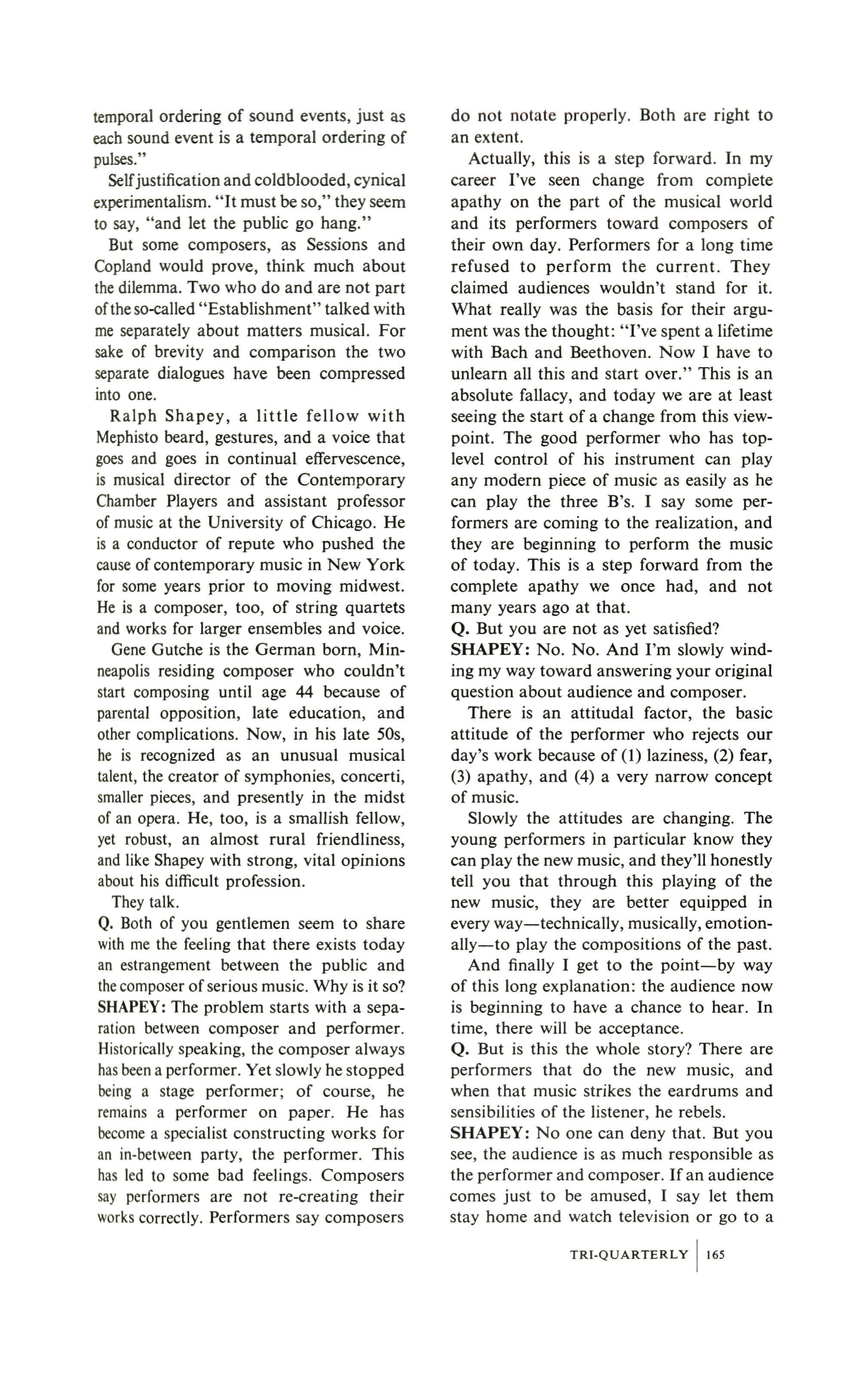
temporal ordering of sound events, just as each sound event is a temporal ordering of pulses."
Selfjustification and coldblooded, cynical experimentalism. "It must be so," they seem to say, "and let the public go hang."
But some composers, as Sessions and Copland would prove, think much about the dilemma. Two who do and are not part ofthe so-called "Establishment" talked with me separately about matters musical. For sake of brevity and comparison the two separate dialogues have been compressed into one.
Ralph Shapey, a little fellow with Mephisto beard, gestures, and a voice that goes and goes in continual effervescence, is musical director of the Contemporary Chamber Players and assistant professor of music at the University of Chicago. He is a conductor of repute who pushed the cause of contemporary music in New York for some years prior to moving midwest. He is a composer, too, of string quartets and works for larger ensembles and voice.
Gene Gutche is the German born, Minneapolis residing composer who couldn't start composing until age 44 because of parental opposition, late education, and other complications. Now, in his late 50s, he is recognized as an unusual musical talent, the creator of symphonies, concerti, smaller pieces, and presently in the midst of an opera. He, too, is a smallish fellow, yet robust, an almost rural friendliness, and like Shapey with strong, vital opinions about his difficult profession. They talk.
Q. Both of you gentlemen seem to share with me the feeling that there exists today an estrangement between the public and the composer of serious music. Why is it so?
SHAPEY: The problem starts with a separation between composer and performer. Historically speaking, the composer always has been a performer. Yet slowly he stopped being a stage performer; of course, he remains a performer on paper. He has become a specialist constructing works for an in-between party, the performer. This has led to some bad feelings. Composers say performers are not re-creating their works correctly. Performers say composers
do not notate properly. Both are right to an extent.
Actually, this is a step forward. In my career I've seen change from complete apathy on the part of the musical world and its performers toward composers of their own day. Performers for a long time refused to perform the current. They claimed audiences wouldn't stand for it. What really was the basis for their argument was the thought: "I've spent a lifetime with Bach and Beethoven. Now I have to unlearn all this and start over." This is an absolute fallacy, and today we are at least seeing the start of a change from this viewpoint. The good performer who has toplevel control of his instrument can play any modern piece of music as easily as he can play the three B's. I say some performers are coming to the realization, and they are beginning to perform the music of today. This is a step forward from the complete apathy we once had, and not many years ago at that.
Q. But you are not as yet satisfied?
SHAPEY: No. No. And I'm slowly winding my way toward answering your original question about audience and composer.
There is an attitudal factor, the basic attitude of the performer who rejects our day's work because of (1) laziness, (2) fear, (3) apathy, and (4) a very narrow concept of music.
Slowly the attitudes are changing. The young performers in particular know they can play the new music, and they'll honestly tell you that through this playing of the new music, they are better equipped in every way technically, musically, emotionally to play the compositions of the past.
And finally I get to the point by way of this long explanation: the audience now is beginning to have a chance to hear. In time, there will be acceptance.
Q. But is this the whole story? There are performers that do the new music, and when that music strikes the eardrums and sensibilities of the listener, he rebels.
SHAPEY: No one can deny that. But you see, the audience is as much responsible as the performer and composer. If an audience comes just to be amused, I say let them stay home and watch television or go to a TRI-QUARTERLY 165
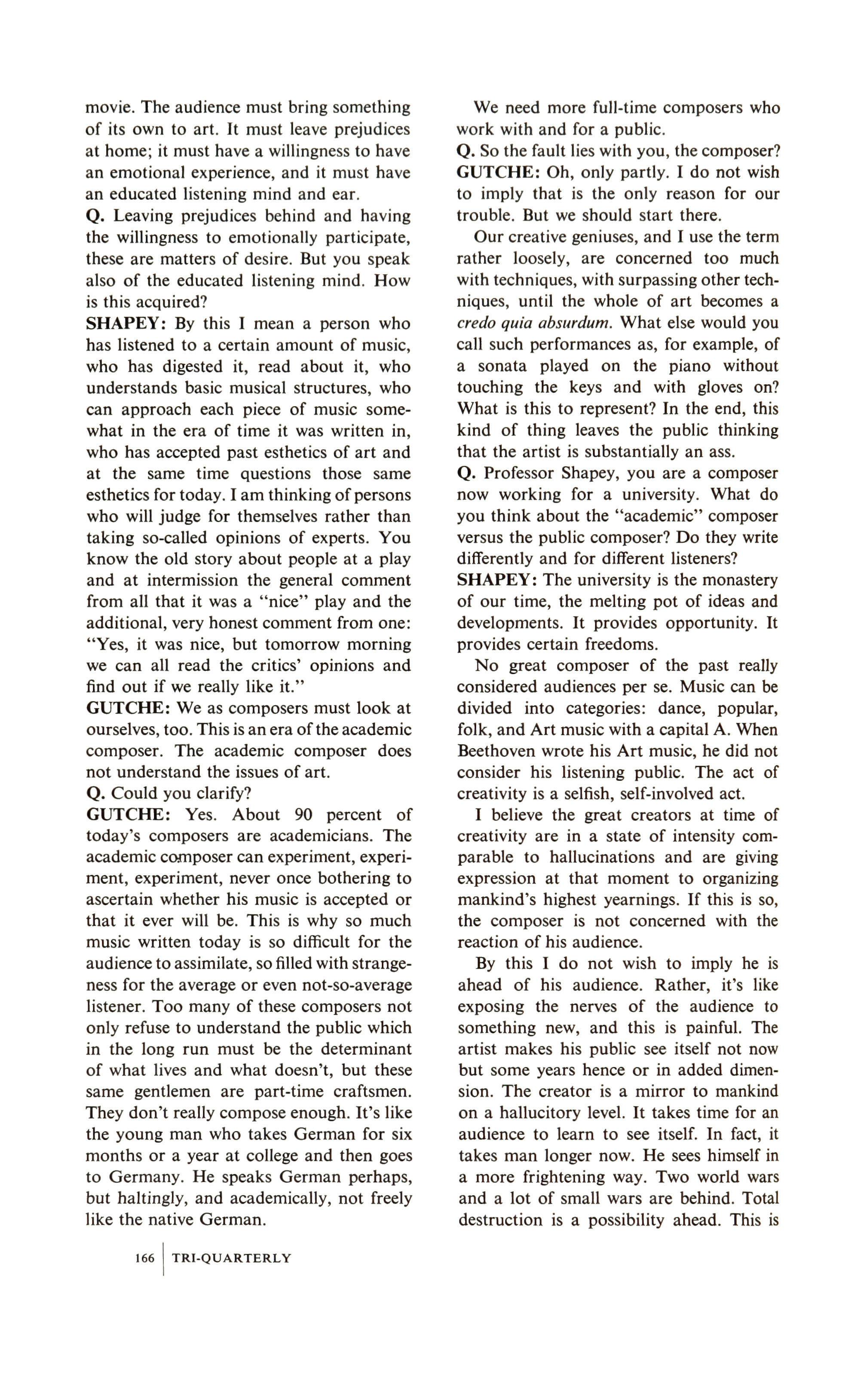
movie. The audience must bring something of its own to art. It must leave prejudices at home; it must have a willingness to have an emotional experience, and it must have an educated listening mind and ear.
Q. Leaving prejudices behind and having the willingness to emotionally participate, these are matters of desire. But you speak also of the educated listening mind. How is this acquired?
SHAPEY: By this I mean a person who has listened to a certain amount of music, who has digested it, read about it, who understands basic musical structures, who can approach each piece of music somewhat in the era of time it was written in, who has accepted past esthetics of art and at the same time questions those same esthetics for today. I am thinking of persons who will judge for themselves rather than taking so-called opinions of experts. You know the old story about people at a play and at intermission the general comment from all that it was a "nice" play and the additional, very honest comment from one: "Yes, it was nice, but tomorrow morning we can all read the critics' opinions and find out if we really like it."
GUTCHE: We as composers must look at ourselves, too. This is an era of the academic composer. The academic composer does not understand the issues of art.
Q. Could you clarify?
GUTCHE: Yes. About 90 percent of today's composers are academicians. The academic composer can experiment, experiment, experiment, never once bothering to ascertain whether his music is accepted or that it ever will be. This is why so much music written today is so difficult for the audience to assimilate, so filled with strangeness for the average or even not-so-average listener. Too many of these composers not only refuse to understand the public which in the long run must be the determinant of what lives and what doesn't, but these same gentlemen are part-time craftsmen. They don't really compose enough. It's like the young man who takes German for six months or a year at college and then goes to Germany. He speaks German perhaps, but haltingly, and academically, not freely like the native German.
We need more full-time composers who work with and for a public.
Q. SO the fault lies with you, the composer?
GUTCHE: Oh, only partly. I do not wish to imply that is the only reason for our trouble. But we should start there.
Our creative geniuses, and I use the term rather loosely, are concerned too much with techniques, with surpassing other techniques, until the whole of art becomes a credo quia absurdum. What else would you call such performances as, for example, of a sonata played on the piano without touching the keys and with gloves on?
What is this to represent? In the end, this kind of thing leaves the public thinking that the artist is substantially an ass.
Q. Professor Shapey, you are a composer now working for a university. What do you think about the "academic" composer versus the public composer? Do they write differently and for different listeners?
SHAPEY: The university is the monastery of our time, the melting pot of ideas and developments. It provides opportunity. It provides certain freedoms.
No great composer of the past really considered audiences per se. Music can be divided into categories: dance, popular, folk, and Art music with a capital A. When Beethoven wrote his Art music, he did not consider his listening public. The act of creativity is a selfish, self-involved act.
I believe the great creators at time of creativity are in a state of intensity comparable to hallucinations and are giving expression at that moment to organizing mankind's highest yearnings. If this is so, the composer is not concerned with the reaction of his audience.
By this I do not wish to imply he is ahead of his audience. Rather, it's like exposing the nerves of the audience to something new, and this is painful. The artist makes his public see itself not now but some years hence or in added dimension. The creator is a mirror to mankind on a hallucitory level. It takes time for an audience to learn to see itself. In fact, it takes man longer now. He sees himself in a more frightening way. Two world wars and a lot of small wars are behind. Total destruction is a possibility ahead. This is
166 TRI-QUARTERLY

an age of existentialism, of nothing existing at the end but death.
The artist presents this view. It is hard for the public to accept, and it will take time, even after the opportunities to hear the new music are more readily available. GUTeHE: Composing is a madness, no doubt. When I'm in the midst of a composition, I cannot eat or sleep. I work perhaps 20 hours a day and might go without stopping ifit weren't for my wife who authorizes a halt. Once the idea has germinated, the music flows, and I cannot bear to stop. It is a passion. Yet never can there be a separation of composer from his milieu, and that includes people.
It seems to me the problem lies also in the statistics of our society. We live in a society of statistics. We are ruled by economics. We are ruled by numbers. For instance, television ratings. How sad that presidents of major networks will admit blatantly that since they have no perception, extrasensory perception, of what is good theatre or entertainment, the only possible direction finder for them, at least, is the Nielsen rating.
This is what we find art involved in. Art must operate on mass production and mass consumption. Art is not a commodity which can be defined by measurement, statistics. Yet, we treat it as such.
Let's take our concert stage. The onetime autocrats like Toscanini, Mitropoulos, Szell, Munch are today being replaced by order takers, men who are craftsmen certainly, but men who lack the conviction of the creative individual. In the arts it is absolutely essential whether you be conductor, performer, composer that the expression remains individual, that direction is governed by art as art.
What I'm trying to say is that economics govern the arts, and too much so in our time. In previous periods of history artists were allowed to be individuals. By this I do not say they were individuals who set themselves apart from society and wrote in a vacuum. I mean they were individual creators who sought communion with their fellows and yet were allowed the privacy of individual creativity. Composers had breathing space.
The artist today is an outsider of our privileged society. He is set apart. He is pushed into economic straightjackets. He is thrown on the massmarketplace and left to fight it out with Beatles and baseball and beer.
Q. And how might this be changed?
SHAPEY: It is the duty of every government on the face of the earth to match penny for penny everything spent for death and scientific exploration with funds spent for life and culture.
GUTCHE: The government will have to identify itselfwith art, will need to encourage the creative artist with exceptional talent. We have today, according to Panpipe, 750 men and women registered as composers. Discriminating a bit, or quite a bit, approximately 35 of that number may be of truly professional caliber. Well, those artists who have proven themselves in performances, in the granting of commissions, in prizes and awards let the government help these. Add to the 35 another 65 who might do worthwhile work if given time to work. Let the government give these 100 "professional composers" $10,000 per year. That's a cost of $1 million to our people per year, and for it they'll be getting some of the music of their tomorrow.
Art is the result of ridiculous leisure. Art comes from a freedom unencumbered with economic perplexities.
Estrangement comes when the artist is not free to express his true ideas. But again, the composer must deal in ideas for a public, ideas that express the time, not ideas burdened by a constant struggle with techniques. The public has no understanding of musical science, of musical mathematics, of musical laboratory experiments. It looks for ideas which are relevant to the age.
SHAPEY: It's old hat to say we are a materialistic nation which has brought about the highest levels of material society in history. I think it is time we recognize the part the creators of our community should and must play. A study of all nations of the past has revealed they are remembered for their culture. What is the American dynasty going to leave when its day in the sun is done? Just flushing toilets?
TRI·QUARTERLY 167
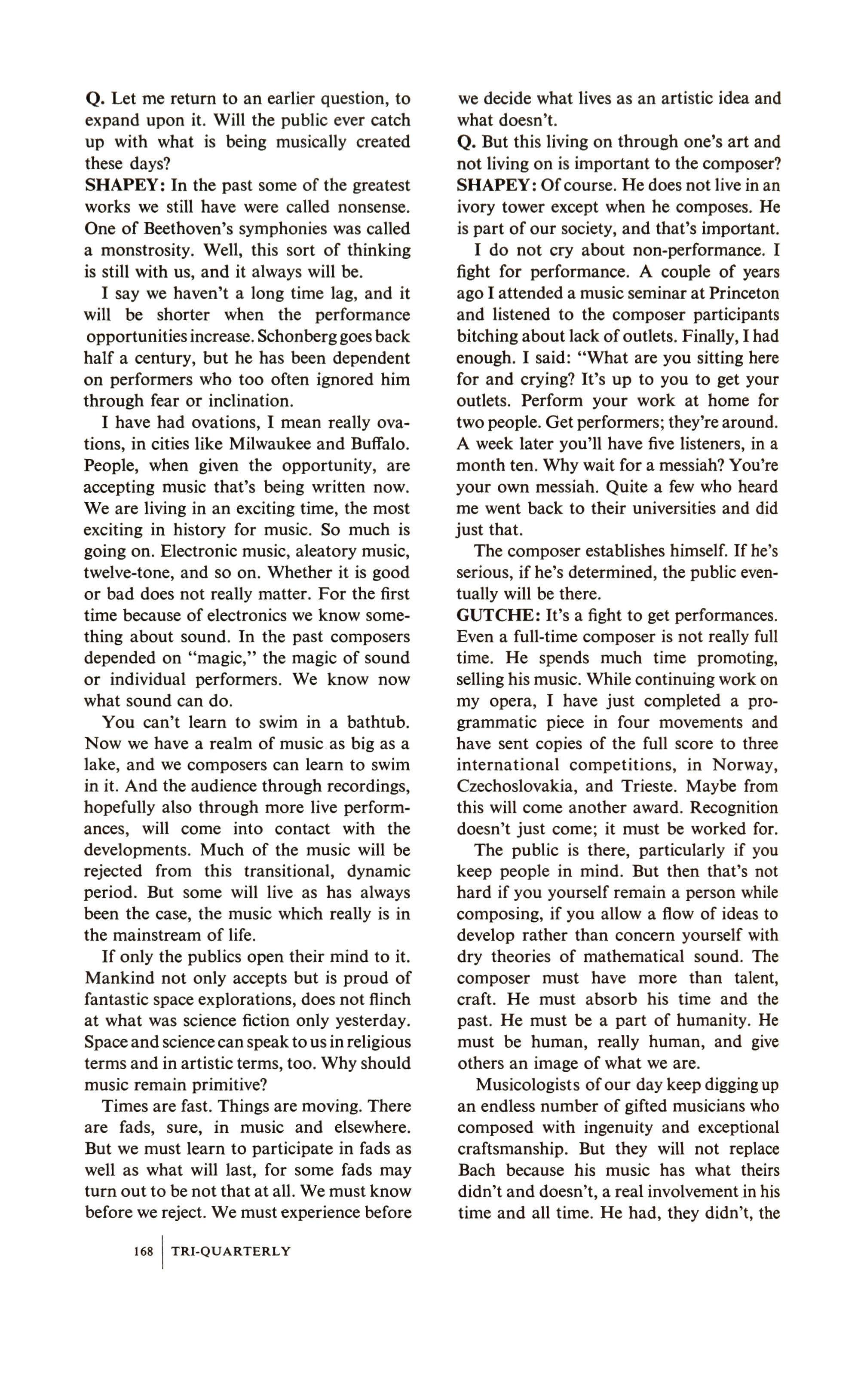
Q. Let me return to an earlier question, to expand upon it. Will the public ever catch up with what is being musically created these days?
SHAPEY: In the past some of the greatest works we still have were called nonsense. One of Beethoven's symphonies was called a monstrosity. Well, this sort of thinking is still with us, and it always will be.
I say we haven't a long time lag, and it will be shorter when the performance opportunities increase. Schonberg goes back half a century, but he has been dependent on performers who too often ignored him through fear or inclination.
I have had ovations, I mean really ovations, in cities like Milwaukee and Buffalo. People, when given the opportunity, are accepting music that's being written now. We are living in an exciting time, the most exciting in history for music. So much is going on. Electronic music, aleatory music, twelve-tone, and so on. Whether it is good or bad does not really matter. For the first time because of electronics we know something about sound. In the past composers depended on "magic," the magic of sound or individual performers. We know now what sound can do.
You can't learn to swim in a bathtub. Now we have a realm of music as big as a lake, and we composers can learn to swim in it. And the audience through recordings, hopefully also through more live performances, will come into contact with the developments. Much of the music will be rejected from this transitional, dynamic period. But some will live as has always been the case, the music which really is in the mainstream of life.
If only the publics open their mind to it. Mankind not only accepts but is proud of fantastic space explorations, does not flinch at what was science fiction only yesterday. Space and science can speak to us in religious terms and in artistic terms, too. Why should music remain primitive?
Times are fast. Things are moving. There are fads, sure, in music and elsewhere. But we must learn to participate in fads as well as what will last, for some fads may turn out to be not that at all. We must know before we reject. We must experience before
we decide what lives as an artistic idea and what doesn't.
Q. But this living on through one's art and not living on is important to the composer?
SHAPEY: Of course. He does not live in an ivory tower except when he composes. He is part of our society, and that's important. I do not cry about non-performance. I fight for performance. A couple of years ago I attended a music seminar at Princeton and listened to the composer participants bitching about lack ofoutlets. Finally, I had enough. I said: "What are you sitting here for and crying? It's up to you to get your outlets. Perform your work at home for two people. Get performers; they're around. A week later you'll have five listeners, in a month ten. Why wait for a messiah? You're your own messiah. Quite a few who heard me went back to their universities and did just that.
The composer establishes himself. If he's serious, if he's determined, the public eventually will be there.
GUTCHE: It's a fight to get performances. Even a full-time composer is not really full time. He spends much time promoting, selling his music. While continuing work on my opera, I have just completed a programmatic piece in four movements and have sent copies of the full score to three international competitions, in Norway, Czechoslovakia, and Trieste. Maybe from this will come another award. Recognition doesn't just come; it must be worked for.
The public is there, particularly if you keep people in mind. But then that's not hard if you yourself remain a person while composing, if you allow a flow of ideas to develop rather than concern yourself with dry theories of mathematical sound. The composer must have more than talent, craft. He must absorb his time and the past. He must be a part of humanity. He must be human, really human, and give others an image of what we are.
Musicologists of our day keep digging up an endless number of gifted musicians who composed with ingenuity and exceptional craftsmanship. But they will not replace Bach because his music has what theirs didn't and doesn't, a real involvement in his time and all time. He had, they didn't, the
168 TRI·QUARTERLY

drive ofinquiry into humanity, the capacity and the depthless vacuity to absorb anything and everything. The essence of great genius is to be a glutton, to eat facts, ideas, and intellectual food until sick to the intellectual stomach and then spew out the kernel of life and substance.
The composer who is to matter must write music which really deals with our time. Technique is incidental, just as with the good baker who uses a mold to bake something that fits the product. The good baker knows ingredients; these are what count so much more than the shape.
The ingredients reach the public. The ideas communicate, not the technique. To touch the public, that is the task and hope. As an artist my most important striving is to reach for those moments when all is as petrified and yet as magnified and electrified. Time stops for two bars of music or twelve minutes. These are the moments when genius speaks, when minds are fused. For such moments the artist searches and works.
And so they spoke, these two serious, thoughtful men who believe strongly, if somewhat differently, in the music of our time for our time and who know there must be union between creator and auditor. And yet concern persists, and the author decided to speak with a listener, to hold a dialogue with himself about the musical estrangement, and where it is leading an art form that has been so transcendent of time.
Q. What's wrong with music, as it is composed for today and tomorrow?
LISTENER: Something is wrong when the BBC can broadcast a composition called "Mobile for Tape and Percussion" by a young avant-garde Pole, Piotr Zak. It was twelve minutes of grating sound, and of it the London Times critics wrote: "It was certainly difficult to grasp more than the music's broad outlines, partly because of the high proportion of unpitched sounds and partly because of their extreme diversity." Well, actually this was not a real, honest-to-goodness composition. There was no Piotr Zak, He was made up as was the music by two prankish BBC employees who went into a studio and banged away on all
sorts of instruments and whatever else was about.
Now, to me this does not make the Times critic stupid. Quite the contrary, it shows he's human and is as naturally befuddled by this way-out nonsense as the rest of us. Who's to know from listening to some of the sound generated by sledgehammers and electronic machines whether these guys are for serious?
Q. You don't mean that all modern music is this way?
LISTENER: No. But there exists a mood in which each composer tries to outdo the other in evolving new combinations of sounds and rhythm or unrhythm patterns. The public seems to be told, "Go away. Leave us alone. We're artists, and we can do what we want. Go along with us or don't. We're right, and if you don't like what we do, you're wrong."
Q. Hasn't the composer the right to believe what he wants, just as anyone else?
LISTENER: Yes, to a point. But no when in numbers they endanger the future of music as a living, thriving, changing art form that communicates. It is like beliefs beingallowed to degenerate into rioting.
Q. Aren't you being overly emotional about it?
Listener: Music is an art of the emotions. I don't like having the emotions drained from it.
Q. Well, but
LISTENER: I'mconcernedwhenIgo to concerts really with an open mind, receptive to the possibilities of hearing new beauties, of having new musical concepts opened to me, of hearing something besides the old and familiar masters, wonderful as they are -I'm concerned when I go and am either bored or repelled by so much of what parades under the title of new music. It seems to go nowhere. It gives naught to memory or to feeling. And I've heard some several times. Familiarity does not breed pleasure.
Q. What do you expect of today's composer?
LISTENER: To allow me to enter in, not to grease the way for me, but not to bar the doors. It concerns me when those like Virgil Thomson consider all musicians a
TRI-QUARTERLY 169
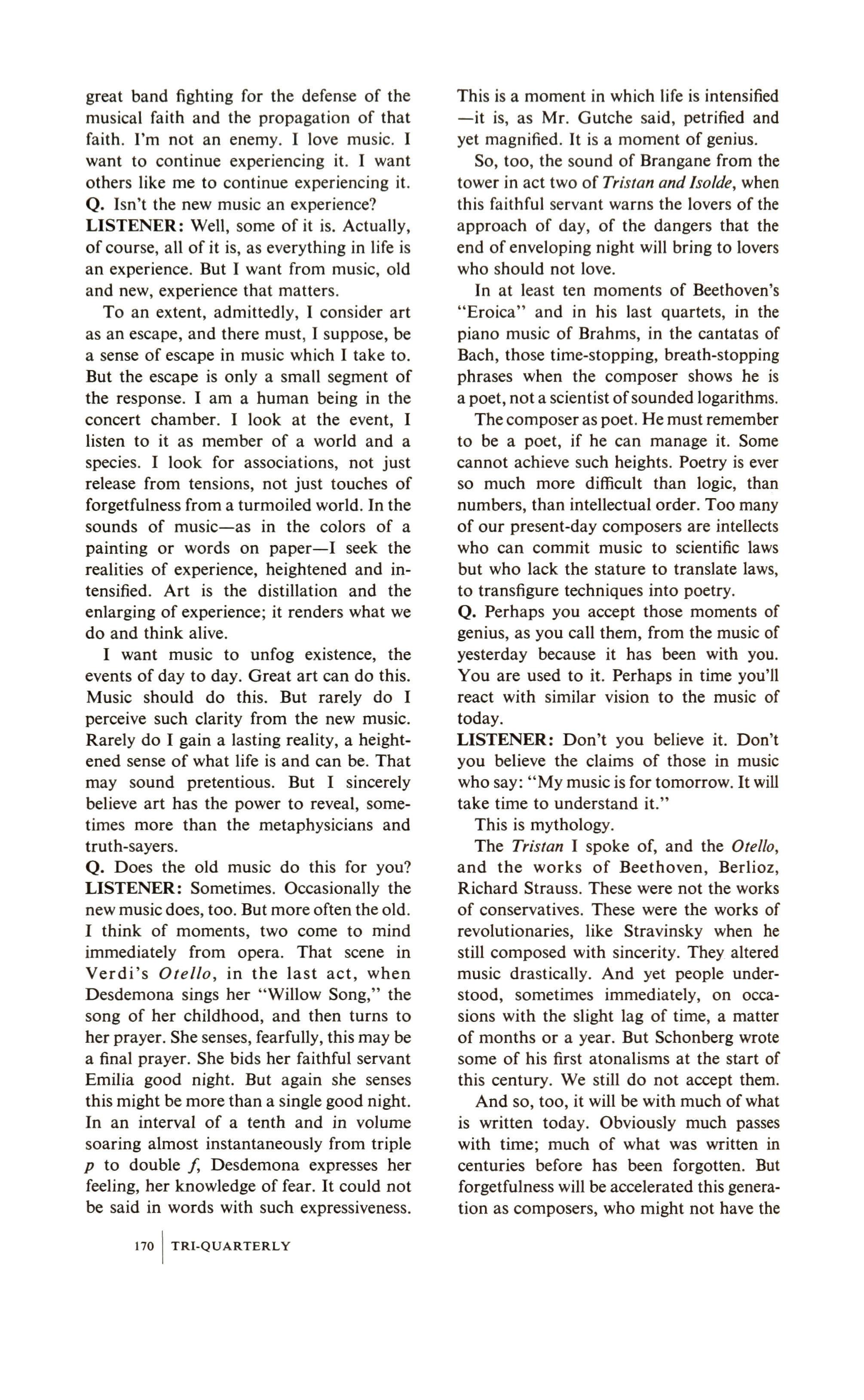
great band fighting for the defense of the musical faith and the propagation of that faith. I'm not an enemy. I love music. I want to continue experiencing it. I want others like me to continue experiencing it.
Q. Isn't the new music an experience?
LISTENER: Well, some of it is. Actually, of course, all of it is, as everything in life is an experience. But I want from music, old and new, experience that matters.
To an extent, admittedly, I consider art as an escape, and there must, I suppose, be a sense of escape in music which I take to. But the escape is only a small segment of the response. I am a human being in the concert chamber. I look at the event, I listen to it as member of a world and a species. I look for associations, not just release from tensions, not just touches of forgetfulness from a turmoiled world. In the sounds of music as in the colors of a painting or words on paper I seek the realities of experience, heightened and intensified. Art is the distillation and the enlarging of experience; it renders what we do and think alive.
I want music to unfog existence, the events of day to day. Great art can do this. Music should do this. But rarely do I perceive such clarity from the new music. Rarely do I gain a lasting reality, a heightened sense of what life is and can be. That may sound pretentious. But I sincerely believe art has the power to reveal, sometimes more than the metaphysicians and truth-sayers.
Q. Does the old music do this for you? LISTENER: Sometimes. Occasionally the new music does, too. But more often the old. I think of moments, two come to mind immediately from opera. That scene in Verdi's Otello, in the last act, when Desdemona sings her "Willow Song," the song of her childhood, and then turns to her prayer. She senses, fearfully, this may be a final prayer. She bids her faithful servant Emilia good night. But again she senses this might be more than a single good night. In an interval of a tenth and in volume soaring almost instantaneously from triple p to double f, Desdemona expresses her feeling, her knowledge of fear. It could not be said in words with such expressiveness.
This is a moment in which life is intensified -it is, as Mr. Gutche said, petrified and yet magnified. It is a moment of genius.
So, too, the sound of Brangane from the tower in act two of Tristan and Isolde, when this faithful servant warns the lovers of the approach of day, of the dangers that the end of enveloping night will bring to lovers who should not love.
In at least ten moments of Beethoven's "Eroica" and in his last quartets, in the piano music of Brahms, in the cantatas of Bach, those time-stopping, breath-stopping phrases when the composer shows he is a poet, not a scientist ofsounded logarithms.
The composer as poet. He must remember to be a poet, if he can manage it. Some cannot achieve such heights. Poetry is ever so much more difficult than logic, than numbers, than intellectual order. Too many of our present-day composers are intellects who can commit music to scientific laws but who lack the stature to translate laws, to transfigure techniques into poetry.
Q. Perhaps you accept those moments of genius, as you call them, from the music of yesterday because it has been with you. You are used to it. Perhaps in time you'll react with similar vision to the music of today.
LISTENER: Don't you believe it. Don't you believe the claims of those in music who say: "My music is for tomorrow. It will take time to understand it."
This is mythology.
The Tristan I spoke of, and the Otello, and the works of Beethoven, Berlioz, Richard Strauss. These were not the works of conservatives. These were the works of revolutionaries, like Stravinsky when he still composed with sincerity. They altered music drastically. And yet people understood, sometimes immediately, on occasions with the slight lag of time, a matter of months or a year. But Schonberg wrote some of his first atonalisms at the start of this century. We still do not accept them.
And so, too, it will be with much of what is written today. Obviously much passes with time; much of what was written in centuries before has been forgotten. But forgetfulness will be accelerated this generation as composers, who might not have the
170 TRI·QUARTERLY
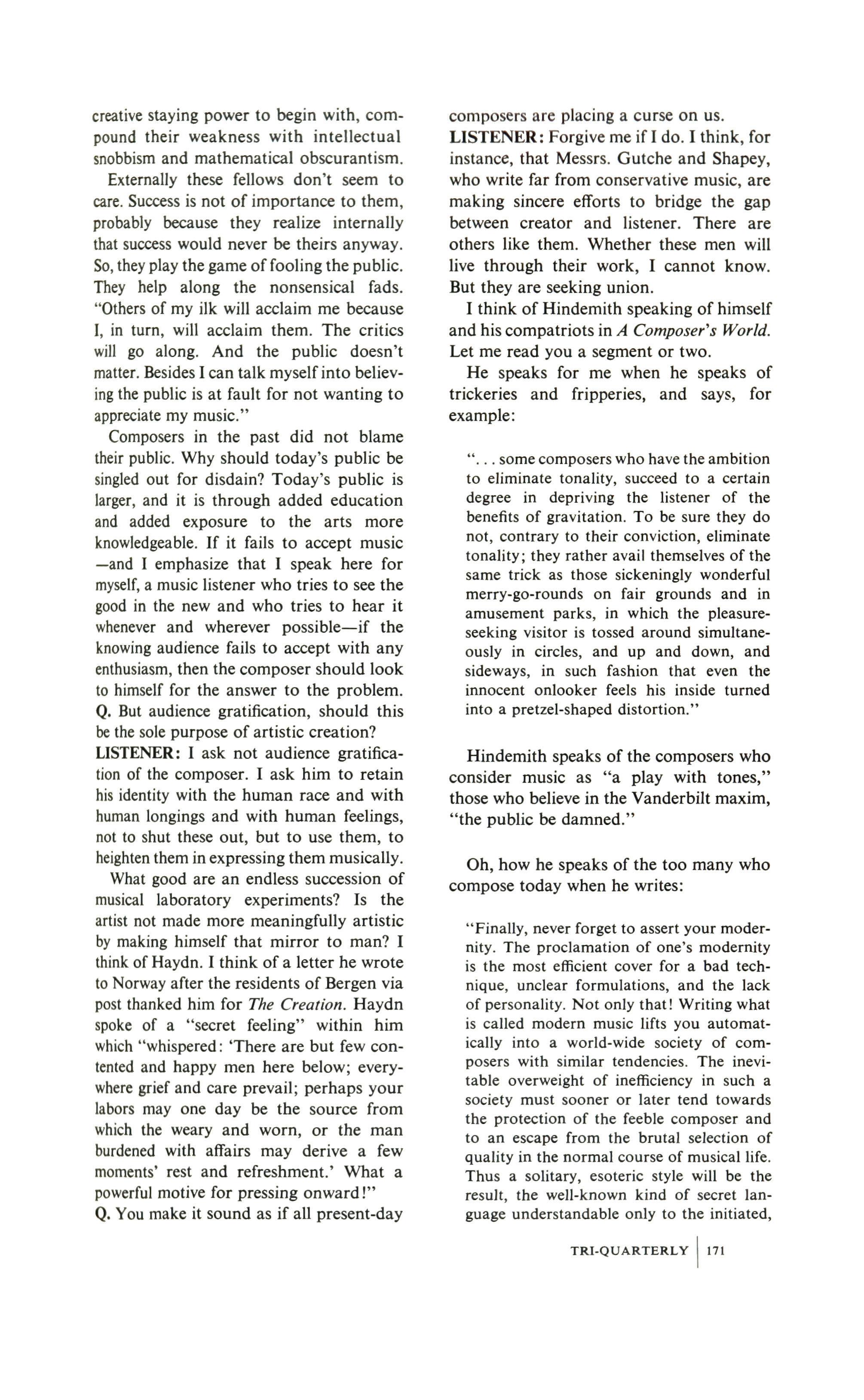
creative staying power to begin with, compound their weakness with intellectual snobbism and mathematical obscurantism.
Externally these fellows don't seem to care. Success is not of importance to them, probably because they realize internally that success would never be theirs anyway. So, they play the game of fooling the public. They help along the nonsensical fads. "Others of my ilk will acclaim me because I, in turn, will acclaim them. The critics will go along. And the public doesn't matter. Besides I can talk myselfinto believing the public is at fault for not wanting to appreciate my music."
Composers in the past did not blame their public. Why should today's public be singled out for disdain? Today's public is larger, and it is through added education and added exposure to the arts more knowledgeable. If it fails to accept music -and I emphasize that I speak here for myself, a music listener who tries to see the good in the new and who tries to hear it whenever and wherever possible if the knowing audience fails to accept with any enthusiasm, then the composer should look to himself for the answer to the problem.
Q. But audience gratification, should this be the sole purpose of artistic creation?
LISTENER: I ask not audience gratification of the composer. I ask him to retain his identity with the human race and with human longings and with human feelings, not to shut these out, but to use them, to heighten them in expressing them musically.
What good are an endless succession of musical laboratory experiments? Is the artist not made more meaningfully artistic by making himself that mirror to man? I think of Haydn. I think of a letter he wrote to Norway after the residents of Bergen via post thanked him for The Creation. Haydn spoke of a "secret feeling" within him which "whispered: 'There are but few contented and happy men here below; everywhere grief and care prevail; perhaps your labors may one day be the source from which the weary and worn, or the man burdened with affairs may derive a few moments' rest and refreshment.' What a powerful motive for pressing onward !"
Q. You make it sound as if all present-day
composers are placing a curse on us.
LISTENER: Forgive me if I do. I think, for instance, that Messrs. Gutche and Shapey, who write far from conservative music, are making sincere efforts to bridge the gap between creator and listener. There are others like them. Whether these men will live through their work, I cannot know. But they are seeking union.
I think of Hindemith speaking of himself and his compatriots in A Composer's World. Let me read you a segment or two.
He speaks for me when he speaks of trickeries and fripperies, and says, for example:
some composers who have the ambition to eliminate tonality. succeed to a certain degree in depriving the listener of the benefits of gravitation. To be sure they do not, contrary to their conviction, eliminate tonality; they rather avail themselves of the same trick as those sickeningly wonderful merry-go-rounds on fair grounds and in amusement parks, in which the pleasureseeking visitor is tossed around simultaneously in circles, and up and down, and sideways, in such fashion that even the innocent onlooker feels his inside turned into a pretzel-shaped distortion."
Hindernith speaks of the composers who consider music as "a play with tones," those who believe in the Vanderbilt maxim, "the public be damned."
Oh, how he speaks of the too many who compose today when he writes:
"Finally, never forget to assert your modernity. The proclamation of one's modernity is the most efficient cover for a bad technique, unclear formulations, and the lack of personality. Not only that! Writing what is called modern music lifts you automatically into a world-wide society of composers with similar tendencies. The inevitable overweight of inefficiency in such a society must sooner or later tend towards the protection of the feeble composer and to an escape from the brutal selection of quality in the normal course of musical life. Thus a solitary, esoteric style will be the result, the well-known kind of secret language understandable only to the initiated,
TRl-QUARTERLY 171
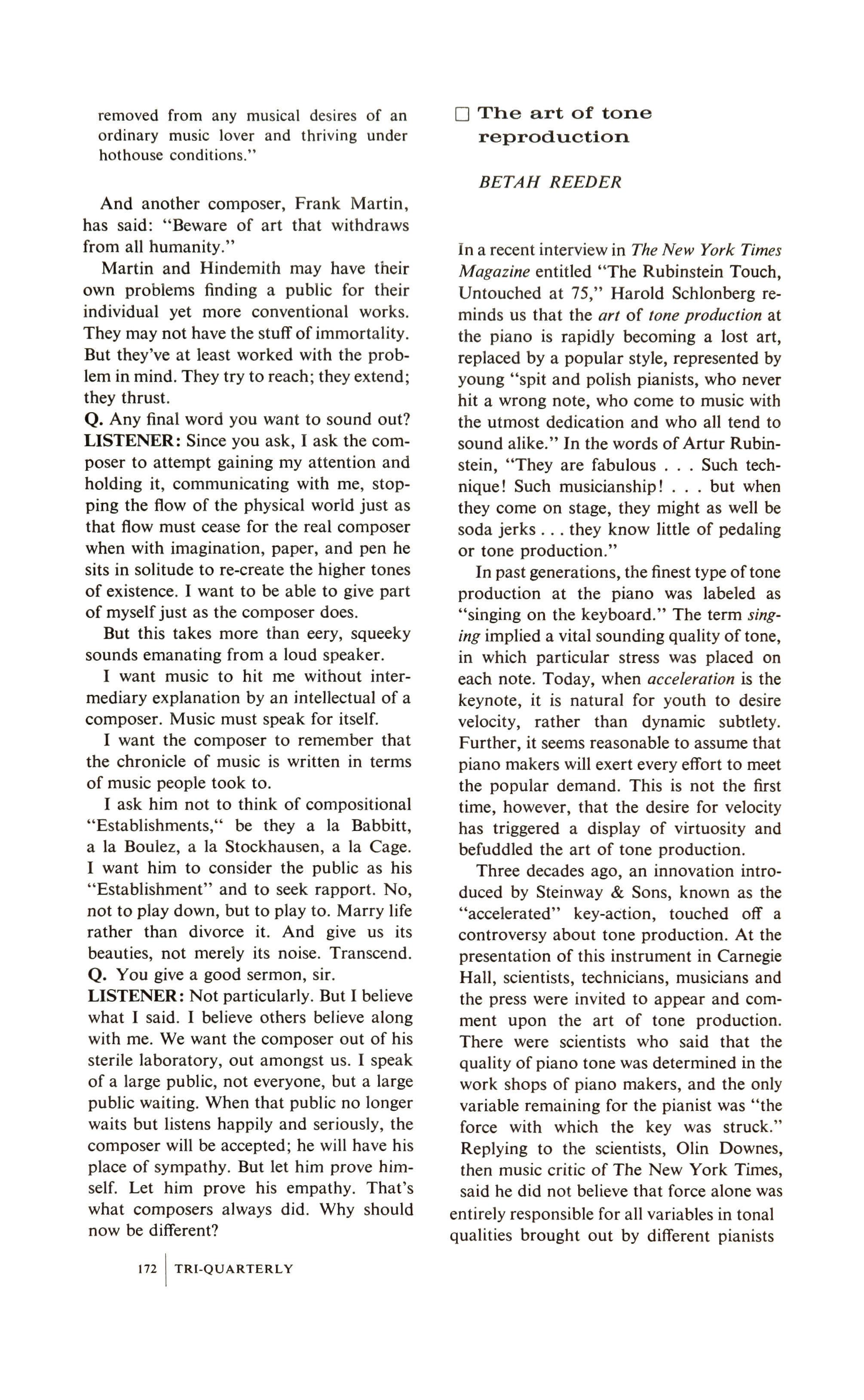
removed from any musical desires of an ordinary music lover and thriving under hothouse conditions."
And another composer, Frank Martin, has said: "Beware of art that withdraws from all humanity."
Martin and Hindemith may have their own problems finding a public for their individual yet more conventional works. They may not have the stuff of immortality. But they've at least worked with the problem in mind. They try to reach; they extend; they thrust.
Q. Any final word you want to sound out?
LISTENER: Since you ask, I ask the composer to attempt gaining my attention and holding it, communicating with me, stopping the flow of the physical world just as that flow must cease for the real composer when with imagination, paper, and pen he sits in solitude to re-create the higher tones of existence. I want to be able to give part of myselfjust as the composer does.
But this takes more than eery, squeeky sounds emanating from a loud speaker.
I want music to hit me without intermediary explanation by an intellectual of a composer. Music must speak for itself.
I want the composer to remember that the chronicle of music is written in terms of music people took to.
I ask him not to think of compositional "Establishments," be they a la Babbitt, a la Boulez, a la Stockhausen, a la Cage. I want him to consider the public as his "Establishment" and to seek rapport. No, not to play down, but to play to. Marry life rather than divorce it. And give us its beauties, not merely its noise. Transcend. Q. You give a good sermon, sir.
LISTENER: Not particularly. But I believe what I said. I believe others believe along with me. We want the composer out of his sterile laboratory, out amongst us. I speak of a large public, not everyone, but a large public waiting. When that public no longer waits but listens happily and seriously, the composer will be accepted; he will have his place of sympathy. But let him prove himself. Let him prove his empathy. That's what composers always did. Why should now be different?
o The art of tone reproduction
BETAH REEDER
In a recent interview in The New York Times Magazine entitled "The Rubinstein Touch, Untouched at 75," Harold Schlonberg reminds us that the art of tone production at the piano is rapidly becoming a lost art, replaced by a popular style, represented by young "spit and polish pianists, who never hit a wrong note, who come to music with the utmost dedication and who all tend to sound alike." In the words of Artur Rubinstein, "They are fabulous Such technique! Such musicianship! but when they come on stage, they might as well be soda jerks they know little of pedaling or tone production."
In past generations, the finest type of tone production at the piano was labeled as "singing on the keyboard. The term singing implied a vital sounding quality of tone, in which particular stress was placed on each note. Today, when acceleration is the keynote, it is natural for youth to desire velocity, rather than dynamic subtlety. Further, it seems reasonable to assume that piano makers will exert every effort to meet the popular demand. This is not the first time, however, that the desire for velocity has triggered a display of virtuosity and befuddled the art of tone production.
Three decades ago, an innovation introduced by Steinway & Sons, known as the "accelerated" key-action, touched off a controversy about tone production. At the presentation of this instrument in Carnegie Hall, scientists, technicians, musicians and the press were invited to appear and comment upon the art of tone production. There were scientists who said that the quality of piano tone was determined in the work shops of piano makers, and the only variable remaining for the pianist was "the force with which the key was struck." Replying to the scientists, Olin Downes, then music critic of The New York Times, said he did not believe that force alone was entirely responsible for all variables in tonal qualities brought out by different pianists 172 TRI-QUARTERLY

from the same instrument. The thunderous applause which greeted this statement made it clear that the audience of professional musicians was wholeheartedly in agreement with Mr. Downes.
Unquestionably, the force with which the key is struck influences both the quality and the loudness of tone, and, when overstressed, its intonation. But to argue that force alone is entirely responsible for a quality of tone that "swells-out" in a smooth flowing vital sound, remains, as yet, a moot question. It might be well to recall that it took 2,500 years to develop the scientific facilities for perfecting the piano touch-action. Not until the latter part of the 19th century were the mechanics of the piano touch-action completely developed, and a golden era of pianism arose.
Ideas of scientists, technicians and musicians naturally provide incentive for instrumental innovations, which, in turn, influence the taste and style in musical performance. Because in past generations great pianists were Innovators, composers, teachers and performers, their opinions were duly taken into account. As the piano industry scientifically developed a more perfect instrument, pianists cultivated greater "refinement and taste in the execution of touch and developed greater virtuosity in the use of dynamics. With the rapid development of the square, the upright and the modern concert grand piano, musicians were aware of instrument innovations, and, as a consequence, there was much controversy about the merits and demerits of piano touch-actions. When the first cast-iron piano frame appeared in 1825, a radical change in musical style soon followed. The graceful embellishments and refined virtuosity of the early Classic period were replaced by the more expressive and dynamic style of the Romantic. This was not the first time nor was it to be the last that technical innovations influenced the development of a musical style.
As far back as the 16th century, there appeared a "hammer clavier," a keyboard string instrument which produced tone by a hammer blow in a manner not unlike the
modern grand piano. On this early "piano e forte", the hammer was hung from a rod on the action frame, and an under-lever with a fixed upright jack rested on the rear of the key. There were back-checks for stopping a rebound of hammer on the string, and over-dampers for stopping tone, but no automatic escapement-action or pedals. When the key was depressed, the upright jack was raised until it came into contact with the hammer shank, at which point the hammer had to be whipped free of the jack, in order to produce a freely rebounding blow on the string. The hammer head, a small leather-covered wooden knob at the end of the hammer shank, produced a dull thud on the string, but a melody could be made to sing out above a simple rhythmicaccompaniment. Although a softer or louder tone could be produced, the difficulties encountered in the actual producing of a reliable tone caused most harpsichordists to decry the clumsy touchaction of this early pianoforte. Not until an escapement-action and a damper pedal appeared a couple of centuries later, did the pianoforte become popular.
Meanwhile, the harpsichord was the most popular keyboard string instrument. On the harpsichord, tone was produced by a mechanical plucking device, which had a quill or small piece of leather fastened to the side of an uprightjack set on the rear of the key. The distance this device could displace the string was uniform, and, as a consequence, the strength and the twang quality of the tone could not be altered by the touch on the key. To repeat tone, the key had to be released completely in order to dampen the string and reset the plectrum (plucking device). From necessity, harpsichordists developed a high precise finger stroke, in which clean articulation of notes was the technical aim, not dynamic nuance. Virtuosity was displayed by the manner in which a melody was embellished by musical devices in the form of grace notes, trills, turns, scales, and arpeggio patterns. Concerts took the form of public competitions in the art of improvising variations upon a given theme (tune), an extemporaneous musical style not unlike modern jazz.
The third type of keyboard string instru-
TRI-QUARTERLY 173

ment, the clavichord, was more sensitive, but the nature of its tone was weaker. When its key was depressed, a metal tangent set on the rear rose to tap the string lightly. Too great a pressure caused the tangent to slip on the string and disturb its intonation; consequently, clavichordists strove to cultivate a non-percussive, intimate, and sensitive type of touch. Carl Phillip Emanuel Bach was the first to write of the "singing tone" and "refinement and taste in the execution of touch." In his treatise upon the true method of playing the clavichord, he reaffirrr.ed the principles laid down by his illustrious father, Johann Sebastian Bach,who "preferred the sensitive touch of the clavichord to the inexpressive one of the harpsichord." On the clavichord, a musical device known as a "bebung' (slight trembling up and down movement of the key), produced a vibrato type of touch which C. P. E. Bach described clearly: "After striking each note, I can give a fresh pressure." It was said that Bach's fingers were "bent over the keyboard in such a manner that they stood with their points downwards in a vertical line, each finger at every moment ready for action."
Throughout the 17th and 18th centuries, champions of the harpsichord and the clavichord extolled the particular virtues of their favorite instrument. Christopher Gottlieb Schroter, a contemporary of J. S. Bach, complained that "the study upon the expressive clavichord was thrown away when they (his pupils) came to show off before their friends upon so different an instrument as the inexpressive harpsichord." Schroter's dissatisfaction with the inexpressive touch of the harpsichord and the weak toned clavichord aroused his interest in the much neglected "piano e forte." In fact, he became one of the many inventors who sought to work out a mechanical escapement for the hammer blow. He even suggested the use of iron in the construction of a piano frame with sufficient tensile resistance to withstand a forceful blow, a feature not successfully achieved for another hundred years.'
From a study of the nature of clavier instruments, it became obvious that the art of tone production arose from the clavi-
chord and the early pianoforte, not the harpsichord. As the pianoforte touch-action developed greater efficiency, the art of tone production and dynamic nuance became a mark of musicianship rather than the art of improvisation, and gradually the harpsichordist was replaced by the piano recitalist.
The most famous harpsichordist of the 18th century, Wolfgang Amadeus Mozart, became interested in t he pianoforteonly after an escapement-action appeared on a Viennese make, of which he said: "It never blocks and it never fails to sound." The touch-action of the Viennese pianoforte was very superficial; the key was mounted on a center button and the hammer was fastened to a fixed jack set on the rear of the key. There was no under-lever between hammer and key. When the key was depressed, the jack lifted the butt of the hammer until blocked, at which point tl: e head of the hammer was automatically flung upwards to strike the blow. The blow was reliable, but it was executed in a less direct manner than the early pianoforte, and, as a consequence, the tone was clear and ringing, but less vital sounding. The touch cultivated for this instrument was light and superficial, a type known as leggiero (lightly). Because the key had to be released in order to dampen the string and repeat tone, the artistic aim of the Vienne e piano, like that of the harpsichord, was clean articulation and velocity. It is doubtful that Mozart ever played upon any other type of pianoforte in public, which may account for his light, fluent, facile style of technique, in which clean articulation of notes was stressed at the expense of dynamic nuance. According to Ludwig van Beethoven, "Mozart, with all his genius and charm of cantilena, on the importance of which he dwelt by precept no less than by example, was yet not the pianoforte player in the same sense as Clementi; his technique was that of the harpsichord."
Muzio Clementi, a contemporary of Mozart, first won fame as a harpsichordist, but after playing an English make of pianoforte, he showed great interest in its manufacture and exerted considerable influence upon its subsequent innovations. Clementi was the first important composer to write
!74 TRI-QUARTERLY
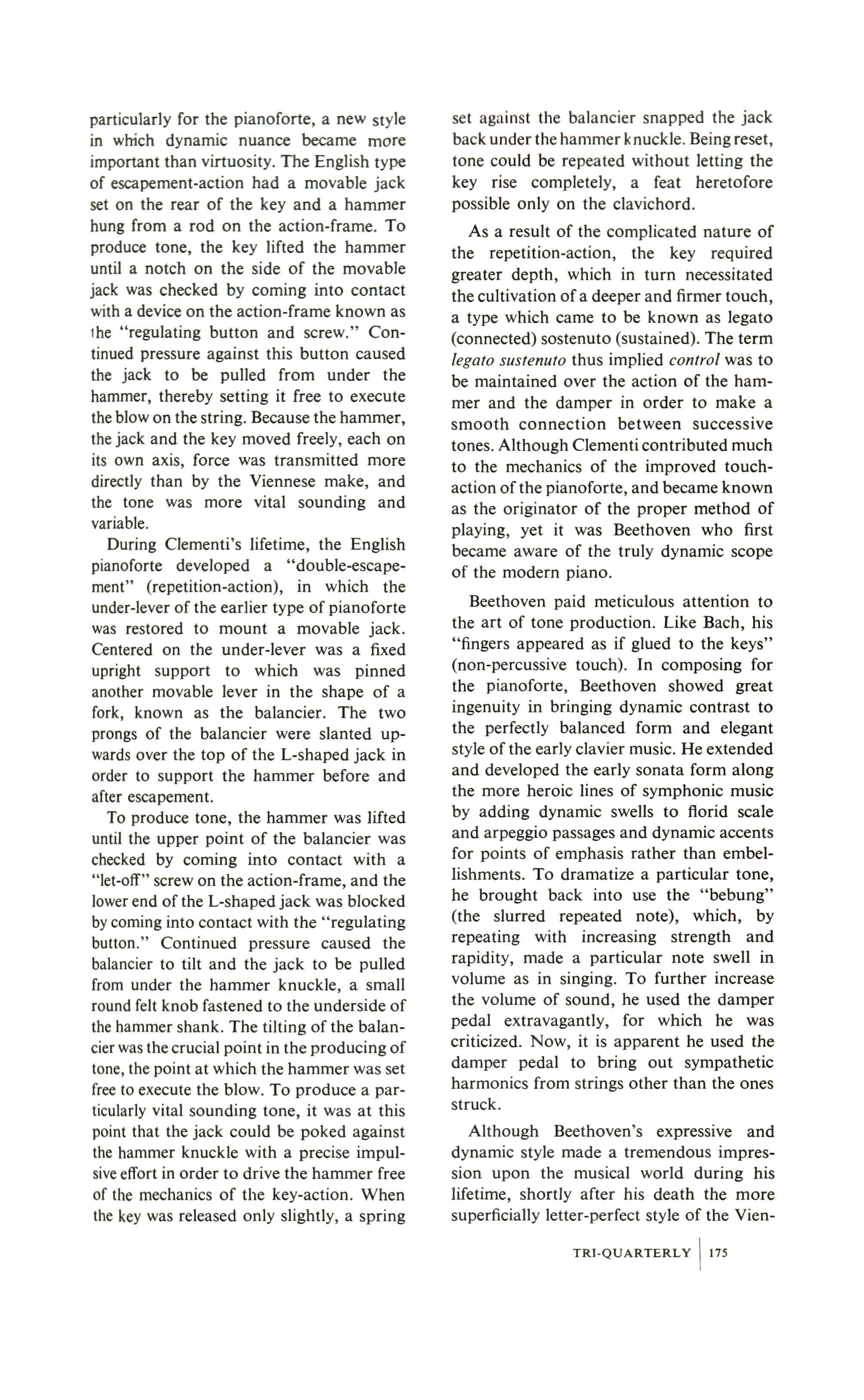
particularly for the pianoforte, a new style in which dynamic nuance became more important than virtuosity. The English type of escapement-action had a movable jack set on the rear of the key and a hammer hung from a rod on the action-frame. To produce tone, the key lifted the hammer until a notch on the side of the movable jack was checked by coming into contact with a device on the action-frame known as the "regulating button and screw." Continued pressure against this button caused the jack to be pulled from under the hammer, thereby setting it free to execute the blow on the string. Because the hammer, the jack and the key moved freely, each on its own axis, force was transmitted more directly than by the Viennese make, and the tone was more vital sounding and variable.
During Clementi's lifetime, the English pianoforte developed a "double-escapement" (repetition-action), in which the under-lever of the earlier type of pianoforte was restored to mount a movable jack. Centered on the under-lever was a fixed upright support to which was pinned another movable lever in the shape of a fork, known as the balancier. The two prongs of the balancier were slanted upwards over the top of the L-shaped jack in order to support the hammer before and after escapement.
To produce tone, the hammer was lifted until the upper point of the balancier was checked by coming into contact with a "let-off" screw on the action-frame, and the lower end of the L-shaped jack was blocked by coming into contact with the "regulating button." Continued pressure caused the balancier to tilt and the jack to be pulled from under the hammer knuckle, a small round felt knob fastened to the underside of the hammer shank. The tilting of the balancier was the crucial point in the producing of tone, the point at which the hammer was set free to execute the blow. To produce a particularly vital sounding tone, it was at this point that the jack could be poked against the hammer knuckle with a precise impulsive effort in order to drive the hammer free of the mechanics of tile key-action. When the key was released only slightly, a spring
set against the balancier snapped the jack back under the hammer knuckle. Being reset, tone could be repeated without letting the key rise completely, a feat heretofore possible only on the clavichord.
As a result of the complicated nature of the repetition-action, the key required greater depth, which in turn necessitated the cultivation of a deeper and firmer touch, a type which came to be known as legato (connected) sostenuto (sustained). The term legato sustenuto thus implied control was to be maintained over the action of the hammer and the damper in order to make a smooth connection between successive tones. Although Clementi contributed much to the mechanics of the improved touchaction of the pianoforte, and became known as the originator of the proper method of playing, yet it was Beethoven who first became aware of the truly dynamic scope of the modern piano.
Beethoven paid meticulous attention to the art of tone production. Like Bach, his "fingers appeared as if glued to the keys" (non-percussive touch). In composing for the pianoforte, Beethoven showed great ingenuity in bringing dynamic contrast to the perfectly balanced form and elegant style of the early clavier music. He extended and developed the early sonata form along the more heroic lines of symphonic music by adding dynamic swells to florid scale and arpeggio passages and dynamic accents for points of emphasis rather than embellishments. To dramatize a particular tone, he brought back into use the "bebung" (the slurred repeated note), which, by repeating with increasing strength and rapidity, made a particular note swell in volume as in singing. To further increase the volume of sound, he used the damper pedal extravagantly, for which he was criticized. Now, it is apparent he used the damper pedal to bring out sympathetic harmonics from strings other than the ones struck.
Although Beethoven's expressive and dynamic style made a tremendous impression upon the musical world during his lifetime, shortly after his death the more superficially letter-perfect style of the Vien-
TRI-QUARTERLY 175

nese piano was revived. Johann Hummel, a young contemporary of Beethoven, and a pupil of both Mozart and Clementi, cultivated the more superficial style of the Viennese pianoforte, calculated to give the utmost in velocity. Karl Czerny, pupil of Hummel and ironically of Beethoven, also chose to develop a school of velocity, in which he used embellishment patterns to set up finger exercises, for the purpose of training a fluent style of technique, more like Mozart than Beethoven. It remained for Friedrich Wieck, a great admirer of Beethoven, to carryon the more expressive style of execution. Wieck wished to give the world something other than the "little fingerboard monkey performing marvels by rote." He realized his ambition in the playing of his daughter, Clara Schumann, who carried out principles laid down by her father that "the touch should never be audible, but only the musical sound." It was said that Clara's tone "was rich and vigorous without the slightest harshness and was obtained even in the loudest passages by pressure rather than by percussion. The fingers were held close to the keys, and seemed to squeeze instead of strike them, while the chords were grasped from the wrist rather than struck from the elbow."
However, it was Sigismond Thalberg, pupil of Hummel, who became famous for his art of "singing on the keyboard." Thalberg was the first to adapt his touch completely to the repetition-action. He learned the importance of a non-percussive touch, to which could be added a precise and sudden driving impulse against the resistance of the let-off button. He said: "The key should be felt, rather than struck kneaded as though with a boneless hand and fingers of velvet without forcibly striking the keys, but attacking them closely and nervously, and pressing them down with energy and vigour." Thalberg's art of tone production brought into vogue a new compositional style known as Songs without Words. Felix Mendelssohn, Frederic Chopin, Robert Schumann, Franz Liszt, and Johannes Brahms, the great composer-pianists of the 19th century, also were fully aware of the
evanescent quality of the piano tone and the advantages of using the damper pedal to create a more shimmeringatmosphericeffect.
A "singing touch" became the outstanding feature of the playing of Frederic Chopin, a progeny of the ClementiBeethoven method. Chopin said: "Everything is to be read cantabile, everything must be made to sing, the bass, the inner parts etc." In other words, he advocated proper nuance for each successive tone. Because Chopin devised means by which the natural conformation of the hand could be used at all times, regardless of how complicated the musical passage, he probably contributed more to the art of the piano than did his illustrious contemporaries. Like Beethoven, he brought back into use the slurred repeated note (bebung), the vibrato touch of the clavichord, and advocated passing the finger tips over each other in a gliding manner, particularly in chromatic passages. Although Chopin did not develop the dynamic virtuosity of Thalberg and Franz Liszt, his "refinement and taste in the execution of touch" was unsurpassed.
Despite the fact that the cast-iron piano frame appeared late in Beethoven's life, its full potentialities of dynamic power were not realized until Liszt's lifetime. Franz Liszt, pupil and protege of Czerny, developed the refined school of virtuosity into a more brilliant bravura one. Liszt took pleasure in building up tremendous climactic effect and tossing off florid scales and arpeggios, yet he too cultivated a beautiful singing style and composed songs without words, called Liebestraume, But there is little doubt that his transcriptions and arrangements of opera and orchestral scores brought into vogue a style of performance known as "orchestral thunder."
Heretofore, it was the custom to sit quietly in front of the keyboard with elbows slightly in advance of the body, forearms level with keys, and hands poised lightly over them, "each finger at every moment ready for action." As the strength of the instrument was increased, pianists in general began to feel that digital strength was not enough. The entire body was gradually brought into play to reinforce the grip on
176 TRI-QUARTERLY
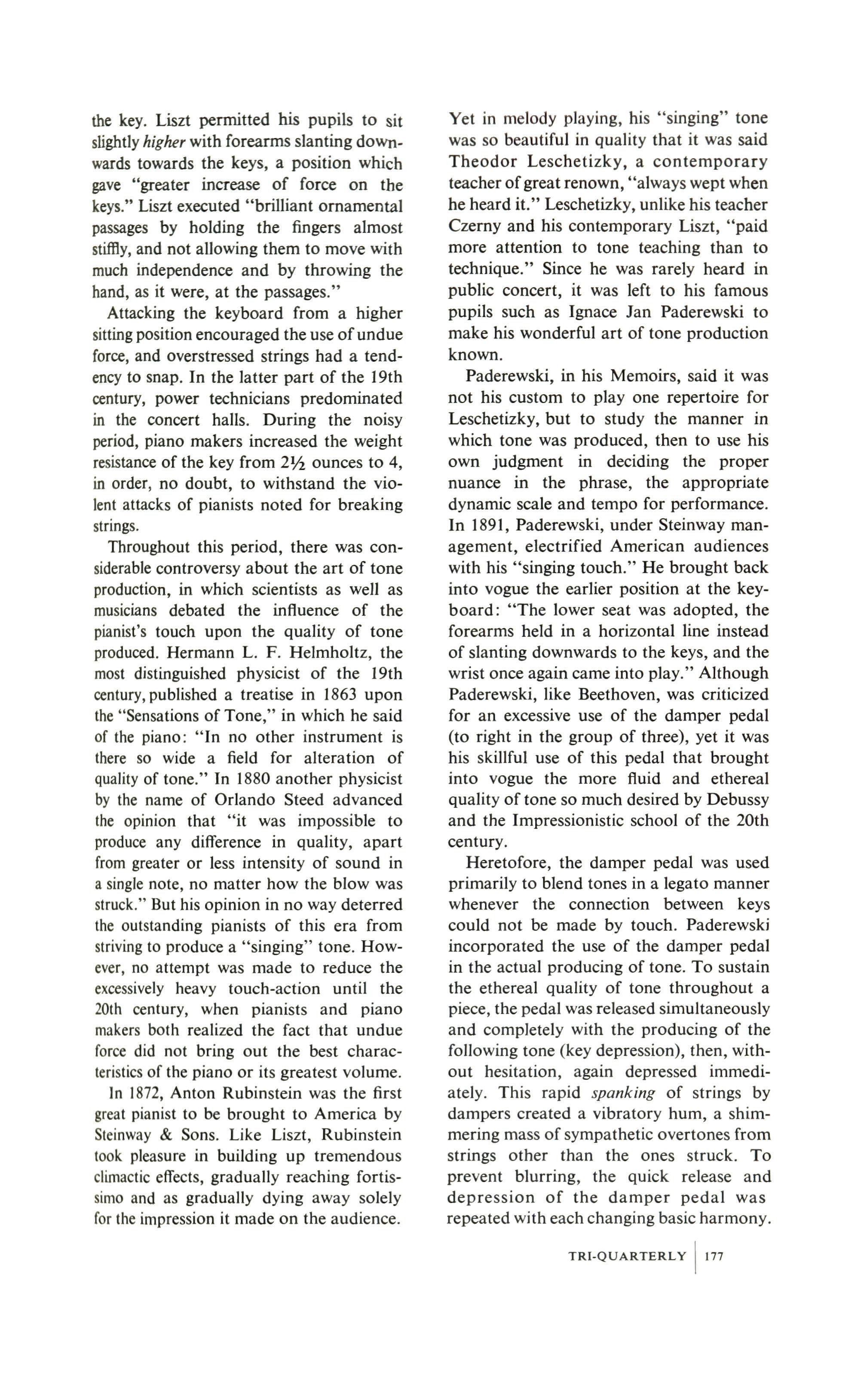
the key. Liszt permitted his pupils to sit slightlyhigher with forearms slanting down, wards towards the keys, a position which gave "greater increase of force on the keys." Liszt executed "brilliant ornamental passages by holding the fingers almost stiffly, and not allowing them to move with much independence and by throwing the hand, as it were, at the passages."
Attacking the keyboard from a higher sitting position encouraged the use of undue force, and overstressed strings had a tendency to snap. In the latter part of the 19th century, power technicians predominated in the concert halls. During the noisy period, piano makers increased the weight resistance of the key from 2Y2 ounces to 4, in order, no doubt, to withstand the violent attacks of pianists noted for breaking strings.
Throughout this period, there was considerable controversy about the art of tone production, in which scientists as well as musicians debated the influence of the pianist's touch upon the quality of tone produced. Hermann L. F. Helmholtz, the most distinguished physicist of the 19th century, published a treatise in 1863 upon the "Sensations of Tone," in which he said of the piano: "In no other instrument is there so wide a field for alteration of quality of tone." In 1880 another physicist by the name of Orlando Steed advanced the opinion that "it was impossible to produce any difference in quality, apart from greater or less intensity of sound in a single note, no matter how the blow was struck." But his opinion in no way deterred the outstanding pianists of this era from striving to produce a "singing" tone. However, no attempt was made to reduce the excessively heavy touch-action until the 20th century, when pianists and piano makers both realized the fact that undue force did not bring out the best characteristics of the piano or its greatest volume. In 1872, Anton Rubinstein was the first great pianist to be brought to America by Steinway & Sons. Like Liszt, Rubinstein took pleasure in building up tremendous climactic effects, gradually reaching fortissimo and as gradually dying away solely for the impression it made on the audience.
Yet in melody playing, his "singing" tone was so beautiful in quality that it was said Theodor Leschetizky, a contemporary teacher ofgreat renown, "always wept when he heard it." Leschetizky, unlike his teacher Czerny and his contemporary Liszt, "paid more attention to tone teaching than to technique." Since he was rarely heard in public concert, it was left to his famous pupils such as Ignace Jan Paderewski to make his wonderful art of tone production known.
Paderewski, in his Memoirs, said it was not his custom to play one repertoire for Leschetizky, but to study the manner in which tone was produced, then to use his own judgment in deciding the proper nuance in the phrase, the appropriate dynamic scale and tempo for performance. In 1891, Paderewski, under Steinway management, electrified American audiences with his "singing touch." He brought back into vogue the earlier position at the keyboard: "The lower seat was adopted, the forearms held in a horizontal line instead of slanting downwards to the keys, and the wrist once again came into play." Although Paderewski, like Beethoven, was criticized for an excessive use of the damper pedal (to right in the group of three), yet it was his skillful use of this pedal that brought into vogue the more fluid and ethereal quality of tone so much desired by Debussy and the Impressionistic school of the 20th century.
Heretofore, the damper pedal was used primarily to blend tones in a legato manner whenever the connection between keys could not be made by touch. Paderewski incorporated the use of the damper pedal in the actual producing of tone. To sustain the ethereal quality of tone throughout a piece, the pedal was released simultaneously and completely with the producing of the following tone (key depression), then, without hesitation, again depressed immediately. This rapid spanking of strings by dampers created a vibratory hum, a shimmering mass of sympathetic overtones from strings other than the ones struck. To prevent blurring, the quick release and depression of the damper pedal was repeated with each changing basic harmony.
TRI-QUARTERLY 177

To sustain and "feather-out" a tone gradually, the damper pedal was released only partially, then jiggled up and down from the depressed position in order to make the dampers fan the strings to keep them agitated longer. To increase the volume of a particular tone, the pedal was depressed simultaneously with key depression, but just far enough to clear the vibrating strings; then released with or in advance of the following tone production, depending upon whether or not a legato (connected) or staccato (detached) effect was desired.
The soft pedal (to left in the group of three) was reserved for muted effects, but here the pedal was pressed down in advance of key depression and held throughout the muted passage. The sustaining pedal (the middle in the group of three) was used to hold a particular tone in the manner of an organ point. It was depressed after tone production, and held throughout the following passage regardless of the changing fundamental harmonies, or the manner in which the damper pedal was used.
In the first three decades of the 20th century, there were no innovations affecting the nature of the touch-action, only a few "refinements." The most important of these was a reduction in weight resistance of the key and the addition of a "regulating screw and button" to the fly (jack). This new gadget regulated the position of the fly under the hammer knuckle, made possible a quicker resetting and thereby a more rapid repetition of tone. Fine regulation became a highly skilled craft, and highly trained technicians appreciated the ability of a pianist to bring out a full-bodied beautiful quality of tone. In fact, it was the foreman of the Steinway concert servicing department during the First World War who brought to my attention the difference between a "swell" in tone and a "yowl.' By an abrupt forceful punch against the resistance of the let-off button, he made the tone "swell-out" from the beginning in a smooth and conspicuous manner, accumulating overtones before starting to fade. This "swelling-out" of tone, he said, guided him in determining the proper degree of hardness or softness when picking hammer felts in order to bring
out the best quality of tone, a procedure known as "voicing."
The "yowl" came from a careless manner of releasing the damper. When a damper touched a vibrating string without sufficient resistance to stop its action abruptly and completely, only the lower concordant harmonics were dulled, the discordant upper ones then predominated in the tone and created a snarling (yowling) sound.
From a few mechanical factors, I learned that the legendary art of the "singing" tone arose from the control of the action of hammer and damper, that the key should be felt, rather than struck, that the let-off action should be overcome with a precisely timed energetic impulse, and that the damper should be released with precision. In other words, the automatic response of hammer and damper assured a reliable producing and damping of tone, but did not bring out the full-bodied vital sounding "singing" tone."
In the first part of the 20th century, fine regulation made possible the ultimate in the art of tone production in the playing of Josef Hofmann and Ignaz Friedman. Hofmann, pupil of Anton Rubinstein, also was sponsored by Steinway & Sons. But unlike Paderewski, Hofmann first appeared as a child prodigy, then went to study with his famous teacher, where he perfected his touch, developed a flawless technique and added one unique feature that of buoyancy. His playing had a rhythmic lilt which made it stand out above all others. Hofmann learned to grasp the keys without forcibly striking them, to time the full impact of his grip against the let-off button and to reset the repetition-action instantly in order to poise the damper before releasing it. In other words, he learned to hold the key down lightly with the tip of his finger and to move his arm freely and fleetly without collapsing its weight on the key bed. Power was gained by calling upon the muscles of chest and back to reinforce the grip on the key the arm was not thrust against the keyboard.
The only rival to Hofmann in the art of tone production and virtuosity was Ignaz Friedman, a pupil of Leschetizky, who not only perfected his touch and pedaling, but
178 TRI-QUARTERLY

developed a colossal technique. Like Hofmann, a performance by Friedman was not marred by mannerisms. It was executed simply and directly. With apparent ease, he could make a melody sing out in a beautifully blended manner, and in loud passages the tone rose full-bodied and resonant without the slightest harshness from overstressed strings. Friedman was best known for his transcendental performance of Liszt, but it was in Beethoven and Chopin that he showed his greatest command of tonal quality and dynamic nuance.
As a student, Friedman said Leschetizky told him he would never make a "great pianist" because he was inclined "to pound." But in time, so Friedman said, the instinct of self preservation taught him to refine his touch, conserve his energy and to use it with precision in an efficient manner. It was from Louis Finton, good friend and fellow student of Friedman under Leschetizky, that I learned that the "Herr Professor" in teaching used the empirical method of "do so and so and thus." Unless one learned readily by imitation, one could become baffled by the impetuous remarks of Leschetizky; as for instance, when Finton asked about the wrist, probably the most important factor in a well-coordinated touch, he received this for an answer: "Of course, you are an American, you want everything in sandwich form. You would give years of your life to know? I would too! Zerbrechen Sie Sich den Kopf" (Break your head on it.)*3
No one brought to the art of the piano greater respect for intelligence than did Friedman. In teaching, he paid meticulous attention to the manner of approaching the keys, saying that it was most important to get the "feel" of the key-resistance and the escapement drag before determining the proper degree of energy needed to produce the desired strength of tone. He made it quite clear that perfection did not come naturally or easily but as the result of arduous training and well calculated judgment. To demonstrate skill in timing a perfect production oftone, Friedman placed the rubber end of a pencil on a key, gently jiggled the key up and down slightly, then added a precise punch against the let-off
button, after which, he let the kick-back of the repetition-action raise the key above the resetting point, where the damper was held poised before releasing. Again the mystery of the vital sounding singing tone was dispelled for me, but not the mystery of a human faculty capable of an act of such precision when working rapidly with ten fingers and eighty-eight piano keys. Like many of his predecessors and contemporaries, Friedman did not know, nor did he care to know, about the mechanics of the touch-action other than the proper method by which he could bring from the instrument "the best it had to give." But he did warn one not to expect all instruments "to be equally responsive or comfortable."
Since the art of tone production depended largely upon the continued maintenance of a perfectly-regulated instrument, the servicing of pianos of international artists became an important factor in their success. No other piano firm provided the continuous and efficient service as did Steinway. All through the First World War and the post war period, when industries faced radical changes in the processing of raw materials and assembly lines took over many phases of craftsmanship, Steinway's maintained their high standards in construction and regulation. During this period, as always, the artist played an important role in making decisions for assimilating innovations. Because Josef Hofmann was known as a mechanical as well as musical genius, his opinions were valued highly. Although pianos reserved for Hofmann's use were not actually custom built, there were special features such as beveled key sides. Also, over the years, slight alterations in standard regulation were made at his suggestion on his instruments. But often, after a first performance on one of these experimental pianos, so I was told by the foreman of the concert servicing department in the 20's, a request would come from Hofmann for an old stand-by. It was not until Hofmann became head of the Curtis School of Music in 1926 and began teaching the art of tone production to a younger generation that his repeated requests for a lighter and faster key action with less frictional resistance in the let-off
TRI·QUARTERLY 179

action and less kick-back in the after-touch provided incentive for innovations to be made in construction.
During the slack years of the depression, much time and money was spent in research to produce an "accelerated" key-action. Springs were removed from dampers. It was soon learned that without the steadilyresisting power of a wire spring, the damper in loud passages had a natural tendency to dance on the string and blur the tone by an unpleasant yowling sound. To gain a faster response of hammer, the key was remounted in a more superficial manner in which a felt covered wooden button was used as a fulcrum (center balance) rather than the former flat topped wooden balance rail with felt bushing. Both frictional resistance and key leverage were reduced, and the hammer responded more quickly. The balancing-off leads in the key then were shifted to a point nearer the center button (fulcrum), and the return of the key was quickened. When set in motion, the key teetered more freely, but felt less secure under the finger. In other words, the keyaction was successfully accelerated, but it also was made more sensitive to jarrings and jigglings of hammer and damper, and the force of the blow at the point of let-off became more difficult to gauge with accuracy.
Holding firmly to the belief that the quality of the piano tone was ready-made in their workshops and that the pianist could "not make any difference in quality, no matter how the blow was struck," Stienway, in 1936, presented the accelerated, action, with the approval of Josef Hofmann and with the utmost confidence that it was "in tune with the future."
Today, where are the progeny of a past generation of "Immortals"? From Russia come pianists trained in the tradition of Anton Rubinstein who receive outstanding praise. Such uniform praise cannot be attributed entirely to propaganda. Sviatoslav Richter, acclaimed by Artur Rubinstein as the world's greatest pianist today, was known in Europe for his heroic lines; but at his first performance in this country, he was criticized for lack of this characteristic. When asked by a music critic why he pulled
his "punches" and how he liked the accelerated action of the American Steinway, he said that he "liked the quality of tone, but was unable to control it, especially in the piano range where the tone was made before he could gauge the weight of the key." Vladimir Ashkenazy, a younger Russian, brought to his first performance in this country a bouyant quality which reminded one of Hofmann. When asked why he failed to perform a scheduled Beethoven sonata, he said that he was afraid he could not control the dynamics needed because the "tone is ready-made, I can't make it."
Glenn Gould, a young Canadian pianist, has been vocal about his search for a sensitive touch-action. Haggling over the "regulating" and the "voicing" of a piano with technicians evidently failed to solve his problem which no doubt lies in keybalance, as noted by Richter. It is reasonable to assume that a key mounted in a superficial manner with balancing-leads set near the fulcrum could not possibly provide the same "feeling" of security in the control of hammer and damper, as one slanted upwards under the finger with leads nearer the playing end of the key.
Artur Rubinstein, like many of his predecessors and contemporaries, may admit frankly as he did in the magazine section interview of The New York Times that he "does not know how he produces his tone, the tone that is the envy of all others," yet lack of knowledge offers little consolation for a younger generation beset with adverse criticism for not knowing how to project their art. When a legend has "bugged" an art as long as that of the "singing touch," it should not be cast aside by scientists with the flippant old cliche: "A piano key made the same sound when depressed by a finger of a Paderewski or the tip of an umbrella." Some twenty years ago in a book entitled "The Singing Touch," I pointed out the function of the working parts of the Steinway touch-action, gave a brief history of the development of keyboard string instruments and the controversies about touch-actions. Although well received by piano maker, musician, and the press, it made little impression upon the
TRI-QUARTERLY
180
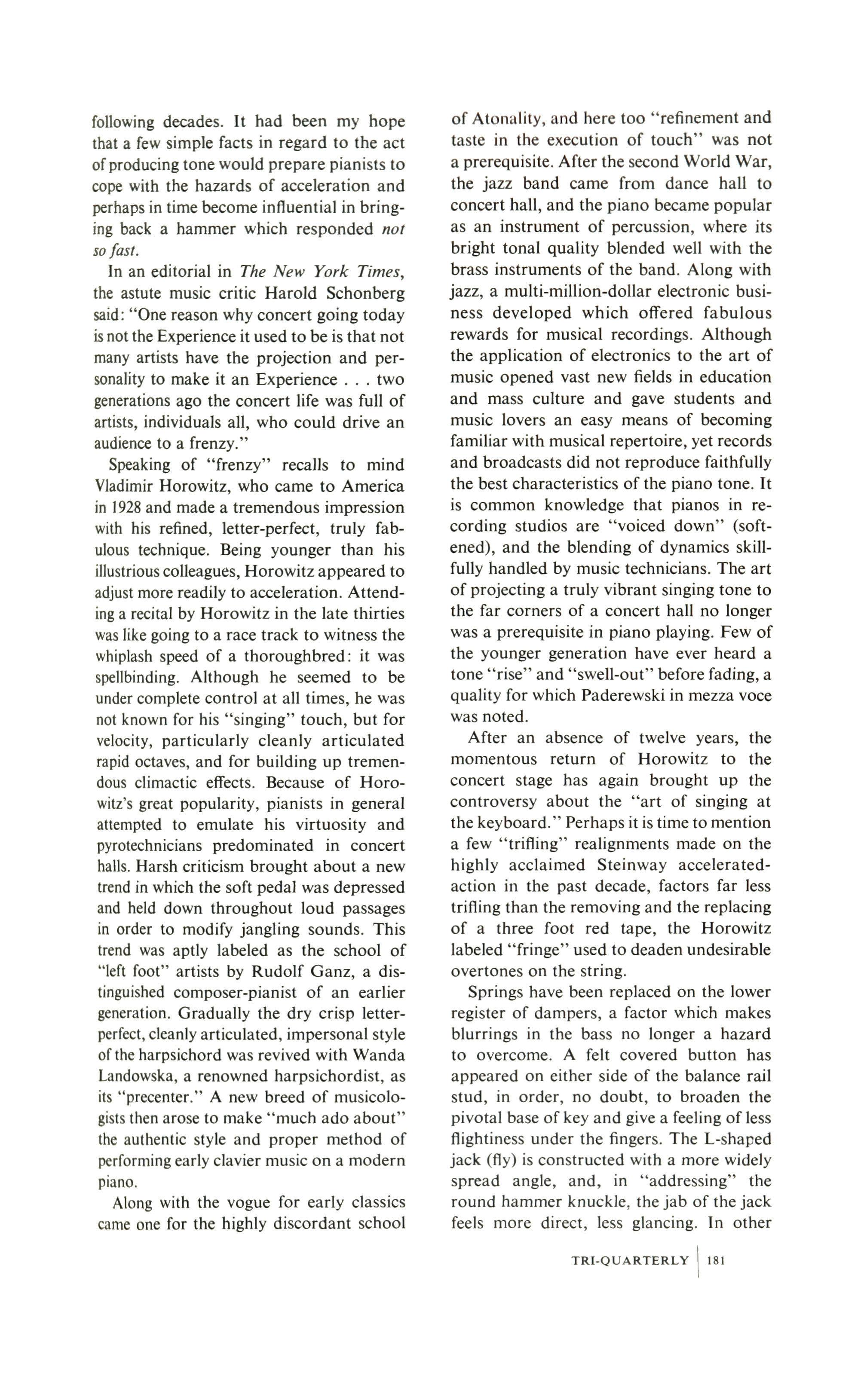
following decades. It had been my hope that a few simple facts in regard to the act of producing tone would prepare pianists to cope with the hazards of acceleration and perhaps in time become influential in bringing back a hammer which responded not so fast.
In an editorial in The New York Times, the astute music critic Harold Schonberg said: "One reason why concert going today is not the Experience it used to be is that not many artists have the projection and personality to make it an Experience two generations ago the concert life was full of artists, individuals all, who could drive an audience to a frenzy."
Speaking of "frenzy" recalls to mind Vladimir Horowitz, who came to America in 1928 and made a tremendous impression with his refined, letter-perfect, truly fabulous technique. Being younger than his illustrious colleagues, Horowitz appeared to adjust more readily to acceleration. Attending a recital by Horowitz in the late thirties was like going to a race track to witness the whiplash speed of a thoroughbred: it was spellbinding. Although he seemed to be under complete control at all times, he was not known for his "singing" touch, but for velocity, particularly cleanly articulated rapid octaves, and for building up tremendous climactic effects. Because of Horowitz's great popularity, pianists in general attempted to emulate his virtuosity and pyrotechnicians predominated in concert halls. Harsh criticism brought about a new trend in which the soft pedal was depressed and held down throughout loud passages in order to modify jangling sounds. This trend was aptly labeled as the school of "left foot" artists by Rudolf Ganz, a distinguished composer-pianist of an earlier generation. Gradually the dry crisp letterperfect, cleanly articulated, impersonal style of the harpsichord was revived with Wanda Landowska, a renowned harpsichordist, as its "precenter.' A new breed of musicologists then arose to make "much ado about" the authentic style and proper method of performing early clavier music on a modern plano.
Along with the vogue for early classics came one for the highly discordant school
of Atonality, and here too "refinement and taste in the execution of touch" was not a prerequisite. After the second World War, the jazz band came from dance hall to concert hall, and the piano became popular as an instrument of percussion, where its bright tonal quality blended well with the brass instruments of the band. Along with jazz, a multi-million-dollar electronic business developed which offered fabulous rewards for musical recordings. Although the application of electronics to the art of music opened vast new fields in education and mass culture and gave students and music lovers an easy means of becoming familiar with musical repertoire, yet records and broadcasts did not reproduce faithfully the best characteristics of the piano tone. It is common knowledge that pianos in recording studios are "voiced down" (softened), and the blending of dynamics skillfully handled by music technicians. The art of projecting a truly vibrant singing tone to the far corners of a concert hall no longer was a prerequisite in piano playing. Few of the younger generation have ever heard a tone "rise" and "swell-out" before fading, a quality for which Paderewski in mezza voce was noted.
After an absence of twelve years, the momentous return of Horowitz to the concert stage has again brought up the controversy about the "art of singing at the keyboard. Perhaps it is time to mention a few "trifling" realignments made on the highly acclaimed Steinway acceleratedaction ill the past decade, factors far less trifling than the removing and the replacing of a three foot red tape, the Horowitz labeled "fringe" used to deaden undesirable overtones on the string.
Springs have been replaced on the lower register of dampers, a factor which makes blurrings in the bass no longer a hazard to overcome. A felt covered button has appeared on either side of the balance rail stud, in order, no doubt, to broaden the pivotal base of key and give a feeling of less flightiness under the fingers. The L-shaped jack (fly) is constructed with a more widely spread angle, and, in "addressing" the round hammer knuckle, the jab of the jack feels more direct, less glancing. In other
TRI-QUARTERLY 181
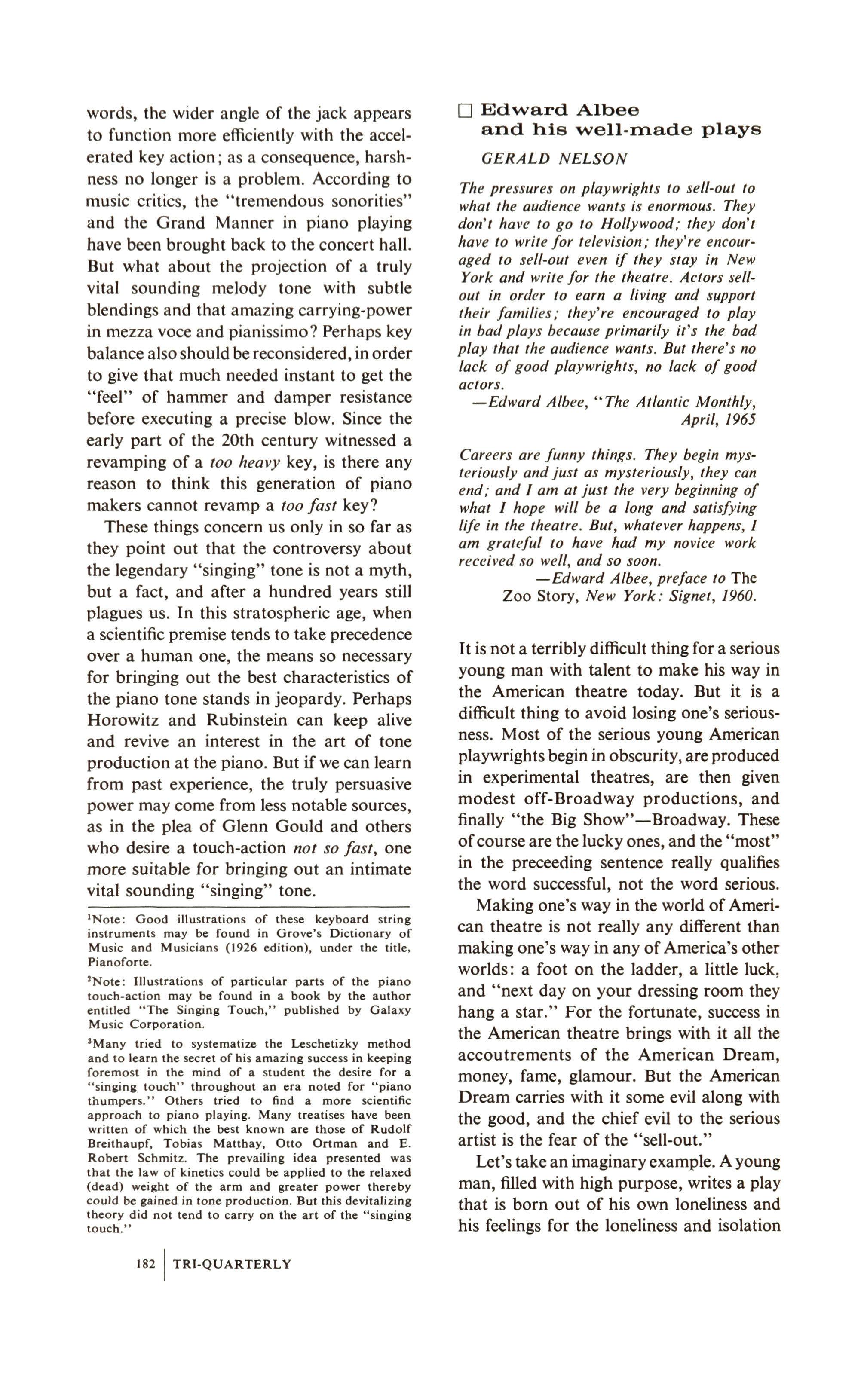
words, the wider angle of the jack appears to function more efficiently with the accelerated key action; as a consequence, harshness no longer is a problem. According to music critics, the "tremendous sonorities" and the Grand Manner in piano playing have been brought back to the concert hall. But what about the projection of a truly vital sounding melody tone with subtle blendings and that amazing carrying-power in mezza voce and pianissimo? Perhaps key balance also should be reconsidered, in order to give that much needed instant to get the "feel" of hammer and damper resistance before executing a precise blow. Since the early part of the 20th century witnessed a revamping of a too heavy key, is there any reason to think this generation of piano makers cannot revamp a too fast key? These things concern us only in so far as they point out that the controversy about the legendary "singing" tone is not a myth, but a fact, and after a hundred years still plagues us. In this stratospheric age, when a scientific premise tends to take precedence over a human one, the means so necessary for bringing out the best characteristics of the piano tone stands in jeopardy. Perhaps Horowitz and Rubinstein can keep alive and revive an interest in the art of tone production at the piano. But if we can learn from past experience, the truly persuasive power may come from less notable sources, as in the plea of Glenn Gould and others who desire a touch-action not so fast, one more suitable for bringing out an intimate vital sounding "singing" tone.
'Note: Good illustrations of these keyboard string instruments may be found in Grove's Dictionary of Music and Musicians (1926 edition), under the title, Pianoforte.
'Note: Illustrations of particular parts of the piano touch-action may be found in a book by the author entitled "The Singing Touch." published by Galaxy Music Corporation.
'Many tried to systematize the Leschetizky method and to learn the secret of his amazing success in keeping foremost in the mind of a student the desire for a "singing touch" throughout an era noted for "piano thumpers." Others tried to find a more scientific approach to piano playing. Many treatises have been written of which the best known are those of Rudolf Breithaupf, Tobias Matthay, Otto Ortman and E. Robert Schmitz. The prevailing idea presented was that the law of kinetics could be applied to the relaxed (dead) weight of the arm and greater power thereby could be gained in tone production. But this devitalizing theory did not tend to carryon the art of the "singing touch.
o Edward Albee and his well-Inade plays
GERALD NELSON
The pressures on playwrights to sell-out to what the audience wants is enormous. They don't have to go to Hollywood; they don't have to write for television; they're encouraged to sell-out even if they stay in New York and write for the theatre. Actors sellout in order to earn a living and support their families; they're encouraged to play in bad plays because primarily it's the bad play that the audience wants. But there's no lack of good playwrights, no lack of good actors.
-Edward Albee, "The Atlantic Monthly, April, 1965
Careers are funny things. They begin mysteriously and just as mysteriously, they can end; and 1 am at just the very beginning of what 1 hope will be a long and satisfying life in the theatre. But, whatever happens, 1 am grateful to have had my novice work received so well, and so soon.
=Edward Albee, preface to The Zoo Story, New York,' Signet, 1960.
It is not a terribly difficult thing for a serious young man with talent to make his way in the American theatre today. But it is a difficult thing to avoid losing one's seriousness. Most of the serious young American playwrights begin in obscurity, are produced in experimental theatres, are then given modest off-Broadway productions, and finally "the Big Show" Broadway. These of course are the lucky ones, and the "most" in the preceeding sentence really qualifies the word successful, not the word serious. Making one's way in the world of American theatre is not really any different than making one's way in any of America's other worlds: a foot on the ladder, a little luck. and "next day on your dressing room they hang a star." For the fortunate, success in the American theatre brings with it all the accoutrements of the American Dream, money, fame, glamour. But the American Dream carries with it some evil along with the good, and the chief evil to the serious artist is the fear of the "sell-out."
Let's take an imaginary example. A young man, filled with high purpose, writes a play that is born out of his own loneliness and his feelings for the loneliness and isolation
182 TRI-QUARTERLY
a) its freedom of language
b) its approach to illusion vs. reality
c) its message
So, in his next works he concentrates on these, he tries to shock his audience more and more with language, with his approach to the "standard" values of the day. He drives his message home more and more firmly. He believes that he has not sold-out, that he is giving the people what they need. But with each succeeding play the audiences grow smaller, the runs shorter, the critics more hostile. The playwright refuses to accept the guilt and turns first on the critics and then on the public, until finally there is no one left to turn on and no more plays to write.
The case ofthis imaginary playwright who sells out and doesn't know it, is not at all unusual in our theatre today. In fact he is typical of one of what seem to be the two main approaches to the American stage. The other, of course, is that of the writer who "sells-out" with full knowledge of what he's doing. He sets out to give the public what it wants, regardless of whatever he feels it might need. If he is successful and then fails, no one feels a sense of loss, of disappointment. Another writer merely comes along to replace him.
But the serious young man is a different story altogether. When he fails everyone is concerned, everyone searches for reasons, because after all he was serious about his work and his audience and his decline is felt as a loss.
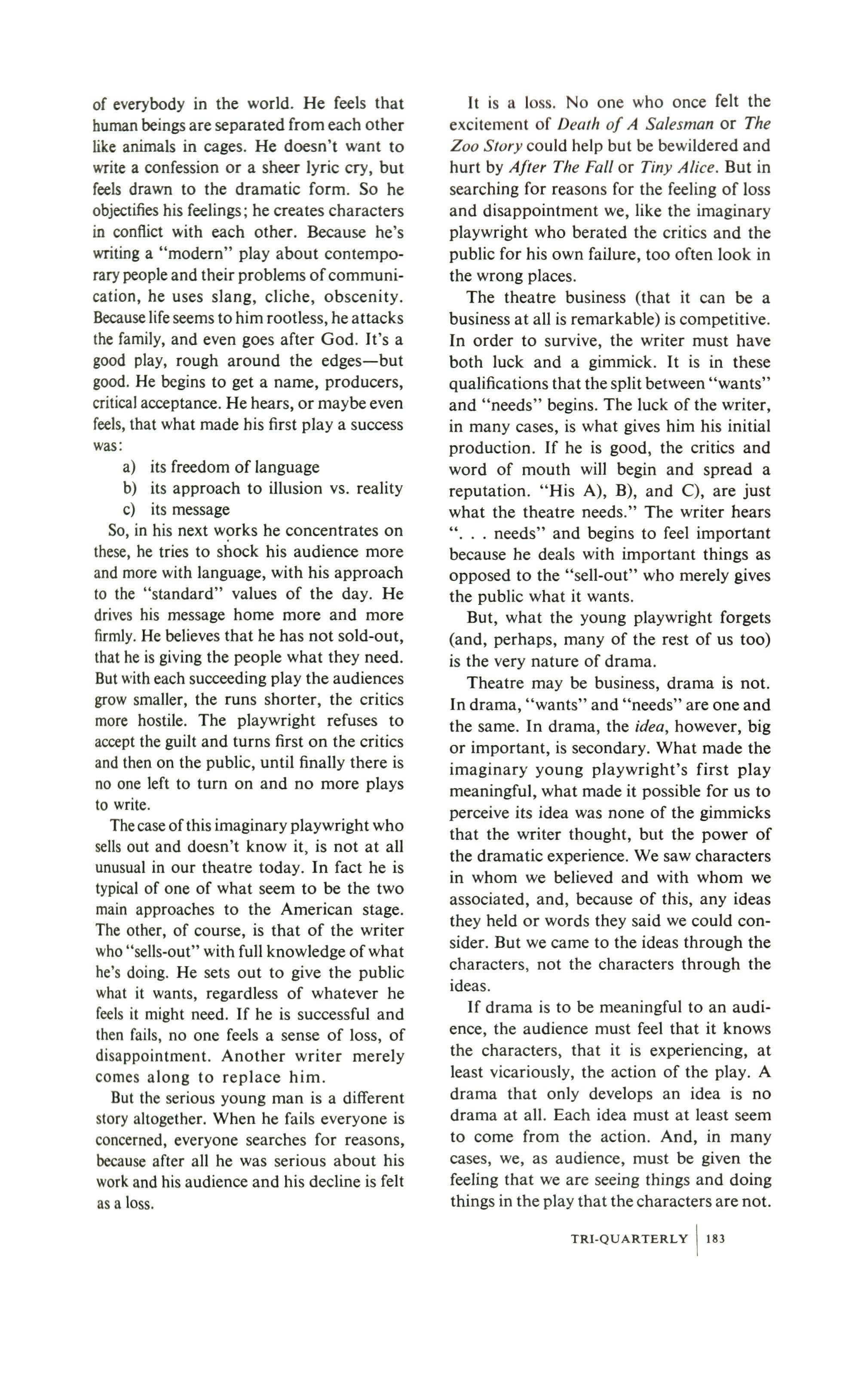
of everybody in the world. He feels that human beings are separated from each other like animals in cages. He doesn't want to write a confession or a sheer lyric cry, but feels drawn to the dramatic form. So he objectifies his feelings; he creates characters in conflict with each other. Because he's writing a "modern" play about contemporary people and their problems ofcommunication, he uses slang, cliche, obscenity. Because life seems to him rootless, he attacks the family, and even goes after God. It's a good play, rough around the edges but good. He begins to get a name, producers, critical acceptance. He hears, or maybe even feels, that what made his first playa success was: TRI-QUARTERLY 183
It is a loss. No one who once felt the excitement of Death of A Salesman or The Zoo Story could help but be bewildered and hurt by After TI,e FaIlor Tiny Alice. But in searching for reasons for the feeling of loss and disappointment we, like the imaginary playwright who berated the critics and the public for his own failure, too often look in the wrong places.
The theatre business (that it can be a business at all is remarkable) is competitive. In order to survive, the writer must have both luck and a gimmick. It is in these qualifications that the split between "wants" and "needs" begins. The luck of the writer, in many cases, is what gives him his initial production. If he is good, the critics and word of mouth will begin and spread a reputation. "His A), B), and C), are just what the theatre needs." The writer hears needs" and begins to feel important because he deals with important things as opposed to the "sell-out" who merely gives the public what it wants.
But, what the young playwright forgets (and, perhaps, many of the rest of us too) is the very nature of drama.
Theatre may be business, drama is not. In drama "wants" and "needs" are one and the same. In drama, the idea, however, big or important, is secondary. What made the imaginary young playwright's first play meaningful, what made it possible for us to perceive its idea was none of the gimmicks that the writer thought, but the power of the dramatic experience. We saw characters in whom we believed and with whom we associated, and, because of this, any ideas they held or words they said we could consider. But we came to the ideas through the characters, not the characters through the ideas.
If drama is to be meaningful to an audience, the audience must feel that it knows the characters, that it is experiencing, at least vicariously, the action of the play. A drama that only develops an idea is no drama at all. Each idea must at least seem to come from the action. And, in many cases, we, as audience, must be given the feeling that we are seeing things and doing things in the play that the characters are not.

In short, that we are, at least imaginatively, part of the action.
There is a great distance between considering what the audience "wants" and "needs" and a consideration of the imaginative relation of the audience to the pia)'. All the armies of American theatre are on one side, while the nature of drama is on the other. The most recent example of the drawing and quartering effected by such a split may be seen in the work of Edward Albee. And a good way of entering into a discussion of Albee's work is by looking at what happened to another play and playwright at the time that Albee was first writing plays.
"You can tell, I suppose, the Intention of a work. You can tell by the Intention if it's written for what the audience wants."
-Edward Albee, "The Atlantic Monthly," April, 1965
When Archibald MacLeish's play, 1.B., opened on Broadway in the fall of 1958, its text had undergone many revisions from the earlier version presented at Yale. Most of the revisions were minor and were brought about due to the changes in staging techniques and/or differences in casting and at least one, the presentation of Nickles as a younger "beat" type, added a great deal to the dramatic power of the play.
But a newly revised ending brought about some major changes in the relationship between the play and its audience. As J.B. was done at Yale, it ended with Nickles, seemingly defeated by Sarah's appearance at the door, shrugging his shoulders with all "J know" when J. B. says "There's someone at the door." Exit. Curtain. In the broadway version (and the official, published version) there is a scene between J. B. and Sarah following this in which they effect a reconciliation and Sarah councils J. B. to "Blow on the coal of the heart."
When the Moscow Art Theatre was having censorship difficulties in producing Tolstoy's The Power of Darkness, Tolstoy supposedly told Stanislavsky that production was so important to him that he would make any changes in the controversial ending (a child is crushed to death in a cellar) that Stanislavsky thought necessary to make
J 84 TRI-QUARTERLY
the play palatable to the public, also confessing that he had little or no knowledge of the practical problems of the theatre, or of the real relationship between play and audience, of how much explicit violence an audience could take. Between the two of them Tolstoy and Stanislavsky wrote an alternate ending (in which the child's death is merely reported), the play was produced, and carries its two endings to this day.
With Tolstoy the problem was showing the audience too much, making theatre too real, leaving too little to be imagined. Stanislavsky, a wise director, sensed this and effected the necessary changes. With MacLeish's 1.B. exactly the opposite process occurs. In the original 1.B., the problem was between God and Satan (or rather their surrogates, Zuss and Nickles) with man as the pawn. If you take everything a man has away from him will the "poor bastard" be dumb enough (or human enough depending upon the point of view) to take it back again if offered? The answer, of course, is yes, and the dramatic power in the situation lies in letting the audience say it, not the character. If this particular type of play is well constructed, the audience will be "with" the character, will know that (or at least hope that) since he is human, he must be human, and choose to live. It is not what he takes back that is important, nor how he takes it back, but that he takes it back. The rest of the details are best left to the imagination of the audience. But this MacLeish and his director Elia Kazan were not content to do. It was not enough for them that a play be well-constructed, it also had to be "wellmade." It had to be rounded off, the emphasis had to be switched to that which they felt the audience could understand. They had to make it explicit that what 1.B. was taking back was the particular love of a particular person at a particular time. And in so doing, Kazan and MacLeish, who had been so careful through staging and writing to lower the wall between play and audience, raised it as high and as firm as it had ever been, and turned a promising play into little more than a soap opera, and a potentially involved audience into a group of unsatisfied voyeurs. The explicitness of action or idea which drives an audience

away from the drama (which destroys the illusion) that Stanislavsky had worked to purge from Tolstoy's drama, Kazan had worked to include in MacLeish's, and yet both were attempting, at least ostensibly, to accomplish the same thing make the respective plays more acceptable to an audience. The difference lies in that one, Stanislavsky, thought in terms of drama, in terms of the audience, while the other, Kazan, thought in terms of idea, or complete explication of the message. Consequently, one is theatrical, the other attempts to be instructive and ends by being merely didactic.
At about the time of J.B.'s production on Broadway, Edward Albee was working on his first play, The Zoo Story. Although it took until 1960 for The Zoo Story to be produced in the United States, its production established Albee's reputation. It was a very exciting play, filled with promise. It is, as a matter of fact, quite probably the promise of The Zoo Story that has brought about the disappointment that so many have felt with his later plays.
The most immediate feelings that one has in viewing The Zoo Story are uncertainty mingled with fear. One man is seated on a park bench. Another enters and begins badgering him, talking to him when he obviously doesn't want to talk. The viewer automatically takes the point of view of the man seated on the bench, Peter. 'In a "reallife" situation similar to the one on the stage, we would feel fear and a desire to avoid involvement. But as Jerry, the second man, begins to talk, Peter and the viewer grow less afraid, become more open and actually become interested in what Jerry is saying, and we begin to realise that Jerry's badgering is not really badgering at all but, using Peter and the audience as tools, an attempt (crude though it may be) at selfanalysis. This realization on the part of the audience may be enough in itself to relieve the audience's anxiety over Peter's safety (this is similar to what Harold Pinter accomplishes in The Caretaker when he shows Mick to be a child and not an adult villain), but Albee doesn't stop with relief. Instead, he shifts the audience's anxieties, concern and associations from Peter to Jerry. We become involved with him and what will
happen to him and, in retrospect, we feel it to be a more significant involvement than we have had with Peter because Jerry is a person who does things and to whom things happen. He initiates action and seems therefore more interesting than Peter who is, by contrast, a passive, impotent receptacle of life.
With this shift of audience allegiance, Albee shows an understanding of the relationship between an audience and the play it views. A viewer likes the safety of being once removed and yet, at the same time wants to feel himself imaginatively a part of the action simultaneously both involved and safe. (To look back for a moment at J.B., this is what MacLeish allows us when he has J.B. say "There's someone at the door." We have waited with J.B. through his trials, awaiting his action, and when it comes we empathize and perhaps even understand more than he does since, after all, we are still audience and not actor.) The one doing on the stage is always more interesting to the audience than the one receiving. Peter, in The Zoo Story, gradually appears to members of the audience to be too much like them as they are, too much "like" audience and consequently, boring, if not offensive; whereas Jerry, obnoxious, insane, whatever, becomes our dream self, simply because he talks, does, and dominates. We know we aren't him, we know him better than he seems to know himself, but given an imaginary choice, it would be Jerry's excitement over Peter's safety.
Albee realizes that dramatic excitement on the stage lies in the relationship of a play to a game, conflict comes from knowing that there has to be a loser, and much of the audience's thrill comes from trying to pick (emotionally, not intellectually) the winner. It is, in effect, the idea of a playas a game with a winner and a loser that explains the need in drama for the hero or anti-hero. In many instances, so-called "non-drama" is dramatic in its insistence that the audience become heroic, for the hero or anti-hero in this context is the character regardless of stature who takes charge of the game, who -win or lose dominates it. Albee realizes this need for a hero and constructs his play accordingly.
TRI-QUARTERLY 185
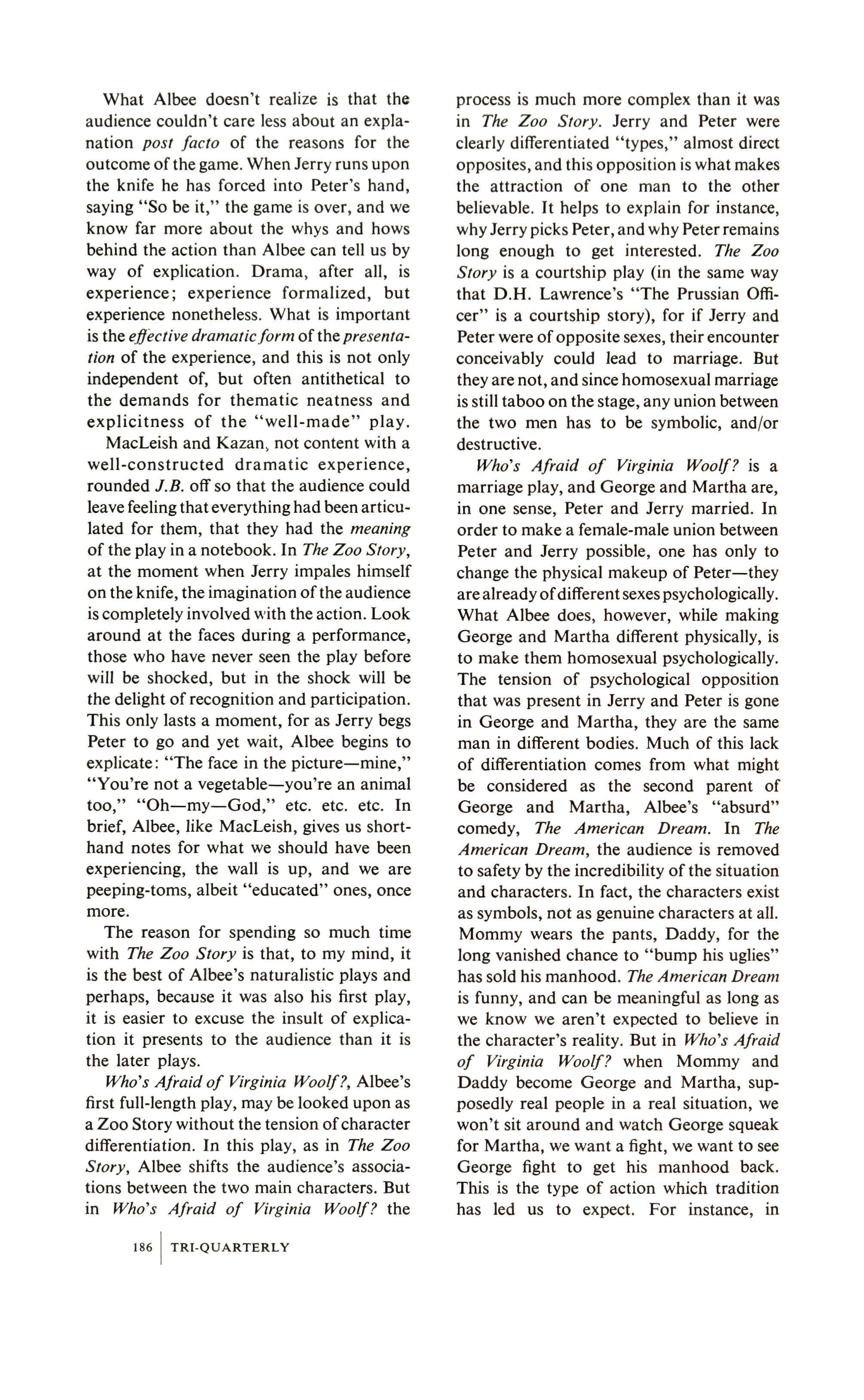
What Albee doesn't realize is that the audience couldn't care less about an explanation post facto of the reasons for the outcome of the game. When Jerry runs upon the knife he has forced into Peter's hand, saying "So be it," the game is over, and we know far more about the whys and hows behind the action than Albee can tell us by way of explication. Drama, after all, is experience; experience formalized, but experience nonetheless. What is important is the effective dramaticform of the presentation of the experience, and this is not only independent of, but often antithetical to the demands for thematic neatness and explicitness of the "well-made" play.
MacLeish and Kazan> not content with a well-constructed dramatic experience, rounded J.B. off so that the audience could leave feeling that everything had been articulated for them, that they had the meaning of the play in a notebook. In The Zoo Story, at the moment when Jerry impales himself on the knife, the imagination of the audience is completely involved with the action. Look around at the faces during a performance, those who have never seen the play before will be shocked, but in the shock will be the delight of recognition and participation. This only lasts a moment, for as Jerry begs Peter to go and yet wait, Albee begins to explicate: "The face in the picture mine," "You're not a vegetable you're an animal too," "Oh my God," etc. etc. etc. In brief, Albee, like MacLeish, gives us shorthand notes for what we should have been experiencing, the wall is up, and we are peeping-toms, albeit "educated" ones, once more.
The reason for spending so much time with The Zoo Story is that, to my mind, it is the best of Albee's naturalistic plays and perhaps, because it was also his first play, it is easier to excuse the insult of explication it presents to the audience than it is the later plays.
Who's Afraid of Virginia WoolfY, Albee's first full-length play, may be looked upon as a Zoo Story without the tension ofcharacter differentiation. In this play, as in The Zoo Story, Albee shifts the audience's associations between the two main characters. But in Who's Afraid of Virginia Woolf? the
process is much more complex than it was in The Zoo Story. Jerry and Peter were clearly differentiated "types," almost direct opposites, and this opposition is what makes the attraction of one man to the other believable. It helps to explain for instance, whyJerrypicks Peter, and why Peter remains long enough to get interested. The Zoo Story is a courtship play (in the same way that D.H. Lawrence's "The Prussian Officer" is a courtship story), for if Jerry and Peter were of opposite sexes, their encounter conceivably could lead to marriage. But they are not, and since homosexual marriage is still taboo on the stage, any union between the two men has to be symbolic, and/or destructive.
Who's Afraid of Virginia Woolf? is a marriage play, and George and Martha are, in one sense, Peter and Jerry married. In order to make a female-male union between Peter and Jerry possible, one has only to change the physical makeup of Peter they are alreadyofdifferent sexes psychologically. What Albee does, however, while making George and Martha different physically, is to make them homosexual psychologically. The tension of psychological opposition that was present in Jerry and Peter is gone in George and Martha, they are the same man in different bodies. Much of this lack of differentiation comes from what might be considered as the second parent of George and Martha, Albee's "absurd" comedy, The American Dream. In The American Dream, the audience is removed to safety by the incredibility of the situation and characters. In fact, the characters exist as symbols, not as genuine characters at all. Mommy wears the pants, Daddy, for the long vanished chance to "bump his uglies" has sold his manhood. The American Dream is funny, and can be meaningful as long as we know we aren't expected to believe in the character's reality. But in Who's Afraid of Virginia Woolf? when Mommy and Daddy become George and Martha, supposedly real people in a real situation, we won't sit around and watch George squeak for Martha, we want a fight, we want to see George fight to get his manhood back. This is the type of action which tradition has led us to expect. For instance, in
186 TRI-QUARTERLY

Shakespeare's The Taming of The Shrew, we know that a good spanking from Petruchio is what Katherine needs, that she needs a man who acts like a man. But in Who's Afraid of Virginia Woolf? Martha is a man, or George a woman. They are competitive, not as man vs. woman, nor as Iago vs. an Othello but as, if you will, an Iago vs. himself. They use the same weapons against each other, and there is no question of George regaining his manhood, but only of his destroying Martha's.
What Albee wants to show in Who's Afraidof Virginia Woolf?, as in all his work, is the difference between illusion and reality and the need for man to recognise the emptiness and the horrors inherent in each. This is a noble purpose, and we should not quarrel with it. But, if one is to write about illusion and reality for the stage, one must do so in dramatic terms. The idea must at least appear to arise from the action, not be a thing apart, grafted onto the play at the last moment, or precede the play by such a distance that the drama appears to be an afterthought.
The Zoo Story is about a man who is so desperate for human contact that he will get it at any price, and another who is desperately lonely but not consciously aware of it.
Who's Afraidof Virginia Woolf? is about a man who has no life, no marriage, nothing save an illusion connecting him with what he feels to be life, an illusion that he must destroy.
Tiny Alice, Albee's latest play, is about a man searching for what is truly real as opposed to what man exalts as real.
About. About. About. When we talk about Albee, we talk about what his plays are about; never do we say what /zappens, but why it happens.
In the famous dog speech from The Zoo Story, Jerry tries to tell Peter why he went to the zoo, but he is unable to and so he acts it out, shows him what happened with his landlady's dog. This is the best thing Albee has written because instead of moving away from the particular to tell something, he grounds his message firmly on the particular, showing, giving the audience action. This is drama, and it is because of
this that we might find ourselves able to overlook Albee's final explications. But in Who's Afraid of Virginia Woolf? and even more so in Tiny Alice, this dramatic reality is gone, and we as audience are left to "weld" together meaning and play.
Who's Afraid of Virginia Woolf? is, or can be, exciting. The dialogue is crisp, direct, "gutsy," and it at least makes one listen. But making one listen is only the first step, and in Who's Afraid of Virginia Woolf?, there is very little worth listening to. The characters, aside from George and Martha, are barely visible, to say nothing of being alive; the conflict between George and Martha is not at all the conflict it purports to be, and the dramatic action, if there is any, culminates in George's "exorcism" of illusion.
The illusion in Who's Afraid of Virginia Woolf? is represented by the imaginary son. The use of an imaginary child as the device for holding an illusionary marriage together smacks of gimmickry (as does the use of the "model" mansion within the "replica" mansion of Tiny Alice). But if handled brilliantly or, perhaps not even brilliantly, but just deftly, the imaginary child will stay in perspective. To do this however, the "exorcism" of illusion through the killing of the child must be done quickly and subtly, leaving the audience with the act rather than the explanation. When George kills the son, as when Jerry falls upon the knife, the play must be done, because the game IS over.
Albee, however, devotes an entire act to his exorcism, and ends it, and the play, not with the act of murder, nor with consequent destruction of Martha, but with Martha's telling us how she is destroyed.
George
"Who's afraid of Virginia Woolf, Virginia Woolf, Virginia Woolf,"
Martha
"I G am eorge George
"Who's afraid of Virginia Woolf
Martha
"I G 1 am eorge... am
By the time this is done, the climactic action of the play is all but forgotten, and the audience might as well be back with
TRI·QUARTERLY
187
J. B. and Sarah, blowing "on the coal of the heart."
The most extreme example of Albee's compulsion to be discursive rather than dramatic (if we exclude The Ballad of the Sad Cafe as merely a mistake) is Tiny Alice. Tiny Alice ends each of its three acts with a soliloquoy delivered by the central character, Brother Julian. These soliloquies apparently represent Julian's various attempts to find something with which to make contact; respectively, self, other, and God (or Alice). They also seem to represent Albee's attempt to find a unifying device for his play. This device is embarrassing to the audience because it excludes the audience. We don't know what's happened, we only know Julian's "spin-off" from reality. The soliloquies turn the theatrical experience into the act of peeping at a mad-man. We feel uncomfortable and sorry at the same time and unfortunately, since this is theatre, we begin to see the actor as a man separate from his role and to feel sorry for him as well.
Albee has said that it is the very "simplicity" of Tiny Alice that has "confused so many." This is not quite the case the simplicity of the play does not confuse, it may embarrass. It is the lack of drama that confuses.
By the time we reach the end of the play and Brother Julian has been sacrificed on the altar of Tiny Alice and in the course of one of the longest death soliloquies in the history of drama, has called out:

"Alice God Alice, Why hast thou forsaken me?" we are left sitting on our hands, or perhaps calling back: "What are you doing, putting us on?"
He's not. Albee honestly believes that he's got something in Tiny Alice, and this is what is most discouraging. Tiny Alice, although its box office does not (at this writing) show it, is the perfect commercial Broadway drama, the true bastard child of J. B. With Tiny Alice, Albee has taken an idea, given it dramatic form, and then taken the drama out of it. Tiny Alice requires nothing from an audience save its presence, everything else has been made explicit in the play. And even if it hadn't been, the playwright has become a critic to explain it after it has been played. So why should an audience get excited? After all, one goes to a play to get to know people, whether they be Jerrys, Georges, or Julians, not to be told ideas.
The sad thing is that Albee can write (or could, at any rate) good dialogue. He can (or could) get an audience excited. But from a relatively minor error, the attempt to "round-off" to "well-make" a play, that we see at the end of The Zoo Story, Albee, instead of eliminating that tendency, has given it rein, expanded it until, in Tiny Alice, the drama is gone and all that remains is the explication. We are no longer involved with people, but with abstractions; Albee seems to have forgotten that the comic and tragic masks are meaningless without human faces behind them.
188 TRI-QUARTERLY
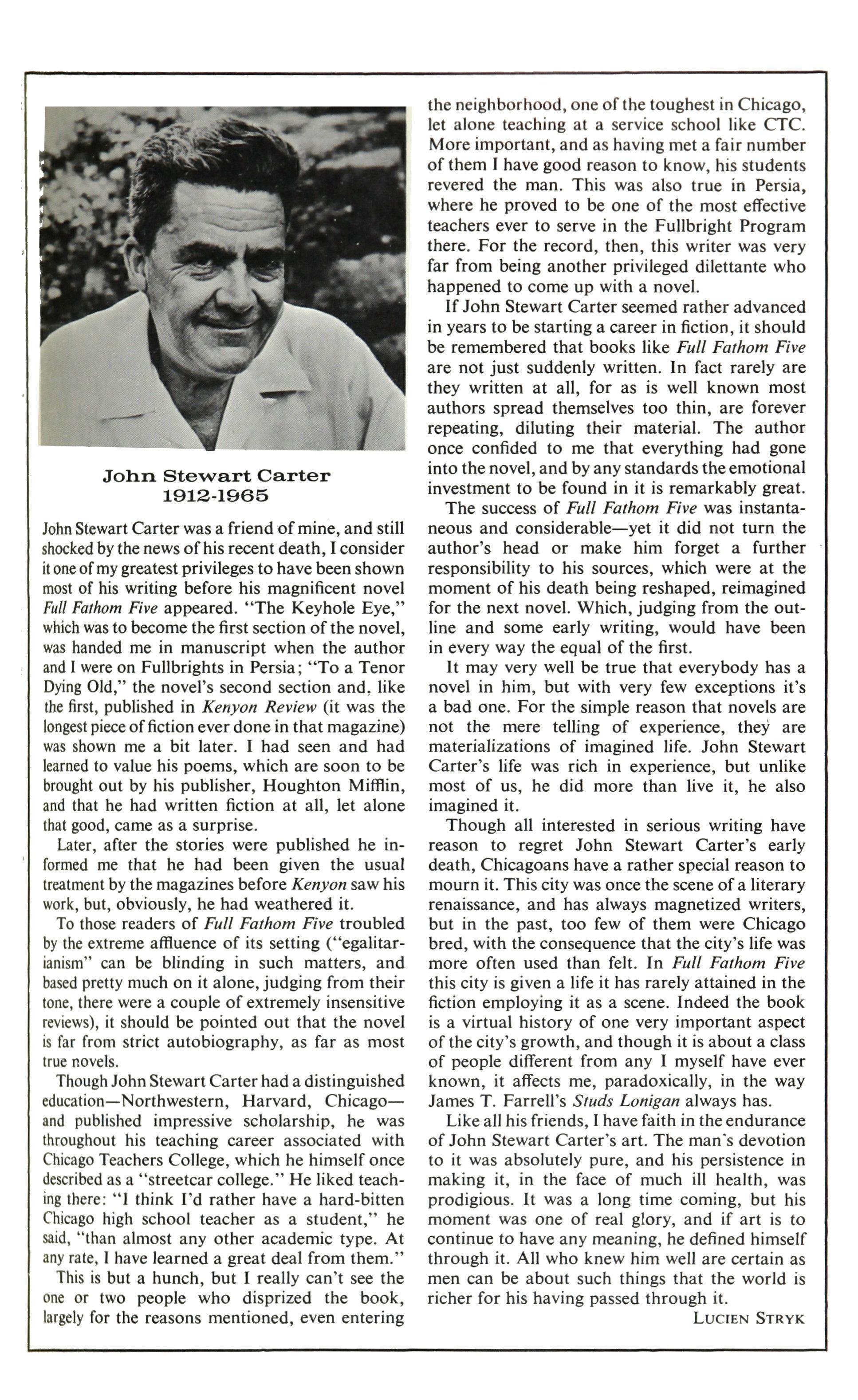 John Ste-wart Carter 1912-1965
John Ste-wart Carter 1912-1965
John Stewart Carter was a friend of mine, and still shocked by the news of his recent death, I consider it one ofmy greatest privileges to have been shown most of his writing before his magnificent novel Full Fathom Five appeared. "The Keyhole Eye," which was to become the first section of the novel, was handed me in manuscript when the author and I were on Fullbrights in Persia; "To a Tenor Dying Old," the novel's second section and, like the first, published in Kenyon Review (it was the longestpiece of fiction ever done in that magazine) was shown me a bit later. I had seen and had learned to value his poems, which are soon to be brought out by his publisher, Houghton Mifflin, and that he had written fiction at all, let alone that good, came as a surprise.
Later, after the stories were published he informed me that he had been given the usual treatment by the magazines before Kenyon saw his work, but, obviously, he had weathered it.
To those readers of Full Fathom Five troubled by the extreme affluence of its setting ("egalitarianisrn' can be blinding in such matters, and based pretty much on it alone, judging from their tone, there were a couple of extremely insensitive reviews), it should be pointed out that the novel is far from strict autobiography, as far as most true novels.
Though John Stewart Carter had a distinguished education Northwestern, Harvard, Chicagoand published impressive scholarship, he was throughout his teaching career associated with Chicago Teachers College, which he himself once described as a "streetcar college. He liked teaching there: "�I think I'd rather have a hard-bitten Chicago high school teacher as a student," he said, "than almost any other academic type. At any rate, I have learned a great deal from them."
This is but a hunch, but I really can't see the one or two people who disprized the book, largely for the reasons mentioned, even entering
the neighborhood, one of the toughest in Chicago, let alone teaching at a service school like CTC. More important, and as having met a fair number of them I have good reason to know, his students revered the man. This was also true in Persia, where he proved to be one of the most effective teachers ever to serve in the Fullbright Program there. For the record, then, this writer was very far from being another privileged dilettante who happened to come up with a novel.
If John Stewart Carter seemed rather advanced in years to be starting a career in fiction, it should be remembered that books like Full Fathom Five are not just suddenly written. In fact rarely are they written at all, for as is well known most authors spread themselves too thin, are forever repeating, diluting their material. The author once confided to me that everything had gone into the novel, and by any standards the emotional investment to be found in it is remarkably great.
The success of Full Fathom Five was instantaneous and considerable yet it did not turn the author's head or make him forget a further responsibility to his sources, which were at the moment of his death being reshaped, reimagined for the next novel. Which, judging from the outline and some early writing, would have been in every way the equal of the first.
It may very well be true that everybody has a novel in him, but with very few exceptions it's a bad one. For the simple reason that novels are not the mere telling of experience, they are materializations of imagined life. John Stewart Carter's life was rich in experience, but unlike most of us, he did more than live it, he also imagined it.
Though all interested in serious writing have reason to regret John Stewart Carter's early death, Chicagoans have a rather special reason to mourn it. This city was once the scene of a literary renaissance, and has always magnetized writers, but in the past, too few of them were Chicago bred, with the consequence that the city's life was more often used than felt. In Full Fathom Five this city is given a life it has rarely attained in the fiction employing it as a scene. Indeed the book is a virtual history of one very important aspect of the city's growth, and though it is about a class of people different from any I myself have ever known, it affects me, paradoxically, in the way James T. Farrell's Studs Lonigan always has.
Like all his friends, I have faith in the endurance of John Stewart Carter's art. The man's devotion to it was absolutely pure, and his persistence in making it, in the face of much ill health, was prodigious. It was a long time coming, but his moment was one of real glory, and if art is to continue to have any meaning, he defined himself through it. All who knew him well are certain as men can be about such things that the world is richer for his having passed through it.
LUCIEN STRYK

NOTICE
The Booksellers Association of Greater Chicago has voted unanimously to make an appeal to help in the legal struggle to obtain a reversal of the conviction of Paul Romaine, Chicago bookseller, sentenced to $1,000 fine and two years' probation for allowing a member of the Chicago Police Department Vice Squad to purchase a copy of MEMOIRS OF A WOMAN OF PLEASURE (commonly known as FANNY HILL).
The booksellers, in stating that this case challenges the civil rights of all of them and also the right to read of adult citizens who prefer to choose their own books, give the following reasons for believing the trial and sentence were unfair:
The justices of the Supreme Court of the State of New York decided that the book was not obscene. In Chicago a jury of admitted non-readers of books was allowed to convict both the book and the seller.
FANNY HILL had never been banned in Chicago, and prior to Romaine's arrest had been sold in many bookstores. It is on display in many cities and may be ordered by any Chicagoan without hindrance by the postal authorities.
The sentence Paul Romaine received may not seem severe to many readers but $1,000 is a great deal of money to a small book dealer. More serious, he is denied the natural right of traveling outside the state without permission, and for such a simple matter as a traffic violation could lose his probation and be sent to jail.
Most important to Chicago booksellers and all who value the freedom to read is the dangerous precedent set by this case. For this reason an urgent appeal is made to all citizens for contributions for a legal defense fund. The cost of printing the appeal alone will be at least $2,000, and other legal and court costs to bring this conviction before the higher court could total $8,000. The case of Henry Miller's TROPIC OF CANCER which was ruled upon favorably by the United States Supreme Court cost $250,000.
The Booksellers Association of Greater Chicago feels that Paul Romaine has committed no crime and deserves a complete defense. Please make contributions payable to the Paul Romaine Defense Fund and sent to:
Greater Chicago
Chicago, Illinois-60611
Booksellers Association of
642 North Michigan Avenue








































 LEONID MARTYNOV
translated by Babette Deutsch
LEONID MARTYNOV
translated by Babette Deutsch
 YEVGENY YEVTUSHENKO
translated by Babette Deutsch
YEVGENY YEVTUSHENKO
translated by Babette Deutsch













 ROBERT HERSHON
ROBERT HERSHON






















































 Mr. John Dryden,
Mr. John Dryden,

 ETIENNE LERO
translated by Paul Blackburn
ETIENNE LERO
translated by Paul Blackburn














































































 John Ste-wart Carter 1912-1965
John Ste-wart Carter 1912-1965
